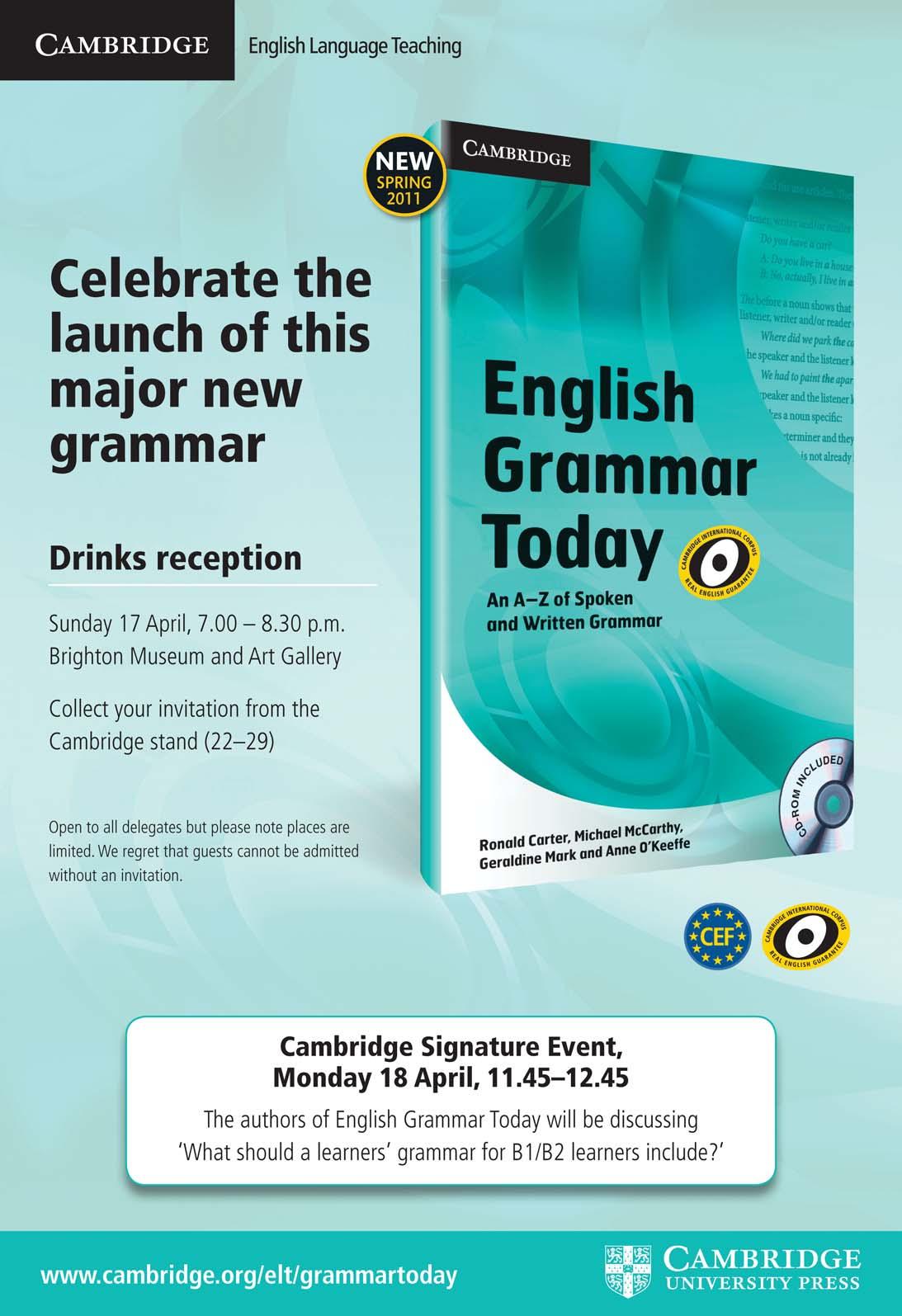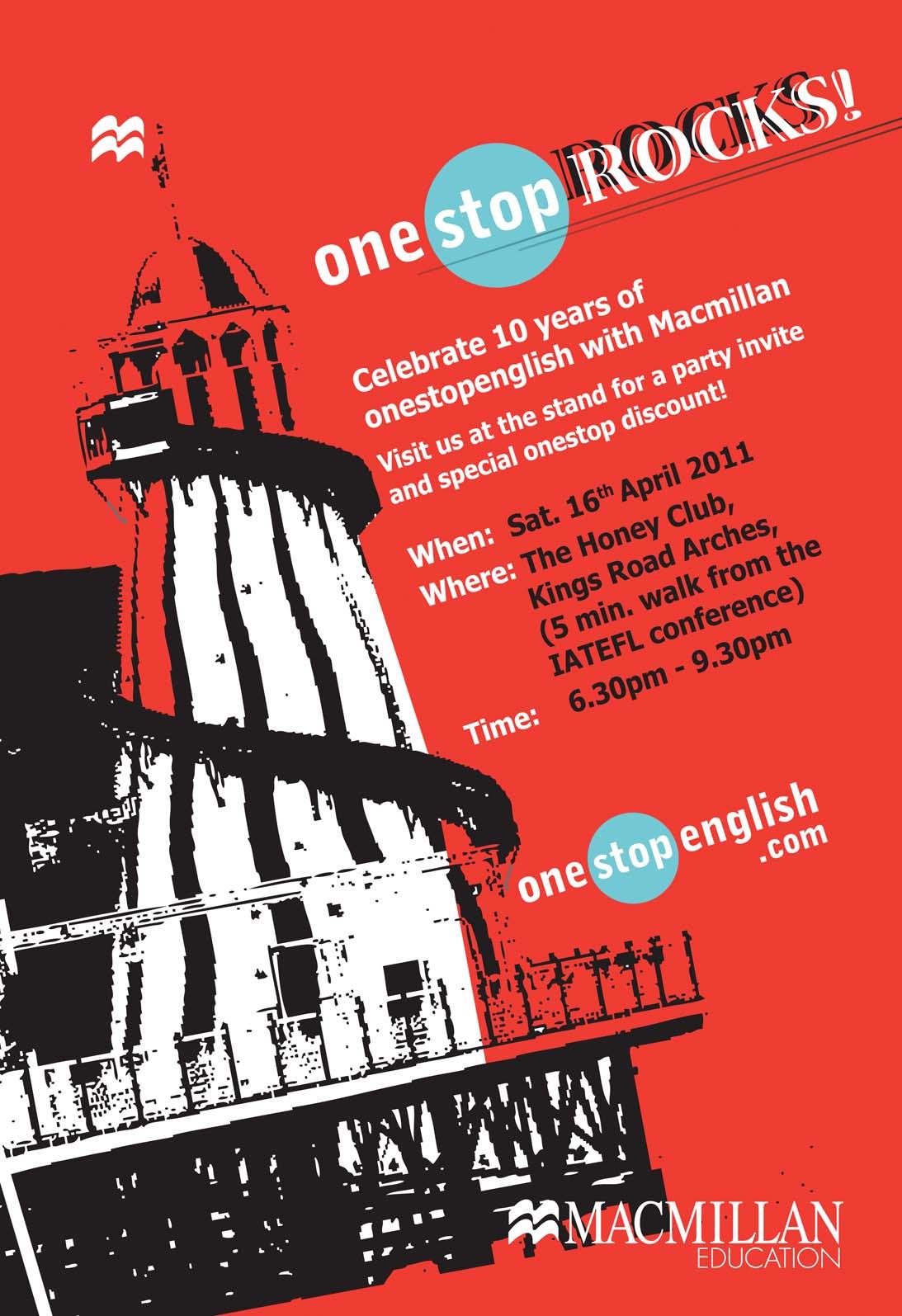

Pageforyournotes…………………………….………………...……………...…………..................………..162

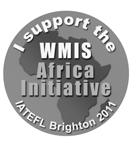



Pageforyournotes…………………………….………………...……………...…………..................………..162


I would like to extend a warmwelcome toyou all to our 45 th annualinternationalconference. Inparticularwewould all like to welcome the many delegates who are attending for the first time. We recognise that the firstexperienceat IATEFL can bealittle daunting,andwehope you soon feel at home and make new friends.
Wearedelighted to be back in Brighton in a refurbished conference centre. Brighton continues to be a favourite venue among our delegates for walks with friends along the beach or chewing the fat in one of the many cafés.Each year the conference grows:lastyearwe attractedover2000delegates and thisyear we areagainexpecting a similarnumber. As usual wehave an extensive programmeincluding five plenary speakers, over500 talks, workshops,debates, symposiumson a range of different topics, pre-conference events and discussion groups. We are onceagain running the Jobs Market during the conference, a placewhereemployers and potential employeescanmeet. As well as theseweare offering an array of evening events and daytime excursions, enough to exhausteven the most hardy of conference-goers.
Wearealso providing our usual high-quality exhibition of all the latestin teaching materials andequipment.We knowthatmanyof you arekeen to update yourselves and wewould like to thank our exhibitors formakingthis first-rate exhibition possible.
PersonallyI feelhonoured tobeinvolved in such a magnificent enterpriseasour annual conference.Thefinal event is theproduct of acomplex team effort by a numberofpeople. I would like to mentionhere our Conference Committee who meet regularlyduring the yearto plan the event. Inaddition,the staff in ourHead Office have worked throughout the year on all aspectsof preparationfor the occasion;including processingregistrations, scheduling presentations, and manning the conference desk. I would like to mention toothekey role playedbyour localcommittee whose knowledgeof thelocation isinvaluable in planningthe local events.
Abig thank youis also due totheBritish Council fortheir mostgenerous support ofBrighton Online, makingit possible for manythousandsofpeoplewhoare unableto attend inperson to participate remotely.
Finally I wouldlike to remind everyoneto complete their evaluationforms beforetheyleave the conference. These are read carefully andacted on sothatwe can improve our offering eachyear. (Please see pages 199-200.)
A big welcome to you all; I hope your experience inBrighton is bothenjoyableand memorable.
 Herbert Puchta
Herbert Puchta
Pre-ConferenceEvents (PCEs) held on Friday15th April are specifically for delegates whowish to concentrate ona particulartopic. PCEs are plannedas professionaldevelopment days and participants receive a certificateof attendance.
Pleasevisit www.iatefl.org for detailsonnext year’s Pre-Conference Events and for details on other SIGevents,held throughout the yearthroughout the world.
This year, the Special Interest Groups who organised Pre-Conference Events are:
B u s i n e s s E n g l i s h on Professional English trainers: Where are we now? Whereshouldwe be tomorrow?
E n g l i s h f o r S p e c i f i c P u r p o s e s on New challenges in English for specific, academicand professional purposes
E S ( O ) L on Skills developmentinthe ES(O)Lclassroom: survivingspiky profiles
G l o b a l I s s u e s on Global education:from beliefsto behaviours
L e a d e r s h i p & M a n a g e m e n t onPutting the customer first:achieving excellent customer service in language teaching organisations
L e a r n e r A u t o n o m y on Developinglearner autonomy– success stories, constraints, and the role of practitioner research
L e a r n i n g T e c h n o l o g i e s on Interactive Whiteboards: from methods to madness
L i t e r a t u r e , M e d i a & C u lt u r a l S t u d i e s on travel in literature and travel literature
P r o n u n c i a t i o n on Non-imitative ways of teaching pronunciation
R es e a r c h on Doing good quality ELT research
T ea c h e r D e v e l o p m e n t on “Does mybum look big in this?” - how feedback changes everything
T ea c h e r T r a i n i n g & E d u c a t i o n on Resourcesand resourcefulnessin teacher training and education
T es t i n g , E v a l u a t i o n & A s s e s s m en t on The art of assessing listening:currenttrends and approaches(and questions!)
Y o u n g L e a r n e r s a n d T e e n a g er s on FlatC&TS: creativity in YLT
Professional English trainers:Where are we now? Whereshouldwe be tomorrow? sponsored by
The focus of the IATEFL BESIGPCE 2011is our profession and our individual training visions and opportunities. We train our students in communication skills in English for professional purposes. But howdowe see ourselves? And, more importantly,how do our clients see us? Arewe teachers or are we trainers? Do thesedefinitions have to do with professional competence or arethey just historical? Do those who hire us and those wetrain see us astrueprofessionals? How do webalance technologyand traditional methodologies? Where does our future lie?
These are some ofthe questions we plan to answer through talks, workshops anda panel discussion inthis preconference event.
ProfessionalEnglishTrainers,timetostartsellinginsteadof sellingourselvesshort
Professional English trainers:the materials, the pedagogy andthetechnology
CompanyLanguageAssessment–professionally sponsored by
TrainingTeacherstobeTrainers
Media partner
New challenges in English forspecific, academic andprofessional purposes
A detailedversion ofthe programmeis availableat http://espsig.iatefl.org
The event issupportedby Garnet Education, Cambridge ESOL, CUP, Macmillan ELT, and OUP. Hereis the programme of speakers andtalks for the day:
ESP P teacher r educ ation n co urse: : an n exp erience e in developing g genre-ba sed d ma teri als s- Rosinda deCastro Guerra Ramos, PontificalCatholic University of Sao Paulo, Brazil;
Danc e of f the e masquerade: : teaching g busi ness s English h in Nigeria a using g literature e and d the e medi a- Sunday I. Duruoha, Rivers State University of Science& Technology, Port Harcourt, Nigeria;
How w to o be e success ful l in n wri ting g extend ed d essays s- Elena Velikaya,State University-Higher Schoolof Economics, Moscow, Russia;
T he e professional l develop ment t of f ES L teac hers s in s eco ndary y schools: : implic ations s for r EA P teac hing g in Nigeria a- Adejoke VictoriaJibowo, Olabisi Onabanjo University, Nigeria;
ESP P- ni ne e years s of f mod est t achi evement t at t MTEVT T (20012 010) )- WaddahAli, Ministryof Technicaland Vocational Education, Yemen;
Ini ti al l E ngli sh h l a ngua ge e te a c her r edu c a ti o n a n d Engl i s h la nguage e teachi ng g at t the e university y of f Juba a (Sudan): challenges s a nd d ways s forward d- Michael BaffokaAlexander, University of Juba, Sudan; Preacher r di scourse e vs. . academic c di sc ourse: : what academ ic c li teracy y practices s are e req uired d in n the e discipline of f theo l o gy? ?- Jenny Kerchhoff, University of KwaZulu-Natal, RSA;
Striving g for r co herence e in n a business/academic/func tionsba s e d t e rt i ar y -l e v el l s yl la bus s - JoAnn Salvisberg, Lucerne University of AppliedSciences and Arts, Business College, Luzern, Switzerland;
Some e i nnova ti ve e a ss essment t pra ctic es s through h project wo rk k in n ES P- L.Junia Ngoepe, University of Limpopo, South Africa;
News fl a sh: : u pda te e o n ES P a n d EA P in n Cub a- Eduardo GarbeySavigne, HavanaMedical Sciences University, Cuba; Teresita RojasGonzalez, Manuel Fajardo Medical School, Havana, Cuba;
Teac hi ng g ES P a nd d E A P in n A rm enia – Amalia Babayan, Yerevan State University, Armenia
Skillsdevelopment in the ES(O)L classroom: survivingspikyprofiles
The challenge and delight of ES(O)L lies in enabling a groupof learners with a wide variety of skills to develop their language and literacy simultaneously,but how can we differentiate speaking, listening,reading andwriting skills lessonsbest? How can we enable learners with lowlevels of literacy to succeed? How can technologysupport the process? What are the beststarting pointsfordeveloping the fourskills in learnerswithlittle or noeducational background? What are the key issues in managingmixed ability settings?
Our pre-conference event addresses these questions through talks andworkshops from Philida Schellekens,Bev Davies,
Elaine Williamsonand the British Council exploring the similarities and differences betweenfirstand second language learners,current bestpractice in online resources, andconsidering bestpractice in classroomapproaches that bring rewards in different contexts.Mostimportantly participantshave the opportunity to sharetheir own experience, network with practitioners from across the world and take awaypractical ideas to putintopractice.
The ES(O)LSIG PCE is kindly supported by the British Council.
Globaleducation: from beliefs tobehaviours
GlobalIssues covers suchcomprehensive areas as social justice, sustainable development,conflict resolution, human rights, and more!To deal with this widearray of highly relevant themes, we made ourPCEanopportunity toshare and learn in a personal and professionally satisfying format, conscious of thediversity of educational contexts and cultures in whichwe operate.Theprogramme movesfrom the clarification of beliefs and ‘en-theos-iasms’which lieatthe heart of our work, our foundationsand convictions, to the things we say and do in ourteaching lives.
We plan to spend time on the more philosophicaland theoretical justifications, and internationaldocuments which groundourwork: the why and wherefore, theconstraints and potentialfor change, withtimeto highlight some major discourses in charters, conventions,nationalguidelines or curricula, and development goalswhichournationshave signed up to. Somereadings are supplied for our comparisons and we hope participants bring alongany literature which
provides thebases of their work. The talksenable us to appreciatethe scope and limitations for criticalglobal education, in our various teaching situations.
Thediscussions allowus toshare favourite authors, theorists, concepts, motivations, and perhaps indirectly the evaluative frameworks bywhich we measureour personal and professional success. It willleave uswitha fresh understanding of the role of philosophyand theory, in the coherent developing of our own ‘internal conversations’.
Theafternoon focuses on theadaptation ofthemedresource materialsincluding any thatparticipants bring with them. Working in pairs and groups, we createlessonplans forour particular student groups, based on content and language level.
The final hour is a carousel exhibition of thelesson plans created.Participants walkaroundthe display, with representatives of the groups explaining their displays.
Puttingthecustomerfirst:achievingexcellentcustomerserviceinlanguageteachingorganisations
Inanincreasinglycompetitivemarketplace,manylanguage teachingorganisationsareawareoftheneedtoprovide excellentcustomerservicetotheircustomers.Thispractical PCEincludestalks,workshops and apaneldiscussionabout: -measuring and increasing customer satisfaction -customerservicemodels
-enhancing the stepsin thecustomerjourney
-providing excellent service to internalcustomers (staff)
-trainingteachers tomeetthe customerchallenge
- managing customercomplaints
Speakers:
(AcademicDirector,WimbledonSchoolof English),R
(ELTManagementspecialistandauthor) andG
(Leadership&Managementcoachand consultant)
Panellists:
(AcademicDirector,Cactus LanguageTraining),
Developinglearnerautonomy–successstories,constraints,andtheroleofpractitionerresearch
Thisverypractice-andpractitioner-orientedeventisfor experiencedteacherswhowanttosharetheirpracticewith othersandfindnewwaysofdevelopingit,aswellasnovices inthefieldofdevelopinglearnerautonomywhoarelooking forinspirationandsupportforgettingstarted.Foreverybody, thedayprovideschancestosetupsupportingnetworksin connectionwith the development of learnerautonomy.
Apartfromthetwokeynotetalks, Anne Burns, Australia: Learner-centredness,learnerautonomyandactionresearch: constraintsandsuccessesintheclassroom and Dick Allwright, UK: Learnersasresearchersoftheirown
learning, thedayisacombinationofshortadditionalinputsby presentersfromallovertheworld(Bahrain,Bangladesh, Canada,Germany,Japan,Nigeria,Senegal,Turkey,andthe UK)anddiscussionsinsmallergroups.Inputsaswellas discussions are formed around threemain topics:
Whatcreatessuccess?
Constraintsandhowtodealwiththem! Possibleideas/plansforpractitionerresearch?
TheLASIGeventissponsoredbyAuthentik,Clarityand PearsonLongman.
InteractiveWhiteboards:frommethodstomadness Ifthere'sonepieceoftechnologythathaspromisedto revolutioniseclassroompracticeinrecentyears,it'sthe InteractiveWhiteboard(IWB).Facilitatingtheintegrationof otherdigitaltechnologiesina'connectedclassroom', supportersoftheIWBclaimithasgreatpotentialtoradically alterthewayourstudentslearn,withincreasedstudent engagementandimprovementstothequalityofteachingand learningthattakesplace.Detractors,however,sayit'san expensiveandunnecessarypieceoftechnologythatresultsin moreteacher-centredclassrooms.
Whatistrueisthatalthoughitlookslikeanormal whiteboard,there'ssomuchmoretoitunderthesurface,and
usingitwellrequiresacombinationoftraining,practiceand reflection.GoodteachingwithanIWBcanmeanrethinking yourapproachtoclassroomteaching.Forthisreason,we invitedanumberofguestpresenters,includingC o n n i e G u n t e l b e r g ,L u k e M e d d i n
,toshow differentmethods,principlesandstrategiesforeffective teaching with the IWB.
Thisisaverypractically-orientedday,andexperienced participantswereencouragedtobringtheirownusefultips andideastosharewitheveryoneduringa'show-and-tell' session.
Literature,Media&CulturalStudiesSpecialInterestGroupPCE Travelinliteratureandtravelliterature
InthisPCEweexamineapproachestothetopicoftravel,and asbefitsourbroadL,MandCScanvas,thereisliterature, withacapital‘L’andasmall‘l’fromthreegenres(novel, shortstoryandpoetry),writingsfromvariousothermedia (essay, newspaper,magazine) andfilm. Theseare wrappedup inthefocusoftheday:travel.
A n d r e w M i l n e - S k i n n e r (UniversityofInnsbruck,Austria) tookalookatD.H.Lawrence’stravelwriting,andR o b e r t H i l l (Freelance,Verona,Italy)examineBritishwriters’viewsof Italy.D a v i d A H i l l (Coordinator,LMCSSIG)takesparticipants onatripdowntheDanube.Movingfurtherawayfrom
Brighton(!)S a r a h M o u n t (Director,NorwichInstitutefor LanguageEducation)invitesustotheChinesecityof Shanghai,whileVe r o n i k a R o t - G a b r o v e c (Slovenia)leadsus toAustralia’sredheart.WeclosewithajourneyfromLondon toKibera(aSouthAfricanshantytown)throughthefilmofthe novel, TheConstantGardener withK i e r a n D o n a g h y (UAB Idiomes, Barcelona).
Asatisfyingdayof‘armchairtravel’isinprospect,with somegoodteachingideastopackintoourbagsforthe return journey!!
Non-imitative waysof teaching pronunciation
Very manyof theexercisesteachers usefor pronunciation come down, in oneform oranother, to'listen and repeat'.It is believedthat studentswilllearnto pronouncethis way -by imitation -becauseit’s generally thought thatthisis what young children do when theylearnto pronounce their mother tongue.
Surprisingly, there is noevidence at allthatyoung children learn the systemic aspects of pronunciationthis way. It is quite probablethat these are not learnt by imitation but by other mechanisms.In theclassroom, we can reproducethese non-imitative mechanisms.
Doing good quality ELT research
This event focuses on the process of doing research in English language teachingand in particular onthesteps wecantake to enhancethe quality of theresearch we do. Througha combination ofinputfromthe facilitator, hands-on tasksand group discussions weexamine the following key questions:
What is research?
How do we design a research project?
How do we collect andanalyze data? What is a good quality research project? How can we get our research published?
We addressthese questionsbyexamining real examples of ELT research projects, data and papers, and by drawing on
InthisPCE,we explorethese, show how wecan work on pronunciation fromthe very beginning (and justify why we should doso) andshowhow we can also integrate pronunciation into all otheractivities.Weuse a language other thanEnglishto give participants the experienceof beinglearners ina classtaught this way. Ifyou thought that teaching pronunciationcouldonly mean'listen andrepeat', then this PCE equips you with a new perspective and a new set of tools.
participants’own experiencesof research. Quantitative and qualitative perspectives on research are both considered.
The PCEis suitable both for languageteaching professionals new to research and for those with someresearch experience and whowant anopportunityto review and extend their current knowledge.
By theend of the PCE, participants are moreaware of howto design andconduct aresearch project and of strategies they can use toenhancethe quality oftheir research andto increase its potential for publication.
The event is facilitated by Simon Borg from the University of Leeds.
“Does my bum look bigin this?” - how feedback changes everything
Feedback is a great accelerator for professional development. In thisall-day teacherdevelopmentworkshop welook into ways of enhancingconstructivefeedback to andfrom the people that really matter at work:students,colleagues, supervisors and bosses.
We discuss the main reasonswhyfeedbackissometimes dreaded, with the main focuson why and how feedback should beverywelcome. We also explore different types of feedback and thevarious ways teachers caninvite, give and reactto feedback positively.
The workshopis divided into fourparts.In the first highly
practical sessionweconstruct agroup profile andperforman analysis of our own individual work situations, thesecond part focuses onvarious types of feedback, while in the third session we discuss non-threatening ways inwhichteachers can giveand receivehonestfeedback. The last partbrings everything togetherin a review anddiscussion session poweredbyOpen Space Technology(OST), agroundbreaking approach to meetings.
The workshop, facilitatedby DuncanFoord and Catherine Mitsaki, helpsus analyse thetechnicalities of the process andencourage reconciliationwith our ownfears and reactions in a non-threatening, collaborative environment.
Teacher trainers andeducatorsuse myriad resourcesinorder to implement quality training andeducation. Whatarethese resources? Do they help teacher trainers and educators to develop resourcefulness in theirprofessional lives? How?
The aim ofourpre-conferenceeventthis year is todiscuss our practices and needs around thesequestions. With theactive involvement of the participants,we shareexamples of effective resources usedinpre-service training,in-servicetraining, performance evaluation, certification, and professional
development programs in different teacher training and education contexts.Wealso try toprovide anopportunityfor teacher trainers andeducatorstodiscuss their existingneeds for resourcesand elaborate on their resourcefulness in overcomingthedifficultiescreated by the lack ofsufficient resources or in choosing themost effective ones. The TTEdSIG PCE isorganised with thecontributionof the distinguished speakers,M M a r io n W il li a m s andB B r i o n y B e a v e n and it is planned as a day of professional development.
The art of assessing listening:current trends and approaches (and questions!)
TheTEA SIG PCE eventthis year ison AssessingListening, an often neglectedskill inassessment which isfraughtwith issuesand problems!We arelucky tohave an eminent line-up of internationally renownedandexpert speakersin the field who make this a day not to be missed!
Our speakers are:
B r ia n N o r t h – a ‘founding father’ of the CEFR
J o h n d e J o n g – an expert in test designand analysis
C ar ol e Th o ma s –a well-knownpresenter at IATEFL,who is HeadofTesting at BilkentUniversity School of English Language in Turkey,talks aboutbest practicein the process of designing and producing listening tests
J o h n F i e l d –avery well-known researcher andpresenterin this area, talks about difficulties and issues in testing listening
Ar d e s h i r G e r a n p a y e h – another expert inthe field, who presents ontheconsideration and constraints involvedin assessing listening for academic purposes
G a r y B u c k – the author of Assessing Listening (CUP) and a very creative thinkerin the field of assessing listening.
Asyoucan see, there is a real lineup of international experts so it is a greatopportunityfor participants in anevent which is stimulating andinsightful, culminating witha panel discussion when we all have a chance to ask our questions to the speakers and explore ideas which arise during the day.
You can find more detailedinformation on the day on our TEASIG website.
Flat C&TS: Creativity in YLT
Our PCE thisyear looks atthe topic of creativityinYLT classrooms, books and teachertraining courses.Throughout the daywe ask ourselves: Whatis creativity? How is it possible to implement thisas aregularfeature in our YLclassrooms? The topic and the form of the day is stimulatedby the book Flat Stanley by Jeff Brown and byCanadianDale Hubert's ingenious FlatStanley Project (www.flatstanley.com)
This year our PCE is threedimensional. Firstly, anonline discussionmoderated by DennisNewson took place. Then we allmeet here in Brighton to share thoughts and experiences whilst attending sessions.
Presentations this year are fromJ
andA A
ad . There isalsoan experts panel and our guests are K
This unusual PCE ends with Flat Catsbeing releasedto the wider world!Participantstake hometheir cat which will then begin a voyage ofdiscoverythroughout YL classrooms all over theworld.The C&Ts will be back to report in Glasgow in 2012!
A huge thank you to Cambridge ESOL for kindly sponsoring this event.
(sponsored by the UniversityofCambridge ESOL Examinations)
IATEFL has around 100 Associate Members. An Associate is another Teacher Association (TA) that has enteredintoa mutually beneficial relationship withIATEFL.Abenefit of becoming an Associate lies in linking up to a network of international TAs, andthroughthis, a network oflanguage educatorsfrom all overthe world and from a range ofdiverse backgrounds and nationalities.
The Associates'Day (held on 15th April) is achance for representatives of these TAs to gettogether and discuss mattersof common concern.Oneof theoverarching aimsof most TAs is to buildprofessional communities.
This year, inresponse toTAs' requests, there isapresentation and workshop by RichardJohn, an expert involunteer organisation issues;we thankour sponsors, Cambridge ESOL, for this opportunity.
We launch our latest associates' handbook: "Running an Association forLanguageTeachers: Directionsand Opportunities". All associatesat theAssociates'Day receive a copy, and some of the authors speak about their specialities.
We also asked TAs to submit posterpresentationsthat present an aspect oftheiractivitiesthat wouldinterest other TAs. These will also be displayed throughout theconference.
The Pre-Conference Events and Associates’ Day were held on Friday 15th April.
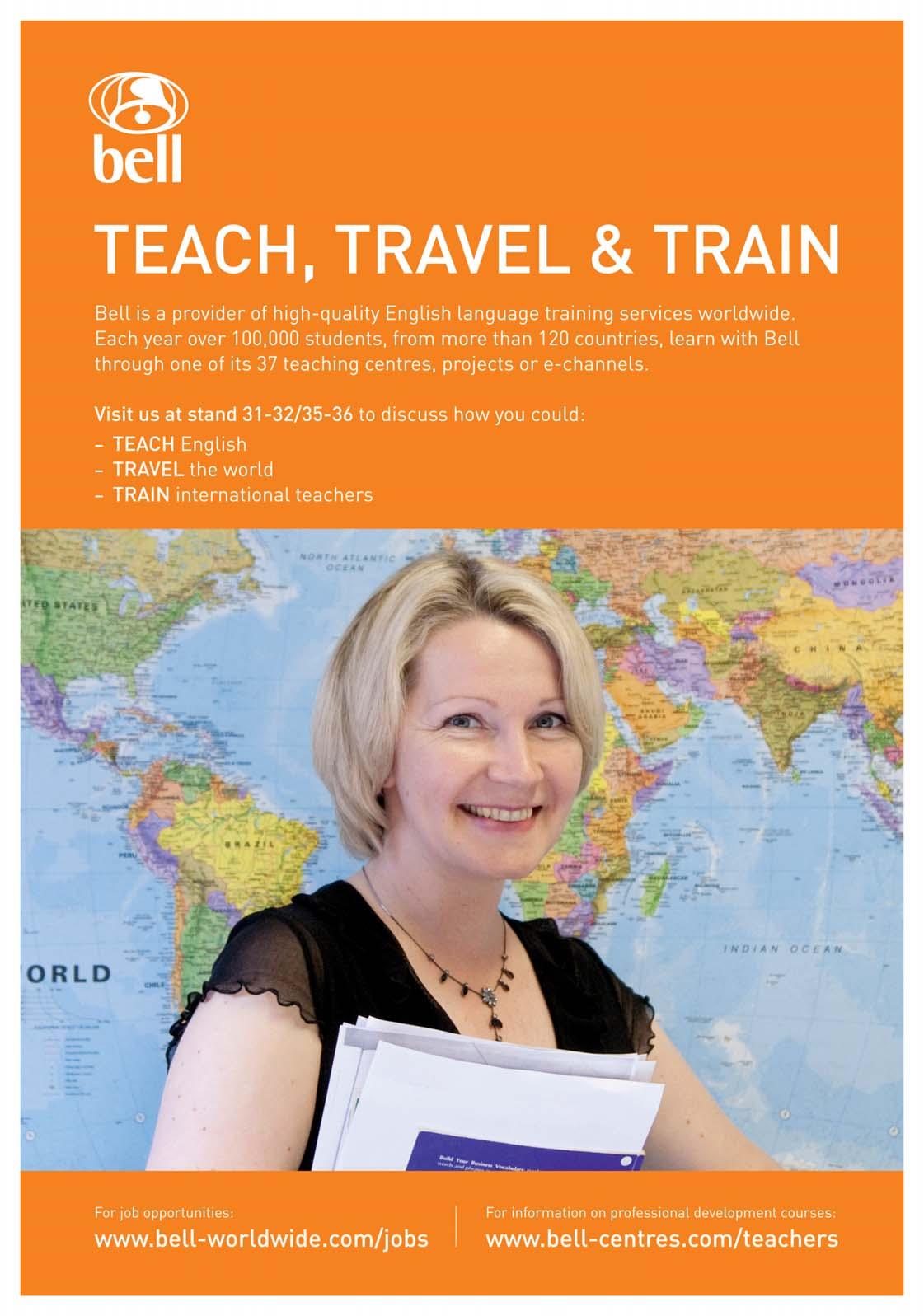


• Advanced Language and Intercultural Awareness
• Advanced Language, Materials and Methodology
• British Studies: Language, Literature and Life
• CLIL for Primary and Secondary Teachers
• Discover Contemporary English
• English for Subject Teachers
• Language and Methodology
• Literature in the Language Classroom
• Management in ELT
• Materials Development in ELT
• From Teacher to Trainer
• Teaching EAP
• Teaching English to Young Learners
• Teaching English in Kindergarten (Very Young Learners)
• From Teaching Knowledge to Teacher Development: TKT and Beyond
• Technology Assisted Language Learning
• Testing, Examining & Assessing Spoken English
• Trainer Development for Teacher Educators


Welcome to this year's IATEFL international conference in Brighton.
The annualconference is bestknownfor its friendly and relaxed atmosphere, where ELT professionals from around 100 countries are able tonetwork, discuss and socialise.
You can enjoy five plenary sessions, foursignature eventsand around 500 sessions consisting of talks, workshops, posters, symposiums, panel discussions, SIG open forums and more.
R
Friday1030-1830
Saturday0800-1730Saturday0830-1730
Sunday0830-1730Sunday0830-1730
Monday0830-1730Monday0830-1730
Tuesday0830-1200Tuesday0830-1200
Your name badge entitles youto access allsessions, the ELT resourcesexhibition and evening events.Please note the room capacity for each session, shown in the left-hand column of the presentation pages. Access to sessions is strictly by badge only and is on a first-come-first-served basis.
Catering points and seating will be located in the exhibition hall.
A complimentary tea/coffee will be served in the exhibition area during the coffee breaks.
During the lunch breakthere will be avariety ofsnacks, salads and hotfoodserved. All food will be offered on a cash basis.
Alternatively, take a stroll and enjoy the many cafés and restaurants in the town, just a few minutes’ walk away. Catering and bar facilities are available just outsidethe exhibition area throughout the day fordelegates to purchase snacks and drinks at other times.
Photocopying facilitiesare providedbythe Brighton Centre.Pleasego to theBrighton Centre’s information desk (located in the foyer), where a member of the Brighton Centre staff will photocopy foryou.The costs for A4 copyare 10p for single-sided and 20p for colour single-sided.They are unable to copy on to OHP transparencies. We regret that no responsibility can be taken by IATEFL or the Brighton Centre in the event of machine failure.
IATEFL’sinformationdesk(sponsoredbyTrinityCollegeLondon)willbestaffedbyour stewards during the registration openingtimes. Available at the information desk are:
-Generalinformationabouttheconference
-CertificatesofAttendance(sponsoredbyEDI).Availableforpre-registereddelegateswho requestedoneontheirregistrationform.Ifyoudidnotaskforacertificate,onecanbe prepared for you at this desk.
Messageboardswillbelocatedinthemainfoyer.You arewelcometoleavemessagesforotherdelegates. Please look frequently at the message boards for any messages which may have been left for you.
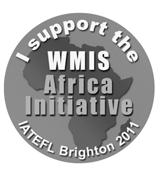
TohelpIATEFLraisemorefundsfortheWiderMembershipIndividualScheme, delegates have the opportunity atconference to buy a badge to show their support. Aminimumdonationof£2isrequired,butweareveryhappytoacceptlarger donations!
BadgeswillbeavailableattheIATEFLregistrationdeskthroughoutthe conference and delegates willbe wearing their badges with pride.
TheWiderMembershipIndividualScheme,launchedin2007,isdesignedtoenable individualIATEFLmemberstosponsormembershipsforcolleaguesintheless economicallydevelopedworldwheretherearenolocalTAswhoareAssociatesof IATEFL.
Currently,wearefocussingonSub-SaharanAfrica.Anumberofmembersofthe professionagreedtobeschemefoundersandstartedafundwhichweuseto matchmembers’donations.Sobydonating£46youcanenableateacherfrom AfricatobecomeafullIATEFLmemberfortwoyears.However,smallerdonations are also verywelcome – so buy a badge to help make this initiative a success.

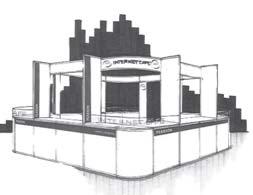
TheInternetCaféissponsoredbyP e a r s o n L o n g m a n .IATEFLismostgrateful toPearsonforprovidingthefinancialsupporttoofferthisopportunity.The InternetCaféissituatedinaprimepositionintheexhibitionareaandwillbe open throughouttheexhibition opening times.
Aswellascheckingemailsandtheweb,theInternetCaféisagreatplaceto checkoutwww.visitbrighton.comtoseewhat’sonandwhatyoucandoin Brighton.ItisalsoanexcellentplacetoplayanactivepartinBrightonOnline (http://iatefl.britishcouncil.org/2011).Thisisjustoneofthemanyactivities Pearson are promoting for general enrichment of the IATEFL community.
ThereisanELTresourcesexhibition,opentoallforthe lengthoftheconference,showingthelatestpublished materials,teachingresourcesandequipment,computersoftwareandservices.Dotaketimetovisitandre-visit the exhibition stands during the conference. You do not need to register to access the exhibition.
Lookoutforthecompetitions,discountsand,maybe,freebies!See ourexhibitors’detailsonpages31-40.The exhibitionisopenfrom0830to1730SaturdaytoMondayandfrom0830to1200onTuesday.(Forsafetyand security, please do not try to enter the exhibition outside these times.)
Delegateswillbegivenaquizsheettocompleteiftheywishforthechancetowinafreeregistrationatthe2012 IATEFL Conference. The clues will guideyou to visitthe participating exhibition stands!
The conference supplement photographer will be takingphotographsforuseinthe post-conference supplement for Voices,onthecoverof ConferenceSelections,onourwebsite,andpossiblyinotheradvertisingand promotionalmaterials.(Ifyoudonotwishyourphotographtobeused,pleaseinformthephotographeratthe time.) The photographerwill be seeking permissionbeforephotographingindividuals.
TheIATEFLAnnualGeneralMeetingwillbeheldinSyndicate1intheBrightonCentreonSunday from1225to1330.Allmembersareinvitedtoattend.AGMReportsarelocatedonpages188-198. TheAGMAgendaislocatedonpage187.Memberswillbeinvitedtoenjoyicecreamthankstothe sponsorship from Sign Language Brings Freedom.

TheJobsMarketoffersauniquespacewheretoporganisationscanfindandrecruithighly-qualifiedteachers andELTprofessionals.
FollowingasuccessfullaunchattheIATEFLConference inHarrogatelast year,thisyear'sJobsMarketis bigger and offers even more opportunities for both recruiters and jobseekers.
WhetheryouareactivelylookingforanewroleinELTorsimplyjustwanttoseewhat’soutthere,theIATEFL JobsMarketistheperfectplacetostart.Jobseekerscanreviewcurrentvacanciesfromarangeofemployers, discussacareerorlocationmovewithcompanyrepresentativesand,formanyposts,submitapplicationsand interview on site.
TheIATEFLJobsMarketis free foralldelegates.VisitusonthegroundfloornexttotheIATEFLregistration desk.
There are cloakroom facilities located on the ground floor. The cost is £1 per item.
ThankstothesponsorshipfromTheUniversityofManchester(SchoolofEducation),wifiinternetaccessisfree fordelegatesinthe Brighton Centre.
1.Simply switch on your computer and browse for the available networks.
2.Connecttothe “Brighton Centre” network.
3.Wait for confirmation that you are connected to this network.
4.Start your internet browser and the dedicated Brighton Centre portal login should appear.
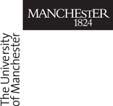
5.Follow the simple on-screen instructions to login using the username: I A T E F L andpassword:b
Trouble Shooting: If you require any help connecting, please feel free to go to the Brighton Centre Information Desk located in the foyer where a member of The Brighton Centre staff will be happy to help.
Thanks to the sponsorship from localorganisations (listed on page 25), we are able to offer delegatesa snack before they leave the conference. All who attend the final plenary session andclosing, from 1320 to 1500 on Tuesday, are welcome to join us as we say farewell untilGlasgow 2012!
VisitBrightonwillbeinattendance attheconferenceandwill besituated in themainfoyeronFridayandatstand 69intheexhibitionfromSaturday.Theywillhavedetailsonlocalevents,thingstodoandsee,travel information, etc. IATEFL thanks VisitBrighton for their help.
IATEFL is extremely grateful for the help given by local ELT friends from the Brighton area.
Their local knowledge has been invaluable and we thank them for their support over the pastyear.
Please turn your mobile phone/cellphone off during sessions. Since 2007, smoking is prohibitedinside allbuildings in the UK. We regretthat no responsibilitycan be taken by IATEFL for the loss of personal belongings or for accidents.
This Conference Programmecontainsfull information on the academic sessions. This information replaces s the provisional l Preview w of f Presentations listed in the Preview Brochurethatyoureceived earlier this year. The information contained in the Preview Brochure is no longer current.
Changesmadeto the programme after the printingof this Conference Programmewill bedisplayed onnotice boards located inthemain foyer. Please e check k the e presentation n message e boards s frequently y for r last-minute changes s and d cancellations.
These morning sessionsaimto inform and support delegates across a range of areas they may be unfamiliar with. The sessions will take place from 0815 to 0845, giving you time to get to the plenary sessions.
S a t u r d a y 1 6 th A p r i l
0 8 1 5 - 0 8 4 5 i n R o o m 1
H
Susan Bardhun
This session is for new IATEFL conference participants as well as those of you who have attended many conferences... but feel yourexperience could go deeper. Wewill analyze the programme, form learning groups for those who wish to jigsaw their conference experience, and share conference time management tips.
S a t u r d a y 1 6 th A p r i l
0 8 1 5 - 0 8 4 5 i n R o o m 3
H o w t o r e f l e c t o n r e s e a r c h t a l k s a t t h e c o n f e r e n c e
Simon Borg
Many IATEFLconferencesessions present research undertakenin variousEnglish language teachingsettings. This session highlights issues which conferenceparticipants mightconsiderwhen reflecting ontheresearch they hear about during the conference and when considering its relevance to their own professional contexts
S u n d a y 1 7 th A p r i l
0 8 1 5 - 0 8 4 5 i n R o o m 1
H o w t o w r i t e a n a r t i c l e f o r a t e a c he r s ’ ’ m a g a z i n e
Helena Gomm
The editor of English Teaching Professional will talk about the advantages of getting articles published, what editors are looking for, how best to present your work, and how to increase the chances of having it accepted.
S u n d a y 1 7 th A p r i l
0 8 1 5 - 0 8 4 5 i n R o o m 3
H o w t o s e t u p a n d r u n a n E L T b l o g
Lindsay Clandfield
The world of ELT blogs is continually growing and providing a new way of continuing professional development for teachers. InthissessionI will goover the basics of starting ablog for teachers and howyou canmake the most out of this medium.
S u n d a y 1 7 th A pr i l
0 8 1 5 - 0 8 4 5 i n R o o m 5
H o w t o g e t p u b l i s h e d i n a r e fe r e e d j o u r n a l
Keith Morrow
This session willlook at why you might want toget published in an "academic" journal,and how to go about it. The editor of ELTJournalwill share tips and suggestions for getting your work in print.
M o n d a y 1 8 th A p r i l
0 8 1 5 - 0 8 4 5 i n R o o m 1
H o w t o g i v e a p r e s e n t a t i o n a t a n i n t e r n a t i o n a l c o n f e r e n c e
Catherine Walter
Giving a presentation can be a stressful experience. This session will give you ways of organising yourself before your presentation and conducting yourself during your presentation to reduce that stress. The aim of the session is to make your presentation a more satisfying experience for you and for your participants.
M o n d a y 1 8 th A p r i l
0 8 1 5 - 0 8 4 5 i n R o o m 3
H o w t o g e t t h e m o s t f r o m y o u r M A c o u r s e
Shelagh Rixon
In this session I willdraw on my experiences asan MA tutor and on the perspectives of somerecentMA students, collected by questionnaireand interviews. Themes will include 'How I chose mycourse', 'Myworst mistake', ‘What I would definitely do again/never do again'.
T u e s d a y 1 9 th A p r i l
0 8 1 5 - 0 8 4 5 i n R o o m 1
H o w t o w r i t e s u c c e s s f u l l y f o r IATEFL L Conference e Selections
Tania Pattison
Areyou presenting at IATEFL? If so,you maywrite up your sessionfor consideration forIATEFL’s annual Conference Selections publication. The editor will provide guidance on how to prepare your report, will show examples of past submissions that were accepted for publication, and will answer any questions you have.
T u e s d a y 1 9 th A p r i l
0 8 1 5 - 0 8 4 5 i n R o o m 3
H o w t o g r o w a P e r s o n a l L e a r n i n g N e t w o r k ( P L N )
Nik Peachey
Having ahealthyPLNcanhelp youget newideas,keep intouch with what'shappening in the world and become akey part of your professionaldevelopment,but howdo you growone? Come alongand find out how to make your PLN work for you.
The tribute session isanopportunity to remember colleagues who've died during the year since thelast conference. If you'velost a colleagueorformer colleague, you'llhave an opportunity to say a few words in their memory and, if you wish, tobring along a memento (book, teaching materials, etc.). Or you may just want to come to the session to hear about colleagues who areno longer with us, andperhaps to addany memories you may have.
The tribute session will take place on Sunday 17th April from 1130 to 1215 in Room 9.
Thesymposiums are timetabledin the afternoons of thefirst three conference days. They are a chanceto treat onesubjectin depth, hearexperiencedvoices on thetopic and to staywith the same colleagues for the length of the symposium. Once you have chosen a symposium and attended, please stay with it. The symposiums willnot work well if delegates pop in and out of them.
Introducedin Harrogate 2010,this is our second Interactive LanguageFair, taking place on Sunday from 1335 to 1535in Syndicate 2. This is an event not to miss... and is the conference format of the future! 21presenters race through thumbnail outlines of presentations on a wide variety of topics and then invite you to explore their interests with them, making useofposters, realia, handouts and a wide rangeofinteractive computer and paper-based materials. The topics exploredinclude CLIL,creative writing in English, EAP and ESP, e-learning, multilingual educationandvarieties of English forlanguage teachers,andinclude accounts ofclassroom practice and summaries of research. Afeast for everyone, with a whole conference packed into a single session.
The name of A.S. Hornby is highlyregarded in the ELT world, not only through his publications and ideas on teaching methodsbut also throughthework ofthe A.S. Hornby Educational Trust,set up in 1961. Thiswas a farsighted andgenerous initiative whereby alargeproportion of Hornby'sincome was set asidetoimprove the teaching and learning ofEnglish asaforeign language, chiefly by providinggrantsto enable English teachers from overseas to come toBritain for professional training. Hornby's aim was that the Trust's money should be used foreducationand go backto the countriesfrom whichit comes. Thanks totheTrust, hundredsofteachers have been able to develop their expertise throughBritish Council-organised workshops andthrough postgraduate courses in ELT and (applied) linguistics at British universities.
This year there are 10 Hornby scholars from developing or transitional countries studying for postgraduate qualifications in three UK institutions. The scholars invite delegates to join them for a presentation and discussion on "Teacher training: practice andreality"onSaturday (1040-1140 in Room 1).We areexpecting this will offer a stimulating and informative perspective on teacher training and issues confronting teacher training in different countries.
Two Hornby Alumni will also bepresenting solo. Theywillpresent on new perspectivesin ELTthey have been exploring following their Masters. The alumni are Oscar Hernan Montoya Gomez from Colombia, who will be speakingabout teacher training for teaching children(Monday 1345-1415 in Room 1), andKrishna Kalyan Dixit from India, who will speak about what motivates teachers (Sunday 1025-1055 in Room 1).
2011 is the 50th anniversary of the A S Hornby Education Trust. RogerBowers, Chairman of the Trust, will present a session exploring Hornby’s legacy on Saturday (1445-1530 in Auditorium 2).

Weaimtomaketheconferenceaccessibletomanythousandsmoreparticipants,bothmembersandnonmembers,throughBrightonOnline.Remotedelegateswillbeabletowatchlivevideosessionsandrecorded highlightsoftheconferenceontheBrightonOnlinewebsiteandaccessawiderangeofmultimediaresources includingaudioandPowerPointpresentationsofthemajorityofthesessions.Onlinedelegateswillalsobeable toparticipateindiscussionforumslinkedtothemainconferencethemesandpostmessagesaboutindividual presentations.
BrightonOnlinewillshowcasethebestoftheconferenceandprovideinteractivewebcoverageforremote participantsaroundtheglobewithlivevideo,participantinterviews,dedicatedforums,alargephotogalleryand muchmore.
InordertomaximizethepotentialofBrightonOnline,membersgivingpresentationsattheconferenceand exhibitorshavetheopportunitytopostmaterialtotheBrightonOnlinewebsite.Ascomingtotheconferencein personisn’tpossibleforallmembers,wehopethatBrightonOnlinewillbeaverygoodsecondbestforthose unabletoattend.
Thisinitiative,nowinitsfifthyear,isbroughtaboutbycollaborationbetweenIATEFLandtheBritishCouncilin linewithourcharitableaimsoflinking,developingandsupportingELTprofessionalsworldwide.Oursincere thankstotheBritishCouncilforprovidingtheinfrastructureandhumanresourcesaswellasthegenerous supportwithout whichthisinitiative wouldnotbepossible.
A c o m m e n t f r o
‘Theonlineconferencehasbeenanextraordinaryexperience-wecouldn’thavedreamtthiswaspossiblewhen IwaspresidentofIATEFL,andcentraltotheIATEFLmission.HarrogateOnline–lastyear’sonlinecoverage turnedtheexclusiveintotheinclusive.It’snothinglessthanthedemocratisationofaccesstoinformation.
H o w y o u c a n g e t i n v o l v e d Whetheryou'vebrought yourown laptopwithyou oryouuse theInternetCafé,do considerplayinganactivepart intheday-to-dayproceedingsbysharingphotos,tweetsoryourreflectionsifyouhaveablogofyourown;get involved with the forums, especially if you have a special interest deartoyour heart.
Over40,000remote participantswillgetinvolvedwithlivechats,twitter andmayevenbeholding alocaleventin their areawith a teacher training focus around the online conference.
WehopeyoujoininwithIATEFLBrightonOnlinetoshareyourideasontheIATEFLBrightonConferencewith teachers fromall over the world and be a partofone of the biggest online events for teachers of English.







Your opportunitytoshowyoursupportfortheWMIS-AfricanInitiative.Makeadonation, wearyourbadgewithpride,andhelpcolleaguesinSub-SaharanAfricatobecome members of IATEFL. (See page 10 for information on the WMIS-African Initiative.

Buyabadge–Showyoucare
Wesawanincreaseinthenumberofscholarshipsavailableforour2010conferenceinHarrogate.Butwe aredelightedthattherewereeven morethisyear–26scholarships,enablingteachers,trainersandothers involved in ELT to attend this conference.
Wethankall sponsorsfortheirgenerousfinancialsupportinproviding theirscholarshipsandwethank our members and delegates who make kind donations to our scholarship funds.
Please seethefollowingsection forinformation onthescholarshipsandthisyear’swinners.
TheIATEFLScholarshipWorkingParty(SWP)hasastandintheexhibitionwhereyoucanfindoutmore,or evendiscusssettingupanewscholarshiptohelpevenmoreELTfriendstomakeittoourannual conferences.
Attheendoffourdaysofenjoyment,learningandnetworking,taketimetorelaxwithasnackbeforeyour journey home.Sponsoredbylocal organisations,thisinformal gatheringisforalldelegateswhoattendthe final plenary and closing on Tuesday afternoon. (See pages12 and161forinformation.)
AsyouenterAuditorium2forthefinalplenary(Jugglingwithgerbils–poetryoffthepage byBrianPatten), simplydeposityourconferencebadgeintheboxprovided.Duringtheclosingannouncementsbythenew IATEFLPresident,EricBaber,thebadgeswillbeusedasaraffletickettoselectawinnerofourraffle–an iPad kindly sponsoredby Cambridge University Press.
The final plenary and closing are on Tuesday from 1320to 1500.

AtthebackoftheProgramme(pages207&208)wehaveprovidedapull-outversionofthefloorplansfor you totear out and carry with you.
IATEFL has a ScholarshipWorking Party (SWP) whose job itis to raise scholarship funds,createnewscholarships, publicise theexistence ofthe current scholarshipstoteachersworldwide, and selectscholarship winners. The SWP also works to improve the conference experiencefor scholarshipwinners andfutureapplicants. To these endsthere is a scholarshipstand inthe exhibition this year – located by the IATEFL stand – andsomeonefrom the SWP will be there duringthemorning coffee break each day to answer questions and receivegenerousoffers of sponsorshipfor new scholarships, so whether youare acurrentor past scholar, apotential applicant,or a potential sponsor, do come along for a chat.
Wenowofferover20 scholarshipsto enable teachers, trainersand ELT professionals the opportunity toattend the annual conference.I I
Please visit w
from late May 2011 for details of how to apply fora scholarship to attend the 2012 conference in Glasgow. The deadline for 2012 conference scholarship applications is 22nd August 2011.
Deadline – 4th May 2011
This scholarship,fundedby Consultants-E, isfor teachers unabletoattend our annualconference inperson butwho participateactivelyintheonline conference Moodle by making relevant andthoughtful postings. You donothave to be amemberof IATEFL toapply for thisscholarship.The scholarship consistsof a fully funded two-week online course selectedfrom the Consultants-E course list.
Please visit w w w w i a te f l o r g / s c h o l a r s h i p s for detailsofhow to apply.
We arepleased toannounce that the winner of the Harrogate 2010 scholarship (awarded in May 2010) wasT T a r i k
B o u s s et t a from Morocco.
Beloware briefdescriptions of all the scholarshipsbut pleasevisit w w w w i a te f l o r g / s c h o l a r s h i p s for fulldetails:
A f r ic a S c ho l ar s hi p- This isthe third year of the IATEFL Africa Scholarship, the purpose of which is toenable primary or secondary schoolteachers or teacher trainers fromAfrican countries to attend the annual IATEFL conference.
B E S I G Fa c i l i t a to r S c h o l a r s h i p –– A newscholarshipawardedtoa teacher who is interested in startingup and facilitating local business English events and contributing to BE SIG.
C ac t u s t o C o n f e r e n c e S c h o l a r s h i p- This scholarshipis for a newlyqualified teacherwith between one andthree years’ experiencein the ELT profession to come toconference.
C am b r id g e ES O L B e s t P ra c t i c e i n En g l is h f o r A c a d e m i c P ur p o s e s Sc h o l a r s h i p- A newscholarship giving the opportunity for any teacher involved with teachingEAP to attendthe conference.
C am b r id g e ES O L B e s t P ra c t i c e i n L an
A
h i p- The aim ofthis scholarship istoexplore the processof washback in the classroomand the positive impact on the development ofreading skills.
C am b r id g e ES O L B e s t P r a c t ic e i n S t a t e E d uc a t i o n S c h o l a r s h i p –– A newscholarship enabling a teacherinvolved in state education to attendthe conference.
C a m b r id g e ES O L B es t P r a c t i c e i n T e a c h e r T r a i n i n g S c h o l a r s h i p - This scholarship provides an opportunityfor any teacher involved with the training and developmentoftheir colleagues to attend IATEFL.
F r a n k B e l l S c h o l a r s h i p- This scholarship is run bytheBell Trust in memory oftheir founder. The purposeof the scholarship is to help new teachers to attend IATEFL’s annual conference for the first time.
G i l l S t u r t r i d g e F i r s t - T i m e S p e a k e r S c h o l a r s h i p - This scholarshipisawarded fromthe donationsmade inmemory of Gillby her family and friends in IATEFL. It is intended to encourage IATEFL members with between three and ten years’ experience in the ELT profession to give theirfirsttalkat our annualconference.
G i l l ia n P o r t e r - L a d o u s s e S c h o l a r s h i p- Gillian Porter-Ladousse was the driving force in setting up the IATEFL Teacher Training & EducationSIG conference fund to enableatrainer/trainee toattend our conference.After Gillian’s untimelydeath in2002,the SIG renamed the scholarship in her honour.
I n t e r na t i o n a l H o u s e G l o b a l R e a ch h s c h o l a r s h i p- This scholarship which fundstwo awards has been set up to helpteachers unable to benefit fromcheap airfares to reach the UKand attend the conference for the first time.
I n t e r na t io n a l H o u s e J o h n H a y c r a f t C l a s s r o o m E x p l o r a t i o n S c h o l a r s h i p - This scholarship,originallyoffered on aone-off basis for Exeter2008 byJane Willis and CoronyEdwards, has since been funded by International House inmemory of their founder, John Haycraft. Two awardsare offered annually for teachers embarking on small-scale classroom exploration projects.
I n t e r na t i o n a l H o u s e T r a i n i n g & D e v e l o p m e n t S c h o l a r s h i p - This scholarship,fundedby InternationalHouse London, aimsto bringa teachertrainer/developer from publicor private sector to present theirwork to thewider audienceofan IATEFL conference and toenable that person to disseminate knowledge and skills back to their local workplace.
L a t i n Am e r i c a S c ho l a r s h i p- This scholarship was set up in2009 with fundsgenerated atthe previous annualconference.This scholarship will bring a teacher or a teacher trainer from Latin America to the annual conference.
L e a d e r s h i p & M a n a g e m e nt t S I G S c h o l a r s h i p - Thisnew scholarship isfor aperson in an ELT leadership/managementroleto attend the conference, with the aimofassisting managers not otherwise funded to attend.
L e a r n i n g Te c h n o l o g i e s S I G D i a n a E a s t m e n t S c h o l a r s h i p - A new scholarshipto commemorateDianaEastment,the founderof MUESLI (now the LT SIG). The scholarship is open to all and the winner is expected tobecome actively involved in the LT SIG.
L e a r n i n g Te c h n o l o g i e s S I G T r a v e l S c h o l a r s h i p- Thisgrant is funded by theIATEFLLearning TechnologiesSIGto assist one or two of their members withtravelling expenses to come andpresentatconference.
O I S E Y o un g L e a r n e r s S c h o l a r s h i p - This scholarship isto enable apractising teacher of young learners (18 yearsoldor younger) to attend the conferencefor the first time.
P e te r H a r g r e a v e s S c h o l a r s h i p- S ponsoredby Cambridge ESOL, inmemory of DrPeter Hargreaves, this scholarship is open to anyone who works in thefieldsof ELT or language assessment.
P i l g r i m s H u m a n i s i n g L a n g u a g e T e a c h i ng g S c h o l a r s h i p - Thisscholarship isfor a practisingteacherwho has recently explored a person-centred approach in Englishlanguage teaching.
P il g r i m s T ea c h e r T r a i n e r J o ur na l S c hol a r s h i p - Thisscholarship isfor a practising teacherorteacher trainerto lead a workshop atthe annual conference.
R a y T o n g u e S c h o l a r s h i p- This scholarship was set up in memory of Ray Tongue, an IATEFL Treasurer, with donations from many colleaguesand friends. It helpsIATEFL membersfromthe countries he worked in(HongKong,India, Indonesia,Malaysia, Singapore, Sri Lanka and Thailand) to attend our conference and give a presentation.
T e a c h e r D e v e l o p m e n t SI G A r t i c u l a t i n g D e v e l o p m e n t S c h o l a r s h i p- This scholarship isfora member ofTD SIGto attend the conference and undertake to write three short articles ontheir own development for the SIG newsletter.
T r i n i t y C o l l e g e L o n d o n L a n g u a g e E x a m i n a ti o ns s S c h o l a r s h i p - This scholarship enablesan ELT professional to present inthe Testing,Evaluation and Assessment SIG programme.
T r i n i t y C o l l e g e L o n do n T e a c h e r T r a i n e r S c h o l a r s h ip p- This scholarship enables a trainerworking inthe fieldof teacher qualifying courses to give atalk or lead a workshop at conference.
W R L e e S c h o l a r s h i p- BillLee was thefounder chairman of IATEFL and thisscholarship,set up as amemorial to him, assists IATEFL members from thecountries he worked in (CzechRepublic, Slovakia, Bulgaria,Romania, Polandand Hungary) to attend and present at conference.
Please check w w w i a t e f l o r g / s c h o l a r s h i p s from late May 2011 for information and to apply for a scholarship for our 2012 conference in Glasgow – application deadline: 22nd August 2011.
A f r i c a S c h o l a r s h i p W i n n e r
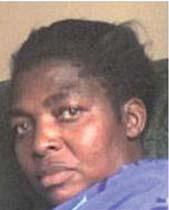
O d d C h i m w a d z i m b a Z i m b a b w e

C a m i l l a H e a t h U K C
C a m b r i d g e E S O L B e s t P r a c t i c e i n
S t a t e E d u c a t i o n S c h o l a r s h i p W i n n e r
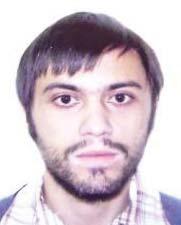
M a t i a s D e P a u l a
A r g e n t i n a
I A T E F L B E S I G F a c i l i t a t o r
S c h o l a r s h i p W i n n e r
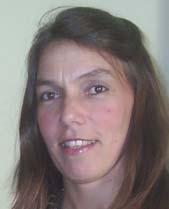
M e r c e d e s V i o l a
U r u g u a y
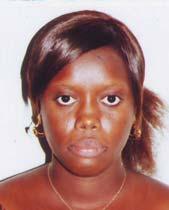
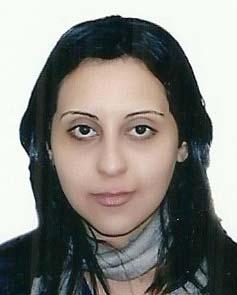
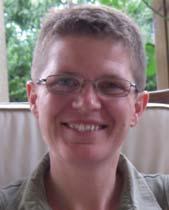
C a m b r i d g e E S O L B e s t P r a c t i c e i n
T e a c h e r T r a i n i n g S c h o l a r s h i p W i n n e r
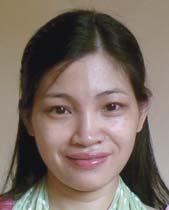
T h i Q u y n h L e T r a n
V i e t n a m
I A T E F L G i l l S t u r t r i d g e F i r s t - T i m e
S p e a k e r S c h o l a r s h i p W i n n e r
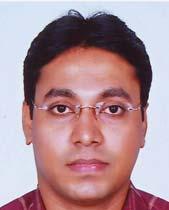
B i j o y B a s u
B a n g l a d e s h
L B e s t P r a c t i c e i n
L a n g u a g e A s s e s s m e n t S c h o l a r s h i p W i n n e r
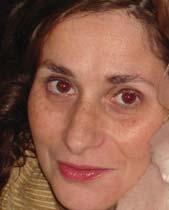
S u s a n a D i c h i e r a
A r g e n t i n a
F r a n k B e l l S c h o l a r s h i p W i n n e r

K hi l a S h a r m a P o k h a r e l N e p a l
I A T E F L G i l l i a n P o r t e r L a d o u s s e
S c h o l a r s h i p W i n n e r
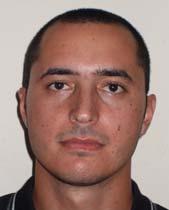
D a n i e l X e r r i
M a l t a - 21-
I A T E F L L a t i n A m e r i c a S c h o l a r s h i p W i n n e r
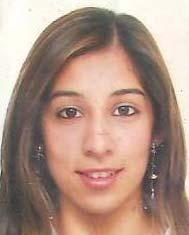
C a r l a C r u z P e r u
I A T E F L L e a r n i n g T e c h n o l o g i e s S I G
T r a v e l S c h o l a r s h i p W i n n e r
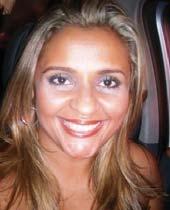
R a q u e l O l i v e i r a B r a z i l
I n t e r n a t i o n a l H o u s e G l o b a l R e a c h
S c h o l a r s h i p W i n n e r
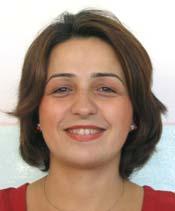
V l o r a D u s h i K o s o v a
O I S E Y o u n g L e a r n e r s S c h o l a r s h i p W i n n e r

A n n a M u s i e l a k
P o l a n d
I A T E F L L e a d e r s h i p & M a n a g e m e n t
S I G S ch o l a r s h i p W i n n e r
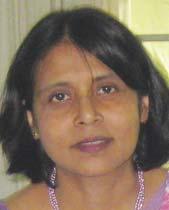
R u b i n a K h a n
B a n g l a d e s h
I A T E F L R a y T o n g u e S c h o l a r s h i p W i n n e r
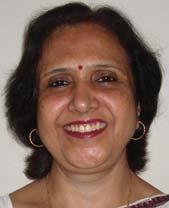
A n i t a T a m u l i I n d i a
I n t e r n a t i o n a l H o u s e G l o b a l R e a c h
S c h o l a r s h i p W i n n e r
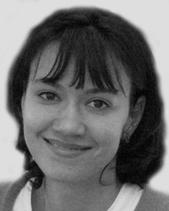
S v e t l a n a R o z h k o v a R u s s i a
P e t e r H a r g r e a v e s S c h o l a r s h i p W i n n e r
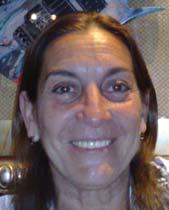
C l a r i s a R e m y
A r g e n t i n a
I A T E F L L e a r n i n g T e c h n o l o g i e s S I G
D i a n a E a s t m e n t S c h o l a r s h i p W i n n e r
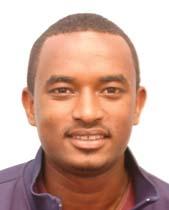
A w g i c h e w A r e g a
E t h i o p i a
I A T E F L W R L e e S c h o l a r s h i p W i n n e r
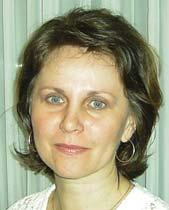
A n i s o a r a P o p R o m a n i a
I n t e r n a t i o n a l H o u s e T r a i n i n g &
D e v e l o p m e n t S c h o l a r s h i p W i n n e r
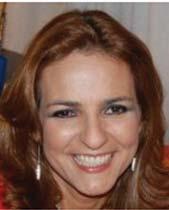
C a r l a A r e n a B r a z i l
P i l g r i m s H u m a n i s i n g L a n g u a g e
T e a c h i n g S c h o l a r s h i p W i n n e r
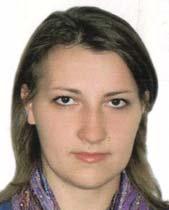
E k a t e r i n a R u d e n k o
R u s s i a
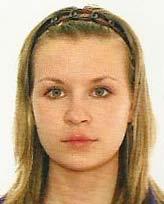

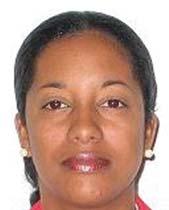
One of the true pleasuresof theIATEFLConferenceis the opportunityit provides to celebrate the work of colleagues who have contributed to the professionallives of us all.Theseinclude the IATEFLscholarship winners whose sessions are scheduled asfollows:
TheI I A T E F L B E S I G F a c i l i t a t o r S c h o l a r s h i p winner,M M e r c e d e s V i o l a , whose talk on ‘Themanyroles we performas business English trainers’ takes place on Sunday at 1610 in Room 6.
TheI I A T E F L G i l l S t u r t r i d g e F i r s t - T i m e S p e a k e r S c h o l a r s h i p winner, , B i j o y B a s u , whose talkon ‘Criticalpedagogy andappropriationofEnglish in ELT in Bangladesh’ takes place on Saturday at 1400 in Room 5.
TheI I A T E F L G i l l i a n P o r t e r - L a d o u s s e S c h o l a r s h i p winner,D D a n i e l X e r r i ,whose talk on‘The multimodal approachto using poetryinELT’ takes place on Mondayat 1430 in Room 3.
TheI I A T E F L L e a d e r s h i p & M a n a g e m e n t S I G S c h o l a r s h i p winner,R R u b i n a K h a n ,whoseworkshop on ‘Developing effective leadershipskills and strategies’ takes place on Saturdayat 1445 in Gresham.
TheI I A T E F L L e a r n i n g T e c h n o l o g i e s S I G D i a n a
h i p winner,A A w g i c h e w A r e g a , whose talk on ‘Teaching English language through eLearning/learning technologies’ takes place on Monday at1345inGresham.
TheI I A T E F L L e a r n i n g T e c h n o l o g i e s S I G T r a v e l S c h o l a r s h i p winner,R R a q u e l O l i v e i r a , whose talk on ‘CULTWEEPLE: enhancing interaction and collaboration among EFLlearners’ takes place on Monday at1430inGresham.
TheI I A T E F L R a y T o n g u e S c h o l a r s h i p winner,A A n i t a T a m u l i ,whose presentationon ‘Teaching academicwriting: a process-oriented approach for undergraduate students’takes place inthe AcademicWriting symposium on Sunday, held from 1610 in Room 1.
TheI I A T E F L W R L e e S c h o l a r s h i p winner,A A n i s o a r a P o p ,whose talk on‘Integrating asynchronouswriting and speaking toolsfor EFLlearning optimisation’ takes place on Saturdayat 1400in Tudor.
TheI I n t e r n a t i o n a l H o u s e T r a i n i n g & D e v e l o p m e n t S c h o l a r s h i p winner,C C a r l a A r e n a ,whose talk on‘Online collaboration: a showcase of educator-generateddigital production’ takes placeon Tuesdayat 1125 in Gresham.
TheP P i l g r i m s T e a c h e r T r a i n
B
o u s o v a ,whose workshop on ‘Developing social and emotional skills in the Englishclassroom’ takes place on Sundayat 1130 in Boardroom.
TheT T r i n i t y C o l l e g e L o n
h i p winner,M M
r i n e l a C o j o c a r i u ,whose talk on ‘Assessment practices and students’creativity’ takes place on Saturday at 1400 in Room10.
TheT T r i n i t y C
, whose talk on ‘A blogfor trainingteachers to integrate videosin class’ takes place on Mondayat1550 in Boardroom.
We hope you'll show your supportby attendingthese sessions if you can. IATEFL isdelighted to be associatedwiththeawards that recognisetheir achievement.Good luckto allof them,andmany congratulations!
I A T E F L w o u l d l i k e t o t h a n k a n d a c k n o w l e d g e t h e f o l l o w i n g s p o n s o r s f o r t h e i r g e n e r o u s c o n t r i b u t i o n t o t h e s u c c e s s o f t h i s c o n f e r e n c e :



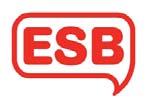






B a r c e l o O l d S h i p H o t e l for providing andsponsoring theffl o w er s , fr u i t an d w i n e f or r o u r p l e na r y s p e a k e r s andforssu b s i d i s e d h o t e l r o o m s a n d c ar r p a r k i n g for
IATEFL staff, volunteersand plenary speakers
B r i t i s h C o u n c i l for sponsoringB B r i g h t o n O n l i n e and thes s p e ak e r q u i e t r o o m
C a m b r i d g e U n i v e r s i t y P r e s s for providing and sponsoringa a n i P ad d f o r t h e r a f f l e f o l l o w i n g t h e f i n a l p l e n ar y o f t h e c o nf e r e nc e
D . I s o m P r i n t for providing andsponsoring thec c o n f e r e n c e p o s t e r s and s i g n a g e around the venue
E D I for providing and sponsoringthe d e l e g a t e a t t e n d a nc e c e r t if i c at e s
E n g l i s h S p e a k i n g B o a r d for sponsoringthe c o f f e e br e a k s o n S at u r d ay 1 6 th A p r i l
E T S T O E F L ® & T O E I C ® forproviding and sponsoring the d e le g a t e b a g s
I E L T S for sponsoringtheb b a d g es s and providing thel l a n y a r d s , for sponsoringthe st e w ar d s and providing their t-shirts,and for sponsoring theC C o n fe r e n c e P r o g r a m m e and B o o k m ar k
M a i l a b i l i t y L t d for sponsoringthe p r e l i m i n a r y c o n f e r e nc e b r o c h u r e (JuneDecember)
P e a r s o n L o n g m a n for sponsoringtheI I n t e r ne t c a fé andthe P ec h a K u c h a e v e n i n g e v en t o n S u n d a y 17 th Ap r i l
P i l g r i m s for sponsoring Conference e Selections s (Harrogate e 2010) and the P r e v i e w c o n f e r e nc e b r o c h u r e (December-April)
R o y a l R a n g e r s S c h o o l , B a n g l a d e s h for sponsoringthep p a r t i c i p a n t s l i st







S i g n L a n g u a g e b r i n g s F r e e d o m forsponsoringtheI A T E F L A n n u a l
G e n e r a l M e e t i n g
T r i n i t y C o l l e g e L o n d o n for sponsoringthei n f o r m a t i o n d e s k
U n i v e r s i t y o f B r i g h t o n forsponsoringa c o a c h t r i p t h r o u g h t h e S u s s e x
c o u n t r y s i d e a n d w i n e t a s t i n g a t P l u m p t o n C o l l e g e , U n i v e r s i t y o f B r i g h t o n
U n i v e r s i t y o f C a m b r i d g e E S O L E x a m i n a t i o n s forsponsoringthe
I A T E F L A s s o c i a t e s ’ D a y ,andtheS V A D i n n e r
U n i v e r s i t y o f K e n t ’ s C e n t r e f o r E n g l i s h & W o r l d L a n g u a g e s forsponsoringtheI A T E F L e x h i b i t i o n s t a n d
U n i v e r s i t y o f M a n c h e s t e r ( S c h o o l o f E d u c a t i o n ) forsponsoring f r e e w i f i i n t e r n e t a c c e s s f o r a l l d e l e g a t e s
V i s i t B r i g h t o n forsponsoringa c o a c h f o r a d a y t o u r t o L e w e s C a s t l e









www.elfsussexexamcentre.co.uk www.elfinsussex.co.uk
T h e I A T E F L C o n f e r e n c e F a r e w e l l issponsoredbythe followinglocal organisations:
B r i t i s h S t u d y C e n t r e s T e a c h e r T r a i n i n g L t d
C a c t u s L a n g u a g e T r a i n i n g
E C B r i g h t o n
E n g l i s h L a n g u a g e C e n t r e
I S I S S t u d y C e n t r e s , B r i g h t o n
L a n g u a g e P l u s / S p r a c h c a f f e
S u s s e x C e n t r e f o r L a n g u a g e S t u d i e s
S u s s e x D i r e c t o r o f S t u d i e s A s s o c i a t i o n
S u s s e x O p e n C e n t r e f o r E x a m i n a t i o n s (Seepages12&161fordetailsontheIATEFLConferenceFarewell.)
I A T E F L i s m o s t g r a t e f u l f o r t h e f i n a n c i a l s u p p o r t f r o m a l l t h e s e s p o n s o r s W e a r e a l w a y s l o o k i n g f o r n e w s p o n s o r s a n d n e w i d e a s t o b e s p o n s o r e d t o e n a b l e I A T E F L t o h o s t a m e m o r a b l e c o n f e r e n c e f o r o u r m e m b e r s a n d d e l e g a t e s . I f y o u a r e i n t e r e s t e d i n s p o n s o r i n g a p a r t o f I A T E F L ' s n e x t A n n u a l C o n f e r e n c e i n G l a s g o w , A p r i l 2 0 1 2 , p l e a s e s e e A l i s o n W a l l i s , I A T E F L M a r k e t i n g & S p o n s o r s h i p O f f i c e r , a t c o n f e r e n c e o r c o n t a c t h e r a t t h e I A T E F L H e a d O f f i c e o n a w a l l i s @ i a t e f l . o r g - 25-
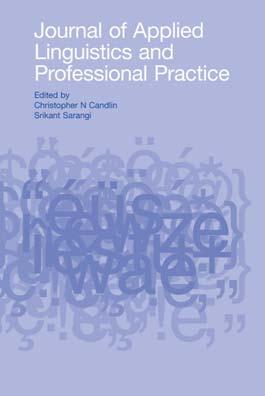
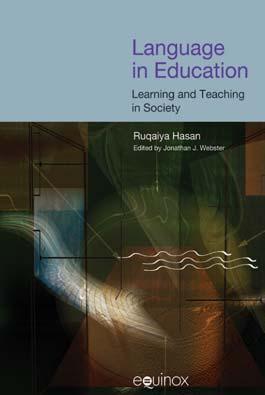
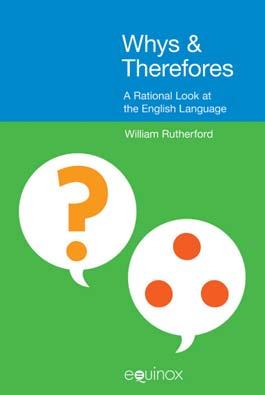
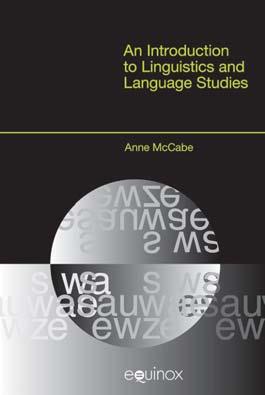
Language and Education: Learning and Teaching in Society
Ruqaiya Hasan
‘The well-deserved reputation of systemic-functional linguistics as the most education-friendly theoretical paradigm for language analysis is intricately interwoven with and supported by the life-long work of Ruqaiya Hasan. In this third volume of her collected works, readers will have the intellectual pleasure of encounte ring the astounding breadth of knowledge and spiritedness of commitments she brings to the learning and teaching of languages understood as a socia l-semiotic process of meaning-making.’
Heidi Byrnes, George M. Roth Distinguished Professor of German, President, American Association for Applied Linguistics, Georgetown University Series: The Collected Works of Ruqaiya Hasan (Volume 3) July 2011 320pp 234 x 156mm pb
ISBN 9781904768388 £20.00
Whys & Therefores: A Rational Look at the English Language
William Rutherford
Whys & Therefores aids the reader to arrive at generalizations for the shape of the English language: words, grammar, meaning, sound and spelling. The format adopted throughout is that of a light-hearted ongoing Socratic dialogue between a mentor and a pupil. It can be read as a book, listene d to on the accompanying audio CD, dipped into at random, expanded upon, even acted out. Whys & Therefores is intended as an entertaining yet serious ‘do-it-you rself’ book about aspects of English language form and meaning. However, it will also prove useful to schools as classroom material to be further exploited by the instructor in f ree-range dialogue form, and to institutions offering teacher training in rational-based instructional procedures for English language education in schools.
March 2011 192pp 234 x 156mm 11 b&w illustrations Accompanied by an audio CD pb ISBN 9781845536510 £15.99
An Introduction to Linguistics and Language Studies
Anne McCabe
‘Anne McCabe presents an enormously appealing, accessible, and up to date treatment of the field to those who always wanted to k now what it was all about – but, perhaps, were afraid to ask! They will come to explore the major modal ities of language use and their relation to mind, appreciate the e xuberance of language change and variation in social context, and consider the complexities of language learning and development in relation to our biological make-up. Al ways, they will be involved on all levels: as inquirers interested in major theoretical questions and empirical approaches; as language users who are constantly invited to reflect on the nature of language through an unusually rich and engaging array of exercise that enliven each chapter of the book; as learners seeking assurances, through chapter summaries, a glossary, and exercise answers, that their own reading of the issues is accurate; and as students of the field desiring to place their new knowledge wi thin other areas of linguistics and to receive suggestions for further reading.’
Heidi Byrnes, George M. Roth Distinguished Professor of German, Georgetown University
Series: Equinox Textbooks and Surveys in Linguistics February 2011 408pp 244 x 169mm 78 b&w figures pb ISBN 9781845534264 £15.99
Journal of Applied Linguistics and Professional Practice
Edited by Christopher N. Candlin and Srikant Sarangi
Journal of Applied Linguistics and Professional Practice is the new title for Journal of Applied Linguistics, launched in 2004 with the aim of advancing research and practice in applied linguistics as a principled and interdisciplinary endeavour. From Volume 7, the journal will adopt the new title to reflect the continuation, expansion and re-specification of the field of applied linguistics. Moving away from a primary focus on research into language te aching/learning and second language acquisition, the education profession will remain a key site but one among many, with an active engagement of the journal movin g to sites from a variety of other professional domains such as law, healthcare, counselling, journalism, business interpreting and translating, where applied linguists have major contributions to make. The journal reflexively foregrounds applied linguistics as profressional practice. Each volume contains a selection of special features such as editorials, specialist conversations, debates and dialogues on specific methodological themes, review articles, research notes and targeted special issues addressing key themes. Volume 7 3 issues per year ISSN 2040 3058 (print) / ISSN 2040 3666 (online)
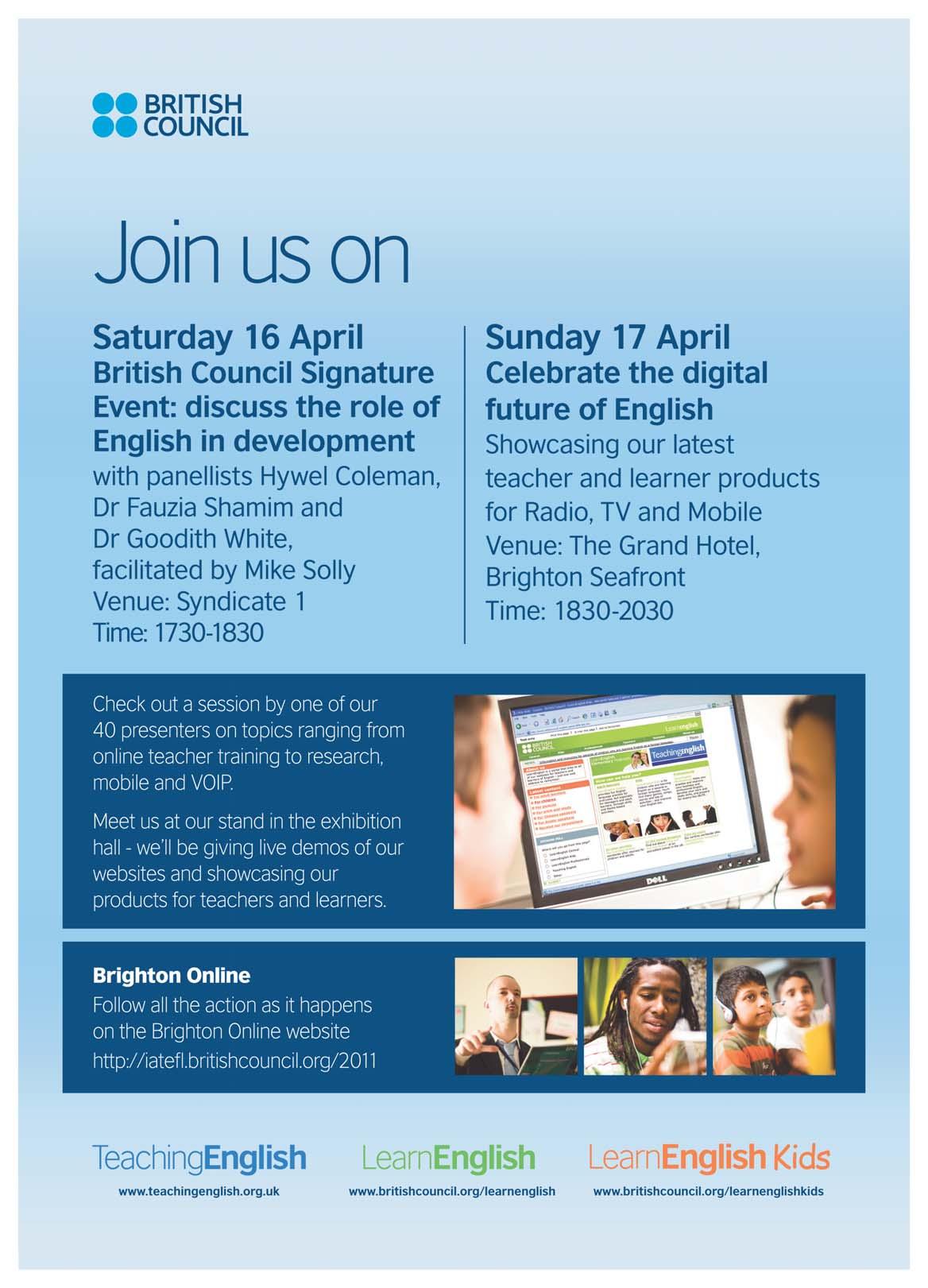
IATEFL has organised the following tours andwalks for delegates.Places are limited –please see the numbers shown below. Tickets will be issued on af f i r s t - c o m e - f i r s t -
s e r v e d b a s i s
Coach trip through the Sussex countryside and wine tasting at Plumpton College, University of Brighton (sponsored by the University of Brighton)
S
C o s t : £ 1 2
Join us onarelaxing coach tripfromBrighton through the beautiful countryside viaLewes, Litlingtonand the Cuckmere Valley andalong the heritage coastto Beachy Head. The coach will stop here for a while for you to take in the breathtaking views. You will then journey on to Eastbourne where you can either enjoy your own picnic or visit one of the many vibrant seafront cafés.Plumpton College atthe University ofBrighton is your final destination whereyou willbe offered a tourof the facilities and havethe opportunityto partake in wine tasting of their prize-winning English wines.
S
Arundel Castle is set in 40 acres of sweeping grounds and gardens and has been open to visitors for nearly 200 years.It is oneofthe great treasure housesofEngland and is home to pricelessworksof art. Come and see paintings and furniture,tapestries and stainedglass, china and clocks, sculpture and carving,and heraldry and armourin stunning room settings. The Glasshouse and Kitchen Gardensare definitely worth a visit and if you can manage the 131 stepsuptothe Keep, the views of the River Arun, the sea, the town and the Downs are worth the effort! There is a licensed counter service restaurant andcoffee shop within the castle grounds oryou may prefer to take a stroll into the town for lunch and return inthe afternoon for some more sightseeing.
M e e t a t t
(sponsored by VisitBrighton)
Lewes Castle is almost1,000 years old. The landwas givento William de Warenneby William theConqueror at Christmas time in 1066. The building of the Castle was completed 300 years later with the magnificent Barbican. Barbican House is now home to the Museum ofSussex archaeology and changing exhibitions of historical photographs of thearea. There are no refreshments facilities onsite so you may like to bring a picnic or alternativelythereare plenty of smallrestaurants and coffee shops nearbyshould you wishto lunch after your visit. M
C o s t : F r e e
Takea break from the conferencedayandenjoyaguided tour of Brighton. A guidewilltake youona 90minutewalk, starting at the Brighton Centre. Fourtours arearranged: Sunday morning,Sunday afternoon, Monday morning and Monday afternoon. A maximum of 25 delegates can join a tour and free tickets will be available on a first-come-first-served basis.
S
Welcome Reception
1830-1930 in Syndicate 1&2
IATEFL isdelighted to holdaWelcome Receptiontooffer delegates awarm welcome totheconference. Come along to meet old friends and new and to relax ready for an enjoyable few days.
A thousand years of words on words 1900-2000 in Auditorium 2
Come and enjoy alight-hearted reflectionby David, Hilary and Ben Crystal on what writers have to sayabout the English language.
Regency Riots - an interactiveexperience of what makes Brighton brilliant! 2030-2200 in Regency
'Oh I do like to bebesidethe seaside.'Mr John (Beau) Nash thefamedarchitect anddandy will introduceyou to the delights of Brighton, the Pavilion, the Sussex countryside, its people and history. This isa not-to-bemissed chance to have funtogetherandexperience with MarkFletcher ahuge amount about the conference region through many different activities.
Taleswe'vebeentold 1930-2100inPaganini
Haveyoueverbeentoldatalebyonepersonandthenfoundyourselftellingittootherpeople?Thetalewe weretoldhasbecomeoneofourfavouritetalestotell.Thetalehasbecomeourownbutitfeelsasifthe personwhotoldittousisstandingclosebyaswetellit.DavidHeathfieldwilltellaselectionofworldfolk taleshe'sbeentoldbystorytellersfromaroundtheworld.Andinbetweenyoucantellataleyou’vebeen told - all cultures and languages most welcome!
PechaKuchasponsoredbyPearsonLongman 1930-2130 in Auditorium 2
Thisyear'sIATEFLPechaKuchaeveningwillbefacilitatedbyJeremyHarmer.Bynowyoushouldknowthe format:eachspeakerisallowedaslideshowof20images,eachshownfor20seconds,givingatotal presentationtimeofsixminutesandfortysecondsbeforethenextspeakerisup.Thisyear'sPechaKucha features several new speakers and the enjoyment will bethe same as ever. Do not miss this event!

ComedynightwithMrsHoover 1900-2000inRegency
ComeandmeetBrighton’sLeadingLandladyforoverseasstudents,delegatetothehostmothersofGreat Britainand thewomanwhoputthe‘hospital’in‘hospitality’.Thoughnotatrainedteacherherself,Mrs HooverhassomerobustopinionsonhowtoteachEnglish(“I’manativespeaker,itjustcomesnaturallyto me.”)AndafterfourdecadesofcateringforEnglishlanguagelearnersfromallovertheworld,sheknowsa thingortwoaboutcross-culturalunderstanding:“We’vegotthecultureanditmakesmecrosswhenthey don’tunderstandit!”Holdontoyourhatsforanend-of-the-pierridethroughtheeccentricworldofMrs Hoover — Hostess to the World. Fun, laughter, free biscuits and some (very) irregular verbs!
2015-2215inPaganini
ComealongtothenowinfamousIATEFLQuiz.Pityourwitsagainstyourcolleaguesfromaroundtheworld. Drink,makefriendsandseejusthowmuchyouknow(ordon't)abouttheworldwelivein(orisiton?). There'llbeprizesforthewinningteamandlotsofFUNhadbyall.Socomeand joinyourhostfortheevening -AdrianTennant-foryetanothernightofmayhem!
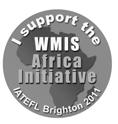

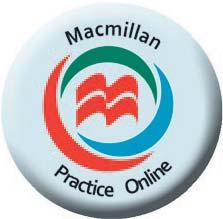


















The exhibition floorplan below shows the locations of stands with stand numbers.
The following page lists exhibitors numerically by stand number to make sure you find them easily.
This section contains details of all exhibitors, entries listed alphabetically by exhibitor name.
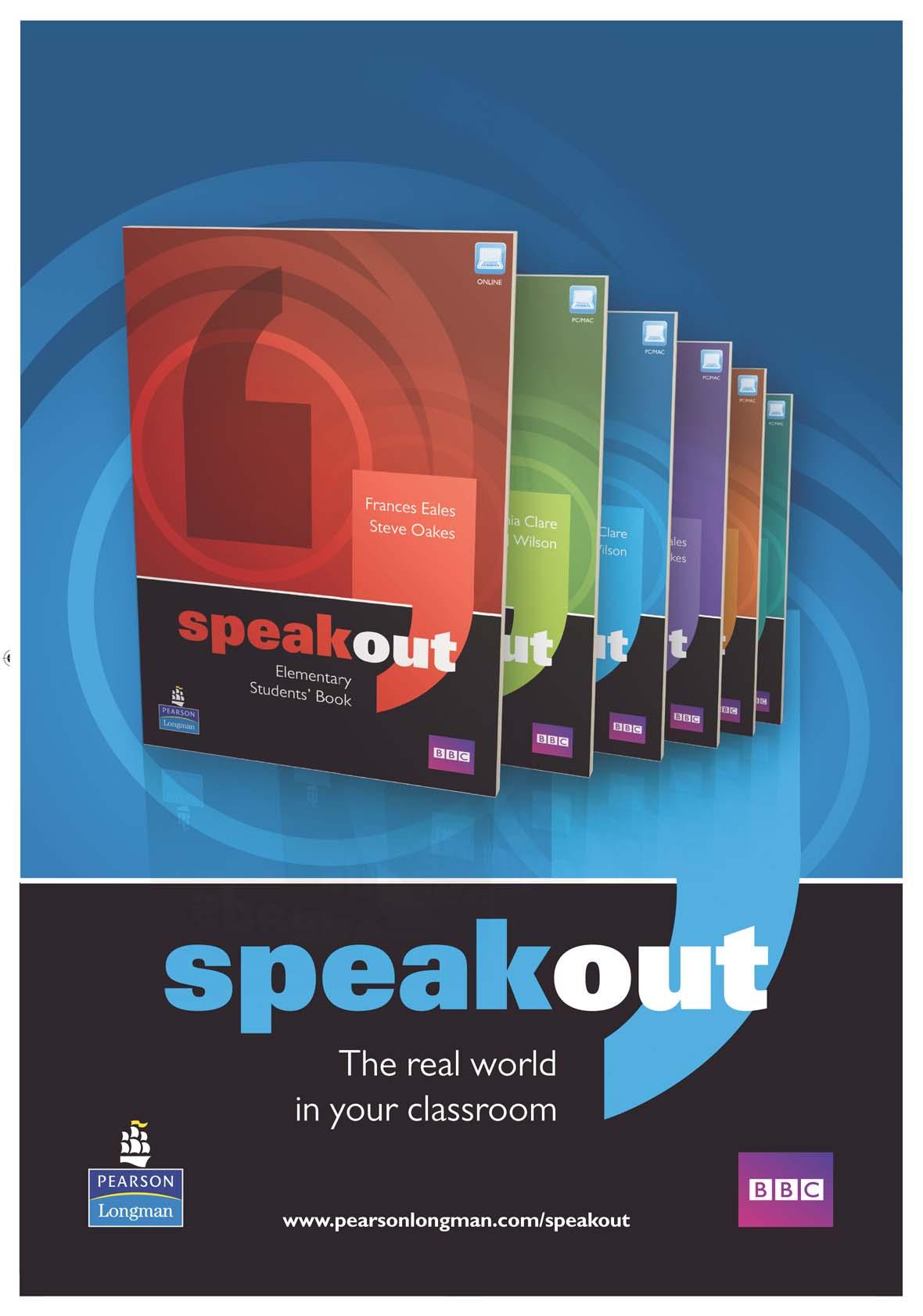
CentreIATEFL
CentreIATEFLAssociates
CentreIATEFLScholarshipWorkingParty(SWP)
1-2LCLInternationalBooksellersLtd
3SignLanguagebringsFreedom
4GlobalELT
5OpenUniversity
6MONDIALE-TestingGmbH
7LanguageGarden
8GlasgowCityMarketingBureau
9UniversityofExeter
10-11&72-74Pearson
12Linguascope
13City&Guilds
14TrinityCollegeLondon
15English360
16-18OxfordUniversityPress
19BournemouthEnglishBookCentre
20-21EducationalTestingService(ETS)
22-29CambridgeUniversityPress
30PavilionPublishing
31-32&35-36BellEducationalTrust
33-34IELTS
37BritishStudyCentresTeacherTraining
38Pilgrims
39ExpressPublishing
40MultilingualMatters
41-43UniversityofCambridgeESOLExaminations
44NetLanguages
45EnglishUK
46-47&54BritishCouncil
48Routledge
49IATEFLLocalConferenceCommittee
50AscentisAngliaESOLExamination
51-53HeinleELT
55-56&61MacmillanEducation
57HelblingLanguages
58-59EDI
60Teachitworld
62&66-67GarnetEducation
63NorwichInstituteforLanguageEducation(NILE)
64EnglishLanguageBookshop
65ELIPublishingLtd
68DeltaPublishing
69VisitBrighton
70EquinoxPublishingLtd
71ManicMonkey
OurexhibitorsweregiventheopportunitytopostmaterialsontheBrightonOnlinewebsite.Checkoutour virtualconferencesiteathttp://iatefl.britishcouncil.org/2011.
Theexhibitionisopenfrom0830to1730SaturdaytoMondayandfrom0830to1200onTuesday.(For safetyandsecurity,pleasedonottrytoentertheexhibitionoutsidethesetimes.)
A sc e n t is s A n g li a ES OL L Ex a mi na t i o n (S t a nd d 5 0)
Chichester College, Westgate Fields, Chichester, PO19 1SB, UK
Tel: +44 1243 812943Fax:+44 1243 784531Email:kelly.charman@chichester.ac.uk www.anglia.orgContact Name:Kelly Charman, Examinations Administrator
Anglia Examinationshas been deliveringitsuser-friendlystep-by-step suite of ESOLInternational examinationsworldwide for over 16 yearsandis nowjoined incollaboration with the awardingorganisation Ascentis to provide fullyaccredited qualifications.Inseveralparts of the worldwe are the leadingprovider of ESOLExaminations, supported byteacherand pupil activities secondto none. To find outmore about ourunique and motivational approach to English assessmentcome and visitus at our stand.
B e l l E d u c a t i o n a l Tr u s t ( S t a n d s 3 1- 3 2 & 35 - 36 )
Red Cross Lane, Cambridge,CB2 0QU, UK
Tel: +44 1223 275500
Email:Bruce.Milne@bell-worldwide.com www.bell-centres.comContact Name: Stephanie Dimond-Bayir, Teacher Training Programmes Manager
Come and visit our stand andlearnmore aboutourhigh qualitylanguage courses forbothadults andyoung learners. We are also experts in teacher trainingboth in the UK andoverseas and you can come and hear aboutour highlysuccessful residentialcoursesonthe BellTeacher Campus at Homerton College, University ofCambridge.Don’t forget thatif youare a citizen of the European Union you can apply forComenius funding through your National Agency.
B o u r n e m o u t h E n gl i s h B o o k C e n t r e- B E B C ( S ta n d 1 9 )
Unit 15 Albion Close, Parkstone,Poole, Dorset, BH12 3LL, UK
Tel: +44 1202 715555Fax:+44 1202 712913Email:elt@bebc.co.uk www.bebc.co.ukContact Name: Charles Kipping, Marketing Manager
Asthe UK’s first ELT/ESOL specialist we havebuiltup a reputation forfast, efficient andfriendlyservice. Wesupply books, CDs and DVDs from all the ELT publishers to all EFLprofessionals in theUK and worldwide. We have all the latest publications available from our stand atdiscountedprices
Also sharing stand 19: NORTH STAR ELT - 3rd Floor, 93 Candleriggs, Glasgow, G1 1NP, Scotland, UK, Tel: + 44 141 5524703, Fax:+ 44 141 6266957, Email: english@northstarelt.co.uk
The Language Factory – Email: language-factory@bebc.co.uk, Tel: +44 1202 712931, www.language-factory.co.uk
B r i t i s h C o u n c i l ( S ta n ds s 4 6 - 4 7 & 5 4)
Bridgewater House, 58 Whitworth Street, Manchester, M1 6BB, UK Tel: +44 161 9577651Email: joanne.stafford@britishcouncil.org www.britishcouncil.org/englishContact Name: Jo Stafford, UK ELT Marketing and Promotion Manager
TheBritish Council isthe UK’sculturalrelationsorganisation. We provide globalaccess to English andExams for teachers and learners through classroomteachingand onlineresources.You can join a communityoflike-minded teachers,discuss areas ofinterest, get advice on professional development and access resources for theclassroom.Join us at our stand to find out moreabout what the British Councilhas to offer you and about ourevents at IATEFL2011.
B r i t i s h S t u d y Ce n t r e s Te a c h e r T r a i ni n g ( S t a n d 3 7 ) Oxford, Brighton, London and Bournemouth, UK
Tel: +44 1865 263200
Contact Name: Tim Bird, Operations Manager
Email: oxford.tt@british-study.com
British Study Centres TeacherTraining offers anexciting portfolio ofteacher training programmes. Cometo our stand and enter the draw for the chance to win an iPod shuffle!
C am br i dg e U n i v e r s i t y P r e s s ( S t a n d s 2 2 - 29 )
University PrintingHouse, Shaftesbury Road,Cambridge, CB2 8BS,UK Tel: +44 1223 325819Email: apriestley@cambridge.org www.cambridge.org/eltContact Name: Alex Priestley, Senior Manager,ELT Promotions
Welcome to the Cambridge stand (22-29)
- browse exciting new CambridgeELT materials - find out about talks and workshops from our authors (and how to get your free copies!)
- receive at least 20% discount on all purchases at ourConference Bookshop - lots of competitions and events
- watch online demonstrations and find out how totransform your classroomwith new ELT classwareand digitalproducts. - experience our wonderful Diary Room!
C i t y & G u i l d s ( S t a n d 1 3 )
1 Giltspur Street, London, ED1A 9DD, UK Tel: +44 207 2943468Email: ieq@cityandguilds.com www.cityandguilds.comContact Name: Richard Simpson, Portfolio Manager
Asthe UK’s leading vocational educationorganisation, City& Guilds is pioneering thetalent revolution by inspiring people tounleashtheir potential and develop their skills. Offeringover 500 qualifications across 28 industries, we currently award around two million certificates every year. Since our establishment over 130 years ago, wehave helped more than 30 million learners achieve theirgoals.
D e l t a Pu b l i s h i n g ( S t a nd d 68 )
Quince Cottage, Hoe Lane, Peaslake, Surrey, GU5 9SW, UK Tel: +44 1306 731770Fax:+44 1306 731770Email:info@deltapublishing.co.uk www.deltapublishing.co.uk Contact Name: Nick Boisseau
Joinus at the Delta Publishingstand tobrowse our innovative and practical titles, including thenew DeltaNaturalEnglish seriesandthe latest in themultiple-award winning Delta Teacher Development Series. Meet our authors and join us in celebrating thegrowing Delta TeacherDevelopment Series withour author book signing, prizedraw and competition,as well as an opportunity to learn more about Delta Publishing’s free online materials and Development Blog.
E D I ( S t a n d 5 8 - 5 9 )
International House, Siskin Parkway East, Middlemarch Business Park,Coventry, CV3 4PE, UK Tel: +44 8707 202909Fax:+44 2476 516505Email:enquiries@ediplc.com www.lcci.org.ukContact Names: General enquiries: to details above Marketing enquires: Rupa Shikotra, International Marketing Executive
Let your LCCIEnglish languagequalificationspeak for you… LCCIInternational Qualifications from EDI are among the best recognised and most highly regarded business-related qualifications in the world. Visit us on stands 58 & 59 to find out more about ourextensiverangeofEnglishlanguage qualificationsand howyou canbecome part ofthe LCCIInternational Qualifications global centre network.Rushed for time? Visit www.lcci.org.uk
E d u c a t i o n a l Te s t i n g S e r v i c e ( E T S ) ( S t a n d s 2 0 - 2 1 )
660 Rosedale Road, Princeton, New Jersey, 08541, USA
Tel: +1 609 6832057Fax:+1 609 6832669Email:gespeut@ets.org www.ets.orgContact Name: Eileen Tyson, Executive Director - Global
As thecreator of theTOEFL® andTOEIC® tests, ETS canprovide yourstudents with more educational and career possibilities worldwide.TheTOEFL test is the most accepted,mostrespected Englishlanguage test inthe world. Over25 million students have takenthe TOEFL test to get into theirdesignated institution.The TOEICtests, usedbymore than 10,000businesses andorganizations in 120 countries, giveyour students the English-languagecredentials global employers need.
E L I P u b l i sh i n g L t d ( S t a n d 6 5 )
c/o ELI Srl, Via Brecce snc, 60025 Loreto, Italy
Tel: +39 071 75070207 Fax:+39 071 977851Email:intersales@elionline.com www.elionline.comContact Name: Augusto Andreoli, International Marketing and Sales Manager
A leading international publisher offering awide range ofELTpublications: course books frompre-school toupper secondary, readers, examsand culture books,language games, activity books,sundry teacher’s resourcesanda30-year popular set ofclass magazines at various learning levels. Among the noveltiesatthis conference: Pandy thePanda, the new ELI course book for pre-school; Digital books for themajor coursebooks; and new titlesin the series New ELI Readers.
E n gl i s h 3 6 0 ( S t a nd d 1 5)
University PrintingHouse, Shaftesbury Road,Cambridge, CB2 8RU,UK
Tel: +44 79004 94258Email: sales@english360.com
www.english360.comContact Name: Byron Russell, Head of Sales
Deliver blended learning the easy waywith English360. Use our award-winning blended learning platform to provide online activities and courses that compliment yourface-to-face teaching. Get yourfree Educator accountnow on Stand 15 and enter ourtreasurehunt to win somegreat prizes. “Theplatform issimple and easyto interact with. Literallywithin minutes, one can begin to create activities on the system.”Mark Olding at City Professional English in Verona.
E n gl i s h La n g u a g e B o o ks ho p ( S t a nd d 6 4)
31 George Street, Brighton, East Sussex,BN21RH, UK
Tel: +44 1273 604864Fax:+44 1273 687280
Email: anthony.forrester@elb-brighton.com www.elb-brighton.comContactName: Anthony Forrester, Partner
The English Language Bookshopwas established in 1985 and isoneof the leading suppliers of ELT materials in the UK & internationally. We have many special offersfor IATEFL2011 withdiscountsrangingfrom 15%to30% on all books on display. Books can be bought at the conference or ordered and shipped after the conference is over.
E n gl i s h UK K ( S t a n d 4 5 )
219 St John Street,London, EC1V 4LY, UK
Tel: +44 20 76087960Fax:+44 20 76087961Email:training@englishuk.com www.englishuk.comContact Name: Bettina Sattler, Professional Services Assistant
English UK isthe national association foraccredited Englishlanguageproviders in the UK. The associationhas over 450 members including private schools, educational charities, further education colleges anduniversities. English UK’s mission isto improvethe ELT experience for international studentsandraise quality standards within theindustry. Come to our stand to learn more abouthowyou can benefit from ourquality professionaldevelopment activityincluding qualifications, courses, training events, and consultancy services.
E q u i n o x P u b l i sh i n g L t d ( S t a n d 7 0 )
1 Chelsea Manor Studios, Flood Street, London, SW3 5SR, UK
Tel: +44 20 78233748Fax:+44 20 78233748Email:jjoyce@equinoxpub.com www.equinoxpub.comContact Name:Janet Joyce, ManagingDirector
Equinox publishes books and journals in the fields of appliedand theoretical linguistics as well asarchaeology, popular music and the academic study of religion. Please visit our stand toseeourgrowing list in applied linguistics and language teaching.Conference discount: 25%
E x p r e s s Pu b l i s h i n g ( S t a nd d 3 9)
Liberty House, New Greenham Park, Newbury, Berkshire,RG19 6HW, UK
Tel: +44 1635 817363 Fax:+44 1635 817463Email:panos@expresspublishing.co.uk www.expresspublishing.co.ukContact Name: Craig Huxley,Senior ELTConsultant
Independent publisher dedicated to producing quality ELT material with a list of over 2000 titlesand sales in 86 countries. Recognisedas a leading publisher with two nominations for the British Council Innovation Awards andministerial adoptions in many countries.
G a r n e t E d u c a t i o n ( S t a nd s 6 2 & 6 6 - 6 7 )
8 SouthernCourt, SouthStreet,Reading, Berkshire, RG1 4QS,UK
Tel: +44 118 9597847Fax:+44 118 9590508Email:sophie@garneteducation.com www.garneteducation.comContact Name: Sophie Webb, MarketingAssistant
Garnet Education is anindependent UK publisher withan established reputation forinnovative publishing in English Language Teaching products. Thegrowing listwillbe expanded in 2011withthe launch ofinternational kindergartenand primary courses and new English for Academic Purposes titles in HigherEducation.
G l a s g o w C i t y M a r k e t i n g B u r e a u ( S t a n d 8 )
11 George Square,Glasgow, G2 1DY, UK Tel: +44 141 5660800Fax:+44 141 5660210Email:citymarketing@seeglasgow.com www.seeglasgow.comContact Name: Julie McCulloch, ClientServices Manager
The 2012 IATEFL Conference & Exhibition will be held in Glasgow, one of Europe’s most vibrant andcosmopolitan cities and on the doorstep of Scotland’s gloriouscountryside andgolf courses. Namedasoneof thetop 10cities in the world to see in 2009 by Lonely Planet, a UNESCO World City of Music, Glasgow is alsopreparing to host the 2014 Commonwealth Games. Come and visit us at our stand to find out more about what this fantastic city has to offer.
G l o b a l E L T ( S t a n d 4 )
60 Pankhurst Avenue, Brighton,BN2 9YN, UK
Tel: +44 1273 251906Fax:+44 1273 688232Email:orders@globalelt.co.uk www.globalelt.co.ukContact Name:Lawrence Mamas, Marketing Director
Global ELT isan ELT publishing companythat specialises in publishing materials for the internationalELT exams. Awide range of Practice Tests and Exam Preparation books is available forthe following exams: Cambridge ESOL:IELTS,BULATS, FCE, CAE, PET, KET, YLE ETS(Educational Testing Service): TOEIC,TOEFL Michigan ELI: ECCE, ECPE City & GuildsESOL: Achiever B1, Communicator B2, Expert C1, Mastery C2 EDI: Jetset Level B1,Jetset Level B2, Jetset Level C1 ESB: B1-B2-C1-C2
Pearson Tests of English – PTE General: B1-B2-C1-C2 Besides exam materials,wealso publish a wide varietyofELT books such asgrammar books, skills books, ELT dictionaries, vocabulary books, idioms and phrasal verbs, GeneralEnglish course books and Graded ELT Readers.
H e i n l e E L T (S t a nd s 5 1 - 5 3)
Cheriton House, North Way,Andover,Hampshire, SP10 5BE, UK
Tel: +44 1264 332424Fax:+44 1264 342762Email: elt.info@cengage.com http://elt.heinle.comContact Name: Sarah-Jane Platt, Sales Support Executive
Heinle ELT– Understanding the way the worldlearns English Heinle is aleading providerofmaterials for English language teaching andlearningthroughout the world, and part of Cengage Learning. Heinleand CengageLearning arecommitted to helping learnersbecome more effectivereaders, writers, and communicators, and tohelpingteachersbecomemore effectivein guidinglearners toachieve their goals. Follow us on Twitter! www.twitter.com/HeinleELT
H e l b l i n g L a n g u a g e s ( S t a n d 5 7 )
Kaplanstrasse 9, 6063 Rum/Innsbruck, Austria & 1a Pope Street,London, SE1 3PR, UK
Tel: +358451318936Fax: +43 512 262333111Email: r.dacosta@helblinglanguages.com www.helblinglanguages.comContact Name: Riitta da Costa, International Business Development
HelblingLanguagesis known for its innovative products of high quality. This year’s launchesinclude EnglishthroughArt, in The Resourceful Teacherseries, usingmasterpieces from TheNationalMuseum and Gallery ofWales todevelop language skills; thebeautifully illustrated HelblingYoungReaders for childrenaged 5-12; and PrimarySongs, a 2-volume resource book. ForRealis a brand new series for young adults– check it out! Special offers andsamples available!
I A T E F L ( C e n t r e s t a n d )
Darwin College, University of Kent, Canterbury, Kent, CT2 7NY, UK Tel: +44 1227 824430Fax: +44 1227 824431Email: generalenquiries@iatefl.org www.iatefl.org
TheInternational Associationof Teachers of EnglishasaForeign Language, founded in1967,has over 3,600 members worldwide.Workingin cooperation with 104 worldwide teachingassociations weaimto link English language teachers and professionals fromaround the world and helptoprovideopportunitiesfor personalandprofessional development. Visitthe IATEFLstand to find out more about thebenefits of membership, our 14SpecialInterest Groups, our other events around the world, and next year’s conference in Glasgow. StandsponsoredbytheUniversityofKent’sCentreforEnglish&WorldLanguages
I A T E F L A ss o c i a t e s ( C e n t r e s t a n d) www.iatefl.org

IATEFL has104Associates.An Associate isa Teachers’ Associationthathas entered into a mutually beneficial relationship with IATEFL. Increasingly, the real benefit of becoming an Associatelies in linkinguptoa network of teachers’ associations all over the world,and throughthis, anetwork of language educators allover the world. Associates send examples of their newsletters, events, publications and publicity materialthatcolleagues can browse through at the Associates stand.
I A T E F L L o c a l C o n f e r e n c e C o m m i t t e e ( S t a n d 4 9 )
The Local ConferenceCommittee would like to welcome you warmly toBrighton & Hove and “Sussexby theSea”! We think this is a great place to holda conferenceandtheperfect destination for study and courses of allkinds atone of the excellent localELT institutions oratone ofthe two universities here. Come andmake contact withlocalfellow professionals by visiting our stand. Enjoy your stay with us!
I A T E F L S c h o l a r s h i p W o r k i n g Pa r t y ( S W P) ) ( C e n t r e s t a n d ) www.iatefl.org/scholarships
Our standis staffed duringthemorning coffee breaks.It’sthe place to comeif you have any questions aboutapplying for scholarships orif you’d like to volunteertosponsorascholarship. Comments, criticisms,and suggestions will be taken on board as well. And it also servesas ameetingpoint forthisyear’s winners and the Scholarship WorkingParty members, sponsors, andfriends.
I EL T S ( S t a n d s 3 3 - 3 4 )
British Council, Bridgewater House, 58 Whitworth Street, Manchester, M1 6BB,UK
Tel: +44 161 9577755 Fax: +44 161 9877762Email: ielts@britishcouncil.org www.ielts.orgContact Name: IELTS Administrator
IELTS - the International English Language Testing System - is theworld'sleading English languagetest,delivered in over 130 countriesandrecognised by over 6,000 organisations. Last year, more than 1.5 million candidates took the IELTS test to demonstrate English language proficiency for education, immigration and professional accreditation purposes. The ongoing program of academic research, test development and validation ensuresthe IELTStest remains the expert test, recognised and trustedworldwide.
L a n gu ag e Ga r de n (S t a nd d 7 )
361 RidgacreRd, Birmingham,B32 1EH, UK
Tel: +44 121 6840633
Email: david@languagegarden.org www.languagegarden.orgContact Name:David Warr, Director
Language plants are creative, colourful materials,word shapes somewherein-between grammaticalmindmaps and Wordle. Teachershave always said,“Wow,these are great,canyou make your own?”Now,theanswer is yes! And it’sfree to use.You’ll be amazed. Truly. In just a few minutes, you’ll have a beautiful language plant you madeyourself, on any topic, for any class, with a dizzy array of activities readyfor when you’re back home.
L C L In t e r n a t i o n a l Bo o k s e ll e r s L t d ( S t a n d 1- 2 )
104-106 Judd Street,London, WC1H 9PU, UK
Tel: +44 20 78370487Fax:+44 20 78339452E-mail: sales.lcl@btinternet.com
http://www.lclib.comContact Name: Vic Nicholas
LCL is pleased to welcome several publishers to ourstand. MM Publicationswill have samples of new editionsof Yippee, Smart Junior , GettotheTop (Secondary)and Traveller, the adultcoursenow available at 6levels.Black Cat will be promoting the Total seriesforKET, PET and FCEand new editions of PassTrinityat 5 levels. CollinsELT will show their new list featuring Business, IELTS and Skills materials.
L i n gu as c o pe e (S ta n d 1 2 )
189 Colchester Road, West Bergholt, Colchester,CO6 5JY, UK Tel: +44 1206 242473Fax:+44 1206 242262Email:roberto@linguascope.com www.linguascope.com
Contact Name: Roberto Conte, Project Manager
Linguascope, renowned foritsaward-winning multilingual website, also offersa host of resources to make teachers’lives easier: language stickers and incentives, posters, CD-ROMs,workbooks andmuch more. Comeand see a selection of our products and pickup a freecatalogue.
M a cm il l a n E d uc a t i o n ( S t a n d s 55 - 5 6 & 6 1 )
Between Towns Road, Oxford, OX4 3PP, UK
Tel: +44 1865 405700 Fax: +44 1865 405885Email:s.buchan@macmillan.com www.macmillanenglish.comContact Names:Jo Greig, International Marketing Director SarahBuchan, Corporate Communications Executive
Macmillan Education and Macmillan English Campus are thrilled to be at IATEFL this year. Visit the stand to enjoy 20%off selected titles, see our new exciting Digitalofferings, browse our award-winning books, check talk times, or just chat to our lovely and informative staff. We’realsocelebrating 10 years of the fabulous,essential onestopenglish site, sodrop by the big red Macmillan stand and find out about our party on Saturday…everyone’s invited!
M a n i c M o n k e y ( S t a n d 7 1 )
Bridge Studios, 107A Hammersmith BridgeRoad, London, W6 9DA, UK Tel: +44 20 87413575Fax:+44 20 87419851Email:natasha.plinston@manic-monkey.com www.manic-monkey.comContact Name:Natasha Plinston, Office Administrator
Make friends with littlebridge.com – a unique & exciting online portalfor children,parents andteachers.Introduce children to learning English andwatch them make real progress andenjoy succeeding.The content follows our trusted formatand beloved characters, but brings learning English to life in a brand new andinnovative way!
M O N D IA L E - T e s t i n g Gm b H ( S t a nd d 6 )
Obermatta 41, CH 3984, Fiesch, Switzerland
Tel: +41 27 9711791Email: beck@mondiale.de www.mondiale-testing.comContact Name: Martin Beck, Managing Director
MONDIALE-Testing offersa largeportfolioof various onlinelanguage tests basedontheCEF. We arerecognized asan independentlanguage testing organization andareoperating worldwide. Ourcustomers belong touniversities,schools, test suppliersaswell aspublishing houses, commercial enterprises and staffagencies.Weare amemberof the ICC and EALTA.
M u l t i l i n gu a l Ma t t e r s ( S t a n d 40)
St Nicholas House, 31-34 High Street,Bristol, BS1 2AW, UK
Tel: +44 117 3158562Fax:+44 117 3158563Email:elinor@multilingual-matters.com www.multilingual-matters.comContact Name: Elinor Robertson, Marketing Manager
Multilingual Matters publishes books for teachers, parents,students and academics.Topics covered includeWorld Englishes, multilingualism, languageeducation,language acquisition andESOL/TEFL. Allbooks will be soldata conference discount of £15.
N e t L a n g u a g e s ( S t a nd d 4 4 )
Trafalgar 14, Barcelona, 08010, Spain
Tel: +34 932 687146 Fax:+34 932 680239Email:study@netlanguages.com www.netlanguages.comContact Name:Fiona Thomas, Director of Education
Net Languages has developed a huge range of stimulating web-based English languagecourses for students of all ages and alllevels. Our materialscanbeused to supplement traditionalcoursebooks, as partof blended learning programs,or as the mainstudy resource. Our clientsincludeprimaryand secondary schools, universities and colleges, languageschools, companies and governmentdepartments. Wehelp make language learningmore effectiveandenjoyable. Visit ourstand to find out more.
N o r w ic h I n s t it u t e fo r La ng ua g e Ed u c a t i o n ( N I L E ) (S t a n d 6 3 )
82 Upper St Giles Street, Norwich, NR2 1LT, UK
Tel: +44 1603 664473Fax:+44 1603 664493Email:sarah@nile-elt.com www.nile-elt.comContact Name: Sarah Mount, Assistant Director– BusinessDevelopment
NILE provides professional developmentcourses and training for teachers,trainers andotherlanguage educators. We have extensive experience at primary, secondary andtertiary levels, and offer a wide range of courses in language teaching methodology, includingCLIL,TYL,Testing and ICTup toMaster’s Level. We are also a centrefor Cambridge ESOL, running CELTA andDELTA courses year-round. Other services include worldwide project management and consultancy for specialist education projects. Visit our stand todiscover what NILE can offer you.
O p e n U ni v e rs i t y ( S t a n d 5)
St James’s House, 150 London Road, East Grinstead, RH19 1HG, UK Tel: +44 1342 341052Fax:+44 1342 317411Email:jakki.hall@open.ac.uk www.openuniversity.co.uk/languageContact person: Jakki Hall, Marketing Manager
The inspiring thing aboutstudying with The Open University isnot just what you learn but how youlearn.We’vetaken distance learning to a new level. Our innovative learning materials – including downloads, online forums and podcasts – are there to help you study in a flexible way wherever you are. Agrowing number of courses are available fromanywherein the world. Visit us at stand 5 or call0845 3006090 and quote reference RAMPAU.
O x f o r d U n i v e r si t y P r e ss s ( S t a n d s 1 6- 1 8 )
Great Clarendon Street, Oxford, OX2 6DP, UK
Tel: +44 1865 556767Email:elt.enquiry@oup.com www.oup.com/eltContact Name: Customer Services
Welcome to Brighton! Ifyou're looking forsome inspiration,comealong toour standto meet our friendly and knowledgeableteam, askthemquestionsand enjoy practicalIWB sessions. Find out more about thenew OxfordEnglish Grammar Course by Swan andWalter, New English FileOnline Skills Practice, The Big Read, and much more. And remember, all books on the stand areon special offer throughout the conference!
P a v i l i o n P
ub l i s hi n g ( S t a n d 3 0 )
PO Box 100,Chichester, West Sussex, PO18 8HD, UK
Tel: +44 1243 576444Fax:+44 1243 576456Email:rachel.langdon@pavpub.com www.pavpub.comContact Name: Rachel Langdon,Production Manager
ETp (English Teaching Professional) is the leading practical magazine for professional English languageteachers. Each issueis packed with the latest teaching methodology; fresh,practical ideas for lessons; reviews of the latest titles; and featurestohelpprogress your personal and professionaldevelopment. If you arean English language teacher, then thisis your magazine! Also on our stand is our sister title ModernEnglishTeacher– essentialfor teachersand school managers.
P e a r so n ( S t a n d s 1 0- 1 1 & 72 - 74 )
Edinburgh Gate, Harlow, Essex, CM20 2JE, UK
Tel: +44 1279 62342Fax:+44 1279 623951Email:carol.higho@pearson.com www.pearsonlongman.comContact Name:Carol Higho & Maureen Coulson, ELT Marketing
At Pearson we believe inlearning –all kindsof learning forallkinds of people,delivered ina personal style. Because whereverlearning flourishes, so do people. Come to our exhibitionstands. See our print, digital andonline products, talk to our teamor use theInternetcafé.Attend ourFREE training sessions,presentations, SignatureEvent (Saturday10:40am, Paganini, OldShip Hotel), and don’t forget the Pecha Kucha event on Sunday evening!
P il g r i m s ( S t a n d 3 8 )
4-6 Orange Street, Canterbury,Kent, CT1 2JA, UK
Tel: +44 1227 762111Fax:+44 1227 459027Email: jim@pilgrims.co.uk www.pilgrims.co.ukContact Name:Jim Wright, Headof Teacher Training
Come and see us at thePilgrims stand to talk about: topquality teacher training courses in the UK; teacher training seminarsin yourcountry; resource books for teachers publishedby Pilgrims;freeonline magazine for teachers –Humanising LanguageTeaching –www.hltmag.co.uk; intensive English courses for business people;and summer residentialcourses for young learners. We’re alwayslooking for new and experiencedtrainers for a wide variety of projects – so come and have a chat!
R o u t l e d g e ( S ta n d 4 8 )
2 Park Square, MiltonPark,Abingdon, Oxfordshire, OX14 4RN, UK
Tel: +44 20 70176118Email: linguistics@routledge.com www.routledge.com/linguisticsContact Name: Jenny Hunt, Acting MarketingManager
Routledge English LanguageandAppliedLinguistics publish awiderange ofbooks foracademics at all levels; guiding students from A-Levels, through their undergraduate and postgraduate study and into their professional careers as teachersandresearchers.At IATEFL 2011wewill be displayinga wide range ofourlatest books inthefield and offering a 20% discount to all delegates.
S i g n L a n g u a g e b r i n g s F r e e d o m ( S t a n d 3 )
The Executive Centre, 344-354 Gray’sInn Road,London, WC1X 8BD, UK
Tel: +44 20 71642139Fax:+44 20 71642001Email:sabifa@btinternet.com www.signlanguagebringsfreedom.co.ukContact Name: BiancaLebziz, Director
SLbFprides itselfon offering all levelsof BSLcoursesatconvenient times foreveryone.Ourcourses range from Level 1 Deaf Awareness and Communicationto Level6NVQ DiplomainSign Language Interpreting. We are also proud tooffer courses which lead towork placement such as obtaining DrivingLicences’ in HGV,Buses, Cars including Forklift Training andCSCS TradeBusiness Cards and much more… The qualifications gainedare recognisednationally andaccredited by the office of the Qualifications and Examinations Regulator.
T e ac h i t w o r l d ( S t a n d 6 0 )
Queen Anne House, 11 Charlotte Street, Bath, BA1 2NE, UK
Tel: +44 1225 788850 Fax:+44 1225 430233Email:membership@teachitworld.com www.teachitworld.comContact person: Lucy Palmer, ELTEditor
Visit stand 60andmeet the Teachitworld team.Discover awealthof onlineELTresources: authenticaudio recordings, weekly news-based lessons,editable teaching materialsandinteractive whiteboard activitiesto helpbring yourlessonsto life. Come to Lucy Palmer’s audiomasterclasson makingyour own recordings*,joinusfor lunchtime drinks* and meet otherDirectors of Studiesand findout how Teachitworld cantransformEnglishlanguageteaching in your school. *More details on the stand.
T r i ni t y C o l l e ge e L o n d o n ( S t a nd d 1 4 )
89 Albert Embankment, London, SE1 7TP, UK
Tel: +44 20 78206100 Fax:+44 20 78206161Email:info@trinitycollege.co.uk www.trinitycollege.co.ukContact Name: Clinton Rae, Director of Business Development (UK & Ireland)
Assessing English languagesince 1938
Trinity’s English language examinations are offered in 60 countries worldwide and aretaken by hundredsof thousands of candidates each year. Accredited by the QCA (UK) and mappedto the CEFR,GESE,ISEand SEWare accepted by universities and businesses asevidence of Englishlanguage proficiency. Trinityalsooffers world-renownedTESOL qualifications for English language teachertraining – CertTESOL,DipTESOL and CertIBET. Visit our stand to WIN an iPod Shuffle!
U n i v e r s i t y o f Ca m b r i d g e E S O L Ex a m i n a t i o n s ( S t a nd s 4 1 - 4 3 )
1 Hills Road,Cambridge, CB1 2EU, UK
Tel: +44 1223 553997Fax:+44 1223 553621Email:esolhelpdesk@ucles.org.uk www.cambridgeesol.orgContact Name: ESOL Helpdesk
University of Cambridge ESOL Examinations are the most valuableEnglish qualifications in the world and are taken byover 3.5 million people in 130 countries.Our exams are recognisedas proof of Englishlanguage abilityby more than 11,000 employers, universities and governmentbodies around the world. We provide language learners and teachers in a wide variety of situations withaccess to a range of high quality international exams, tests and teaching awards.
U n i v e r s i t y o f Ex e t e r ( S t a n d 9 )
Graduate School of Education, St Luke’sCampus, Heavitree Road, Exeter, EX1 2LU,UK Tel: +44 1392 724837Fax:+44 1392 724788Email:edu-admissions@exeter.ac.uk www.exeter.ac.uk/educationContact Name: Samantha Phillips,Postgraduate Administrator
The Graduate Schoolof Education is ranked5 th in the UK for world leading and internationallyexcellent research (RAE 2008). We offer anextensive range ofhigh-qualitypostgraduate TESOL programmes:PG Certificate;PG Diploma; full-time and summer intensive Masters, aswell asDoctorof Education.MPhil/PhD opportunities also exist. Academicstaff and currentstudents willbe available during theconference to answer any questions youmay have aboutthe programmes.We look forward to meeting you.
V i s i t B r i g h t o n ( S t a n d 6 9 )
First Floor, Brighton Town Hall, Brighton, BN1 1JA, UK Tel: +44 1273 292626Fax: +44 1273 292614Email:delegates@visitbrighton.com www.visitbrighton.comContact Name:Nicola Collins, Accommodation Officer
VisitBrighton isthe officialtourismbody for the city of Brighton andHove andis your one stopshop for all thingsBrighton. Whetheryou need information onattractionsor accommodation, restaurants or nightlife, entertainment or shopping, or even just a map -we are your resident experts. Popby our stand to find out what the citycan offer.
Use our award-winning platform to provide online activities and courses that complement your face-to-face teaching. Visit stand 15 to learn more and sign up for a FREE Educator account.
“The platform is simple and easy to interact with. Literally within minutes, one can begin to create activities on the system.”
Mark Olding, City Professional English
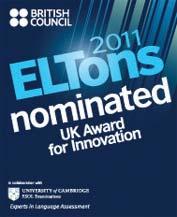
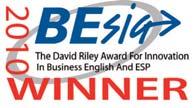
“With English360, students find learning an engaging and motivating experience.”
Jon Crocker, Principal of OISE Bristol
The aim of theIATEFL SpecialInterestGroups is to extendtheworkof IATEFLinto severalspecialist areas,to enable professionals withspecial interests inELTto benefitfrom information regarding new developmentsand local and international events in their areas ofspecialinterest.
EachSpecialInterest Groupaims to provide itsmembers withthree mailings(newsletters, updates, otherpublications)peryear. The SIG newsletters often includekeyarticles inthe field,as well as informingthemembership of the proceedingsof conferences and one-day events whichmembers mayhave been unable to attend.
Each SpecialInterest Group aims to organise aminimum of one event(in the UKor outside the UK) per year. Theseeventsfrequentlyinclude the most informedand stimulating speakersin the field. In addition thereare otherbenefitsfor SIGmembers, whichvary fromone SIGto another,suchas websites, internetdiscussionlists,internetchat forums, scholarships, etc.
Full IndividualMembers of IATEFL are entitledtojoin one SpecialInterest Group includedin their membership fee.
Business EnglishEnglish for Specific PurposesES(O)L Global IssuesLeadership & ManagementLearner Autonomy Learning TechnologiesLiterature, Media & Cultural StudiesPronunciation ResearchTeacher DevelopmentTeacher Training & Education Testing, Evaluation & AssessmentYoung Learners & Teenagers
For more information abouttheSIGs, come to theIATEFL stand in theexhibition orcontactIATEFLat generalenquiries@iatefl.org or visitwww.iatefl.org
On thefollowingpages,the SpecialInterest Groupslist their SIG Programmes. These are selections of talks and workshops which are a sample ofthe breadthand variety of work being done aroundthe world in eachfield of specialinterest. Each SIG Programme includes an OpenForum, whichprovidesan opportunity forbothmembersand non-membersto hear aboutthe SIG’sactivities andto talk toother members of the SIG. See you there!




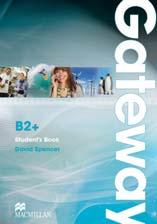
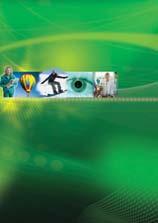
Sunday 17 April – Room 6 & Syndicate 1 & Syndicate 2
1025-1055 Talk Room 6
1130-1215 Talk Syndicate 1
1335-1420 Workshop Room 6
1435-1535 Workshop Room 6
1610-1640 Talk Room 6
1655-1740 Talk Syndicate 2
1755-1840 Room 6
Teaching reader perspective in business writing
Chockalingam Meenakshisundaram
Doing business with a spoken corpus: grammar in action
Rachel Clark
The power of presentation
Evelina Miscin
How do you make your students THINK?
Roy Bicknell
The many roles we perform as businessEnglish trainers
Mercedes Viola
Communicating internationally in English
Steve Flinders & Ian McMaster
Business English Special Interest Group Open Forum
Monday 18 April – Room 9
1025-1110 Talk
1145-1215 Talk
1215-1245 Talk
1345-1415
1430-1515 Talk
1550-1635 Talk
1650-1735 Talk
1750-1835 Workshop
Writing at postgraduate level:building confidenceand developing voice
Sarah Varney-Burch
Teaching English to Cuban health technology learners: challengesand dilemmas
Eduardo Garbey Savigne & Teresita Rojas Gonzalez
Has your approach to EAP course design changed?
Aysen Guven
English for Specific Purposes Special Interest Group Open Forum
Needs analysis and ESP in an interconnected global environment
David Hall
Bridging a university lecturer’s linguistic and affective gaps
Pete Westbrook
Courses on demand: a course designed for Brazilian state schools
Giana Mello
Implementing Multiple Intelligences model in large English for Workclasses
Martina MuyusiNana mee Mbayu
Special InterestGroup (SIG)representatives will be introducingsessions on these SIG Programmesandwillbepresent at theOpen Forum Theywillalsobeavailableon theIATEFL Stand should you wish to talk aboutthe workof theSIGsin moredetail. (Pleasegoto the IATEFL Standto findoutwhen arepresentative fromthe group youareinterested inwillbeavailable.) Don’t forget to look through your Programmetosee what other interestingtalksand workshops related to your areaof special interest arebeing heldthroughoutthe conference.
16 April – Room 3 & Syndicate 2
1040-1140 Room 3 Workshop
1215-1300 Syndicate 2 Talk
1400-1430 Room 3
1445-1530 Room 3 Talk
1605-1635 Room 3 Workshop
1650-1720 Room 3 Workshop
1735-1835
Syndicate 2 Panel discussion
1040-1140 Syndicate 1 Panel discussion
ESOLand maths - twoplus twoequals five?
Judith Kirsh
Reassessing the principles of teaching reading
Philida Schellekens
ES(O)L Special Interest Group Open Forum
Language matters: building bridges,mending fences - a community project
Cindy Leaney
Integrating fun spelling intoeveryday practice
Kerry Malster
Learning a secondlanguage when your first is a struggle
Hannah Bienge
Literacy, multilingualism and intercultural& citizenship education in context
David Block, John O'Regan & Catherine Wallace
Saturday 16 April – Room 5 & Syndicate 1 1.1 1.2
1215-1300 Room 5 Talk
1400-1430 Room 5 Talk
1445-1530 Room 5 Talk
1605-1635 Room 5
1650-1720 Room 5 Talk
1735-1835 Syndicate 1
Investigating large classes:are we making progress?
Richard Smith, Mais Ajjan & Mehvish Saleem (This presentation is part of the Global Issues SIG and the Research SIG Programmes.)
Accent and identity: prejudice and insecurity
Richard Cauldwell
Critical pedagogy and appropriation ofEnglish in ELT in Bangladesh
Bijoy Basu
Is there an inner game of foreign language learning?
Stephen Brewer
Global Issues Special Interest Group Open Forum
Helping students to approach authentic news materials
David Parry
British Council Signature Event: The role ofEnglish in developing countries
Facilitator: Mike Solly. Panel: Hywel Coleman, Fauzia Shamim& Goodith White
Saturday 16 April – Gresham
1040-1140 Workshop
1215-1300 Talk
1400-1430
1445-1530 Workshop
1605-1635 Talk
1650-1720 Talk
1735-1835 Workshop
How to improve your communication skills
Duncan Foord
Developing teachers – at distance
Jenny Johnson
Leadership & Management Special Interest Group Open Forum
Developing effective leadershipskills and strategies
Rubina Khan
Performance management and appraisal for teachers
Stephen Heap
How to get value from IT during an economic downturn
Caroline Moore
Changemanagement in ELT: exploring practical applications of theory
Johnny Morgan
Sunday 17 April – Gresham & Paganini
1025-1055 Gresham Talk
1130-1215 Paganini Talk
1335-1420 Gresham Talk
1435-1535 Gresham Workshop
1610-1640 Gresham Talk
1655-1740 Gresham Talk
1755-1840 Gresham
Lifelong, lifewide and lifedeeplearning and the autonomous languagelearner
Felicity Kjisik
Technology in theconnected classroom
Russell Stannard
Facilitating language learning through learner training
Shu-Hua Kao
Using the corpus for classroom activities basedon real language
Lisa Sutherland& Gavin Gray
How about themteaching us?
Monika Altenreiter& Anita Toechterle
Autonomy in language education: the struggle againstideology and misrepresentation
Alex Ding & Barbara Sinclair
Learner Autonomy Special Interest Group Open Forum
Special InterestGroup (SIG)representatives will be introducingsessions on these SIG Programmesandwillbepresent at theOpen Forum Theywillalsobeavailableon theIATEFL Stand should you wish to talk aboutthe workof theSIGsin moredetail. (Pleasegoto the IATEFL Standto findoutwhen arepresentative fromthe group youareinterested inwillbeavailable.) Don’t forget to look through your Programmetosee what other interestingtalksand workshops related to your areaof special interest arebeing heldthroughoutthe conference.
Learning
18 April – Gresham & Paganini
1025-1110 Gresham Talk
1145-1245 Paganini Workshop
1345-1415 Gresham Talk
1430-1515 Gresham Talk
1550-1635 Gresham Talk
1650-1735 Gresham Talk
1750-1835 Gresham
IntegratingWeb 2.0 to the curriculaof university preparatory schools
Beyza Nur Yilmaz & Isil Boy
Location, location, location: mLearning in practice
Gavin Dudeney
Teaching English language through eLearning/learning technologies
Awgichew Arega
CULTWEEPLE: enhancing interaction and collaboration among EFL learners
Raquel Oliveira
m-learning in TESOL: how far is it feasible in India?
Kalyan Chattopadhyay
Do smartphones mean smart learners?Mobile & English language learning
Neil Ballantyne
Learning Technologies Special Interest Group Open Forum
1025-1110 Workshop
1145-1245 Workshop
1345-1415
1430-1515 Talk
1550-1635 Workshop
1650-1735 Talk
1750-1835 Workshop
'Twas brillig... Interpreting poetry throughfilmand drama
Eleanor Watts
An animated classroom
Bryony Stephen
Literature, Media & Cultural StudiesSpecial Interest Group Open Forum
The multimodal approach to using poetry in ELT
Daniel Xerri
Reading circles: engross your students in discussions about great stories
Helen Sykes
Visual media assessments: a team teaching photojournalism experiment
Stella Smyth
It’s not just cricket,it’s culture, innit?
Robert Cooper
17 April – Room 3
1025-1055 Talk
1130-1215 Talk
1335-1420 Talk
1435-1535 Workshop
1610-1640 Talk
1655-1740
Research
17 April – Room 8
Saturday 16th 1040-1140 Syndicate 1 Panel discussion
1130-1215 Talk
1335-1405 Talk
1405-1420
1610-1640 Talk
1655-1740 Talk
1755-1840 Talk
International English teachers' perceptions of English as an internationallanguage Hatice Altun Evci
Spelling is chaotic:what facts lie behind this popular judgment?
Ahmad Al-Hassan
Communicative pronunciation... with a difference Meenu Bajaj
FunSongs - combining TPR with music
Charles Goodger
Developing lower-level processing skills in English L2reading Shigeo Kato
Pronunciation Special Interest Group Open Forum
Investigating large classes:are we making progress?
Richard Smith, Mais Ajjan, Mehvish Saleem (This presentation is part of the Global Issues SIG and the Research SIG Programmes.)
Comparing learners’ and teachers’ beliefs about form-focused instruction Miroslaw Pawlak
CLIL teachers' continuous professional development: reflections from a research study
Sandra Lucietto
Research Special InterestGroup Open Forum
Negotiated identity and academic writing Ya-Hui (Anne)Chang
Teacher personas research: adapting to the local context
Tim Moore
British Council -EAQUALScore curriculum inventory
SusanSheehan & Brian North
Special InterestGroup (SIG)representatives will be introducingsessions on these SIG Programmesandwillbepresent at theOpen Forum Theywillalsobeavailableon theIATEFL Stand should you wish to talk aboutthe workof theSIGsin moredetail. (Pleasegoto the IATEFL Standto findoutwhen arepresentative fromthe group youareinterested inwillbeavailable.) Don’t forget to look through your Programmetosee what other interestingtalksand workshops related to your areaof special interest arebeing heldthroughoutthe conference.
Monday 18 April – Room 6
1025-1110 Workshop
1145-1245 Workshop
1345-1415 Talk
1430-1515 Talk
1550-1635 Talk
1650-1735
1750-1835 Talk
Ruling the unruly: classroom managementandsolutions Bethany Cagnol
Chuck the book! Learner-generated role plays Eugene Schaefer
Classroom observations: learner feedback on teaching and learning Huseyin Demirel
Teacher peer coaching in an EFL context: challenges andaccomplishments
Mona Khabiri & Nargess Navidi Estalkhi
Inner voicecoaching
Andy Cox
TeacherDevelopment Special Interest Group Open Forum
Korthagen revisited - some ideas on promoting reflective practice in teachers Jane Ryder
Sunday 17 April – Regency
1025-1055 Workshop
1130-1215 Workshop
1335-1420 Talk
1435-1535 Workshop
1610-1640
1655-1740 Talk
2.7
1755-1840 Talk
Who knows best? Teacher trainers or language learners?
Nicola Meldrum
Time out for INSET!
Silvana Richardson
Reading and reaction as a teacher professionaldevelopment tool Craig Thaine
Storytelling revisited: making sense of our professional practice Briony Beaven
TeacherTraining & Education Special Interest Group Open Forum
ELT terminology: a useful tool or unhelpful jargon?
Alastair Douglas
Pre-teaching vocabulary – what is the point?
Bill Harris
Saturday 16 April – Room 8
1040-1140 Workshop
1215-1300 Talk 1400-1430 Talk
1445-1530 Workshop
1605-1635
1650-1720 Talk
1735-1835 Workshop
Web 2.0 tools for IELTS speaking andwriting success
Amanda Wilson & Susan Dempsey
Utilizing the CEFRL to enrich curriculum and assessment: an example
Zeynep Urkun
How can/should teachers and testers work together?
Judith Mader
English languageassessment and the Chinese learner
Andy Curtis
Testing, Evaluation & Assessment Special Interest Group Open Forum
Quality control procedures in standardizednational exams: experience and guidelines
Doris Froetscher
British Council 'Road to IELTS': improving students' writing skills
Louisa Dunne
Saturday 16 April – Room 9
1040-1140 Workshop
1215-1300 Workshop
1400-1430 Talk
1445-1530 Workshop
1605-1635 Talk
1650-1720
1735-1835 Workshop
CLIL projects foryoung learners
Hanna Kryszewska
Sharing stories: motivating young learners through mobile digital storytelling
Shelly Sanchez Terrell
Teens and out-of-classroomlearning: the final frontier
Paul Maglione
Through the looking glass: CLIL in practice
Kay Bentley
Transition from primary to secondary level – student’s attitudes towards ELT
Samuel Lefever
Young Learners & Teenagers Special Interest Group Open Forum
Seven effective ways to CLIL at secondary level
Noreen Caplen-Spence
Special InterestGroup (SIG)representatives will be introducingsessions on these SIG Programmesandwillbepresent at theOpen Forum Theywillalsobeavailableon theIATEFL Stand should you wish to talk aboutthe workof theSIGsin moredetail. (Pleasegoto the IATEFL Standto findoutwhen arepresentative fromthe group youareinterested inwillbeavailable.) Don’t forget to look through your Programmetosee what other interestingtalksand workshops related to your areaof special interest arebeing heldthroughoutthe conference.












































1 EAP
2 TTEd
3 EAP, RES
4 PRON
5 LT, RES
6 GEN
The posterpresentation deals withthelanguage policy followed inthe university ESP classroom.The authors discuss the role of the officiallanguage, students’ native language and variousforeign languages inESP.As languages represent a part ofstudents’ and teachers’ identity, teachers are often faced with various language-related challenges. Theauthors willhighlight the most common of them.
AsaTESOL teachertraining department we needto respondto current research, national and regional requirements, technological developmentsand internationally changingmarkets and economy.This poster presentation will demonstratethe waysinwhich these factors have hadanimpact on our many programmes,theproblemsand pitfallsencountered, and our proposals forthe future directionof teacher training courses.
)
Thisstudyinvestigatesthe effects of AcademicLiteracy-based Intervention (ALI), an EFL reading instructional model, on Thai university students’ academic reading proficiency. The finding indicates that ALI promotesstudents’ readingself-efficacyand persistence in reading challengingtexts. An implication of thisstudy isthat reading self-efficacyshould beenhanced as oneof the key factorsthat promotes readingability.
Teachers of speaking and pronunciation tend to avoid oral journals.In thisposter presentation,I seek to debunk somecommon misconceptions about oraljournals.The poster willpresent the results of my research, published in Insights onTeaching Speaking inTESOL, which make astrong casefor the effectiveness of oral journalsin the teaching of pronunciation and oral skills.
This studypresentspart of a doctoralresearch project which aims to investigate Korean university students’ experience of hybridandblendedlearningapproaches toEnglish language learning.The emphasis ofthis project islaid indiscussingEFLlearning undera series of influential factorsand the pedagogical benefits and drawbacks stemmed from the blended learning curriculum.
Thisposter presentsthe results of a study onvocabulary acquisition through reading an authentic text from two input modes:reading only and readingplus listening.The participants read andlistened to eight chapters of Pride andPrejudice. Theyweretested on their knowledgeof 51target words immediately afterwards and three weeks later.
AL= Applied Linguistics
BE = Business English
EAP = English for AcademicPurposes
ES(O)L = English asa Second Language
ESP= English for Specific Purposes
GEN =General
GI =Global Issues
LA= Learner Autonomy
LAM= Leadership & Management
LT = Learning Technologies
LMCS= Literature, Media & Cultural Studies
MD = Materials Development
PRON = Pronunciation
RES = Research
TD = TeacherDevelopment
TTEd = Teacher Training& Education
TEA = Testing, Evaluation& Assessment
YLT= Young Learners & Teenagers
7 LT, MD
8 TD, TTEd
9 EAP
1 0 PRON, RES
This posterwill be acrash course on how to work with Audacity (a freeopen source software for recordingand editingsounds),howto downloadand run the programme, howto creatematerialsbased on thestudents’ preferencesand needs, and aset of suggestions of someactivities which can bedone in the EFL class.
This posterpresentsa modelof language teacher cognition and includes three key areas ofinfluence: prior learning experiences;professional training; and teaching experience. Itis intendedto represent thecharacteristics and complexity of influences onteacher behaviour, andthe complex natureof the interactionbetweenthose influences. The modelhas implicationsfor curriculumrenewal and professional development programmes.
Teachers might shy awayfromdeveloping an action research paperwith their students,as they are either afraidof theprocessor are concerned thatthe outcomes donotjustify theworkload. This poster will summarizethe process of an actionresearchpaperand show how it represents the culmination of the skills taughtin an academic ESL/EFL class.
This posterexamines theacoustic characteristics of theEnglish nucleusproduced by native Japanese speakers (JS) accordingto the different intelligibility. It was found that the JS nucleus had lower intelligibility when it was inthefinalposition ina longersentence,whereboostsin pitch and intensity were seen on syllables other than thenucleus.
1 1 TD
This poster will sharemyexperienceinmentoring andrunning a peer support groupfor secondary school teachersandpresenttheresults and activities ofmentoringand peer support group in Uzbekistan. Mentoringand peer support groupactivitieshavea big future in Uzbekistanas they improved classroom performance and change teachers' outlooks on teaching in general.
1
Thefirstclass isstressful foreveryone– for thestudents (whether they are beginnersor not) and for theteachersas well.Firstimpressions are veryimportant, therefore itisbetter if peopleare relaxed and confident. "Get-to-know-you" games at the beginning of the session don't takeup much of your time and are very helpful. 1
My curricularunitonreadingand writing short storieswith secondary ESL students utilizes aworkshop approach (i.e., Blau 2003; Fletcher and Portalupi 2001)to maximize student interaction and utilize peer teaching. In my poster, I demonstratevariousactivitiesfrom my unit which enablestudentstoread challenging texts in a supportive environment andto write original short stories.
The number of not fullyqualified teachers of English remains high in the Czech Republic. The poster introduces practical suggestions forin-service teacher trainingto enhanceteachers’ qualifications: study programmes; courses formentors; andcoursesfocussing on currenttrendsin ELT. Theposter evaluates the first semester of new in-service teachertrainingfunded byESF andthe Czech Ministry of Education.
1
1 6 ES(O)L, LT
1
1 9 EAP, TEA
2
The principal aim of the poster presentation isto show the significance, aswell as the complexity, of incorporating non-verbal communication in the foreign language classroom. Thefocus will beon discussing the importance of selected aspects of teachers’ non-verbal behaviour that have been found to considerably influence the process of classroomcommunication.
Thismixed methods study (Dornyei, 2007)investigatestheeffects of Differentiated SpeakingInstruction (Tomlinson andCooper, 2006) onThai undergraduatestudents’ Englishspeaking proficiency,using Computer-Mediated Communicationand project work.Data obtained from speaking tests and analyses of students’ voice chatsandaudioblogsreveal significantimprovement and extensiveuseof communication strategies.
Globalisation has increased demand for ELTbutthis has led to commercialism, especiallyin the unregulated private sector. Due tothe market-led environment in which theywork,the professionalism of English teachers has come under attack. In this collage of photographs, texts and data charts, teachers respond with anecdotes and reflections based on their own career valuesandaspirations.
This posterpresentation will introduce TESOL in theClassroom, a departmentalblog producedby VancouverCommunity College, which housesvideo snapshots of authentic local ESLclassrooms in action. Covering topics such asLevelsinESOL,Introduction to theCommunicative Classroom, Communicative Activities and Teaching aGrammarPoint, thesesnapshots provide excellentresources for teacher training and professional development opportunities.
Evaluating academic papers ischallenging, especiallywhen language, citations and content all count. I've devised a systemthat helps me stay asobjectiveas possible while providing transparent assessmentto students. Myposter will presenta sample evaluation sheet with necessarydetails for teachers toimmediatelyuse and thus savetheircorrectiontime while providing studentswith concrete feedback.
Managing a class oflearners online involves creatinga positivegroup dynamic, helping learners to support each other,managing friction and finallyguiding the group toclosure. Taking examples from realonline classesof teenagers and adults, we’ll look at approaches, activitiesand toolsa teacher can use to managean online group.
My poster presentationwillshow how some Iranian ELT practitionersandauthors, using a variety of ways, manipulate,change and rearrange English textbooks andcoursebookscomingpredominantly from the UKandtheUS toproducean adaptedversion ofthe original book. In doingso,theyfollow mostly commercial purposes.
AL= Applied Linguistics
BE = Business English
EAP = English for AcademicPurposes
ES(O)L = English asa Second Language
ESP= English for Specific Purposes
GEN =General
GI =Global Issues
LA= Learner Autonomy
LAM= Leadership & Management
LT = Learning Technologies
LMCS= Literature, Media & Cultural Studies
MD = Materials Development
PRON = Pronunciation
RES = Research
TD = TeacherDevelopment
TTEd = Teacher Training& Education
TEA = Testing, Evaluation& Assessment
YLT= Young Learners & Teenagers
2 2 TTEd
Theshiftfromteacher-centered classesto learner-centered onesis emphasized inliterature but EFL classes are still teacher-centered. This might be due to teacherbeliefs. Can we change our beliefs on FL teaching? This posterwill suggest someteacher training techniques to help professionals break with traditions.
2 3 EAP, ESP
2 5
2 6
LA
Based on acorpus analysis of 700abstracts, wecontend that EAPmaterials should:(a) promotethe use of reporting verbswith"that"-complementation ("the paper suggests that"),as this is associated with so-called ‘informative’, results-driven abstracts,generating more credible texts; (b) focus on passive constructions, as they are affected by register issues (inappropriate"get"-passives) and L1-interference from German.
Learner autonomyrequires aspecialapproach to theproblem of assessment. Check your vocabulary booksare designedas didacticmaterialsuitable for autonomous learners.They are popularbut littleis known about their value for learners and/or teachers. The poster presents the results of empirical research onthe role andeffectiveness of this type of material.
Effectivelistening skillstraining should include awell-balanced combination of activitiestargeting both bottom-up andtop-down processing,and also bedesigned to encourage learnersto practise listening and speaking constantly. This studyexplores howactivities such as dictation, dictogloss, and sharing learners'talks canbe combinedin a well-balanced manner, with a limitedbutmotivational useof technology.
My posterfocusesondeveloping skills. The text forlistening isauthentic andit is followed byanumber of tasks intended tocheckcomprehension, promote group workand speaking /debating.The issues raisedby the text have additional educational value because we don't teach onlylanguage.
Registration Desks Open: 0800-1730
ELT Resources Exhibition : 0830-1730
0800-1730Registration desks open
0815-0845IATEFLHow to... track
Room 1H H o w t
S us a n B a r
Opening & First Plenary Session : 0900-1025
Thissession is fornewIATEFL conference participants aswell as those ofyouwho have attendedmany conferences... but feel your experiencecouldgo deeper. We willanalyzetheprogramme, formlearning groups for thosewho wish tojigsawtheirconference experience,and share conference time management tips.
Room 3H H o w
S i m o n Bo r g
Many IATEFL conference sessions presentresearch undertakenin variousEnglish language teaching settings. This session highlights issues whichconference participantsmight considerwhen reflecting on theresearch they hear aboutduringtheconference and consideringitsrelevance to their own professional contexts
0830-1730Exhibition open
0900-1025Opening Announcements and Plenary Session
The conference willbe opened by the IATEFL President,Herbert Puchta. Auditorium 2 (640 audience) and relayedto Syndicates 1&2 & 3&4 (each 400 audience)
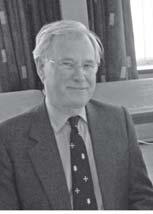
Purposes s a n d
Beginning g to o Write H e i s e s p e c i a l l y i nt e r e s t e d i n p r a gm a t i c s , a n d h i s b o o k Doing g Pragmatics i s n o w i n i ts s t h i r d e d i ti o n H i s t w o m o s t r e c e nt t b o o k s a r e English h through h Art t w i t h H a n i
In his work on levels ofmeaning(1995, 2000), Levinsondraws attentionto our abilityto distinguish wordseven when language is spoken at up tothreetimes normal speed. He conjecturesthat we speak relativelyslowly so as to allow those we address time toworkout what wemean by what we say, as in this exchange with my niece after I saidthat her aunt enjoyed gin and martini:
Nina:Like James Bond
Peter: LikeJames Bond (meaning, of course, that my wife is not like James Bondat all).
In this talk, I wantto consider three hypotheses: meaning comes from the use of language rather than from language itself we use language to point to thoughts the real meaning of an utterance isn’t the literalmeaning of whatwe say but the unspoken thought that we intendtocommunicate and that our utterance points to.
Thesehypotheses have obviousimplications forpedagogy: inmainstream presentation-practiceproduction style, we tend to treat the meanings of words and of sentences as relatively stable (i.e. ‘Like James Bond’ always means thesame thing) and thinkoflanguage learningas a rehearsal for language use.But whatif using alanguage meaningfully,i.e.to communicatethoughts,is actually thebest wayof learning it?And ifutterances point tothoughts, how is a second languagelearnerfixated on translation, literal meaning and the(bilingual) dictionarygoing toidentify thesethoughts? Finally,dowe dare to ask Prufrockianquestions,such as whethermost ofwhatwe focus onin the teachingof vocabulary misses thereal point,andwhether our work in areas like corpus linguistics needs serious rethinking?
Session 1.1 : 1040-1140
1040-1140Session 1.1
Boardroom 25 audience Workshop LT
Gresham
70 audience Workshop
TD, L L A M S I G
P
Paganini
300 audience
This workshop willexaminehow voicerecordingcanbenefit English languagelearners and identifytechniques formaximising its potential. There willbean opportunity to try outfun,engaging and collaborativeactivities using free software such as Audacity, as well as explore thepotentialthat newmobile technologyoffers learners in this area insideand outside the classroom.
Most of us considerourselves“goodcommunicators”,so whydo conversations wehave frequentlygo wrong?We will look at some key skills and strategiesinvolvedin planning and carryingout conversations and then trythem out by role playingsometypical scenarios from ELTlife involving teachers, students, managersand parents.
:
In Brighton:
D i a n e S c h m i t t (Nottingham Trent University, UK)
N o r b e r t S c h m i t t (University of Nottingham, UK)
Online fromNew Zealand:
A v e r il l C o x h e a d (Victoria University of Wellington, NewZealand)
P a u l N a t i o n (Victoria University of Wellington, New Zealand)

With estimates of the size ofthe Englishlanguage running to between 1 and2 million word forms,where do teachersbeginidentifying thevocabulary thatis worth focussing on withtheir students? Manytextbookwriters andpublishers have focussedonthe2000 or 3000wordsthat, according tocorpora, arethemost frequent. Research, however, suggeststhat fluent speech can require upto 7,000 words -and between 8,000 and9,000 wordforms are needed to understandauthenticwrittentexts. How do we bridgethis gap to ensure that our learnersbecomeeffective users of English? In this event our panel willdiscuss researchinto the vocabulary needs oflearners andsuggestwaysin which teachers can increase their students’ vocabulary in a structuredand meaningful way.
Regency
120 audience Workshop LA, LT
Tudor
70 audience
Workshop EAP, MD
An experimental, interactive demonstration showcasing the Cloudbank mobileappon Google Androidphones a)exploring intriguing language‘found’ within five minutes of the conferenceby‘guinea pig’ members attending this sessionb) analysingthe content just uploaded tothe phones c)comparing to previousfindings. Come andtake partor simply see Cloudbankin action! ie, t
We keep hearing about critical thinking skillsthese days. Butwhatare they, andhow are theydifferentto the otherskills weteach?Thisworkshopinvestigates the concept of criticality and how itfitsin with teaching contexts such as EAP. Iwill present seven characteristics of critical thinking and address the question ‘How can we teach it?’ e, t
e = experienced audience
ie = inexperienced audience
bkprom = promoting abook
p = primaryteaching s =secondary teaching
fp = focusingon published/commercialmaterial
pub = speaking onbehalf ofpublisher/examinationboard/commercial organisation
t= tertiary teaching a= adult teaching
Auditorium 2
600 audience Workshop GEN
Room 1
100 audience
Room 3
50 audience Workshop
TD, E E S O L S I G P r o g r a m m e
Room 5
50 audience Workshop TTEd
Room 6
60 audience Workshop GEN
Room 8
50 audience
Session 1.1 : 1040-1140
Storytelling teachers raisestudents’ awareness ofcultural diversity. We’ll get to the heart of telling folk tales for bridging cultures andsupporting students fromdiverse heritages.I’ll introduceactivities in whichstudents can explore whatthey findin stories through drama,improvisationandguided mental imagery. You can take way practical ideas to put into practice.
Thisyear thereare 10 HornbyScholarsfrom developing ortransitional countries studying forpostgraduate qualifications in three UK institutions. Thescholarsinvite delegatesto join them for a presentation and discussion on “Teachertraining: practice and reality”,whichwill explore thetraining and developmentof teachers in their countriesand examine some ofthe issues in helping English teachers developandmeet the challengesof their profession.
The scholarsare:C
Y u s u f ( E t h i o p i a ) Martin Wedell from Leeds University will facilitate thepresentation.
E S O L a n d m a t h s- t w
This interactive workshop will explore therelationship between language andmaths and examine someof the difficulties learnersmay have with maths problems. We willlook at some practical examplesof maths problems andyou willhave the opportunity to discuss strategies andresourcesto supportESOL learners in theclassroom, whether theyare studying ESOL or another subject. e, a
Peerobservation is an integralpartofCambridge ESOL teacher trainingcourses and a key feature of CPDin many schools.This workshop examinesthe benefitsto begained from peer observationby both parties. Itlooksatwaysofstructuring the processto ensure that the outcomes are relevant tothe individuals and support other aspects of the course. e, ie, p, s, t, a fp, pub
The editors atthe Guardian Weekly international newspaper selectarticles from a range of possibletexts every week. What are the key factors in their selection of an article and whatcanteacherslearn from this process whentheychoose news texts touse in class? Thefocus isonmaking informed choicesto helpidentify engaging andgenerative articles. ie, t, a bkprom, fp, pub
Many students taking IELTS do not always have the life experience and topic knowledge range,due to age or culturalbackground, tohelp themachieve ahigh IELTS score. We will lookatWeb 2.0 tools which can help to broadenstudents’topic awareness both inside and outside the classroom, making a morerewarding experience for students and teachers alike. e, a
AL= Applied Linguistics
BE = Business English
EAP = English for AcademicPurposes
ES(O)L = English asa Second Language
ESP= English for Specific Purposes
GEN =General
GI =Global Issues
LA= Learner Autonomy
LAM= Leadership & Management
LT = Learning Technologies
LMCS= Literature, Media & Cultural Studies
MD = Materials Development
PRON = Pronunciation
RES = Research
TD = TeacherDevelopment
TTEd = Teacher Training& Education
TEA = Testing, Evaluation& Assessment
YLT= Young Learners & Teenagers
Session 1.1 : 1040-1140
Room 9
60 audience Workshop
TTEd,Y Y L T S I G
P ro g r a m m e
Room 10
50 audience Workshop
Affective learning
Room 11
20 audience Workshop EAP
I would like to share my observations regardingdesigning CLIL projects with pre-service teachers.Therule is simple:choosea subject outside ELT, design a language component, researchthe subject on theInternet and build in anartcomponent.Sounds simple but theoutcome canbeamazing. We will evaluate some existing projects, analyse them and brainstorm new ones.
From digital cameras tomentalsnapshots, images have the powertostimulate, activate andmotivate. They can be springboards,centrepiecesormemoryhooks. They build bridges with theworldoutsidethe classroom.In thishands-on workshop we’ll be exploring how tounleashtheirpowerthrougha series of detailed practical lesson ideas aimed at a range of levels and backgrounds.
Many EAP studentshavedifficulties inmastering academic writtenregister. This workshop introducesan innovative fivepointcategorisationof the main formsof academic written grammar, and presents exercisesto enable themanipulation of these forms,individually andincombination.These exercises includeboth adaptations of traditional ELTexercises, andsomemore innovative ones.
Room 14
30 audience Workshop BE, TTEd
Drawing onexperiencegained from intercultural train-the-trainer courses andon feedback received from courseparticipants, thisworkshopintends to help ELFteachers distinguish between relevant andlessrelevant aspects of intercultural train-the-trainer concepts available on the marketandto make clear why experienced EFL teachers could be particularly wellsuited for carrying out intercultural training.
Room 15
60 audience
Workshop TD
Skyline 90 audience Workshop TD
This workshop is designed toshow how learnerscan develop their English skills indirectly –through storytelling, guided visualisation,and graphology. Theemphasiswill be ondemonstrating how fluencycanbe promoted in the classroom,butnotat the expenseof accuracy, byincorporatingeffective feedback and error correction techniques.
Today, inan agewhen we arelearningsomuch about thebrain andhowwe learn, there are many aspects to consider: individual learningstyles; motivation and meaning;the multi-sensory natureof learning;and the brain-heart connection. This very interactive and livelyworkshop will explore these exciting area in which learning takes place.
e = experienced audience
ie = inexperienced audience
bkprom = promoting abook
p = primaryteaching s =secondary teaching
fp = focusingon published/commercialmaterial
pub = speaking onbehalf ofpublisher/examinationboard/commercial organisation
t= tertiary teaching
adult teaching
Syndicate 1 200 audience Panel discussion G I & RE S S I G
Syndicate 3
200 audience Workshop GEN
Syndicate 4
200 audience Workshop GEN
TBank 20 audience Workshop
Session 1.1 : 1040-1140
Thispanel discussion aimstoexplore the progressmade sincefocusedwork began on investigatingthe teaching of Englishin large classes in the Lancaster-Leeds project of the late 1980s.The panellists will share experiences and updates from varied large class contexts including Pakistan, Syria andCameroon, and will invite the audience to do the same.
This interactive workshopwill introduce Professional English Online,a freewebsite set up to provide resources, activitiesandother supplementary materials to English teachers working inprofessional fields.Theworkshop will look at thematerials available, howtoaccessand export them for usein the classroom as wellas giving participants a chance to try them out. e, t, a fp, pub
P l a nt i n g s e e d s o f c o n f i d e n c e i n EL T
J a n e A r n
In this participative workshop we will look at theconcept of self-esteem and why taking it into account inELTclassrooms can help our students do their best. Many practical applications will be considered, including some from Seeds ofConfidence, Helbling Languages, and ways to create an atmosphere which foments confidence, motivation and interaction in the language will be explored. e, ie, p, s, a fp, pub
P r o m o ti ng
Thissession aimsto show how SmartTech technologycanpromote proof reading strategies byenablingthe tutor tobe able to effectivelyutiliseimages ofalearner’s written work. Using the software, these images are then used to create kinaesthetic learningexperiences incorporating pre-constructed annotationsymbols designed to promote communal reflective reading, evaluation and peer discussion. ie, a fp
How often doEFL teachers open their world to the students in their class? Should this be thecase, wouldstudents bemore motivated andtheir affective filterless of an impediment?In this workshop, the presenter demonstrates how her own stories are used to reveal more of herself to students while, simultaneously, allowingthemto practise their languageskills. e, a
AL= Applied Linguistics
BE = Business English
EAP = English for AcademicPurposes
ES(O)L = English asa Second Language
ESP= English for Specific Purposes
GEN =General
GI =Global Issues
LA= Learner Autonomy
LAM= Leadership & Management
LT = Learning Technologies
LMCS= Literature, Media & Cultural Studies
MD = Materials Development
PRON = Pronunciation
RES = Research
TD = TeacherDevelopment
TTEd = Teacher Training& Education
TEA = Testing, Evaluation& Assessment
YLT= Young Learners & Teenagers
Session 1.2 : 1215-1300
1215-1300Session 1.2
Boardroom 25 audience
Talk EAP
Gresham
70 audience
Talk
TD, L L A M S I G
P ro g r a m m e
Paganini
300 audience
Talk LT
Regency
120 audience
This talk will documentmy experience of teachinganew language development module onan International Foundation Programme,usinga reflective journal to record my successes, ideas and concerns.As well as giving apersonal account of current challenges facing EAP teachers, the sessionwill also include some practicalactivities that worked wellwith my classes.
One ofthe AcademicManager’s main tasksis to promote teacher development.This would normally involve mainly face to face contact with teachers, but, in my context, with language teachers all over theUK, and no physical school, theteacher development happens almost exclusively at distance.Howdo wedo it? Come along and findout! e, a
This talk willexplore two maintrends in English language teaching, in the contextof reference titles: mobile applications and language learning aspart ofa global(online) community. We will present the Macmillan EnglishDictionary apps andshare with delegates our findings and experiences of our global What’s your English? campaign on the MacmillanDictionaryBlog.
Talk LT, MD G o i n g d i g i t a l : a n i n t r o d uc t i o n t o English360 f o r t e a
)
Tudor
70 audience
Talk
LT
ie, t, a bkprom, fp, pub
Describedas “revolutionary”and“thecoursebook of thefuture”, what exactly is English360?Howcan it help your teaching, career,orschool? Designedto help teachers make apedagogically valid transitionto onlinetools, English360 combinesworld-class courses from Cambridge together withmaterialsauthoring, coursedesign, and blended learning. The result: engaging, collaborative, personalised learningpaths forour “digital native” students. e, t, a fp
A ut h e n t i c a u d i o r e c o rd i ng s m ad e ea s y
L u c y P a l m e r ( T ea c h i t ( U K ) L t d )
Finding good listening materialisa challenge:learners needhelpunderstanding authentic spoken English,butit isoftentoofastortoo complex.In this talk, Iwill demonstrate cheap and simple ways of recording and editing audio material specially for your classes.Wewill also sampleauthentic audio recordings from www.teachitworld.com anddiscuss waysof tailoringthe accompanying tasks. e, a fp, pub
Auditorium 2
600 audience
Talk GEN Wh e r e r ea d i n g
Readingproblemscan arise bothduring the processing of meaning, and duringthe processing of the language by which the meaningis communicated.Thetalk willsurvey somegrammatical featuresof written English that create obstacles fornon-native readers,andwill demonstrate exercises that teachstudents todeal with them. Examples will be takenfrom the OxfordEnglishGrammarCourse
e = experienced audience
ie = inexperienced audience
bkprom = promoting abook
p = primaryteaching
s =secondary teaching
fp = focusingon published/commercialmaterial pub = speaking onbehalf ofpublisher/examinationboard/commercial organisation
t= tertiary teaching a= adult teaching
Room 1
100 audience Talk EAP
Room 3
50 audience Talk TD
Room 5
50 audience Talk
PRON,G I S I G
P
Room 6
30 audience Workshop LT
Room 8
50 audience Talk
T E A S I G
Session 1.2 : 1215-1300
PreparingstudentsforIELTScanbeastruggle.Theaimofthispresentationisgive someusefulsuggestionsforteachers,includingsomegenericideasthatcanbe exploitedinvariousways.Someofthesehavebeenadaptedfrompublishedmaterials. Others fillgapsthat still exist. All arepractical,tried andtested. e,ie,s,t, a
Languagelearnersvarygreatlyintheirrateofsecondlanguageacquisition.This presentationsuggestswaysinwhichlanguageinstructioncanbedifferentiatedtomeet students’variedlearningapproaches,needs, andabilities.Practicalexamplesof diagnosticactivitiesanddifferentiatedtaskswillbedescribed.Handoutswillinclude both diagnostic suggestions anddescriptions ofsampledifferentiated activities.
Attitudestowardsnon-standardaccentsarechanging.Butprejudicesremain,whichare stilla)powerfullyfelt,andb)leadtopersonalandprofessionalinsecurity,particularly amongstteachers.UsingrecordingsofspontaneousspeechIwillanalyseprejudicesof myownandthoseofotherpeople,andIwillexplorethecomplexrelationshipbetween accent,identity, and one's sense ofself-worthas a professional.
Inencouragingourstudentstointeract onblogsandwikisorlivethroughSkypeorother synchronoustools,wecontributetotheirdigitalfootprint.Whatarethedangers?Can onlineidentitybemanaged?Thisworkshopwillraiseawarenessofsomeoftheissues raisedthroughhands-onactivitieswhichshouldbetterequipattendeestopreparetheir learnerstoactmore responsibly.
P r o g r a m m e U t i
Z e y n e p U r k u n ( S a b a n c i U n i v e r s i t y , I s t a n b u l )
ThissessionwilldescribehowtheIntensiveEnglishProgramofSabanciUniversitywent aboutdevelopingitssyllabusandassessmentthroughmakinguseofthemethodsand practicesoutlinedintheCEFRL.Informationondifficultiesexperiencedandthewaysin whichtheywereresolvedwillbediscussedandsuggestionstothosewhomaybe following a similarpath willbe offered. e, t
Room 9
60 audience
Workshop
LT, Y L T S I G
P r o g r a m m e
Room10
30 audience Talk EAP, LA
S ha r i n g s t o r i e s : m o t i v a t i n g y o u n g l e a r n e r s t h r o u
S h e l l y S a n c h e z T e r r e l l
HowdoweencourageyounglearnerstousetheEnglishtheylearninameaningful context? Children aresurroundedbysmart phones, netbooks,iPads, iPods,iPhones, and othermobiledevices.Inthisworkshop,wewillexplorevariousapplicationsthat motivatelearnerstosharetheirstoriesdigitally.Wewilldiscusshowtoensurethese activitiesaregroundedinsoundpedagogy. e,ie, p
Thistalkwillfocusonexperiencefromemployingtheconceptof'criticalfriends'asa wayofpromotingcriticalthinkingskillsandlearnerautonomyintheEAPclassroom. Thisformofconstructivepeerfeedbackmayfacilitatestudentstodevelopmoresolid andempiricalstandardsregardinglanguageuseandacademicconventions.
AL=AppliedLinguistics
BE=BusinessEnglish
EAP = English for AcademicPurposes
ES(O)L=EnglishasaSecondLanguage
ESP=EnglishforSpecificPurposes
GEN= General
GI=GlobalIssues
LA=LearnerAutonomy
LAM=Leadership&Management
LT=LearningTechnologies
LMCS=Literature,Media&CulturalStudies
MD=MaterialsDevelopment
PRON = Pronunciation
RES = Research
TD=TeacherDevelopment
TTEd=TeacherTraining&Education
TEA=Testing,Evaluation&Assessment
YLT=YoungLearners&Teenagers
Pleasenotethatsomepresentershaverequestedamaximumaudiencesize. Therefore,pleasechecktheaudiencesizeintheleft-handcolumnofeachentry.
Saturday 16 April
Session 1.2 : 1215-1300
Room11
Room15 60 audience Talk
TTEd
Skyline 90 audience Workshop EAP,Reading
Socialnetworkingandvirtualcommunicationhasbecomeincreasinglycommoninthe lastdecade.Joininginthisglobalcommunityofvirtualcommunicationpresentsa significantchallengeformyMexicanlearnersofEnglish.Inthistalk,Iproposeto identifysomelinguisticfeaturesofvirtualcommunicationandtosuggestwaystoenable our learnersto participate more effectively in globalsocial networks.
Throughapracticaldemonstrationthatutilisesonlyavailableresourcesandnoprepreparedmaterialthisinteractivesessionwillexplorewaysinwhichwe,asteachers, caneffectivelyrespondtotheexchangesthatemergeduringalesson.Participantswill beencouragedtoreflectonhowthisimprovisationprocesscanusefullybeappliedto their own teaching situations.
TrinityCollegeLondonassessesteachersintrainingacrossavarietyofprogrammesin differentways-portfolios,self-evaluations,observation,formalexamination,allagainst assessmentcriteria.Howfaristhisassessmentsummativeand/orformative?Howdo wecombineessentialcriticismwithconfidence-building?Howdoteachersininitial trainingunderstand ourassessmentcriteriaandourjudgments?
Researchhasshownthatextensivereadingcanimproveacademicperformance.InEFL universitysettings,however,teachershavelittleclassroomtimeandmanyskillsto cover.Howcantheyintroduceextensivereadingaswell?InthisworkshopIwilldiscuss theapproachIhavetakenatanItalianuniversityandinviteparticipantstodiscusstheir ideas andexperiences.
Syndicate 1
200 audience
Talk LT, TTEd
TheBritishCouncilandtheMinistryofEducationMalaysiahaveformedstrategic partnershipsinprovidinginnovativeclassroom practicesandpedagogicalapplicationsin languagelearning.TheHornbySchoolAsiainitiativeundertheBritishCouncilbrought aboutthedevelopmentofonlineteachertrainingthroughtheuseoftheBritishCouncil’s LearningTechnologiesweb resources and a specialisedcourseon Digital Stories.
Thelastfewyearshaveseenthepublicationofthought-provokingresearchonreading skills,e.g.KhalifaandWeir(2008-9)andGrabe(2009).Thesestudiesindicatethatthe effectivenessofthe‘subskills’approachisindoubt,e.g.teachinglearnershowtoskim andreadforgist.Inthisworkshopwereviewtheresearchevidenceandconsiderthe implications for classroomteaching. e,s,t,
e=experiencedaudience
ie=inexperiencedaudience
bkprom = promoting a book
p=primaryteaching s=secondaryteaching
fp = focusing on published/commercial material
pub = speaking on behalf of publisher/examination board/commercial organisation
t=tertiaryteaching a=adultteaching
Syndicate 3
Syndicate 4 200 audience
Session 1.2 : 1215-1300
Session 1.3 : 1400-1430
Apracticalworkshoppackedwithactivitiessuitableforstudentswithhighmusical intelligence.Wearegoingtoexploreourvoices,listentoinstrumentalmusicandsongs, andtouchontheimportanceofsilenceinclassandineverydaylife.Youdon’thavetobe amusiciantoattend-the more tone-deaf you are,themoreexciting you’llfind it.
Thistalkdescribeshowaclasswikiwasusedtoencouragefirst-yearundergraduatesto interpretandreflectonanovelinpreparationforgroupseminarpresentations.A selectionofstudentfeedbackcommentswillbepresentedwithaviewtoanalysingwhat workedaswellasimprovementsneeded.Thetutor’sroleinmanagingsuchawikiwill also bediscussed. ie,
Professionaldevelopmentismeanttoimpactonwhatteachersdoandthuswhat studentslearn,apremisethathasnotbeencloselystudied.Thistalkreportsonthefirst phaseofafoundation-fundedresearchproject documentingprofessionaldevelopment opportunitiesforstateschoolteachersintwonationalsettings–ChileandTurkey–and how teacher participation mayinfluence classroom practice andstudentlearning.
Boardroom
Gresham
70 audience
L A M S I G
P r o g r a m m e
InthistalkIwilldiscusstheethicaldutiesanddilemmasthatfacepractitionerresearcherswhentheyengageinresearchonlanguagecounsellinginautonomous learningenvironments.Inthecontextoflearner/teacherautonomy,weshouldaimat researchwith,noton,ourlearners.Iwillapproachtheseethicalconcernsinparticular withaviewtostorytellingandnarrativeinquiry.
ComealongtotheLeadershipandManagementSIGOpenForumand:findoutaboutSIG activities;meetthecommitteeandothermembers;discussthefutureoftheSIG;and discuss issuesof relevance toleaders andmanagers in ELT.
AL=AppliedLinguistics
BE=BusinessEnglish
EAP = English for AcademicPurposes
ES(O)L=EnglishasaSecondLanguage
ESP=English for Specific Purposes
GEN=General
GI=GlobalIssues
LA=LearnerAutonomy
LAM=Leadership&Management
LT=LearningTechnologies
LMCS=Literature,Media&CulturalStudies
MD=MaterialsDevelopment
PRON = Pronunciation
RES = Research
TD=TeacherDevelopment
TTEd=TeacherTraining&Education
TEA=Testing,Evaluation&Assessment
YLT=YoungLearners&Teenagers
Session 1.3 : 1400-1430
Paganini
300 audience
Talk
LA
Regency
120 audience
Talk LT
InthistalkIwilldemonstratehowEnglishsubtitlesinfilmandtelevisionprogramscan beutilizedbyteacherstoimprovereadingcomprehensionandmotivatelearners.Iwill presentapplicationswhichcanbeblendedintobothclassroomteachingandselfdirectedlearningpracticesbyprovidingexamplesthatrelatetovariouslearning contexts.
Mypresentationdemonstratesthatteacherscansuccessfullyinterveneinstudents’ learning,andchangetheirperceptions.Basedonaclassroomstudy,Iwillshowthat universitystudentsincreasetheirmotivationofdesigningonlineportfoliosviathe teacher’sstep-by-stepinstruction.Thecoursesyllabus,students’reflections,and portfolioswill bedisplayedin this session.
Tudor 40 audience
Talk LT
Auditorium2
600 audience
Talk
Room 1
100 audience Talk
Thispresentationreflectsonsuccessfulengagingwritingandspeakingactivities introducedasasupplementtotraditionalclassroompracticeinacontinuum:a)class blogsandVoxopop,VoiceThreadplatformsforleveraginglearningpersonalizationin yearone;andb)individualblogsinconjunctionwithotherengagingtoolsforenhanced learning autonomy in yeartwo.
Increasingnumbersofinternationalstudentsnowprepareforuniversitystudythrough courseswhichtrainthemtopassgate-keepingexaminations.Theseprioritiselanguage andskillstrainingbutmayneglectscholarship–theunderlyingcompetencewhich ultimatelydeterminesstudents’success.Wewillintroduceanewcoursebook, Access EAP:FoundationsPlus,andshowhowscholarshipisintegratedandmadeexplicit throughout thisbook.
Room 3
50 audience E S ( O
ThispresentationaimstoinvestigateTurkishpreserviceteachers’cognitionsand changesinthemduringthepracticum,thedegreeofalignmentbetweencognitionsand classroompracticeThedatacollectedthroughstimulatedrecall,classroom observationsandreflectivejournalswasanalysedthroughcontentanalysis.Thestudy revealedsomealignmentbetweenboth,andparticipants’implementationofshared principlesthroughdiversepractices under institutional constraints.
Reflection,raffleandrelax!Joinusforourannualchancetoreflectontheworkofthe ES(O)LSIGacrossthislastyearandwheremigrantlanguageeducationisheading.Help usfocusontheyearaheadandfindoutaboutvolunteeringwithus.Networkwithother ES(O)Lpractitionersandseethelatest resourcesin ESLand ESOL.
e=experiencedaudience ie = inexperiencedaudience
bkprom=promotingabook
p=primaryteaching s=secondaryteaching
fp=focusingonpublished/commercialmaterial pub=speakingonbehalfofpublisher/examinationboard/commercialorganisation
t=tertiaryteaching a=adultteaching
Room 5
50 audience
Talk
G I S I G
P r o g r a m m e
Room 6
60 audience
Talk
RES,TTEd
Room 8
50 audience
Talk
Room 9
60 audience Talk
LT, Y L T S I G
P r o g r a m m e
Room 10
50 audience Talk TTEd
Session 1.3 : 1400-1430
Theroleofcriticalpedagogyhasbeenemphasizedbyacademicsindealingwiththe ‘dangers’ ofEnglishlanguage teaching,particularlyintheaftermathofthepublication of Phillipson’s LinguisticImperialism in1992.BasedontheexperiencesandviewsofEFL teachersinBangladesh,thetalkaimstohighlightwaysinwhichtheEnglishlanguage canbe‘appropriated’ in EFL/EIL contexts.
ThistalkexplorestheuniquetrainingneedsperceivedbyKoreanteachersandhowMA TESOLprogramscouldbebestadaptedtotheKoreaneducationalcontext.Thesubjects ofthisstudywere21MATESOLgraduatesand83non-TESOLtrainedteacherscurrently teachinginavarietyofpublicandprivateKoreaneducationalsettings.TheModelof TESOLprogramwillbeproposed.
Iwilldescribethestandardisationofassessmentatanacademicinstitutionandmy insightsonthenecessityforteachereducationintestingandassessment,addressing resistanceto,lackofknowledgeofandmisconceptionsaboutassessmentprocedures.I willalsotalkaboutwhatteacherscanbringtoatailor-madetestingprocedureinan academic context. e, t
P a u l M a g l i o n e ( E n g l i s h A t t a c k ! , P a r i s
Forallthefocuson“EdTech”intheclassroom,littleworkhasbeendoneonleveraging technologyoutsideoftheclassroom,wherelearnersspendmostoftheirtime.Teens,in particular,couldbenefitgreatlyfromnewapproachesinthisarea.Whatarethebest formats;howcanwemotivateself-learning;andwhatisbestdoneoutside,vs.inside, theclassroom?
e,s,t,
Thepresentationfocusesonassessmentpracticesthatprotectstudents’creativity, introducingevaluationmethodsmeanttoincreaseit.Ascreativityisoftenassociated withnewandoriginalwork,Iwillhighlighttherole oftheteacher inthecreativeprocess andwillsharepartofherexperienceinencouragingstudents’creativity.Adisplayof students’ creativeproducts willliven up the presentation.
Isthereaneedtoreconsiderwhatfunctional languageistaughtinside theclassroom?Is thereanexplicitneedtoempowerstudentswiththelanguagechoicesthathavebeen ignoredpreviously inmainstreammaterials.Thispresentation willreflecton the explicit teaching ofimpoliteness in the second-languageclassroom in a UKsetting. e, a
AL=AppliedLinguistics
BE=BusinessEnglish
EAP = English for AcademicPurposes
ES(O)L=EnglishasaSecondLanguage
ESP=English for Specific Purposes
GEN=General
GI=GlobalIssues
LA=LearnerAutonomy
LAM=Leadership&Management
LT=LearningTechnologies
LMCS=Literature,Media&CulturalStudies
MD=MaterialsDevelopment
PRON = Pronunciation
RES = Research
TD=TeacherDevelopment
TTEd=TeacherTraining&Education
TEA=Testing,Evaluation&Assessment
YLT=YoungLearners&Teenagers
Session 1.3 : 1400-1430
Room14
30 audience Talk Pragmatics
Room15
60 audience Workshop RES
TurkishlearnersareapparentlycompetentatlinguisticaspectsofEnglish.However, thisisnotthecasewithpragmaticskills.Non-nativelikeproductionbyourstudentsis quitecommoninlanguageclassrooms.Ouraimistoexplicatehowcloseourstudents aretonativespeakersofEnglishornon-nativespeakerslivingintheUSAintermsof usingsituation-boundutterances.
Drawingontheconceptof deverbalisation,whichstatesthatlinguistic,contextualand encyclopaedicknowledgeasawholearecrucialtounderstandingintendedmeanings, thisworkshopencompassesvariousactivitiesforfullygraspingandre-expressing sense.Suggestedstrategiestoachievesuchpurposeincludespottingunitsofmeaning, inferringintentions,detectingtheunderlyingstructureofarguments,paraphrasing, summarising, gist interpretation andsight translation.
Skyline
90 audience
Talk
TTEd
Syndicate 1
200 audience
Talk EAP
Syndicate 2
200 audience
Talk LMCS
Syndicate 3
200 audience
Talk
EAP,ESP
Amidstcountlesslarge-scaledevelopmenteffortsinKosovo,myteachertraining project,largelyofftheradarscreen,wastoidentifyandgrowateamofteachertrainers, ineffortstoimproveEnglishlanguageteachinginthisyoungcountry.Iwillfocusonthe highsandlowsofthemulti-prongedapproachtakentopreparementorteachersforthe developmentstocome.
ThepurposeofthisstudyistoinvestigatehowFreshmanEgyptianstudentsinan interculturalinstitution,TheAmericanUniversityinCairo,understandplagiarismand perceiveitsgravity,comparingthemtonon-Egyptianstudentsstudyinginthesame contextinanattempttoenlightenteachersandtheadministrationonhowtohelpthem avoidit. e
P o e m s f o r l
U K )
Whatisthepurposeofusingpoemsinalanguageclass?Thistalkwillreportonmyown experienceofusingpoemsinEFLclassesatalllevels,inteachertraining,andevenon EAPcoursesforscientists,usingpoemswhichstudentsmayrelateto,andpreparing varied activities, including trying their ownhand atwriting. e,s,t, a
EspeciallyinEAPandESPsettings,teamteachingisbecomingmoreandmorecommon. Thoughinterdisciplinarycollaborationmaybechallengingattimes,bothstudentsand teachersbenefitgreatlyfromsuchaset-up.Thispresentationwillreportonseveral different approaches tothisissuepiloted atauniversity insouthern China. e,ie, t
e=experiencedaudience
ie=inexperiencedaudience
bkprom=promotingabook
fp=focusingonpublished/commercialmaterial pub=speakingonbehalfofpublisher/examinationboard/commercialorganisation
Syndicate
Saturday 16 April
Session 1.3 : 1400-1430
Session 1.4 : 1445-1530
Thistalkreportsonanimpactstudyofashortinitialteachertrainingprogrammein TESOL.Thefocusisthewaysinwhichtheteachertrainingandlearningactivitieswithin theprogrammeshapepracticeasateacher.Thedataisprimarilydrawnfromtelephone interviews withnewly-qualifiedteachersinTESOLworkaroundtheworld.
ThepresentstudyaimedtoexploreEFLteachers’beliefsonreadingstrategiesandthe instructionofthemandtoinvestigatetheir actualclassroompracticesonpre,whileand post-readingtypes.Inordertoidentifyteachers’beliefsregardingreadingstrategies,a questionnaire,fieldobservations,andsemi-structuredinterviewswereadministered. Theresultsdepictedthatteachersvaluedpre-readingstrategiesmorethantheother types.
1445-1530Session1.4
Boardroom 25 audience Talk LT
Gresham 70 audience Workshop
L A M S I G P r o g r a m m e
Inthissession,IwilltakeyouonatouroftheEnglishblogssystemthatwassetupfor İSTEK,aprivately-ownedchainofeducationalinstitutionsinIstanbul.Theblogshave beenmaintainedbyEnglishteachersfromeightdifferentschools.Iwilltalkaboutmy practical experiences as a mentorand share the opinions from some ofour students. e,ie, p, s
e, t
Paganini
300 audience
Regency 30 audience Talk
i
Thepurposeofthisworkshopistodiscusswithparticipantsthedifferentapproaches, stylesandconceptsofeducationalleadershipandmanagement.Differencesbetween leadershipandmanagementroleswillalsobeemphasized.Theworkshopwillfocuson twokindsofstrategies:a)Interpersonalandcommunicationstrategies;b)Personal organisationalskillsandstrategies.
Thereisagrowinginterestinusingcomputergamestoencourageinteractioninthe targetlanguage.Buthowbesttoincludegamesaspartofclassroomlearning?Andhow toensurelearningtakesplacewithoutgettingridofthefun?Basedonexamplesfrom thebook for teachers DigitalPlay(DeltaPublishing),we'lllookathowbesttodothis. e,ie, s, a bkprom, fp, pub
S
Increasingly,Englishisthelanguageoftertiaryeducation.Tofunctionsuccessfully,e.g.
EAPwriteessays,takepartintutorials,studentsneedarangeofskillsontopof‘ordinary’ linguisticskills.Thisistheroleofstudyskills.OUP’s HeadwayAcademicSkills series helpsstudentslearntheseskillsandstrategiesfromA1levelinstepwiththeirgeneral English courses.
AL=AppliedLinguistics
BE=BusinessEnglish
EAP = English for AcademicPurposes
ES(O)L=EnglishasaSecondLanguage
ESP=English for Specific Purposes
GEN=General
GI=GlobalIssues
LA=LearnerAutonomy
LAM=Leadership&Management
LT=LearningTechnologies
LMCS=Literature,Media&CulturalStudies
MD=MaterialsDevelopment
PRON = Pronunciation
RES = Research
TD=TeacherDevelopment
e, ie, t, a bkprom, fp, pub
TTEd=TeacherTraining&Education
TEA=Testing,Evaluation&Assessment
YLT=YoungLearners&Teenagers
Saturday 16 April
Session 1.4 : 1445-1530
Tudor
70 audience
Talk
GEN
Auditorium2
600 audience
Habitualreadersusetheirimaginationstotakethemtoallkindsofplaceswhenthey read.Wecanalsoencouragereluctantreaderstomakeconnectionsbysurrounding readingtextswithstimulatingmaterialsuchasInternetprojects,cross-curricular connections,connectionsbetweenstoriesandfilmsandimages.Exampleswillbetaken fromthe Black Cat series of gradedreaders. e,ie, s fp,pub
WithmediaandrealiafromtheUniversityofWarwickELTArchive,weexplore Hornby’slegacythroughhispublications,the ELTJ,theworkoftheBritishCounciland theBBC,andtheHornbyTrust.
Hornby’sgroundbreaking AdvancedLearner’sDictionary recentlyenteredits8th edition.In2011theASHornbyEducationalTrust,generouslycreatedbyASHhimself, celebrates its 50th anniversary.
Room 1
100 audience
Talk MD
Room 3
50 audience
Talk
Room 5
50 audience
Talk
LA, G I S I G
P r o g r a m m e
Room 6
60 audience
Talk
TTEd
Inthispracticaltalk,wewillexamineattitudes,definitionsandpracticalitiesthatare associatedwiththeterm‘authenticity’inELT.Wewillconsiderhowideasandpriorities havechangedinrecentyearsasaresultoftheexplosionofdigitalmaterialsand resources that are nowavailableto the modern teacher.
Thistalkwillreportonthepilotofaprojectdesignedtoimprovecross-cultural communicationinthecommunitythroughatrainingeventforcompaniesand organisationswith staff inpublic-facingroles.Therewillbeanexplanationoftheproject conception, its design and a description of the reactions of theparticipants to thepilot.
S t e p h e n B r e w e r
Associalanundertakingaslanguagelearningmaybe,thereisnonethelessan importantintrapersonaldimensionthatultimatelyplaysadeterminingroleinstudents' successwithforeignlanguages.Inaworldfilledwithincreasinglyintelligentmachines thatoftendirectourattentionoutsideourselves,coulditbeworthwhiletoreflecton moreintrospectiveapproachestodevelopingproficiencyinanewlanguage?
IsitpracticaloradvantageousforanewlyqualifiedteachertoimplementaDogme approachintheirclassroom?Iwanttolookathowreapplyingconventionalplanning approachescouldenablemorenewteacherstoimplementthisapproachinapracticable way,whilealsomaximisingself-development intheirfirst yearteaching.
e=experiencedaudience ie=inexperiencedaudience
bkprom=promotingabook fp=focusingonpublished/commercialmaterial pub=speakingonbehalfofpublisher/examinationboard/commercialorganisation
Room 8
50 audience Workshop
T E A S I G
P r o g r a m m e
Room 9
60 audience Workshop
CLIL,Y L T S I G
P r o g r a m m e
Room10
50 audience
Talk
LT, TD
Room11
20 audience Talk EAP
Room14
30 audience Talk RES,TTEd
Room15
60 audience Workshop GEN
Session 1.4 : 1445-1530
ThissessiondiscussestheimpactofEnglishlanguageassessmentonChineselearners byanalysingtwooftheworld’slargestscaleEnglishtests(NationalMatriculation EnglishTestandCollegeEnglishTest).I’llfocusontestvalidation,i.e.,constructsas intendedbytestdevelopers,and testuse,i.e.,unintendedconsequencesperceivedby testusers, to bridge the gapbetween validity andconsequences. e, t
ThispresentationlooksatCLILinpractice.Itaddressesissuesteachersfacewhenthey plan,prepare,teachandthenevaluatetheirteachingandthematerialstheyuse.Atthe endofthepresentation,theoryandpracticewillbelinkedtoTKT:CLILandwillshow how teacherscan prepareforthe test through their teaching practice. e,ie,p, s fp,pub
EUfundedAVALONaimedtoexplorelanguagelearninginSecondLifeandinthis sessiontheresultsofthe2-yeardevelopmentprojectwillbepresented.HeikePhilp showshowvirtualworldsfacilitateinternetcommunicationinreal-timeinausergeneratedworldwhichexcelsinimaginationandbeautyandintroducestheAVALON teacher training course. e,ie, a
Awarenessofhowinferenceoperatesisessentialtowritingcoherentprose.Thistalk givesanoverviewofdifferentkindsofinferencesandtheirtextualfunctions.Samplesof studentwritingwillbeusedtoillustratehowimpropermanagementofthelevelof inferencerequiredcandiminishwritingquality.Raisingstudents’awarenesstothese features is recommended.
Motivationhasalwaysplayedanimportantpartinsuccessfullanguagelearning.The reasonsstudentsandteachersattributetosuccessandfailureinlanguagelearning, usuallydifferand,students’attributionsmayvaryaccordingtoanumberofdifferent variables.Theseattributionsmayinterferebothpositivelyandnegativelyinpresentand future learningof thesameoradifferentlanguage. e, a
Inthisworkshop,Iwillfirstdiscusstherationalebehindusingdictionariesinclass,and thentacklethelanguageskillsandsub-skillsthatcanbetaughtbymeansofa dictionary.Afterprovidingguidelinesfordictionarytraining,Iwilldemonstratehow
learner’sdictionariescanbeusedintheclassroomasadynamiclearningtoolwhen teaching studentsof different levels.
AL=AppliedLinguistics
BE=BusinessEnglish
EAP = English for AcademicPurposes
ES(O)L=EnglishasaSecondLanguage
ESP=English for Specific Purposes
GEN=General
GI=GlobalIssues
LA=LearnerAutonomy
LAM=Leadership&Management
LT=LearningTechnologies
LMCS=Literature,Media&CulturalStudies
MD=MaterialsDevelopment
PRON = Pronunciation
RES = Research
TD=TeacherDevelopment
TTEd=TeacherTraining&Education
TEA=Testing,Evaluation&Assessment
YLT=YoungLearners&Teenagers
Session 1.4 : 1445-1530
Skyline
90 audience
Talk GEN
Syndicate 1
200 audience
Talk RES
Syndicate 2
200 audience
Talk GEN
Syndicate 3
200 audience Workshop TD
Capturingtheinterestofstudentsatanyageisachallenge.However,providing engagingactivitiesinitiatestheeasiestpathwaytolearning,referredtobyresearchers as“arousal”. Unfortunately,fun classroom activitiescan be time consuming tocreate.In thissession,thepresenter willdemonstrate10gamesthatteacherscanadaptto encourage“arousal” in any lesson.
Syndicate 4
200 audience Workshop
TTEd
WereportonanationalactionresearchprograminitiatedbyEnglishAustraliaand sponsoredbyCambridgeESOL.Sixteachersworkedwiththepresenterstoundertake practitionerresearchinpriorityareasinteachingEnglishtointernationalstudents. We’llanalyseprojectdatatoidentifykeycharacteristicsoftheprocess,teachers' experiences andthepotential ofactionresearch to contribute toprofessionalpractice.
We’lllookathowtopresentandpractisecollocations,fixedexpressions,semi-fixed expressionsandlexicalpatterns,bringingordertothisdiverselanguagewhichis essentialforhelpinglearnersprogressbeyondanintermediate/B1level.We’llexamine variouspresentationstylesandmeaning-based(asopposedtoform-based)practice exercisesfromthehigherlevelsof EnglishUnlimited,withitsdistinctivelyhighlighted targetlanguage. e,ie, a bkprom, fp, pub
Attheheartofsuccessfullanguagelearningistheteacher’sabilitytodevisemethods thataddressstudents’ needsandcurrentstatusin thelanguageacquisition process.Ina seriesofquestionsandanswersfromthebook TeachingLanguageLearners,this workshopfocusesonmethodsthatinspirestudentstothinkandinteractwiththe languageto acquire itsuccessfully. ie, a bkprom, fp, pub
Thisworkshopwillconsiderbestpracticeininitialteachereducationcourses,suchas CambridgeESOL'sCELTAcourse.Itwill'borrowwisdom'fromotherdisciplinesinthe formofshortquotationsandparaphrasesandparticipantswillhavetheopportunityto discussinsmallgroupstheextenttowhichtheseinsightscanbeappliedtoinitial teachereducation. e, a
Thistalkexaminesthematches/mismatchesbetweenEFLteachers'beliefsandtheir actualfeedbackpractice.Samplesofteachers'feedbackareanalyzed,andthenthey respondtoaquestionnaireontheirfeedbackpractice.Teachersareinterviewedtofind similaritiesand/ordifferencesbetweentheirbeliefsandactualfeedbackpractice. Implicationsforteachersarehighlighted,andadiscussiononeffectivecorrective feedbackfollows.
e=experiencedaudience
ie=inexperiencedaudience
bkprom=promotingabook
p=primaryteaching s=secondaryteaching
fp=focusingonpublished/commercialmaterial pub=speakingonbehalfofpublisher/examinationboard/commercialorganisation
t=tertiaryteaching a=adultteaching
Session 1.5 : 1605-1635
1530-1605Coffeebreak(sponsoredbyEnglishSpeakingBoard)
1605-1635Session1.5
Boardroom 20 audience Talk LT
Gresham
70 audience Talk
L A M S I G P
Paganini
300 audience Symposium
Capturingourstudents'interestandtappingintotheirimaginationisgettingharderand hardertoachieveinthisageofinstantgratificationfrommoderntechnology.Inthistalk Iintendtooffersomeadviceandsuggestionsastohowwecanusesuchtechnologyto encourageour students to experience English outside theclassroom. ie, a, fp
Thesessionaddressesthequestion,posedbyWhiteetal(2008),ofhowamanagercan “manage,monitorandevaluate(employees’)performanceinanon-intrusivewaythat doesnotdemotivate”,bylookingatthefindingsofasurveyconductedinAustraliainto staffviewsoftheirperformancemanagementexperiences.Currentpracticesof performance managementand appraisal willbe discussed. e, t, a
1605-1835T
T h e E L T B l o g o s p h e r e
K a r e n n e S y l v e s t e r ( K a l i n a g o E n g l i s h / V o x y . c o m )
Fromahandfulofearlyadoptersin2003toover250EFLteachersblogging internationally by2011, we'lllookatthewriters whodrivetheELTblogosphere: who are they?Whataretheywritingabout?Wherearetheybased?Whatissuesdotheydiscuss ontheirpages?Whovisitsthesepages?Why dotheyspendsomuchtimeinaseemingly non-profitable activity?
Panel and Audience discussion
T h e m e : B l o g g i n g w i t h L a n g u a g e L e a r n e r s
B l o g g i n g a s T e a
Jointhe EnglishClub.com administratoras she reflectson therewards andchallenges of bloggingwiththousandsofELLsfromaroundtheworld.Shewillshowhowblogsand otherinteractivetoolscanbeusedwithine-communitiestoopenupanentirelynew opportunityforEnglishlanguagelearners,especiallynon-connectedstudents,whose classroomhasbecomethe internet.
Panel and Audience discussion continued...
AL=AppliedLinguistics
BE=BusinessEnglish
EAP = English for AcademicPurposes
ES(O)L=EnglishasaSecondLanguage
ESP=English for Specific Purposes
GEN=General
GI=GlobalIssues
LA=LearnerAutonomy
LAM=Leadership&Management
LT=LearningTechnologies
LMCS=Literature,Media&CulturalStudies
MD=MaterialsDevelopment
PRON = Pronunciation
RES = Research
TD=TeacherDevelopment
TTEd=TeacherTraining&Education
TEA=Testing,Evaluation&Assessment
YLT=YoungLearners&Teenagers
Session 1.5 : 1605-1635
Regency 120 audience Workshop LT
HowdoesbloggingfosterengagementwiththelocallifeandcultureoftheUK?Iwillbe showingyouhowbloggingdevelopsrelevantrealworldandacademicITandnewmedia skills;encouragesteamwork,nurturesskills,developsresearchskillsandprovides newand exciting Englishlanguage learningprojects.
Panel and Audience discussion T
I’llbetakingusthroughsomeofthewaysthatteachersandlearnersgathertogetherin theadventureofe-learning.I'llbewalkingusthrough#ELTchat#Edchatandthevirtual roundtable;exploringthecreationofeffectivelearningcommunitiesonline,whether withlearners,otherteachers(orboth)anddiscussinghowtheyencourageusto continue learning beyond ourclassroomsand staffrooms.
Finalpanel and audience discussion.
(
Developmentsinlearningtechnologiesandtrendsinblendedcoursedeliveryposenew challengestoeducatorsandlearnersintermsofmaintainingtheflowandpaceof personalisedlearningpaths.Thisworkshopwillexaminehowthetoolsavailableon web-basedplatforms,suchasMoodle,English360andothers,keeplearnersforwardbound and 'on track' to achieve their personal goals.
Tudor
70 audience Talk GEN
Auditorium2
600 audience
e,ie,s,t, a fp,pub
Thetalkwillreportandanalyzefindingsofaquestionnairestudyconductedonover200 teachersandteacher-traineeswhichinvestigatedtheirviewsonnumerousgrammarrelatedissuesinELT.Thedatawillbecorrelatedwithcurrentrecommendationsfor grammarinstructionfoundintheEFLliterature,andimplicationswillbedrawnfor teacher training courses. e,ie,p, s
Doestheideaofanobservationinstilfearandterrorinyouoryourteachers?Whyis this?Doyouwanttochangethisatall?Isthereasystemthatmakesthecultureof
observationwhereyouworktrulydevelopmental?Yesthereis...it’sanewscheme called“OpenDoor”...
e=experiencedaudience ie=inexperiencedaudience
bkprom=promotingabook fp=focusingonpublished/commercialmaterial pub=speakingonbehalfofpublisher/examinationboard/commercialorganisation
Room 1
100 audience Talk ESP
Room 3
50 audience Workshop
E S O L S I G
P r o g r a m m e
Room 5
50 audience
G I S I G P r o g r a m m e
Room 6
30 audience Workshop EAP, MD
A p p l i e d S c i e n c e s )
Room 8
50 audience
T E A S I G
P r o g r a m m e
Room 9
60 audience
Talk
RES,Y L T S I G
P r o g r a m m e
Room10
50 audience Talk TTEd
Session 1.5 : 1605-1635
Combininglearnerautonomy,web-basedlearningandESP,thesimulationspresented hereintegratethefourskills,usingonlinecountryprofilesandtravelguidesto reproducethelanguagecommonintheengineeringbusinessworkplacesoftoday.Busy teacherswillbeabletoadaptthelevel,languageandlearninggoalsaccordingtotheir ownindustry,institutionaland individualrequirements.
Canspellingreallybetaught?Howdowemakespellingfun?Canlearnersteacheach other?Thisisaninteractive/reflectiveworkshopexaminingwaystomakespellingfun, integratingitintoeverydaypractice.Spellingpatternscanbelearnedandwithoutusing asinglespellingtest,we’llexploreavarietyofgamesandmethods,withplentyofideas totakehome. e, ie, t, a
TheOpenForumisyourchancetofindoutmoreaboutGISIG,itsaimsanditsactivities. Contributetoourdevelopment,suggestwaysforward,andmeetotherGISIGmembers. This is also your opportunity to meet the GISIG committee.
Whilereading,goodreadersinteractwiththewriter,showagreement/disagreement, analysethetext:itscontentandlanguage,evaluateitwhetheritisinterestingornot. Theydothesemostlysilentlythroughaninnerdialogueintheirminds.Thisworkshop buildsonthisideaandintroducesanapproachthataimsatrevealingeachstudent’s mind map whilethey arereading.
, E v a l u a t i o n & A s s e s s m e n t S p e c i a l I n t e r e s t G r o u p O p e n F o r u m
ComeandjoinusfortheTEASIGOpenForumandjoininourTEA‘pub’quizwith amazingprizes!Alsofindoutaboutallourexcitingplansfor2011-12andmeetour wonderfulcommitteemembers...Wewillalsohaveanopportunitytosharewithyouthe highlightsofourPCEon AssessingListening–lookingforwardtoseeingyouthere!
Thistalkdiscussesthefindingsofastudywhichfocusesontheattitudes,preparation andEnglishproficiencyofstudentsatthetransitionfromprimarytosecondary education.ImportantissuesregardingtheeffectivenessofEnglishinstructionand curriculumimplementationwillbediscussedincludingthemismatchbetweenteaching e,ie, p objectives and students’ perceivedneeds.
Our studyexaminedtherole(andnecessity) ofnative assistantlanguage teachers(ALTs) comparedwithnon-native,non-specialistJapaneseteachersofEnglishinelementary schools,criticallyexaminingtheargumentthatnativelanguageteachersmakebetter teachers,andexploringthevalueofthenon-native,non-specialistteachersaslanguage “attitude-formers”.Resultsrevealthatnon-nativeteachersrepresentan underestimatedvaluable resource for students.
AL=AppliedLinguistics
BE=BusinessEnglish
EAP = English for AcademicPurposes
ES(O)L=EnglishasaSecondLanguage
ESP=English for Specific Purposes
GEN=General
GI=GlobalIssues
LA=LearnerAutonomy
LAM=Leadership&Management
LT=LearningTechnologies
LMCS=Literature,Media&CulturalStudies
MD=MaterialsDevelopment
PRON = Pronunciation
RES = Research
TD=TeacherDevelopment
TTEd=TeacherTraining&Education
TEA=Testing,Evaluation&Assessment
YLT=YoungLearners&Teenagers
Saturday 16 April
Session 1.5 : 1605-1635
Room11
20 audience Talk
GEN
Room14
20 audience Talk
RES,TD
Thispresentationfocusesonstudentswhodonotcometoclassregularlyandtheir reasonsforabsenteeismaswellastheirteachers’perspectiveonthesameissue.The resultsofresearch willbesharedtorevealthereasons both studentsandteachers give. Thecollecteddatawillbecomparedtoseehowwellteachersareawareofthese reasons.
Thiscasestudyexploresattitudesofallacademicstowardsresearchataforeign languageschool.Teachers’actualinvolvementinresearchactivitiesandother practitioners’perceptionsof teacher-researchrelationshipandtheschoolsupport systemareinvestigated.Explorationofcausalmechanismsbetweenresearchactivities andteacherprofilesmayprovideamodeltoimproveconditionsinsimilarinstitutions.
Room15
20 audience Talk LT
Skyline 90 audience Symposium 1605-1835
Thistalk,basedonresearch,describesandanalysesthenatureofpedagogicinteraction developedinEFLclassroomsequippedwithinteractivewhiteboardtechnology.Theaim ofthetalkistoofferinsightsintohowtheprocessofforeignlanguagedevelopmentis affectedinthisICTenvironmentand,ultimately,toinspirepedagogiesthatwould promotethe seamless and effective exploitation of IWBs.
TheaimofthisSymposiumistobringtogetherpractitioners,researchersandtesting specialistsinthefieldofEAP,toexchangeexperiencesinrelationtolistening,andto address questions such as:
What aspects listening competence are particularly important for overseasstudents? What aspects dothey findmostdemanding?
How can wedevise valid testsof listening for academic purposes?
R i c h a r d B a d g e r
Thistalkviewsofauthenticityasaninteractiveprocess,Ratherthanseeingauthenticity astodowithwhereatextcomesfrom,itseeauthenticityastherelationshipbetween thewaythetextisusedintheclassroomandthewayitisusedoutsidetheclassroom. The talkexplores theimplications of this viewfor thelistening classroom.
G a r y B u c k
Thispresentationwillexplorethedesignofageneral-purposetestofadultacademic listening.Thistestisintendedformultiplepurposes:forplacement,totracklearning, andforgeneralproficiencyassessment.Thepresentationwillexploreconstruct definition,testdesign,andscorereportingissues;andwillalsoaddressthepractical implications andlimitations ofsuch a multi-purpose test design.
continued...
e=experiencedaudience
ie=inexperiencedaudience
bkprom=promotingabook
p=primaryteaching s=secondaryteaching
fp=focusingonpublished/commercialmaterial
pub=speakingonbehalfofpublisher/examinationboard/commercialorganisation
t=tertiaryteaching a=adultteaching
Syndicate 2
200 audience
Talk
TTEd
Session 1.5 : 1605-1635
This presentation explores the effectsof a groupof listening task input factors(linguistic complexity,speechrateandexplicitnessoflisteningpassages),ofproficiencylevel,and ofworkingmemorycapacityonEnglishforAcademicPurposes(AEP)listeningtask difficulty.TheimplicationsforEAPlisteningtaskdesign,assesment,andpedagogywill be discussed.
Theframeworkforacademiclisteningisbasedonevidenceassembledaspartof researchcarriedoutbyaBALEAPworkingpartyintoareasofcompetencyat postgraduatelevel.Theframeworkdescribesthecompetenciesrequiredtofunction effectivelyandisdesignedtoguidetheteachingandassessmentofinternational students on pre-sessional courses.
Thispresentationreportsonresultsfromataskanalysisofhowwellthe11integrated item types in the Pearson Test ofEnglish Academicperformedasameasureofacademic Englishlisteningability.Thefindingswerefurtherexploredstatisticallytoexaminethe effectivenessofitemtypes,theunderlyinglisteningconstructs,andtherelationship between listening performanceand demographicbackgrounds.
TheEuropeanLanguagePortfolio(ELP)hasbeenpilotedandimplementedinvarious waysindifferentcontextsaroundEurope.Basedonamaster'sthesisresearch,thistalk willdwellonsomeclassroompracticesrelatedtotheELPintheTurkishcontextand questionwhetherthesepracticeshelplearnerstobecomemoreautonomousin planning,implementing,monitoringand evaluating their ownlearning.
TheHavanaPedagogicalUniversityasateachertraininginstitutionhasbeenactively involvedintheimplementationofTKTpreparationcoursessponsoredbytheBritish CouncilinHavana,tocontributetotheprofessionaldevelopmentofteachers.Thistalk exploresthelanguageteachertrainingmodelinCuba,thestrategyforprofessional development and finally theexperience to integrateTKT into this strategy.
AL=AppliedLinguistics
BE=BusinessEnglish
EAP = English for AcademicPurposes
ES(O)L=EnglishasaSecondLanguage
ESP=English for Specific Purposes
GEN=General
GI=GlobalIssues
LA=LearnerAutonomy
LAM=Leadership&Management
LT=LearningTechnologies
LMCS=Literature,Media&CulturalStudies
MD=MaterialsDevelopment
PRON = Pronunciation
RES = Research
TD=TeacherDevelopment
TTEd=TeacherTraining&Education
TEA=Testing,Evaluation&Assessment
YLT=YoungLearners&Teenagers
Session 1.5 : 1605-1635
Syndicate 3
200 audience
Symposium
1605-1835
Syndicate 4 200 audience Talk AL
LanguageLearnerLiterature(LLL)isnowanacceptedsub-genreofliterature,justlike teenfiction.Itcombinesthepowerofliteraturewiththepowerofextensivereadingfor languagelearning.Thedistinguishedpanelofauthors,editorsandpublisherswill discuss some key ideas for the writing,adaptationanduseofLLL.
J
Retellingastory,whetheraclassicoftheliterarycanonoramodernshortstory,isa complexandchallengingtask.Thistalkwilllookatthepitfallsofadaptation,examine somegroundrules,andexplorewaysofcraftingnarrativesthatwillbebothengaging andaccessible for L2readers. ‘
Writersknowthathavingagoodsenseofnaturalspeechpatternsisessentialtogood dialogue.Butcanyoureallybenaturalinoriginalfictionforlearners?Howcanyouwrite lively,believabledialogueandstillstaywithinwordlistsandgrammarconstraints?In this interactive session we’lllook at some waysof keeping itreal.
Languagelearnerliteraturehasoftenbeenperceivedaslackinginthoughtorliterary merit.Asawriteroforiginalreaders,Iwilldemonstratehowevenbookswrittenfor lowerlevellanguagelearnerscanbeexcitingandrewarding.Mytalkwillshowhowthe storycomesfirst,andthatsimplicityoflanguageshouldneverbeequatedwith impoverishment of content. H o w d o R
Mypartinthesymposiumwillfocusonwhattriggersastoryinmymind,andtechniques Iuseforthedevelopmentofplotandcharacter.Therewillalsobesomeexamplesof howaneditorcanhoneandpolishboththestoryitselfandhowitconformstothe necessary limitations.
ThesymposiumisfollowedinthesameroombytheExtensiveReadingFoundation
LanguageLearnerLiteratureAwardsCeremonyandReception.TheAwardswillbe presentedbymembersoftheERFBoardandincludethepresentationofthefirstJohn MilneLifetimeAchievementAwardtoDavidR.Hill.Theceremonyandreceptionare sponsoredbyCambridgeUniversityPress,Heinle,Helbling,IELTS,Macmillan,Oxford University Press, PearsonLongman/Penguin, andScholastic/Mary Glasgow.
Attitudetowardsalanguageisoneofthekeyfactorsthataffectthelanguagelearning process.Thissessionis aboutastudythat exploredlanguageattitudesofTurkishpeople towardsEnglishthroughanalysisof600entriesinacollaborativeinternetdictionary. Theaim,methodandfindingsofthestudywillbesharedandimplicationswillbe discussed with the audience.
e=experiencedaudience
ie=inexperiencedaudience
bkprom=promotingabook
p=primaryteaching s=secondaryteaching
fp=focusingonpublished/commercialmaterial
pub=speakingonbehalfofpublisher/examinationboard/commercialorganisation
t=tertiaryteaching a=adultteaching
TBank 20 audience Talk EAP
Session 1.5 : 1605-1635
Session 1.6 : 1650-1720
Thepurposeofthisexploratorystudywastoinvestigatetheperceptionsandattitudesof graduatelearnerstowardsapeer-writingworkshopapproachinanEAPwritingmodule.
Thepresenterwilldescribethemethodology,datacollectioninstruments,andfindings, andwillsharethepeerresponseworksheetsforthedifferentrhetoricalpatternsofthe academic essaysused in the course.
Boardroom
25 audience Talk LT, MD
Gresham
70 audience Talk
LT, L A M S I G P r o g r a m m e
Paganini 300 audience Symposium 1605-1835
Regency 120 audience Talk EAP,ESP
Basedonmyexperiencewithsecondaryschoolclasses,Iwillexplorehowteacherscan harnessthecollaborativetoolstheylearnaboutthroughtheirPLN(PersonalLearning Network).Iwillarguethatexperimenting,andevenhavingfalsestarts,areintegralto successfullearning, andto creatingbetterlearners andmore effectiveclassrooms. e,ie, s, a
Educationalinstitutionsworldwidearereducingbudgets,butITisdifficultformanyELT managerswhocanstruggletodistinguishbetweenessentialanddiscretionary expenditure.ThepresenterwillofferadviceonhowtogetvaluefromtheirITsystems, applyindustry-standardmetricsandbydoingsofocustheirattentiononlearnerfacing resources and supporting effective language learning andteaching.
(Seepages 71 & 72 fordetails)
Tudor
30 audience
Talk
EAP,ESP
Thepresenterwilldiscussanactionresearchplanforthecourse MedicalEnglish-I to improvestudents’technicalandsemi-technicalterminologyknowledgeandfosterESP coursedesign.ThestudyaimedatcompensatingfordeficienciesofEnglishmedical terminologybyusingvocabularylearning strategiesfocusingondiscoverythrough guessingfromtextualcontextandconsolidationstrategies,collocations,derivation, synonyms and antonyms.
HararePolytechnicprovidestertiaryESPeducationtostudentsdrawnfromdiverse culturalbackgrounds.Thetalkinvestigateschallengesandopportunitiespresentedto theESPteacherwhograppleswithlearnersfromvariouslinguisticbackgrounds.It examineshowculturalintegrationcancontributetowardsaddingvaluetoESP. Languageandthelearners’culturalexperiences’effectsonpedagogyofESPcourses willbeexplored.
AL=AppliedLinguistics
BE=BusinessEnglish
EAP = English for AcademicPurposes
ES(O)L=EnglishasaSecondLanguage
ESP=English for Specific Purposes
GEN=General
GI=GlobalIssues
LA=LearnerAutonomy
LAM=Leadership&Management
LT=LearningTechnologies
LMCS=Literature,Media&CulturalStudies
MD=MaterialsDevelopment
PRON = Pronunciation
RES = Research
TD=TeacherDevelopment
TTEd=TeacherTraining&Education
TEA=Testing,Evaluation&Assessment
YLT=YoungLearners&Teenagers
Session 1.6 : 1650-1720
Auditorium2
600 audience
Talk
TD
Room 1
100 audience
Talk
RES
Room 3
50 audience
Workshop
E S O L S I G P r o g r a m m e
Room 5
50 audience
Talk
LA, G I S I G
P r o g r a m m e
Room 6
60 audience
Talk
EAP
Thispresentationwillupdateyourunderstandingofadultlanguagelearnersandgive teachingideasandtechniquesthatcanbeeasilyadaptedtoyourownadultlearning context.Throughthevoicesofteachersworldwidewhoparticipatedin AdultLanguage Learners:ContextandInnovation,intheTESOLClassroomPracticeSeries,wewillthen exploreexamples developing learner autonomyand innovative classroom practice.
C h i - C h u H u a n g
Dictoglossis a very populartechnique forgrammar teaching. Its success relies primarily onthepromotionofscaffoldingactivitieswithingroups.InthispresentationIwillshow thatscaffoldingdoesnotalwaystakeplaceandteachersneedtopayparticularattention to group composition to ensure the success ofdictogloss.
Whenyouhavelearningdifficultiesyourownlanguageisastruggleletaloneasecond. Sohowcanwemotivatelearnerswhenthetaskseemsinsurmountable?Willtheir learningpreferencesofferakey?Andwillreflectinghelpthestudentsbecomemore effectivelearners?Thisworkshopwilloffersomestrategiestoensurewegetthebest outof our dyslexic students.
D a v id P a r r y ( B r i t i s h C o u n c i l , T o k y o )
Ihopetodemonstratehowlearnerscanbuilduptheirconfidence,andautonomy,by adoptingamore‘lexicalapproach’towardscontemporarysocialissues,aspresentedin themassmedia.Iwillalsoconsiderexamplesofhowtoapproachauthentictexts, consideringthevariousreadingandlisteningskillsthatstudentsfindchallengingand techniquesto helpthem with thesedifficulties.
s n
r e s e a r c h e r s B l e r t a M u s t a f a ( U n i v e r s i t y o f P r i s h t i n a )
Thispresentationreportsonanactionresearchprojectthatexploresundergraduate students’noviceexperienceswithresearchandwritingskillsinacollaborative assignment.Thedatasuggeststhatgroupresearchhashadpositivelearningoutcomes despitethechallengesduetoguidanceandempowerment,thoughwritinghassuffered atbothmacroandmicrolevelduetodifferencesingroupmembers’writing competencies.
Room 8
50 audience
Talk
Thispresentationreportsonqualitycontrolproceduresusedinanationalstandardized exam.Thetalkwillfocusonthreeaspectsencounteredinthepre-andpost-testphases oftheAustrianstandardizednationalschoolleavingexam:peerreview,standard setting,and“Hotline”supportsystems.Samplesoftestitemsarethebasisofthistalk andwillbemadeavailableto participants.
e=experiencedaudience ie=inexperiencedaudience
p=primaryteaching s=secondaryteaching
bkprom=promotingabook fp=focusingonpublished/commercialmaterial pub=speakingonbehalfofpublisher/examinationboard/commercialorganisation
t=tertiaryteaching a=adultteaching
Room 9
60 audience
Y L T S I G
P r o g r a m m e
Room10
50 audience Talk EAP, LA
Room11
20 audience Talk LT
Room14
20 audience Talk GEN
Session 1.6 : 1650-1720
WelcometotheYoungLearnersandTeenagersOpenForum.Ifyouarenotamemberof theYLTSIG,pleasealsojoinus.We'llgiveyoulotsofreasonswhy!Welookforwardto seeingyouthere.
Nativespeakerproductioncanseemanunattainablemodelformanylearners.Butifwe getstudentstoworkwithlearnertextsataslightlyhigherlevelthantheircurrentone, theyareableto‘noticethegap’andidentifyrealisticlearningobjectivesforthefuture. Modeltexts and suggestedactivitieswillbeprovided. e,ie, t
Room15
30 audience
Talk
TTEd
Skyline
90 audience
Thewidespreadavailabilityoftechnologyisharnessedinthisstudytobridgethe geographicaldividebetweenstudentsonindustrialplacementswhenstudyinggraded readersfortheirGeneralEnglishProficiencyTest.Asocio-educationalframeworkis usedtorevealpositivechangesinstudents’attitudeandmotivationduringanonline course andthe complexity of the role oftheonline tutor.
AreyouenjoyingteachingEnglishintheclassroom?Doyouhavesufficientteaching knowledgeandskills?Ihavesurveyedlanguageteachersin9countriesandcompared theirawarenessofteaching.Ihaveidentifiedthateachteacherhasdifferentthoughts aboutteaching,whichmightbecloselyrelatedtoteachereducationsystemsand teaching professions.Teachers needmorecommunication withcolleagues.
R h i a n W e b b
SecondyearundergraduateTESOLstudentsatthe UniversityofGlamorganundertake oneacademicyear ofpeerteachingpractice before teaching‘real’ internationalstudents intheirfinalyear.Howvaluableisthisexercisein2ndlanguageteachereducation? What do the trainees think?Whatdoes thestaffthink? Whatdo you think?
Symposium 1605-1835 A ca d e m i c L
(Seepages 74 & 75 fordetails)
Syndicate 1
200 audience
Talk
AL, RES
Myresearchintolanguagelearninganxietysuggeststhatalthoughthelanguage learnersandlanguageteacherstalkalotabouttestanxiety,itisactuallyclassroom anxietythatisfar more damaging forlanguageperformance.I willdescribemyresearch intosecondaryschoolexaminationsinLatviaandwhatitrevealsaboutlanguage learninganxiety.
AL=AppliedLinguistics
BE=BusinessEnglish
EAP = English for AcademicPurposes
ES(O)L=EnglishasaSecondLanguage
ESP=English for Specific Purposes
GEN=General
GI=GlobalIssues
LA=LearnerAutonomy
LAM=Leadership&Management
LT=LearningTechnologies
LMCS=Literature,Media&CulturalStudies
MD=MaterialsDevelopment
PRON = Pronunciation
RES = Research
TD=TeacherDevelopment
TTEd=TeacherTraining&Education
TEA=Testing,Evaluation&Assessment
YLT=YoungLearners&Teenagers
Session 1.6 : 1650-1720
Session 1.7 : 1735-1835
Syndicate 2
200 audience
Talk
TTEd
Syndicate 3
200 audience
Symposium 1605-1835
Syndicate 4
200 audience
Q&A session
TBank
20 audience
Talk GEN
X i a o b i n g W a n g
ThespeakergraduatedandworkedasaqualifiedteacherinChinabeforedoinga MastersinTESOLandaCELTAintheUK.Inthistalk,Iwillexplorethesimilaritiesand differencesbetweenthe twoapproaches to teachereducation.Reference will be made to thefocusonknowledgeacquisitioninChinaandonreflectionandtrainingintheUK.
(Seepage 76 for details)
IfyouattendedPeterGrundy’splenarysessionthismorningon‘Strangeseasofthought –literalmeaningandlanguageteaching’,youarewelcometoattendthisrelated session.Thiswillallowparticipantstoaskany questionsoraddressanyissuesthathave been raised by Peter’splenary talk.
SchoolsadvertisingCLIL-basedmethodologyareraredespitenumerouspositive articlesinindustrypress.Anecdotalevidencewouldseemtoindicatethatit'stoo difficult,costly,andspecifictoimplement.Wewilllookata'pathway'towards developingCLiLcourses,independentfromfacilities.Basedonexperiencesin Winchester, this approach could be applied anywhere.
1735-1835Session1.7
Boardroom
25 audience Workshop LT
Gresham 70 audience Workshop
P
Instructorscontinuetobechallengedbythequestionofwhentomakecorrectionsto student speech.In thissession, we will discuss two promising videoannotation tools that allowustoinserttext/videofeedbackinrecordingsofstudentpresentationsatthepoint oferroroccurrence.Wewillshareclassroomexperiencesfromourpilotproject. Participantswillpractisewithsamplevideos.
InthissessionwewilldiscusstheoriesofchangemanagementinELTandexplorethem
a m m e furtherthroughcasestudiesgatheredfromBritishCouncilcentresinEastAsia. Participantswillhaveanopportunitytoreflectontheircurrentpracticesandthe relevanceand applicability of certaintheories for their own contexts.
Paganini
300 audience Symposium 1605-1835
(See pages 71 &72 fordetails)
e=experiencedaudience ie=inexperiencedaudience
bkprom=promotingabook
p=primaryteaching s=secondaryteaching t=tertiaryteaching a=adultteaching
fp=focusingonpublished/commercialmaterial pub=speakingonbehalfofpublisher/examinationboard/commercialorganisation
Regency 120 audience Workshop LT, MD
Tudor 70 audience Workshop LT
Auditorium2
600 audience Workshop MD
Room 1
100 audience Workshop GEN
Session 1.7 : 1735-1835
Thissessionwilllookathowwecanreplaceorsupplementmaterialsfromthecourse bookwithdigitalmaterialssothatwecandevelopstudents’digitalliteracyandstillget throughthesyllabus.Thesessionwillbeaimedatexploringpracticaltoolstohelp teachersquicklyandefficientlycreateonlinetasksandactivitiesthatcomplimenttheir class work. e, ie,p, s, t, a
Onlinevideoclipssuchasthoseon YouTube offeravaluableresourceinauthenticvideo forEnglishlanguagelearners – buthow doweexploitthemeffectivelyintheclassroom?
Thisinteractiveworkshopwillexplorearangeoftechniqueswhichgobeyondlistening comprehension activities to integrate online video intoEnglishlanguage lessons. e,ie,s, a
e,ie,s,t, a
Room 3
50 audience Workshop TEA
Room 5
50 audience Workshop LA
Inthisworkshopwewillexaminepedagogicalandpsychologicalreasonsforintroducing creativeactivitieswithstudentsatearlystagesoflearningalanguage,exploring throughaseriesofpracticalactivitieshowtaskscan be scaffoldedto helpbeginners.We willlookatfivetechniques:keepingitbrief,atmosphereinafewwords,structure through rhyme,ideacollision,andpatternpoems.
Learninginvolvesrichinneractivity,yetwhathappensinclassroomsfocuseson external,observableactivities.Iwilldemonstratesimpleandengagingtechniquesto activatethesubtleinnermovesofyourstudents'learning,exploitingthe"mind'seye", the"mind'sear",the"mind'smouth",andthe"mind'smuscles".Simple,fascinating, andeasilymatchedtoyourownteachingstyle.
WhatcharacterisesthedifferenceinlanguagelevelbetweenPETandFCESpeaking? Howcanteachershelpcandidatesbridgethislanguagegap?Workshopparticipantswill explorewhatisrequiredfromastudentintermsofspeakingwhenmovingfromPET level toFCE levelthrough a series ofactivities anddiscussions.
B
e, ie,p, s, t, a
e,ie, a fp,pub
Leavewithideasandactivitiesfromacoursewherelanguagelearningisindividualized yetremainssocialandcollaborative.Learnersmakeinformedchoicesandintegrate classmates’goodpractice.Theoutcomesarelinkedtocyclesofplanning, e, ie, t, a implementation,evaluationandmodification,wherelinguisticprogressisrelevantto eachlearner,notteachers.Thisworkshopoutlinesthesyllabus,demonstratesactivities anddiscusses the outcomes.
AL=AppliedLinguistics
BE=BusinessEnglish
EAP = English for AcademicPurposes
ES(O)L=EnglishasaSecondLanguage
ESP=English for Specific Purposes
GEN=General
GI=GlobalIssues
LA=LearnerAutonomy
LAM=Leadership&Management
LT=LearningTechnologies
LMCS=Literature,Media&CulturalStudies
MD=MaterialsDevelopment
PRON = Pronunciation
RES = Research
TD=TeacherDevelopment
TTEd=TeacherTraining&Education
TEA=Testing,Evaluation&Assessment
YLT=YoungLearners&Teenagers
S e s s i o n 1 . 7 : 1 7 3 5 - 1 8 3 5
Room 6
60 audience Workshop TD
Room 8
50 audience Workshop
EAP,T E A S I G
P r o g r a m m e
Room 9
60 audience Workshop
Y L T S I G
Room10
50 audience Workshop MD, TTEd
Createthemostidealandsafelearningenvironment,providingexcitementthrough surprises,emotionthroughmusicandtheartsandsuccessthroughactivitiesthatcater totheneedsoftheunconsciousmind.Watchwilfuleffortbecomeunnecessaryand experience how engaging the Suggestopedic conceptofclassroommanagementcanbe –andhowunforgettablethePresentPerfectcanbecome.
AnalysingexamplesofIELTSwritingscripts,participantswillidentifyelementsofthe writingworkshopthatcanbechallengingforcandidates.Thisworkshopwilllookat strategiestohelpstudentsdealwiththeseaspectsanddemonstratehowaflexible onlinecourseproduced bythe BritishCouncil can beusedbybothstudents and teachers to better preparefor the test.
CLILinwhateverformitmaytakeorwhatevernameitisgivenaroundtheworld, involveslearning.Thekeyislearning.Thisworkshopfocusesonseveneffective strategieswhichengagesecondaryschoolstudents.Theideascanbeusedbyteachers in allsubjects.Nativespeaker language level is not neccessary.
Room11
20 audience Workshop
s
Room14
30 audience Workshop
TTEd
Original materials andstorieshave been createdby lecturers from HanoiJunior Teacher TrainingCollegeaspartofaBritishCouncilfundedprojecttodevelopteachertraining materialsforlocalprimaryschoolteachers.Wewilldemonstratesomeofthestorytellingtechniquesandactivitieswhichhavebeencreated aspartof this project. e,ie, p
Manywouldagreethat'netgeneration'learnersarebecomingincreasinglyoriented towardslearningbydoing.Asidefromtechnology,‘props'canalsofacilitateexperiential learning.ThereforeIwillevaluatehowtheconceptof‘realia’isonlyoneaspectofa widerprincipleofinteractiveteachingthatexploitsreal,representedandimaginary objects, as referencepoints and springboards for dynamicclassroom activities. e,ie, a
AkeyissueinSyriaandothercountriesistheevaluationofteachingtechniquesand activitiesforlarge,mixedabilityclasses.Inthisworkshop,participantswilldiscussand explorearangeofpossibleapproacheswhich stimulateactiveandmeaningfullearning e,ie,s,t, a fp ineverylesson,rangingfromstudentstorytellingtomovementintheclassroomto techniquesfor classroom management and assessment.
e=experiencedaudience
ie=inexperiencedaudience
bkprom=promotingabook
p=primaryteaching s=secondaryteaching
fp=focusingonpublished/commercialmaterial
pub=speakingonbehalfofpublisher/examinationboard/commercialorganisation
t=tertiaryteaching a=adultteaching
Room15 60 audience Workshop EAP
Session 1.7 : 1735-1835
Hands-onactivitiestohelpteachersmaximisetheeffectivenessofmaterialsinIELTS classes:attendeeswillparticipateinaswellas considertherationalebehindsomeof thefeaturespresented.WewillexploresomefeaturesoftheIWBsthatenhancethe processoffamiliarisinglearnerswiththecontent,strategiesandknowledgeneededto achieveahigherscoreinIELTS.
Skyline 90 audience
Symposium 1605-1835 A
Syndicate 1
audience
Syndicate 2
200 audience Panel discussion
E S O L S I G P r o g r a
Syndicate 3
200 audience Symposium 1605-1835
Syndicate 4 200 audience Workshop MD
(Seepages 74 & 75 fordetails)
S o l l y ,oftheOpenUniversity,willfacilitatethisevent,whichwillmarkthelaunch oftheBritishCouncilpublication DreamsandRealities:DevelopingCountriesandthe EnglishLanguage. H y w e l C o l e m a n ,editorofthepublicationandHonorarySenior ResearchFellow,LeedsUniversity,willgiveashortpresentation,andthenjoinF a u z i a S h a m i m ,UniversityofKarachi,andG o o d i t h W h i t e ,CanterburyChristChurch University,toformourpanel.Wehopetohearawiderangeofvoicesfromtheaudience, onquestionslike:WhatistheroleofEnglishinnationaldevelopment?DoesEnglish havearoleincombatingpovertyandexclusion?CanEnglishopenupopportunitiesfor individuals? What arethe issues forpolicymakers indeveloping countries?
e, p, s,t, a
TBank 20 audience Workshop BE,LA
ManyEnglishlanguageeducatorshavetodealwithamultitudeofkeyterms,suchas literacy,multilingualism,andinterculturalandcitizenshipeducation.Butwhatdothese termsmeantoteachersengagingcontinuouslywith therealitieswhichtheyreference? Thispanel discussion exploreswhat these terms mean for teachers and students.
(Seepage 76 for details)
Someproponentsofalexicalsyllabushavede-emphasisedthecreativeaspectof languageproduction,highlightinginsteadanincreasedroleofmemorisationintheroad towardsfluentcommunication.Butwhatpartmaycreativityplayinthememorisation e, ie,p, s, t, a bkprom, fp, pub processitself?InthisworkshopI’llexplorethisarea,drawingonpracticalclassroom activities frommy new resource book, MemoryActivitiesforLanguageLearning
Thisworkshopwillfocuson'transferable'and'soft'skillsrequiredinemployment.We willexplorewaysofhelpingstudentsdevelopthenecessaryskillsforasuccessful interview.Theissueofbringingaboutpositivechangesinyourclassroomswillbe discussedinthishands-onsession.Iwillsharemyexperienceusingaprojectentitled ‘Discover yourself and sell yourselfsuccessfully’.
AL=AppliedLinguistics
BE=BusinessEnglish
EAP = English for AcademicPurposes
ES(O)L=EnglishasaSecondLanguage
ESP=English for Specific Purposes
GEN=General
GI=GlobalIssues
LA=LearnerAutonomy
LAM=Leadership&Management
LT=LearningTechnologies
LMCS=Literature,Media&CulturalStudies
MD=MaterialsDevelopment
PRON = Pronunciation
RES = Research
TD=TeacherDevelopment
TTEd=TeacherTraining&Education
TEA=Testing,Evaluation&Assessment
YLT=YoungLearners&Teenagers
Saturday 16 April
Eveningevents:1900-2200
1900-2200Eveningevents
Athousandyearsofwordsonwords
1900-2000inAuditorium2
Comeandenjoyalight-heartedreflectionbyDavid,HilaryandBenCrystalonwhatwritershavetosayabout the English language.
Regency Riots-An interactive experience of what makes Brighton brilliant!
2030-2200inRegency
'OhIdoliketobebesidetheseaside'.MrJohn(Beau)Nashthefamedarchitectanddandywillintroduceyouto thedelightsofBrighton,thePavilion, theSussexcountryside,itspeopleandhistory.Thisisanottobemissed chancetohavefuntogetherandexperiencewithMarkFletcherahugeamountabouttheconferenceregion through many different activities.
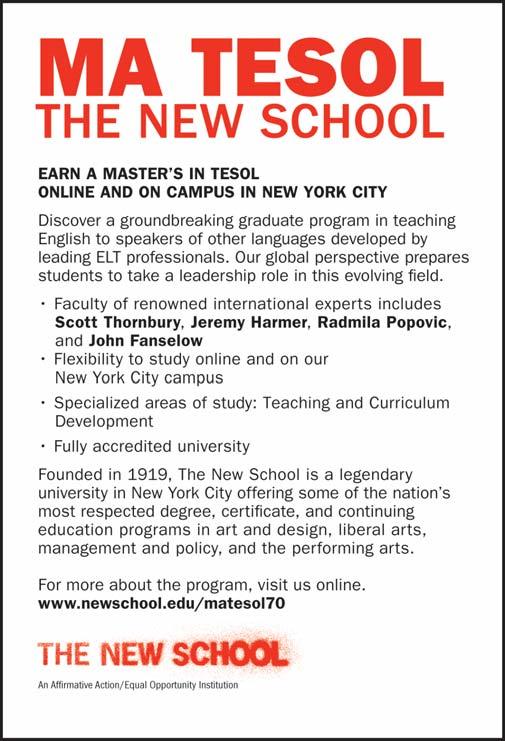

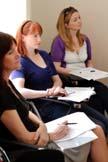
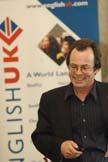

Registration Desks Open: 0830-1730
ELT Resources Exhibition : 0830-1730
Plenary Session : 0900-1010
0830-1730Registration desks and Exhibition open
0815-0845IATEFLHow to... track
Room 1H H
Helena Gomm
The editor of EnglishTeachingProfessional will talkabout theadvantages of getting articles published, what editors are looking for,how best to presentyour work, and how to increase the chances of having it accepted.
Room 3H H o w t o s e
Lindsay Clandfield
The worldof ELTblogsis continually growing and providing a new way ofcontinuing professional developmentfor teachers. Inthis session I willgoover the basics of starting a blogfor teachers and how you can make the most out of this medium.
Room 5H H
Keith Morrow
This session willlook atwhyyou might want togetpublished in an"academic" journal, andhow to go about it. The editorof ELTJournalwillshare tips and suggestions for gettingyour work in print.
Auditorium 2 (640 audience) and relayedto Syndicates
1&2 & 3&4 (each 400 audience)

t h e n s h e h a s p r o d u c e d a h a n d b o o k f o r p a r e nt s o n Detoxing g Childhood a n d 211st t
Century y Boys s ( j u s t o u t i n p a p e r b a c k ) S u e f r e q u e n t l y c o m m e n t s o n c h i l d h o o d i s s u e s i n t h e n a t i o na
What’s happening to children? In recent decades, there’s been an explosion in developmental conditions, such as ADHD,Asperger Syndrome anddyslexia, and teachersacross theUKreport thatchildren in general find it increasingly difficult to focus attention and control their behaviour.
Twelve years ago,literacy specialist Sue Palmermet a researcherwho’d discovered analarming decrease inyoung children’s listeningskills. Her conclusionthat ‘there’s notjustone cause– it’s lotsof things, all coming together’led Sueto wide-ranging research intothe rapidlychanging natureof children’slives. The resultingbook, Toxic Childhood , published in 2006,helped start anational debate about the stateof childhood in 21st Century Britain.
In this presentation,she discusses how rapidsocio-cultural change, driven bya hyper-competitive consumer economy, has transformed children’s lives in ways thatcanaffect physical,emotional, social and cognitive development. She also looks at thesimple waysadults canwork togetherto ‘detoxify’ childhood – all of which are free...
Session 2.1 : 1025-1055
1025-1055Session 2.1
Boardroom 20 audience
Workshop RES
Gresham
70 audience
Talk
L
Paganini
300 audience
Talk
GI, TD
Regency
120 audience
Workshop
T T E d S I G
P r o g r a m m e
Tudor
70 audience
Talk LT, Writing
The main focus of thisstudy questions whether Egyptian Preparatory Yearstudents are makingan effective transitionfrom high schoolinto university.The study investigates and addresses the needs of PreparatoryYearstudents and analyzes how they copewith bicultural educational communities in orderto become independent learners,overcome academic challenges anddevelop toachieve required learning outcomes.
The new concepts of lifewide and lifedeep learningembrace experientiallearning outside the classroom,in contrast to lifelong learning, where the focus is on formal education. Thistalk introduces theseconcepts and, usingdatabased on students’ autobiographical texts written during studies in an autonomous learning module (ALMS), explores ways of recognizing andincluding it in language learning contexts.
Do studentsplagiarize due to lack ofethics, time, orknowledge of techniques to avoid plagiarism? Could itbetheir poorlanguage/writing skillsor poor understanding of the notionofacademic honesty? Do teachersintentionally or inadvertentlyencourage plagiarism? What are the realreasons behind this challenging problemand what could be the possible solutions?
N i c o l a M e l d r u m ( O x f o r
Toanswerthisquestionwe carried outsome researchwith language learners on Trinity Certificate TESOLcourses at Oxford Tefl inBarcelona andPrague.Inthis workshop we will shareourresults and discuss how and whether language learners cancontributeto the evalutation of trainee teachers in initial teacher training programmes. e, a
A talkdemonstrating a new,innovative,multi-faceted,web-basedclass project aimed at bringing together the Internet and language learning. The projectformsa community based, environmentally friendly hub of communicative, purposeful, ever-available,and easily accessibleclass assignments.Theblog-based project pavesthe way for online discussion, negotiation, expression of opinion and creativity. e, ie, a
Auditorium 2
600 audience
Talk
TEA
Thistalk will describehow the presenter created,implementedandanalysed a computer-based placement test ata college inJapan. Thepresenter will explain the rationale behind the test and the test methods,how the test wasdelivered tothe students through Moodle, and howthe test was analysed with both classicaltesttheory and item response theory.
e = experienced audience
ie = inexperienced audience
bkprom = promoting abook
p = primaryteaching s =secondary teaching
fp = focusingon published/commercialmaterial
pub = speaking onbehalf ofpublisher/examinationboard/commercial organisation
t= tertiary teaching
adult teaching
Room 1
100 audience Talk
Room 3
50 audience
Room 5
50 audience
Talk TD
Room 6
60 audience
Talk
B E S I G
Session 2.1 : 1025-1055
The aim of this presentationistoexplore and discuss someof thebasic issues about English language teachers’ motivationfor professional development. It draws on the ongoing researchonteacher motivationforprofessional developmentin the Central Indian context. The main areas covered includefactors affecting teacher motivation of professional development, strategiesformotivating teachers, and a needto rethink teacher motivation.
Thisexplorative studyreports on research investigatinghow internationalEnglish teachers perceive English as an international language (EIL) as an approach to teaching andcommunication, withreference to grammar, pronunciation and culture. It compares the448 English teachers’ perceptions of EILfrom 71countries and teaching contexts. A clear majorityof teachers believe thatEIL should influence what weteach.
How muchemotional support shoulda language teacher give their adult students particularly in small classes? Language teachersare notnecessarily equipped to deal with students sharing their personal information and problems. Should these subjects beavoidedevenif that is what alearnerwishes to discuss? Shouldboundariesbe set? Altogether, what are the teacher’s roles in such cases?
T i r uc h i r a pa l l i , I n d
The vital role of communicationin affecting productivity has beenrecognized bythe corporate worldtoday. Companies are concerned with the writing skills of the executives as this leads to serious consequences. A major cause for this is the writer’s lack of reader perspective.Thistalkpresents the stepstakento achieve thisin the first trimester of anMBA.
Room 8
50 audience
Talk TD, YLT T e ac h i n g ( E ng l i s h ) i n a c h a n g i n g w o r l d
F r a n S o
Hargreaves (2003) notes that‘the world in which teachers do their work is changing profoundly.'Thissession will look atskillsthatpupils today need for futuresuccess. We will examine some familiar language practice exercises from ELTprimary school course books, and see howtheymight be adapted to help pupils better developskills needed for a changingworld.
ie, p
Room 9
60 audience
Talk AL, ESP
The presentation reports on findings from a PhD research on theteaching andlearning of English forMedical Purposes (EMP) in an Arab university. It unpacks and problematizes the inherent contradictions in its position ina Syrian Arab-medium universityintheory and practice drawing on medicinestudents’ experiences of English learning anduse in academic and professional life.
AL= Applied Linguistics
BE = Business English
EAP = English for AcademicPurposes
ES(O)L = English asa Second Language
ESP= English for Specific Purposes
GEN =General
GI =Global Issues
LA= Learner Autonomy
LAM= Leadership & Management
LT = Learning Technologies
LMCS= Literature, Media & Cultural Studies
MD = Materials Development
PRON = Pronunciation
RES = Research
TD = TeacherDevelopment
TTEd = Teacher Training& Education
TEA = Testing, Evaluation& Assessment
YLT= Young Learners & Teenagers
Session 2.1 : 1025-1055
Room 10
50 audience
Talk
EAP, MD
Room 11
20 audience
Talk GI
Room 14
30 audience
Talk
ES(O)L
Room 15
60 audience
Talk
EAP
Skyline
90 audience
Talk
EAP
Syndicate 1
200 audience
Talk
LMCS
Syndicate 2
200 audience
Talk CLIL
I willreporton the resultsof ananalysis oftheapproach underlying grammar books/textbooksand howthe approach hasan impacton thetype of sequence andthe activitiessuggested. Iwill classify the textbooks into apurelygrammatical sequence, grammar andcontent, and grammarin context. I will present a modelteaching unit showing grammar consciousness-raising activities.
This talk examines whether differences inlearning cultures prove serious barriersfor cross-cultural learning, or whether theyarenegotiable.I will report on thetheoretical positions about the topic and empirical survey done atPennsylvania State University, USA, with studentsfrom 18different Asian countries,and showthat thestudents negotiate well in the American teaching-learning culture.
Despite longyears ofstudy,most Indian learnersof English failto acquire natural, spontaneous, fluent, idiomatic English. Thetalkprovides a brief survey of the issues concerning seriousand definite hindrancesto acquisition of idioms with referenceto Indian learners of English. It will end with some suggestions for teachers.
The presenter reports on a study conducted in an EFL setting. It investigates the effect of language ofnote-taking while listening on the completion of tasks. Inthis session teachers willgetsome suggestions on teaching note-takingstrategies while listening by focusing on the language in the light of theresearch.
)
The presenterdescribes an effective methodologyof masteringthe process of academic writing and making it more challengingand fearfree. She goesover each step of the processandhighlights the importanceof reading andsynthesizing. The presenter then shares theoutcome of the methodologyandshows samples oflearners' essaywritings and research papers.
Examples will be usedfrom fiction and non-fiction traveland contact writingtoexplore their potential forgenerating interculturalawareness and relevant language development withlearners in the classroom. Identityissues butalso language useby travellers areparticularly highlighted inthe talk.Textual examples are fromwritings about China.
This talkexplores twomajor challenges facing studentsinCLILclassrooms, particularly at secondary level as content becomesmorecomplex and the languagefocus becomes more academic. Itthenpresentsthree pedagogical principlesderived from these challengeswhich teachers canapplyto support student learning. These principles are exemplifiedin sample teaching materials / activities.
e = experienced audience
ie = inexperienced audience
bkprom = promoting abook
p = primaryteaching s =secondary teaching
fp = focusingon published/commercialmaterial
pub = speaking onbehalf ofpublisher/examinationboard/commercial organisation
t= tertiary teaching a= adult teaching
Syndicate 3
200 audience
Talk
ES(O)L, GI
Syndicate 4
200 audience
Talk
ESP, MD
TBank
20 audience
Talk
ESP, TD
Session 2.1 : 1025-1055
Session 2.2 : 1130-1215
Identityemerges asone construct that meets theimpact of learningand teachinga foreign language along personal and professional lines.This presentation will explore theimpact of learning and teaching English as a foreignlanguage on the identity of Turkish teachers of English. Basedon a sociocultural approach, it willfocus on the ways they re/construct their teacher identities.
This presentation will giveanaccount ofthe process of needs analysis, jobshadowing, designandimplementation of an EFL course for IT helpdesk operators for a leading telecommunications company.Itwill address issues suchas the impactof low language proficiency of the target public, the languagerequirements and expectations of the company and the non-existence of suitablematerials.
ELTin an L2environment, as Nigeria, isfaced witha number ofpedagogical,linguistics, socio-cultural, political, personalityandeven economicproblems, and an absence of the machinery that should beaidingthe teaching/learning process.These havebrought about a lethargic attitudeto reading culture and learning. I willhighlight these challengesandpromote strategiesthat will remedy this anomaly.
1055-1130Coffee break
1130-1215Session 2.2
Boardroom
Gresham 70 audience Talk LT
Developingyoung learners socially andemotionally is asimportantnowadays as developingtheir reading, writing andsocio-cultural skills.AsEnglish languageteachers we haveapossibility toincorporate behavioralstrategies intothe lesson. In this workshop wewill explore howto makelessons moresuccessfulthrough establishing effective group dynamics and developing communication skills.
Students canlose motivation andtire oftheoldroutine.Without an ability tonoticetheir progress and an exposuretoreal-world English, their development plateaus and they lose interest.This talk introducesmultimediaprojects as an excitingand rewarding solution and shows teachers that this doesnot mean huge amounts of expertise or strain on the class and teacher. e,
AL= Applied Linguistics
BE = Business English
EAP = English for AcademicPurposes
ES(O)L = English asa Second Language
ESP= English for Specific Purposes
GEN =General
GI =Global Issues
LA= Learner Autonomy
LAM= Leadership & Management
LT = Learning Technologies
LMCS= Literature, Media & Cultural Studies
MD = Materials Development
PRON = Pronunciation
RES = Research
TD = TeacherDevelopment
TTEd = Teacher Training& Education
TEA = Testing, Evaluation& Assessment
YLT= Young Learners & Teenagers
Session 2.2 : 1130-1215
Paganini
300 audience
Talk
LT, L L A S I G
P ro g r a m m e
Regency
120 audience
Workshop
T TE d S I G
P ro g r a m m e
Tudor
70 audience
Talk LT
Auditorium 2
600 audience Workshop MD
The connected classroomcan be seen asa classroomwhich tightly connects what students do in the class withthe activitieswe setthem outside of the class. Technology has transformed the types of activities that we can get our studentsto do outside of lesson time and made homework far more engagingand autonomy far more possible. a
T im e o ut t fo r I NS ET !
S il v a n a Ri c ha r d so n ( B e
)
What doesresearch have to say aboutthe limitationsofthe‘one-size-fits-all’ approach to INSET where all teachers attend the same sessions? Whatapproaches to Continuous Professional Developmentputthe teacher in thedriving seatof theirprofessional learning, anddifferentiatebetter? I’lladdress these questions in aworkshop for Directors of Studies, teacher trainers and experienced teachers.
Digital games are engagingand cost effective alternativestothe traditional classroom learning mediums.They notonly have thepotential tomotivate learners, but also to foster the learning process more effectively inand outsidethe classroom. Wewill explore how tocreatedigitalgames with young learnersand how to utilize interactive games to enhance student learning in English.
Thisworkshop focuses onactive listening.Itfirst describes strategiesto get students listening more effectively, before introducing a number of innovativetasks. Thesewill includeenjoyable micro-listening exercises,collaborative speaker-listeneractivities, and actionlearning projectsthat arebased on listening but which involve the other skills:reading, writing andspeaking. This workshop uses examples from How to Teach Listening
Room 1
100 audience Workshop TD
Room 3
50 audience
Talk
AL, P P R O N S I G P ro g r a m m e
Wouldn’t itbe niceiflearners could rememberlanguage better from lesson to lesson? This workshoplooks at some newways of usingvisuals, concreteor mental images, providedorcreated by the teacheror learner, toenhance language learning.You’llbe able to test out the activities for yourself and see just how much can beachieved!
In thistalk Iwill investigate thepopularidea thatEnglish spelling is chaotic,and consider howto teach English spelling. I will also assess the relationship between segmentation,reading and spelling. Spellingdifficultiesare duetothegap between orthography andpronunciation; awordrepresents both sound and meaning, and good spelling may improve students' overall performance.
e = experienced audience ie = inexperienced audience
bkprom = promoting abook
p = primaryteaching s =secondary teaching
fp = focusingon published/commercialmaterial
pub = speaking onbehalf ofpublisher/examinationboard/commercial organisation
t= tertiary teaching a= adult teaching
ie, a bkprom, fp, pub
Room 5
50 audience
Talk
TEA
Room 6
30 audience
Talk ESP
Room 8
50 audience
Talk
Room 9
60 audience
Room 10
50 audience
Talk YLT
Session 2.2 : 1130-1215
AOC stands for‘Awareness – Orientation– Coaching’ andthe AOC-Check is anew diagnostic test developedin Austria for newcomers at upper-secondary vocational schools. The talk willintroduce this test and look at waysin which its results can be used to makelanguage learningfor mixed-abilitygroups more motivating and efficient, and to promote learner responsibility andself-direction. ie, s
Do youteach workplace Englishto specialiststudents?Do you feelthata subject expert – and not you – should be running the class? We’ll discusshow non-experts can deliver effective ESPlessons bymaximizing their own strengths,utilizing their students’ knowledge, and makingthebest useof available materials, including examples from the Oxford English for Careers series. ie, a bkprom, fp, pub
The congruity between learners’ and teachers’beliefs concerning various aspectsof foreign languagepedagogy determines to alarge extent the success ofthe techniques andprocedures employedin the classroom.The presentationreports thefindings ofa study which aimedtocompare suchbeliefs in the caseof form-focused instruction and offers suggestions on how existing differences might be reconciled.
The tribute sessionisan opportunitytoremembercolleagues who've died during the year since the last conference. If you'velost a colleague orformer colleague, you'll have an opportunity tosayafewwords in their memoryand, ifyou wish,to bring along a memento (book,teachingmaterials, etc.). Oryou may just want to come to thesession tohearabout colleagues who are nolongerwithus, and perhaps toaddany memories you may have.
This talk will presentaCLIL programme implemented inCyprusstate primary and preprimary schools. It will briefly explain the CLIL model used in Cyprus and then discuss teacher,parent, studentand administrator attitudestowardsCLIL, their CLIL experiences andperceived learning outcomes. Thetalk will concludewith a setof guidelines which can help towards successful CLIL implementation.
Room 11
20 audience Talk GEN
Isthechoice between gerunds and infinitives totally random? Isthe presentcontinuous never used withstate verbs? Why doweusepassives? Perhaps knowledgeof Halliday’s SystemicFunctionalGrammar could suggestalternative ways of looking at English grammar, enabling us and our students to get a better feel of thelanguage and understandhow English is organised.
AL= Applied Linguistics
BE = Business English
EAP = English for AcademicPurposes
ES(O)L = English asa Second Language
ESP= English for Specific Purposes
GEN =General
GI =Global Issues
LA= Learner Autonomy
LAM= Leadership & Management
LT = Learning Technologies
LMCS= Literature, Media & Cultural Studies
MD = Materials Development
PRON = Pronunciation
RES = Research
TD = TeacherDevelopment
TTEd = Teacher Training& Education
TEA = Testing, Evaluation& Assessment
YLT= Young Learners & Teenagers
Session 2.2 : 1130-1215
Room 14
30 audience Workshop TD
Room 15
60 audience Workshop TD, YLT
Teachers of Englishembark on a career-long journey that isrewarding, surprising and challenging. What are the key things thathelpthem along this journey? How canthey access the support that will facilitatetheirprogress? Thispresentation will give participants a chance toexplore their own journeysandwill offer somefurther ideas for development.
Throughout the years the teacher has appeared inthe media. Watchingfilmsand series (such as Glee) showing educators is aninvaluablesourceto helpus reflect on the importance and influence of our performance on the development ofthe student's identity.Cometo this sessionto discuss some aspects of theteacher's role watching a selection of clips.
Skyline
90 audience
Talk
ES(O)L, TEA
Syndicate 1
200 audience
Talk
B E S I G
P ro g r a m m e
Syndicate 2
200 audience
The UK Border Agency has recognized TOEIC® (Testof English for International Communication) test scores as partof the Immigration Points System since 2008. The presenter (thedirector of the TOEIC® Speakingand Writing Testsat Educational Testing Service) will providea brief overviewof the TOEIC ® Tests with afocus on sharing how speaking and writingresponses are scored.
I look atthe grammarofspoken businessEnglish. Using a one-millionword corpus of conversations,presentations and meetingsrecorded in companiesin the UK andother countries, Ishow how certain grammatical patterns aremore common in business contextsand how thesecan be exploited in teachingmaterials.Some examplescome from GrammarforBusiness(CUP 2009). e, ie a bkprom, fp, pub
Workshop GEN Q u e s t i o ns s o f i
"The acquisition of a new language raises questionsof subjectivityand desire,the problemsconfronted bylearners arenotjust mechanical but involvecomplexissuesof identity" (Cameron). This workshop will look at learner autobiographies and analyse how wecan helpstudents claimtheirrightto speak in class.Both class activitiesand examples of student work will be shown. e, ie, p, s, t, a pub
Syndicate 3 200 audience Workshop TEA
I n
Paraphrasingis a useful skillfor any student of English, and isveryrelevantin the CambridgeESOLUpper Main Suite examinations. Inthis workshopwewill focusonFirst Certificate, lookingat the importance ofparaphrasing in theexam andconsidering activitiesfor providingclassroom practice.Somematerialwill be taken from thenew publication DirecttoFCE
e = experienced audience
ie = inexperienced audience
bkprom = promoting abook
p = primaryteaching s =secondary teaching t= tertiary teaching a= adult teaching
fp = focusingon published/commercialmaterial
pub = speaking onbehalf ofpublisher/examinationboard/commercial organisation
Syndicate
Session 2.2 : 1130-1215
Iproposetoquestionfouracceptedconceptsineducationandlanguageteaching:1)that theprimaryaimofeducationissocial,2)thatlanguagesareculture-freecodes,3)that theteachingofEFL,MLandL1havenothingtodowitheachother,and4)thatextensive readingis an optional extraforlanguagelearners.
ThistalkfocusesontheuseofjokesasatoolforlearningEnglish.Thestudywasbased onsixaspectsinvolvedinhelpingstudentsunderstandhumor:interpretation,structure, learningtools, culturalissues, individualdifferences,andmotivation.Regardingcultural aspects,jokesportrayculturaltransgressions,whichthestudentswouldneedto perceive to be able to understand the joke.
1215-1335Lunchbreak
1225-1330Annual GeneralMeeting (sponsoredbySignLanguagebringsFreedom)
Syndicate1The2011AnnualGeneralMeetingofIATEFLwillbeheldinSyndicate1 attheBrightonCentre,Brighton, UK,from 1225 to 1330. All membersareinvited toattend.
AGENDA
1.Minutes oftheAGM heldin April 2010 at theHIC,Harrogate.
2.Matters arising
3.Treasurer’sreport
4.Presentation of accountsfor 2009-2010
5.Re-engagementof Larkings as auditors
6.PresentationbythePresidentandExecutiveCommitteechairsongeneralissues,theworkofthe Coordinatingandothercommittees,theSIGrepresentative’sreport,andAssociates’ representative’s report
7. RecommendationandappointmentofnewTrustees
8.Thanksto out-going President,and welcometo newpost holders and other new volunteers
9. Date ofnext meeting 21st March2012, in Glasgow,timeandvenue to be confirmed.
Attendingmemberswillbeinvitedtojoinusforicecream thankstothesponsorshipfromSignLanguagebringsFreedom.
AL=AppliedLinguistics
BE=BusinessEnglish
EAP = English for AcademicPurposes
ES(O)L=EnglishasaSecondLanguage
ESP=English for Specific Purposes
GEN=General
GI=GlobalIssues
LA=LearnerAutonomy
LAM=Leadership&Management
LT=LearningTechnologies
LMCS=Literature,Media&CulturalStudies
MD=MaterialsDevelopment

PRON = Pronunciation
RES = Research
TD=TeacherDevelopment
TTEd=TeacherTraining&Education
TEA=Testing,Evaluation&Assessment
YLT=YoungLearners&Teenagers
Session 2.3 : 1335-1420
1335-1420Session 2.3
Boardroom
25 audience
Talk GEN
Gresham
70 audience
Talk
Paganini
300 audience
Talk
YLT
Regency
120 audience
Talk
T TE d S I G
P
Tudor
70 audience
Talk LT, YLT
Auditorium 2
600 audience
Talk
Methodology
ESE developeda performanceclassin whichstudents practise,rehearse and performa range of comedy, drama,presentation andsituational English. Wewill showhow performance deadlines motivate students toproduce high-level, nuancedspoken work, difficult to achieve inany other way.Wewill show how, throughtranscriptionand repeated rehearsal,students honed and perfected stress, intonation and timing.
S h u- H u a K ao
Thispresentation reports astudy on theeffects ofa learner trainingprogrammeina group of undergraduate students in Taiwan. The theoretical assumptions underneath the design of thelearner training programme willbedescribed with examplesof learner trainingactivities. Also, theeffectsofthe learner trainingprogramme on theselearners in their English learning will be discussed. e, ie, t
Learning doesn’t happenin isolation. What goesonintheclassroom should linkto what’shappeningoutside the classroom. Along with these external links, there needto be internallinksgiving studentsopportunities to putlanguage together. EverybodyUp(a newprimary course from OUP) usesa ‘linked’ approachto learning and teaching – come along toexperiencethe links! e, ie, p bkprom, fp, pub
Reading andreaction is apractical, professional development ideathat gets teachers to engage with methodological theory. Itis also of interest fromtheperspectiveof teacher cognitionand teachers’ familiarity withtheir discourse community. This talkwill report on anaction researchprojectcarried outin NewZealand, whileexemplifying reading and reaction from TeacherTrainingEssentials(CUP). e, a bkprom, fp, pub
The current synthesis of videogamingand educationis moving towards a learner focused, language rich, skills-based pedagogy. Thispresentation looks at how gaming has becomesuch a culturalphenomenon, and usesideasandactivities fromthenew book Digital Play (Delta Publishing)in order to betterprepareteachers for the21st Century. ie, p, s bkprom, fp, pub
The roleof memoryin language learning isoften overlooked, and concepts such asrotelearning have become increasingly unfashionable.In this talk, we explore the importance of memoryandlookat some practicalclassroom-rooted ways of encouragingstudents to 'perform memorisation' in class– retelling texts, testing each other after gap-fills and matchings,warmers of vocabulary elicitation, and so on.
e = experienced audience
ie = inexperienced audience
bkprom = promoting abook
p = primaryteaching
s =secondary teaching t= tertiary teaching
fp = focusingon published/commercialmaterial
pub = speaking onbehalf ofpublisher/examinationboard/commercial organisation
adult teaching
Room 1
100 audience
Talk
ESP
Room 3
50 audience
Talk
Room 5
50 audience
Talk
EAP, MD
Room 6
60 audience
Workshop
B E S I G
P r o g r a m m e
Room 8
1335-1405
50 audience Talk
R E S S I G
Room 8
1405-1420
50 audience
R E S S I G P r o gr a m m e
Session 2.3 : 1335-1420
The presentation aims to explore aspectsof a teacher journey in Ethiopia in both preand post-CELTA and suggest a numberof transition points at which teacherawareness and beliefs change. Itwill examine what teachers reallywant andneed from training at these transition points and how this can be provided.
Mytalk reviews the current developmentsin teaching pronunciation.It includes details of dual focus on speech production and speech performance; learner goals, standards and outcomes; intellectual,psychological component oflearning; and learner involvement, roleoftheteacher and developing communicative pronunciation materials. It alsoincludes some practicalideas on teaching pronunciation.
Is the directteaching of vocabularyeffective? This talk will describe a direct vocabulary learning projectusedon a pre-universityEFLcourse.After providing a rationalefor taking this approachtovocabularylearning, the resultsofthe evaluationof theproject will bepresented.Basedon these results, practicalsuggestions will be madeon how to most effectively teach vocabulary.
Theaimofthis workshop is to show some of the most frequent mistakesthat students make in their presentations. Someofthe examples from theclassroomwillbe shown, as well assome of the ways how to make your students more competent in making presentations. In the end,one successful presentation will be shown.
s t u d y
S a n d r a L u c i e t t o ( I s t i t u t o C o m p r e n s i v o T u e n n
A PhDevaluativestudyofa CLILPrimary Programme (Northern Italy, 2009)included observation in 62 CLIL classes. To theteachers’ surprise, theresearch methodology succeeded in combining consistent, rigorous procedures with respect for theindividually differentstages of professionaldevelopment. To teachers andresearcher’s satisfaction, through professional dialogue a bridge was built between research and the teaching profession.
The open forum gives usthe chance tomeet conference delegates in order todiscuss past activities andour plansfor the year ahead. Wewill be presentto answer your questions and to listento yoursuggestions for waysin which we can continue toimprove theworkwedo.If you are a memberof theResearch SIGor interestedin joiningus please comealong.
AL= Applied Linguistics
BE = Business English
EAP = English for AcademicPurposes
ES(O)L = English asa Second Language
ESP= English for Specific Purposes
GEN =General
GI =Global Issues
LA= Learner Autonomy
LAM= Leadership & Management
LT = Learning Technologies
LMCS= Literature, Media & Cultural Studies
MD = Materials Development
PRON = Pronunciation
RES = Research
TD = TeacherDevelopment
TTEd = Teacher Training& Education
TEA = Testing, Evaluation& Assessment
YLT= Young Learners & Teenagers
Room 9
60 audience
Talk LT, TEA
Room 10
50 audience
Workshop YLT
Moodle is an internet-basedlearning managementsystem thatis becoming increasingly popular ininstitutions of higher education.The speakers are using Moodle for testing, both forplacing andevaluating largenumbers of students. The speakers willdescribe thedifferent kinds of test that arepossible onMoodle, and the advantagesand challengesof testing on Moodle.
Can wework on verb tense inclass without pens or paper? Thisworkshop is a practical presentation of a physicalapproach. Learnerswork with a systemof gestures that capture how meaningand timerelations areexpressedthrough tense and aspect.By allowing learners to respond with their hands,we bringunderstanding anduse within their grasp.
Room 11
20 audience
Talk
Room 14
30 audience
Workshop LAM
Room 15
60 audience
This presentation will introduce what Subject Based LanguageTeaching (SBLT) is, how it isapplied in the Koreanchildren's educational televisionprogrammeand the printed materials.This presentation will also report on howthese are used and why these have to be used inKorean primary schools. Theoretical rationales for SBLT and the research findings will be discussed.
Teamworkingishighly valuedin today’s workplace, but to whatextent areteachers team players? Howdoyou get teachersanda team culture right in ourschools? What do we mean by ‘team’ in a school environment? This workshop will explore this theme and a teamworking framework will be presented for discussion. e,
Talk ESP, TEA A s s e s s i ng g En g l i s h f o
LCCI have recently developed a new testforpeople whoneed Englishin accounting contexts. Thistalkwilloutline some of thethinking behind the test,focusingparticularly onthe challengespertaining to testingESP, beforeexplaining its format andtarget audience. Itwill finish with suggestions forteaching activities which can be usedto prepare students for the test. ie, a fp, pub
Skyline
90 audience
Talk GEN W e a l l l e a r n fr
Teachers don’t correctas manyoftheirlearners’ mistakesinspoken English asthey used to. Why does this happenand doesit really matter? Doescorrection actually improvestudents’ performanceor is providing opportunities for communicative practice theonly thing that matters? Are some mistakes worth correcting more than others? These questions will be addressedat this session.
How relevant is a person-centred approach in today’s CEF-friendlysecondary classrooms? Very relevant, given that weexpress our identity throughlanguage,a defining characteristic ofourspecies.We’lllook at activitieswhich build on the personal input thelearnercanmake, and tasks whichdevelop critical thinking skills.Examples are taken from NewInspiration
e = experienced audience
ie = inexperienced audience
bkprom = promoting abook
p = primaryteaching s =secondary teaching
fp = focusingon published/commercialmaterial
pub = speaking onbehalf ofpublisher/examinationboard/commercial organisation
t= tertiary teaching a= adult teaching
e, ie, s bkprom, fp, pub
Session 2.3 : 1335-1420
Thisisan event not tomiss... and is the conference formatofthe future!21presenters race through thumbnail outlines ofpresentations ona wide varietyof topics and theninvite youto explore their interestswith them,making use ofposters,realia,handouts and a wide range ofinteractivecomputer and paper-basedmaterials. The topics explored includeCLIL, creative writing in English, EAP and ESP, e-learning, multilingual education andvarietiesofEnglishforlanguage teachers, andinclude accounts of classroom practice andsummaries of research.
FacilitatedbyGrahamHall, this is a feast ofpresentations inasingle two-hour interactiveformaton a range of topics:
A
The purpose of this presentation is toshare experiences ofacademic skills development at tertiary level. The presenter will focusonways ofassessing students' presentations and obtainingeffective feedbackwhich can help to analyse students' strengths and weaknesses, ways of progressing and,in general, creates a supportive teaching environment.
This presentation examines the way Content andLanguage Integrated Learning (CLIL)is being implemented with Mexican undergraduate learners of English. It will show how to connect the learning ofauthentic career content meaningfully with English languagelearning, basedon international standards.Additionally,the process of designingand adapting resources underthis approach, and future challenges, for teachers willbe explored.
N a t a l i a E y d e l m a n ( N o v
)
In this presentation,I will share my experienceof teaching an academic writing coursefor EFL English majorswith aspecific focus on peerrevision activities using asynchronous CMC toolssuch as blogsand wikis. It isbased on theresultsofmy MA dissertation in TESOL and ICT(University of Leeds,UK), completedin 2010, and their implementation in my home university.
e d u c a t i o n
o h
y l a )
An integral component of the LT curriculum inmany HE institutions, CALLhas impact on learner’s experience. However, theimpact ofCALL on theteachers’academicidentitieshasn’t been explored. This presentationaims toexplore the impactof CALL on language professionals’ identitiesworkingin HE institutions in the sixArab states of the Persian Gulf known as the GCC.
The presenter hasbeenteaching the basics ofcreative writingin Englishat both thesecondary and tertiary level. Starting with free writing,students proceed to guided writing based on relevant course books.Followingthe script guidelines,they reflectonliterarytexts ,creating theirown entries. The role of the teacher changes from mentoring to inspiring and cooperating on projects.
AL= Applied Linguistics
BE = Business English
EAP = English for AcademicPurposes
ES(O)L = English asa Second Language
ESP= English for Specific Purposes
GEN =General
GI =Global Issues
LA= Learner Autonomy
LAM= Leadership & Management
LT = Learning Technologies
LMCS= Literature, Media & Cultural Studies
MD = Materials Development
PRON = Pronunciation
RES = Research
TD = TeacherDevelopment
TTEd = Teacher Training& Education
TEA = Testing, Evaluation& Assessment
YLT= Young Learners & Teenagers
Session 2.3 : 1335-1420
This presentation is targeted at teachers who wouldlike toembark onusing digital technology for providingstudents withfeedback. Delegates will gettips and hands-onexperienceofusing digital audio recorders,as wellas audio/screen recordingfreeware,i.e.,thedigital tools wehave adopted in our ESP/EAP blended learning courses to give students more detailed and personalized feedback.
Very few studies have been carried outin the areaofESP/EMP at DamascusUniversity inSyria. This presentationtherefore aimsto shed thelight onthecurrentEnglish language teaching in the Faculty of Medicine, provide a description of the needs and perceptions of medical students andfaculty members, anddiscuss suggestions for improving the English curriculum.
This presentationisadescriptionof thelocal situationof teaching ESP inYemen.The importanceof teaching ESP, whatteachers need in a particularareaof ESP, the characteristics ofESPcoursesthat meet learners’ needs, the abilities required for successful communicationin occupational settings,and the role of needs analysis are all issues that will be focused on in the presentation. E v a l u
This presentationexamines the findings of doctorate research investigating correlations between selfevaluation bylearners, teacher assessment,andstandardised examinationresults. Factors examined include: age when learning started, materials used, mother-tongueorforeign teachers’involvement, and learner motivation.Thepresentation considers influences onstudent performance, the effect of self-image, and methods of study. Opportunities will be provided for discussion of the topic.
Technologies can beused toimprovestudents’ speakingand writing abilities. I usefree softwareto designlessons formy intermediate students.Students learnthrough a reallifesituation. The lesson consistsofindoor andoutdoor activities. Students aregiven the chanceto collect information,analyse data, report, write a bulletin and make a PowerPoint presentation.
In-serviceESP teachers’ training is crucialfor the teachers’ development but also for theteaching institution’s educationalsuccess.Unfortunately, teacherdevelopmentis usually a DIY activity.The presentation willdiscuss various individualinitiatives suchasreflectiveteaching, action research, self monitoring, journalwriting, criticalincident analysis,observation andcasestudies that helpESP teachers notto set in concrete.
Thispresentationaims to determine the languageneeds of undergraduatescience students inLibya.It drawsonthe needs analysis approach of HutchinsonandWaters (1987) and Dudley-Evens and StJohn (1998), among others.Findings from134 participants(lecturers andstudents) reveal various needs,and suggest a guide and recommendations for English language practitioners and sponsors. continued...
e = experienced audience
ie = inexperienced audience
bkprom = promoting abook
p = primaryteaching s =secondary teaching
fp = focusingon published/commercialmaterial
pub = speaking onbehalf ofpublisher/examinationboard/commercial organisation
t= tertiary teaching a= adult teaching
Session 2.3 : 1335-1420
The presentation willfocus uponacknowledging the other standard varieties of Englishatupperintermediateand advanced levelsin terms of variation in pronunciation (phonemes and words) and vocabulary (newcoinages andnewmeanings added towords).Practicable cautions will be provided for teachers and learners tosave them the troubleof passing false judgement on correct English.
J
The aim of my presentation is toshare thefindingsof my researchon classroom teaching, namely the typicalineffectivepractices and their results in class,as well asthepractices that should replacethem. The presentation is aimed ataninexperienced audience interestedin examining theirpreferredwaysof teaching or willing to challenge given premises.
Teaching of Englishisnotaneasy task especially inaplace like SaudiArabia. It requires greatdeal of expertise in the area of ESL/EFL/ELT/TESOL tostudy/diagnose the learning difficulties inEnglish faced by the target learners,and evolvecompatible strategies to teachaseffectively aspossible for maximum output.
D i gi i A n n C a s t i l l o
L1 or English? Thekey isto linkL1 asafoundationto buildproficiency in Englishthrough:a) developing cognitivelydemandingcurricula and culturally relevant teaching materials; b) teacher trainingon content andmethodology; and c)school-based management. Eventually, learnersattain acertain level of English proficiency thatwill build on their learning of content subjects in English.
A d e j o ke e J
This presentationlooksintolanguage students’ perceptionof, andattitudeto, teaching practice in three Nigerianuniversities.Data collection was throughadministration ofa self-developedLikert-type questionnaire on 300 language student teachers in three universities. Data collected was analysedusing percentage, t-testand ANOVA Statistics. Results shall be presentedand discussed. P
With over370 EFL teachers, the Anglo MexicanFoundation is presently implementing a clinical supervision scheme toguaranteequality standardsand to promote CPDinits ELT classrooms. Iwill explain the theoretical frameworkupon which a systematic scheme of observations isbased,the supervisoryinstruments created,thetraining and standardisation of observers, andprogress made so far.
This presentation aims at the introductionof social networkingin the trainingof future language teachers. The talk will give examples of the tasks the studentshadto workon, howtheattitude of the students changed during the course,and will showsomeof the results of the course.
AL= Applied Linguistics
BE = Business English
EAP = English for AcademicPurposes
ES(O)L = English asa Second Language
ESP= English for Specific Purposes
GEN =General
GI =Global Issues
LA= Learner Autonomy
LAM= Leadership & Management
LT = Learning Technologies
LMCS= Literature, Media & Cultural Studies
MD = Materials Development
PRON = Pronunciation
RES = Research
TD = TeacherDevelopment
TTEd = Teacher Training& Education
TEA = Testing, Evaluation& Assessment
YLT= Young Learners & Teenagers
Session 2.3 : 1335-1420
Session 2.4 : 1435-1535
T
‘Induction’ isa comprehensiveprocess ofsustained trainingand support for new teachers. This interactive presentation aims to describethe processand reportson the effectiveness of aninstitutional approach toinduction. It ishopedthe ideas willserveas guidance to those seeking waysof supporting theirnewly-hired teachers and letting them realize their full potential in their new contexts.
Web-based learningplatforms havebeendesignedto facilitate course creationanddelivery for educators,andto supportlearners as they work towards achieving their objectives. This presentation will illustrate the range of course-building ‘tools’ available, from digital needsanalysis andauthoring tools to instant feedbackandscoring, class scheduling,attendance andprogress monitoring, and course-specific forums.
Syndicate 3
200 audience
Talk
ES(O)L
)
Discrepancies betweenoraland reading / writing skills makes it difficult for students from non-Roman alphabetcultures to cope with contemporary ELTmaterials . This talk isonthe issues these students face, then at ‘code-cracking’techniquesforinitial teachingofreading,and for helping students who read slowlyto decode more rapidly. These appear in FastTracktoReading ie, a bkprom, fp, pub
Syndicate 4
200 audience
Talk
LT
TBank
20 audience
Workshop AL, YLT
We alluse the Internet forOnline teachingandlearning but have forgotten to look at otherdigitaltechnologies for teachers andlearnerswho do not have reliable internet access.This talk discusses what we can do with mobile phone technology - and our work in enhancing the learning of the disadvantaged communities in developing economies. e, a
Games are an essential tool in the EFL class tocreate fun and variety as well as catering for different learning needs.The presenterwill investigate theparticipants’ perceptions regarding teaching games, present a briefing on the importance of games and involve theparticipants ina varietyof games to raise theirawareness of such an important issue.
1435-1535Session 2.4
Boardroom
25 audience Workshop CLIL
There is anabundance of materials and training now availableforCLIL teachers, but has this resulted in betterteaching?What do CLIL teahers really need?This session explores Evidence-Based Teaching in the contextof CLIL and uncoversthe top ten teaching practices that really make a difference to learningoutcomes.
e = experienced audience
ie = inexperienced audience
bkprom = promoting abook
p = primaryteaching s =secondary teaching
fp = focusingon published/commercialmaterial
pub = speaking onbehalf ofpublisher/examinationboard/commercial organisation
t= tertiary teaching a= adult teaching
Gresham
70 audience
Workshop
MD,L L A S I G
P r o g r a m m e
Paganini
300 audience Workshop LT, TD
Regency
120 audience
Workshop
T T E d S I G P
Tudor 70 audience Workshop EAP
Auditorium 2 600 audience
Session 2.4 : 1435-1535
In this practical, hands-onworkshop, we will demonstrate how compilers of the Collins COBUILD AdvancedDictionary use the corpusto collect data on languageuse.We will look at a variety of corpus-basedactivities that put the learner in charge ofdiscovery. These range from simple frequency counts, to finding grammatical patterns and collocations, and comparing British and American usage.
T
Onestopenglish is the go-to resourcewebsite for hundredsofthousands of teachers worldwide. To celebrate its 10th birthday, TimBowenand Lucy Williams willtake a look at three topicschosen by our users, suggesting innovative waysthe material can be used in your classroom.This interactiveand dynamic workshopwill leaveyou with a host of new lesson ideas.
Telling stories ofprofessional experiencecan bea powerfulform of developmentfor teachers and teacher educatorsbut stalenessandalack ofprogress after agrouphas met and toldstorieson several occasions can detract fromtheoriginal positive impact. We will consider and tryout refreshing variations on storytellingsuch as thematising, role-plays, andreframing.
Inthe EAP classroom,both teachers and students tend tofocus ondetails. Fromtimeto time, it's good for studentstosee thebig picture. We describe activitiesinwhich students accomplish complex tasks, givinga senseofachievement andan understanding ofthe whole. We offer a formula for such activities and invite participants to devise their own.
To propose the motion: A
To oppose: N N i c ky y H o c kl y ( T h e Co n s u l t a
Chair: K e i t h M o r r o w ( E L T J o u r n a l )
Despite thetitle,this is not justabout ‘Twitter’. The roleoftechnology in language teaching has been debated since thefirstuse of the tape recorder andthe language laboratory, but neversokeenly astoday. Theuniversal availability of the internet and social media, the development of interactive whiteboards forthe classroom,and the proliferation of onlineandblendedcoursesmean that moretechnologyisavailable to language teachers and learners thanever before. Butdoesit work? Or are we seduced into using technology because it’sfun andbecauseit’s there?Our two speakers will debate theissues surrounding theuse oftechnology in languagelearning and teaching. Please comealong, have your say, ask questions – and join in the vote.
AL= Applied Linguistics
BE = Business English
EAP = English for AcademicPurposes
ES(O)L = English asa Second Language
ESP= English for Specific Purposes
GEN =General
GI =Global Issues
LA= Learner Autonomy
LAM= Leadership & Management
LT = Learning Technologies
LMCS= Literature, Media & Cultural Studies
MD = Materials Development
PRON = Pronunciation
RES = Research
TD = TeacherDevelopment
TTEd = Teacher Training& Education
TEA = Testing, Evaluation& Assessment
YLT= Young Learners & Teenagers
Session 2.4 : 1435-1535
Room 1
100 audience Workshop
TD, YLT
Room 3
50 audience Workshop
YLT,P P R O N S I G
P r o g r a m m e
Room 5
50 audience Workshop
EAP, TEA
Room 6
60 audience
Workshop
B E S I G
P r o g r a m m e
Room 8
50 audience Swapshop EAP, MD
Room 9
60 audience Workshop AL, ES(O)L
Technology, new methods,newmaterials, tech-savvy students who knowso much- do you feel as if you're in the middle ofan educational revolution? Has teaching changed forever? Or are theresomeunderlying principles that willnever change? Are there someworn-out ideaswe need tothrowout? Hereare 10 thingsI think I knowabout classroom teaching.
FunSongs
Participants in this livelyworkshopwill beshown howto combineTPRwith music and rhyme. The themes of the action songcan then be broken down, recycledand integrated into a course’s programme. This approachis highlyrecommended for younglearners but is justasuseful -and fun - for adultbeginners. FunSongs wasnominated for a 2011 ELTons award. e, p fp, pub
Withteachers increasingly being asked to prepare16-18 yearolds for IELTS, there are aspectsof the test that requirespecial considerationwhen working with thisage group. This workshop willexamine theparticular challenges facedbyteachers of younger IELTS candidates and strategies for dealing with these, in particular focussing on speaking skills.
We will explorethreestrategies whicharebasedon reflective teaching.The examples are frommyownprogrammesbut can beused in other teaching situations. We will be lookingat how to use visualelements,standardcourse elements and cognitive strategiesto help developstudent awareness/ autonomy.Want some fresh ideas on developing learners? Come to the workshop!
EAP students needtolearn to readcritically, andEAP teachers need toprovideactivities and materials that encourage the developmentof this skill. What are some effective ways toteach criticalreading? Whatmaterials are useful? Bring yourfavouriteactivities and materials to this swapshop session, and we'll shareideas!
Let’s GO examines the use ofgraphicorganizers forlexical development,facilitating a creative outlet forlearners to explore words and meaning. This workshop will include the linguisticbackground of GOs,and incorporate hands-on learningand participation.If you haveever wondered how to incorporatecreative ways to workinvocabularywith your students, this is the workshop for you!
e = experienced audience ie = inexperienced audience
bkprom = promoting abook
p = primaryteaching s =secondary teaching
fp = focusingon published/commercialmaterial
pub = speaking onbehalf ofpublisher/examinationboard/commercial organisation
t= tertiary teaching a= adult teaching
Room 10
50 audience Workshop TD, YLT
Room 11
20 audience Workshop LT
Room 14
30 audience Workshop LMCS, YLT
Room 15
60 audience Workshop TD
Skyline 90 audience Workshop EAP
Session 2.4 : 1435-1535
Aworkshop demonstrating activities andtasks that motivateteenagestudents. This session investigates amove away from the coursebookas a syllabus and looks forward to creating negotiated, student-centred objectives thatallow for a greater focus on personalisation, learner autonomyandstudent-generated content using a wider variety of learning tools and a more flexible approach to teaching.
Thecombination of cooperative learning strategies and SMARTBoard inthe classroomis ideal as all learning styles areused; thereby activating all students at thesame time. The workshopwill give participants the opportunity to workwith poetry, picturesand texts. Participants will take homematerialthat canbeapplieddirectly in their own classrooms.
E d u c a t i o n , N o r w i c h , UK )
This workshop willfocus on a range ofcreative activities, using music, art and dramato engage learners’ multiple intelligences.Drawing onpracticalexperience with reading groupsin UK schools, we willdemonstrate ways ofencouraging childrenwith different learning styles to develop greater sensitivity to uses of language in representational texts.
Language classroomseverywhere are packed witha varietyofspecial needs–which mayinvolve issuessuch asdyslexia, ADHD,behavioural challenges or aheterogeneous class with different levels,abilitiesandlearningstyles. I will shareideas, practical activities andresources aimedat reaching allour learners ensuringan approach to learning diversity is embedded insuccessful language learning. ie, s
P r i
)
)
This talk examines theunderlying principles of academicwriting,such as textstructure, coherenceand cohesion, register and thefeaturesof language used informalacademic writing. We will discuss how best todevelop academicwriting skills for your students and provide ideas forteachersto use in the classroom withworksheets and information about relevant Cambridge ESOL examinations.
e, ie, t bkprom, fp, pub
Syndicate 1
200 audience
Workshop MD
D
This workshop willtake participantsthrough a series of activitiesto showhow wecan combine a task-based approach with a systematic treatment of grammarand lexis. Tasksare basedonor are accompaniedbytexts. We canuse thesetexts to focus on grammar and lexis and wecan organisetextsto offer systematic treatment. e, ie, p, s, t, a
AL= Applied Linguistics
BE = Business English
EAP = English for AcademicPurposes
ES(O)L = English asa Second Language
ESP= English for Specific Purposes
GEN =General
GI =Global Issues
LA= Learner Autonomy
LAM= Leadership & Management
LT = Learning Technologies
LMCS= Literature, Media & Cultural Studies
MD = Materials Development
PRON = Pronunciation
RES = Research
TD = TeacherDevelopment
TTEd = Teacher Training& Education
TEA = Testing, Evaluation& Assessment
YLT= Young Learners & Teenagers
Session 2.4 : 1435-1535
Session 2.5 : 1610-1640
Syndicate 2
100 audience ILF 1335-1535
Syndicate 3
200 audience Workshop MD
(See pages 97-100 for details)
Syndicate 4
200 audience Workshop MD, YLT
What features oflearner writing makeit most difficult to follow? This workshop aims to look at lexico-grammaticalfeatures that hinder comprehension, butare often overlooked in teaching materials. Wewillpresenta number of thesefeaturesand how they can be incorporated into classroom learning,withreferenceto activities from New TotalEnglish.
Inthis workshop wewill investigate why,despiteevoking either fearor boredom(or sometimes both) inmany teenagelearners, ‘doinggrammar’ is stillseen by these same learnersas a desirable, even essential, element ofa‘good’ languagecourse. I will suggestways of reconcilingthis contradiction using material fromthenew Active Grammarseries from CUP.
TBank
20 audience Workshop EAP, ESP
This energetic session is afirst-hand experience in using MI Theory in a practical way, a way that can supportany topicin anysetting.This workshopengages teachers ineight different hands-onwarmer activities; matches participants'experiences toHarvard Professor Howard Gardner's Entry Point Approach; reviews MI theory and materials; and discusses implications for MI in academic testing.
1535-1610Coffee break
1610-1640Session 2.5
Boardroom 25 audience Talk YLT
The presentation discusses the experience withdesigning and piloting reading programmes for young learners.The presenters will describewhat theprogrammes consisted of and theywill discuss the influence they had on the learners.Inthesecond partof the presentation several examples oftechnology-based activities which accompaniedeach programme will be presented together with sample outcomes.
e = experienced audience
ie = inexperienced audience
bkprom = promoting abook
p = primaryteaching s =secondary teaching t= tertiary teaching
fp = focusingon published/commercialmaterial
pub = speaking onbehalf ofpublisher/examinationboard/commercial organisation
adult teaching
Gresham 70 audience Talk
ESP,L L A SI G
P r o g r a m m e
Paganini
300 audience Talk TD
Regency
audience
Tudor 70 audience Symposium
Session 2.5 : 1610-1640
The idea of students as teachers lendsitself well to ESP settingsandautonomous learner classrooms.How doengineering students deal with therole of teachers as opposedto social workstudents? Doesthe commonprejudiceof techniciansbeing straightforward and socialworkers being creative-minded holdwater?Come and seeyou might want to replicatethe projectyourself.
Attempts are being made to raise teachers’ morale so as toincrease teacher effectiveness and,consequently,students’ performance in Nigeria. How much have teachers been motivated? Although only fewprimary andsecondary school teachers indicate that they arewell motivated, there seems to be improvement in some factors that contributeto teacher motivation.
Come along tothe SIG open forum and meet like-minded people withan interest in Teacher Training and Education. The OpenForum isa chancefor you to get an update on what the TTEd SIG has done inthe last year,meetthe committee and discuss your opinions aboutfuture activities. We look forward to seeing you there.
1610-1840D
The adoption ofdistance learningstrategies (DL) in language learning contextshas becomean increasing concern for teachers, administrators, learners and policymakers overthe last couple ofdecades.Thispaperexamines anumber ofrecent trends inthe field, highlighting the opportunities as well as the challenges faced by thoseinvolved in developing DLpedagogy.
This discussion ofthe principlesand techniques ofe-tutoringfocuses onteaching practice in online teaching, the appreciationof best practice and a guidingframework for using technology. Educators interestedin afutureas e-tutorsmay alsofindthis set of principles tobe useful, as will educators looking for a platform todescribe lessons learnt through their technological discoveries.
This talk willintroduce theOpen University’s recently developedEAPcourses, giving links to course websitesand opportunitiesto exploreonline material and activities. These areneeds/purpose analysisbased,orientated towardslanguagein context, for a diverse studentbody andbased onbuilding online communities oflanguageusers.We will demonstrate how we achieve this in the distance learning context.
AL= Applied Linguistics
BE = Business English
EAP = English for AcademicPurposes
ES(O)L = English asa Second Language
ESP= English for Specific Purposes
GEN =General
GI =Global Issues
LA= Learner Autonomy
LAM= Leadership & Management
LT = Learning Technologies
LMCS= Literature, Media & Cultural Studies
MD = Materials Development
PRON = Pronunciation
RES = Research
TD = TeacherDevelopment
TTEd = Teacher Training& Education
TEA = Testing, Evaluation& Assessment
YLT= Young Learners & Teenagers
Session 2.5 : 1610-1640
Auditorium 2
600 audience Talk GEN
GenerationY are at homein the Internet, use Facebookandother Internet services.To teachthem adequately wesuggest a holistic approachfor creatinganappropriate educational environment.A real course Presenting Skills developed using aspecial social network, blogs etc. is shownas a simplified example of such an environment. It turned out feasible for Digital Native learners.
Technology offers a wealthof language learning opportunities.It also challenges educatorsto findsuitable models of implementation,particularly where large-scale distancelearningprojects are involved.Suchchallenges frequently centrearound technical logistics,studentmotivation and curriculum delivery.At Edusoftwe have developed a sophisticatedimplementation modelto ensure the success of our English DiscoveriesOnlinedistance learning courses.
Acomprehensive understanding of why games are perceived asunplanned, fill-in activities by bothteachersand students is important since games area tool for active student involvement in classroom. This study offers anin-depth discussionof the factors thataffect perceptions andhow learner training can make games be seen inamore constructive light. e, t
Room 1
100 audience Symposium
e r sp e ct i v e s N a n
Manywriting interventions focus on linguistic elements, but writing is not simply a language-basedactivity.Writing is a complexcombination of linguistic and psychological features.This presentationreportson a seminarthat putpsychological issues before linguistic taking a unique approachto writinginstruction. Results of usingthisapproach as a writing interventionare presented.
The study was conducted onthe teachers to determine thestatus ofEAP inNigeria Universities The thrust of theresearchwas twofold: (a) empirical confirmation of existence ofEnglishforacademic Purposes in Nigerian Institutions of higher learning and(b) a review of the componentsof the curriculumof EAP if and where it exists.
continued...
e = experienced audience
ie = inexperienced audience
bkprom = promoting abook
p = primaryteaching s =secondary teaching
fp = focusingon published/commercialmaterial
pub = speaking onbehalf ofpublisher/examinationboard/commercial organisation
t= tertiary teaching a= adult teaching
Room 3
50 audience
Talk
AL, P P R O N S I G P r o g r a m m e
Room 5
50 audience
Talk
LMCS
Room 6
60 audience
Talk
B E S I G
P r o gr a m m e
Room 8
50 audience
Talk
Session 2.5 : 1610-1640
Certain academic expectationsofthe undergraduate curriculumofGauhati University contrastwiththe lack of competenceof thestudentsin this regard. This talk looks at such expectationsin the contextof the learners’ existing competence and institutional perceptions, andexplores how a process-orientedapproach for developingtheir academic writing skills can be an effective strategy to remediate this situation.
Thistalkdraws onwork at one London universityto suggest howacademicwriting classes canbetailored to meetstudents’ disciplinary needs through negotiation betweensubject specialists, writing specialists and students.The close collaboration described in the talk provides atask-specificalternative to institution-wideapproaches suchas Writing across the Curriculum and Writing in the Disciplines.
S hi g e o K a t o ( Ni i ga t a U ni v e r s i t y , J ap a n)
The talkattempts to bridge theory and practice for teaching L2reading by presenting a series of stepwise instructionaltechniquesforpromotingaccuracy and fluency in the connectionsbetweenthe threesublexical components, i.e. phonology, orthography,and semantics.This is done byapplying empirical bases from theframework of working memory, particularly the theoretical construct of the phonologicalloop.
h p o e t r y i n a c r o s s -c u l t u r al l e du c a t i o n
p e r sp e c t i v e
L a r y s a S a n o t s k a ( L v i v N
Researchshows that poetryas ameans of ELT provesefficient as it appealsto the personal experience of learners. The presentation aims to verifythat personalizing languagelearning by poetryis an effectivestrategy and explore theways in whichit can beapplied notonlyas atool to develop students’self-awareness but also build intercultural competence in multinational groups.
M e r c e de s V i o l a ( 4 D C o n t e n t E ng l i s
Howcan we define whatwe do whenwe “teach” English to corporate clients? Thereare many different termsused inthe business world: teacher,trainer, facilitator, coach, strategist, consultant. Whatdo theymean? Don’twe dosomething similar?We need to clearly identify our role tobe able to present ourselves and our proposals accordingly.
This research studyinvestigates how international students positionthemselves in English academic writing discourseintheir subject areas. Itseekstoexplore how overseasstudents construct their ‘writeridentity’ (Ivanic, 1995) and its connection with ‘thenotionof investment’ (Norton Peirce, 1995)inorder to identifythe factors that contribute to writing engagement andteaching pedagogy.
AL= Applied Linguistics
BE = Business English
EAP = English for AcademicPurposes
ES(O)L = English asa Second Language
ESP= English for Specific Purposes
GEN =General
GI =Global Issues
LA= Learner Autonomy
LAM= Leadership & Management
LT = Learning Technologies
LMCS= Literature, Media & Cultural Studies
MD = Materials Development
PRON = Pronunciation
RES = Research
TD = TeacherDevelopment
TTEd = Teacher Training& Education
TEA = Testing, Evaluation& Assessment
YLT= Young Learners & Teenagers
Session 2.5 : 1610-1640
Room 9
60 audience
Symposium
1610-1840
Picturebooksare multimodal objects, where image, wordand designcome togetherto provide abundant opportunities for authentic language use. They can be used in various ELT contexts, frompre-school and primarythroughteens toyoung adults and teacher education. This symposium willbringtogether presentations thatinclude reflections on research and practice in relationto the useof picturebooks in our classrooms.
Sandie will introduce the symposium defining thepicturebook and looking at how pictures and words can come together indifferent ways to create a narrative.
On the basis of longitudinal datafrom fourchildlearners collectedover a period of four schoolyears,Teresa willdemonstratethat a series of stagescanbe identifiedin children’sinterlanguageand that after fouryears childrenare able toretell picturebook stories.Teresa will discuss the pedagogical implicationsof using picture books for content and language teaching and learning. F r o m
How do young learnersrespondto a picturebooktheyencounterfor the first time? This presentation reports on storytelling with TheSmartestGiantinTownforlearners aged8 to 9years. Annett explores the question how childrendecode pictures to make sense of the story and discusses how this can pave theway for vocabulary learning.
G a i l E l l i s ( B r i t i s
Diversity andcitizenship is now amajor component in curriculums around the world nurturing inpupils the skills to addressand understand issues of toleranceand to deal withdifferences. Gail will demonstrate how picturebooks offeran idealresource for raisingawareness ofdiversityeitherexplicitly through the storycontent or asa springboard to linking relateddiversity themes. She will discuss criterionselectionand describe four different teacher roles for promoting diversity. P i c t u r e b o o k s i n EL T : b
With thisconcludingpresentation Janice suggests that thetheoryofliteraturein education shouldbe one of theanalytical frameworks to connectL2 teachingacross the yearsfrom the primary tothe secondaryclassroom.Janice briefly outlines howabridge might be spanned and a continuum might be achieved from the first literary textsin the primary language classroom, picturebooks, via graphicnovels to the important narrative medium offilm.
Our symposium willfinish with discussion andquestions from the audience.
e = experienced audience
ie = inexperienced audience
bkprom = promoting abook
p = primaryteaching s =secondary teaching
fp = focusingon published/commercialmaterial
pub = speaking onbehalf ofpublisher/examinationboard/commercial organisation
t= tertiary teaching a= adult teaching
Session 2.5 : 1610-1640 Room 10 30 audience
The presentation shows when and how CLIL (Content and Language Integrated Learning) modulescan betaughtin the everyday primaryschool classroom. Themain focus is on children who havehardly any previousknowledge of the foreignlanguage. On thebasis of two field studies, language use (L1 andL2), aims, methods and subject matters will be discussed.
Room 11
Room 14
30 audience
Talk EAP, ESP
Room 15
60 audience Symposium 1610-1840
This talk describesa new study about thecomparative benefits of teachinggrammar using Isolated and Integrated focus-on-form with andwithouta children’snarrative component. The proficiency gains from pedagogical tasks with an integrated grammar focus are compared with the gains from structural grammar tasks in and out of a narrativecontext.The pedagogicalimplications will be discussed.
My typical EAP classroom comprises 300-350students, speaking a range of local languages. We make do with limited resources and, not surprisingly untilrecently, classes havebeen teacher-dominated. By‘injecting’ interactivity into the classroom and modifying my pedagogicalapproach, I will demonstrate how I was able to break the mould, resulting in a positive impact for teacher andlearnersalike.
Thissymposium will addressissues ofidentityin language teaching, learning and teacher education,including beliefs about teaching andlearning, the professional identity and core competenciesof thelanguage teacher,sociological andcultural dimensions of language learning, and notions ofinvestment andmotivation. The aim is to explore insights into how identity might inform and influenceteaching and learning practices. I
A n d r e w B l a i r ( U n i v e rs i t y o f S u s se x )
This presentation examinesidentitiesof Speakers of Other Languages Teaching English. The growing majority of Englishspeakers are L2 users with lingua franca communicative purposes, raising issuesforteachers similarlydefined as‘non-native’. Data from teacherinterviewsand online discussionare presented, aimed at clarifying what it means for these individuals to say: ‘I am an English teacher’.
Do e s id e n t i
F l o r e nt i n a T a y l o r ( U n i v e r s i t y o f Y o r k )
Thispresentation reportson arecentresearch project showing thattheteacher’s identity awareness in the foreignlanguage class may berelated tothe students’ perceived competence, learning orientationand attributions for successandfailure. The rolethatinternalisation can play inintegratinglanguage learning intothe students’ identity is discussed and illustrated with practicalexamples.
AL= Applied Linguistics
BE = Business English
EAP = English for AcademicPurposes
ES(O)L = English asa Second Language
ESP= English for Specific Purposes
GEN =General
GI =Global Issues
LA= Learner Autonomy
LAM= Leadership & Management
LT = Learning Technologies
LMCS= Literature, Media & Cultural Studies
MD = Materials Development
PRON = Pronunciation
RES = Research
TD = TeacherDevelopment
TTEd = Teacher Training& Education
TEA = Testing, Evaluation& Assessment
YLT= Young Learners & Teenagers
Session 2.5 : 1610-1640
Skyline
90 audience
Talk
EAP
Syndicate 1
200 audience
Talk ESP
Syndicate 2
200 audience
Q&A session
Syndicate 3
200 audience
Talk
This presentation willfocus on therole of the teacher in negotiating, co-constructing and legitimisingidentities within theclassroom, and willexplore how this can impacton languagelearning andlanguage use. I willsuggest that the teacher can play a significant role in the co-construction of identities in the languageclassin a numberofkey respects.
This talk reports on researchthat investigates the effect of vocabulary notebooks on EFL learners’ vocabulary acquisition, andalsoexplores the attitudes of teachers and learners towards vocabulary notebooks.Thevocabulary notebookdesign usedinthe study, alongwith activitiesfor using vocabulary notebooks in class,will alsobe described.
)
The poor linguistic performance ofNigerian undergraduates is sometimes blamed ona perceived “lack” of grammaticalteaching. The problem, thistalk demonstrates, is not withwhatthe students are taught, butwith howit is taught.Wearguethat such complaints will persist,until ELTin Nigerian universities pursues pedagogical routes that are more ESP-based,morelearner-centred,and more communicative.
If you attended Sue Palmer’s plenary session this morning on ‘ToxicChildhood’, you are welcome to attend this relatedsession. Thiswill allow participants to ask any questions or address any issues that have beenraised by Sue’s plenary talk.
TD T e ac h e r s ' ' m e t a p h o r s- m a k i n g i m p
This talk reportsonthe findings of a doctoralstudywhich investigated ninenoviceEFL teachers’ beliefs aboutteaching and learningEnglish. The talk will specifically focus on novice teachers’ use of metaphors todescribetheirand students’ roles.The session will discuss the importance of teachers’ metaphorsas they areinfluentialin making implicit beliefs explicit. e, ie, t
Syndicate 4
200 audience
Talk
MD
H o w c a
D e n i s e S a n t o s
This talk exploresthe development, implementation and evaluation ofELT materials which aimtoenhancecritical thinking.It reports ona study looking at a set of textbook activities developed for Brazilian stateschools by examining the multiple drafts of those activitiesas well as teachers’ and learners’views of theeducationalvalueof those materials.
e = experienced audience
ie = inexperienced audience
bkprom = promoting abook
p = primaryteaching s =secondary teaching
fp = focusingon published/commercialmaterial
pub = speaking onbehalf ofpublisher/examinationboard/commercial organisation
t= tertiary teaching a= adult teaching
TBank
20 audience Talk AL
Session 2.5 : 1610-1640
Session 2.6 : 1655-1740
This studyinvestigatesthe motivation ofTaiwanese university students to studyEnglish byusinga questionnaire.The uniqueness ofthe study liesin its use ofcomparative analyses of Englishmajor versus non-majorstudents, and studentsfrom universities of technologyversus research-orientated universitiesin Taiwan. The studywill consider possible implications of thisinsight for ELTprofessionals.
Boardroom
25 audience Talk LT
Gresham
70 audience
Talk
Paganini
300 audience
Talk
TEA
Regency
audience
Tudor
70 audience Symposium 1610-1840
Idiomsform anatural andessentialpart ofthe generalvocabulary of the English language. As a teacher, itisessential tointroduce idioms in a meaningful and personalisedcontext. Iwill outline afew of my favouriteWeb 2.0 tools, which will make teaching idioms not only fun, but also highly effective and memorable for students.
Weexplore how ‘autonomy’has beenmisconstrued and misrepresentedinapplied linguistics, andhow these misrepresentations,stemming mainly from dominant critical theories in ‘progressive’ Western education, have created a gap between theory and practicewhichis unhelpful for practitioners andteachereducators. We suggest ways forward for autonomy which takes account of the real challenges faced by teachers. e, t, a
To achievetheir bestinanexam, students need lots of extra studyand homework, ideally getting individual feedback. How can you givethem thiswithoutdrowning in paperwork?Thistalk shows you how online practice provides crucialsupport, inside and outside the classroom.Examples willbetaken fromOUP’s PET Result , FCEResult , New FastClassand www.oxfordenglishtesting.com.
e, ie, s, t, a bkprom, fp, pub
When teachers enter the worldof ELT theyareexposed toa lotofnewterminologyon their teacher trainingcourses. The talk will explore the use ofELTterminology used in pre-service teachertrainingcourses. It will consider which terms arehelpful and which might actuallyhinder trainee teachersinunderstanding and absorbing theunderlying principles of language teaching. e, ie, a
(See pages 105 &106 for details)
AL= Applied Linguistics
BE = Business English
EAP = English for AcademicPurposes
ES(O)L = English asa Second Language
ESP= English for Specific Purposes
GEN =General
GI =Global Issues
LA= Learner Autonomy
LAM= Leadership & Management
LT = Learning Technologies
LMCS= Literature, Media & Cultural Studies
MD = Materials Development
PRON = Pronunciation
RES = Research
TD = TeacherDevelopment
TTEd = Teacher Training& Education
TEA = Testing, Evaluation& Assessment
YLT= Young Learners & Teenagers
Session 2.6 : 1655-1740
Auditorium2
600 audience
Talk LAM,LT
Room 1
100 audience Symposium 1610-1840
Room 3
50 audience
WhereisELTgoingwithe-learning?Whatisthefutureofthecoursebookandmlearning?Drawingonmarketplaceanalysis,researchwithindustryexperts,teacherand userstudies,thistalkwillpresentfindingscovering:whatthepublishershavegotright (andwrong)todate;whatcanbelearnedfromanalogousindustriessuchasinformation andentertainment. e, a
A ca d
(Seepages 106 & 107 fordetails)
Room 5
50 audience
Talk LT, TD
Room 6
60 audience
Talk
TEA
Room 8
50 audience
Talk
R E S S I G
P r o g r a m m e
Room 9
60 audience Symposium 1610-1840
HaveyougotideasonhowthePronSIGcanservemembersbetter,attractnew members,andofferinterestingandrelevantevents?ThencomealongtoourOpen Forumandhelpusshapethefuture.We'reinterestedtoknowwhatyouthinkwe're gettingright,too!Ifyou'd liketo getinvolved inrunning thePronSIG, orjust want tohave your say, we'dloveto seeyou.
'HowcanIusemynewipadforteaching?'Littlehasbeensaidabouthowteachingwith technologyhasbeendevelopedbypractitionersandcommercialcompanies.Thistalk willfocusonthehistoryoftechnologyandexplorethefactorsthataffectedparticular developmentalstages.Bydoingthiswemaybeabletomakeafewpredictionsaboutthe future. e,ie, a
HowmanyoftheskillsdoESPlearnersreallyneed?Ananalyticallookatanumberof workplaceswillbeundertakeninordertocomparethemwithtesting/teaching materialsavailableonthemarket.Inparticulartheworkplaceofairlinespilotswillbe analyzed to seewhatconsequences need to bedrawn for testing purposes. ie, a fp,pub
Thissessionwillpresentthequalitative(anecdotecircles)andquantitativemethodology used,andfindingsfrom,theBritishCouncilVietnamTeacherPersonasproject,theaim ofwhichwastoidentifythepersonaoftheidealteacher.Thesessionisforthose wantingtogainanunderstandingoftheexpectationsoftheirlearners,forthebasisof businessand teacherdevelopment. e,ie, a
(Seepage108fordetails)
e=experiencedaudience ie=inexperiencedaudience
p=primaryteaching s=secondaryteaching
bkprom=promotingabook fp=focusingonpublished/commercialmaterial pub=speakingonbehalfofpublisher/examinationboard/commercialorganisation
t=tertiaryteaching a=adultteaching
Session 2.6 : 1655-1740
Room 10
50 audience Talk LT
Room 11
20 audience Workshop
ES(O)L, MD
C am pu s )
In this presentation,AstridKrake willdiscuss herexperiences of introducing Macmillan English Campus into thisfurther educationcollege,and examine the widerlessons learned aboutblendedlearning.Featuringvideointerviews with students and staff,the talk willalso includea short demonstration ofMacmillan English Campus from Eva Maria Schmidt.
Doing geography means morethanfinding yourway witha map. Geography encourages learnersto describe,compareand analyse relief features,governments and populations. Whether you are teachingCLIL or English, ‘doing geography’multipliesthe opportunities forlanguage learning,and develops critical thinking skills. Explore geographyforprimary and secondary learnersin this workshop.Expand your professional horizons.
Room 14
30 audience
Talk
EAP, ESP
Room 15
60 audience Symposium 1610-1840
Skyline 90 audience Workshop GI, TD
The University of theArts, as a coalitionof six different colleges, each with theirown academic characters anddialogues, provides a unique case study of howteacher beliefs influence pedagogic practices.So how doesinstitutional culturedefine attitudes?What challengesdoes this pose to the language centreand the EAP specialist?
(See pages 109-110 for details)
Syndicate 1 200 audience Talk YLT
J a m e
Many BES(bilingualEnglishspeaker) teachers worldwideface a significantchallenge maintaininglanguage proficiency because of limited opportunities for practice. This workshopwill explore andshareideas forauthentic, meaningfuland engaging practice forteachers who may not have regular access to Englishspeakers,English language media or the Internet.
How can we help our students interact confidentlyin English? This talk looks at ways of promoting spontaneous interaction, including:memorisingchunks of language, developing communication strategies and dealingwith conversational discourse. Examples from the new secondary course Interactive willbe included.The aim is to preparestudents for the world outsidethe classroom,while promotingauthentic communication within it. e, ie, s fp, pub
AL= Applied Linguistics
BE = Business English
EAP = English for AcademicPurposes
ES(O)L = English asa Second Language
ESP= English for Specific Purposes
GEN =General
GI =Global Issues
LA= Learner Autonomy
LAM= Leadership & Management
LT = Learning Technologies
LMCS= Literature, Media & Cultural Studies
MD = Materials Development
PRON = Pronunciation
RES = Research
TD = TeacherDevelopment
TTEd = Teacher Training& Education
TEA = Testing, Evaluation& Assessment
YLT= Young Learners & Teenagers
Session 2.6 : 1655-1740
Session 2.7 : 1755-1840
Syndicate 2
200 audience
Talk
LAM,B E S I G
P r o g r a m m e
Syndicate 3
200 audience
Talk
EAP
Syndicate 4
200 audience
Talk LMCS,YLT
V e r l a g )
CommunicatingInternationallyinEnglish isanewself-studybookdesignedtoenable professional peopleto improve ten core communicationskills inEnglishwhich they need foreffectiveinternationalworking.Thebooksignalsanimportantshiftawayfrom teachinglinguisticaccuracyandtowardsthetrainingofgenericskillssuchasrapport building, influencing andconflict management.
TensechoiceisakeyareaofcomplexityineverydaylanguageuseinEnglish.ButEAP requiresachangeoffocus,fromtensechoicetosyntacticstructures,suchasthe complexnounphrase.Thissessiondemonstrateshowteacherscanuseexistingskills anddevelopnewskillstoteachEAPgrammar effectivelywithexamplesfrom NewSkills inEnglish(GarnetEducation). e, t bkprom, fp, pub
Weallrememberandtreasurethestorieswereadaschildren.Inthistalkwe’lllookat thebenefits ofintroducingreadingfor pleasurein theELT primaryclassroom,aswell as specificactivitiesthatteacherscanusetoexploitandextendthestoryinorderto developallfourlanguageskills.Iwillfocuson HelblingYoungReadersseries. e, p bkprom, fp, pub TBank
Doyoubelieveallyourstudentshavelearnedandcanproducewhatyouhavetaught? Joinustoexperiencedifferentiatedteachingandlearningstrategieswhichyoucould implementtodiverselearningneedsinordertocatertodifferentlevelsandensure maximum learning thatshould take place inyour classroom.
Boardroom
25 audience
Gresham 70 audience
Thepresentationwilllookatmanyofthegreatnewlearningtoolsandopportunitiesthat internettechnologycanoffer,andthentrytoevaluateinwhatsettingsandonwhat levelsitisusefulandfruitfultoapplythemandwheremoretraditionalapproachesdoa betterjob. It willbe basedon concrete examples.
TheLASIGOpenForumwillendourLASIGDAY.Afterafreedrink,participantswill discusswhatin their viewarepressingissuesandfuturestepsforthedevelopmentof learnerautonomy.Theseviewswillprovideguidelinesfortheworkofthe LASIG.Ashort business meeting as wellas a free raffle will end theday.Everybody is welcome.
e=experiencedaudience
ie=inexperiencedaudience
bkprom=promotingabook
p=primaryteaching s=secondaryteaching
fp=focusingonpublished/commercialmaterial
pub=speakingonbehalfofpublisher/examinationboard/commercialorganisation
t=tertiaryteaching a=adultteaching
PLEASECHECKNOTICEBOARDFORCHANGES&CANCELLATIONS
Paganini
300 audience
Talk
LT, TD
Regency
120 audience
Talk T T E d S I G
P r o g r a m m e
Session 2.7 : 1755-1840
Ever wandered roundyour staffroomandpaused to listen tothe buzz ofteachers exchanging ideas? How can we harnessthat?Ever thought that the teacher development in your school is piecemeal and needs something to threadit together? Ever thought that teachers needa bitof guidancein order to reflect on their practice?Wedid.Comesee the result. e, a
“Before you read, here are 10 words you don’t know!”Familiar words frominitial teachertraining courses?While recognising that lexical knowledgeis akeyfactorin learners’ ability to deciphertexts, I propose to challenge thenotionthat unfamiliar vocabulary shouldalways be ‘pre–taught’.A discussion of alternative strategies plus feedback from trainers, teachers and learners.
Tudor 70 audience Symposium 1610-1840 D
(See pages 105 & 106 fordetails)
Auditorium 2
600 audience Talk EAP
Room 1
100 audience Symposium 1610-1840
Room 3
50 audience
Talk TD
Thistalk will consider emerging trendsin thefield of English for Academic Purposes (EAP), particularly the impact ofthe increasing role ofEnglishin highereducation worldwide. It will arguethatthe emerginginternational need for EAP provision willbe the defining factor in shaping EAP inthe comingdecades.
(See pages 106 & 107 fordetails)
Room 5
50 audience Talk ESP
This presentation gives an overview of the British Council English for Teaching: Teaching for English project. It focuses on theprofessional development for teachers from marginalised areas andon how the project helps teachers buildonskillsgained from the teacher training.It alsoshowshowthe trainingmaterials have become embedded in the classroom andeducation system ensuring sustainability.
Mastering speaking skills is so central to our thinking about language thatwhen we refer to speaking alanguage, weoftenmean knowing alanguage.This study isan endeavor to find out the sources andsolutions to speaking anxiety, as reported by students, and discusses the pedagogical implications that relateto the results. a
AL= Applied Linguistics
BE = Business English
EAP = English for AcademicPurposes
ES(O)L = English asa Second Language
ESP= English for Specific Purposes
GEN =General
GI =Global Issues
LA= Learner Autonomy
LAM= Leadership & Management
LT = Learning Technologies
LMCS= Literature, Media & Cultural Studies
MD = Materials Development
PRON = Pronunciation
RES = Research
TD = TeacherDevelopment
TTEd = Teacher Training& Education
TEA = Testing, Evaluation& Assessment
YLT= Young Learners & Teenagers
Session 2.7 : 1755-1840
Room 6
60 audience
B E S I G
P r o gr a m m e
Room 8
50 audience
Talk
R E S S I G
P r o g r a m m e
Room 9
60 audience Symposium 1610-1840
Room 10
30 audience Workshop ESP, LT
Come and meet the BESIGcommittee and the BESIG Facilitator's Scholarshipwinner, Mercedes Viola. We willbe presenting thelatest information about what ishappening within BESIG, tell you about all the new online possibilitiesand give youa sneakpreview of the upcomingevents. Thanks to thegeneroussponsorship of Cambridge ESOL, we would also liketo invite you to join us for somesocialising and refreshmentsatthe end of theOpen Forum. Sponsoredby:CambridgeESOL
The BritishCounciland EAQUALS have joined together to createa corecurriculum inventory for CEFRlevels A1 toC1for English. Itincludesgrammar, lexis, functions and notionsandtopic areas.The inventory can be usedalongsideCEFR descriptors by both teachers and learners in order to set priorities.
(See page 108 for details)
Room 11
20 audience
Talk TD
Room 14
30 audience Workshop YLT
Room 15
60 audience Symposium 1610-1840
This workshopexplores the principles,designand implementation of aperformancebasedcommunication skills course for internationally-educatedhealth professionals (IEHP) in Vancouver, Canada.We will highlight and discuss the successes and challenges of practicing communication skillsin apatient-centred health care system,using filmed role plays toenhance learning andthen managing the technology thatsupports all of this.
EFL teachers seem toconsider lesson plans a foe intheirprofession whereas teaching English without a lesson plan has scopefor deviation fromthe objectives.Consequently, teaching simply becomes quantifying thecontents and the learners achieve very little. Thistalkencompassesthe needsforaprecise lesson plan as a mentalimage toachieve teaching goals.
I intend topresentsome practical ideaswhich canbe taken intothe classroom "the next day". Weare going to deal withsome writingactivities, aswell asactivities topractice some parts ofgrammar.SinceIamgoing to bring all the materials needed for the activities, the audience will be able to try them all out. ie, p
(See pages 109 & 110 fordetails)
e = experienced audience
ie = inexperienced audience
bkprom = promoting abook
p = primaryteaching s =secondary teaching
fp = focusingon published/commercialmaterial
pub = speaking onbehalf ofpublisher/examinationboard/commercial organisation
t= tertiary teaching a= adult teaching
Skyline 90 audience Workshop TD
Syndicate 1
200 audience Talk EAP, TEA
I t ' s a l l i n t h e m i n d D a nn y N o r r i n g t o n - D a v i e s
Syndicate 2
200 audience Workshop GEN
Syndicate 3
200 audience Workshop GEN
Syndicate 4
200 audience Talk EAP
Session 2.7 : 1755-1840
All readersform images intheirminds of the characters,the action and the setting, yet teachers rarely exploitthiswhen dealingwith reading in theELTclassroom.This workshop will lookatways oftapping into these images andthoughts andusing themto improve students’ lexis and productive skills. e, ie, s, a
M a r y S c h e d l
Passages and items for the TOEFL iBT reading testmeet carefullyarticulated content specifications. Nevertheless, items differ indifficulty. This presentation examines the relationship between thedifficultyof specific parts of atext andthe difficulty of questionsabout these parts.A reading passage will bediscussed and the difficulty of the items will be relatedtospecific textfeatures. ie, t pub
L
Inthis age ofinformationcritical thinkingisa global talking point ineducational circles. This highlypracticaltalk looks atways teachers can help learners developthis skill.We willlook at topic, taskdesign, plusaseries of activities you canbegin using with your students immediately; some are taken from Global, Macmillan's new adultcourse. e, ie, a bkprom, fp, pub
Cambridge e English: : Advanced
Readingisimportant for advanced students, andset textsare part of CambridgeESOL exams. Set texts providecommongroundfordiscussion, and a rich sourceof vocabulary in different registers. The presenter will clarify whatis expected in answers on set texts, suggest classroom activitiesexploitinglonger texts andways ofincorporating settexts into a programme of study. e, ie, a bkprom, fp, pub
S c i e n c e s ] )
I had initial reluctance to video record university-student presentations in order to providefeedback augmenting my own observations. It was time-consuming and cumbersome until recent developments ofvideo-codex processing software and USBmemory-stick technology.I demonstrate howconveniently recordings can be processed for studentsto takehomeimmediately on memory sticks.Instructionalvideos can easily be created based on such recordings.
TBank
20 audience
Talk
LAM
While English isdeemed essentialfor career-buildingin Bangladesh,it is a source of socioeconomic divisions. For instance, private English-mediuminstitutions, based in cities, provide aglobalised curriculum,are expensive,and better resourced than their public counterparts who provide education for the mass. The talk, a documentary analysis, synthesises insights on governments’ ELT policies and their differential impacts.
AL= Applied Linguistics
BE = Business English
EAP = English for AcademicPurposes
ES(O)L = English asa Second Language
ESP= English for Specific Purposes
GEN =General
GI =Global Issues
LA= Learner Autonomy
LAM= Leadership & Management
LT = Learning Technologies
LMCS= Literature, Media & Cultural Studies
MD = Materials Development
PRON = Pronunciation
RES = Research
TD = TeacherDevelopment
TTEd = Teacher Training& Education
TEA = Testing, Evaluation& Assessment
YLT= Young Learners & Teenagers
Eveningevents:1930-2130
Tales we've been Told 1930-2100inPaganini
Haveyoueverbeentoldatalebyonepersonandthenfoundyourselftellingittootherpeople?Thetalewe weretoldhasbecomeoneofourfavouritetalestotell.Thetalehasbecomeourownbutitfeelsasifthe person who told it to us is standing close by as we tell it. David Heathfield will tell a selection of world folk tales he'sbeentoldbystorytellersfromaroundtheworld.Andinbetweenyoucantellataleyou’vebeentold-all culturesand languagesmostwelcome!
PechaKuchasponsoredbyPearsonLongman 1930-2130inAuditorium2

Thisyear'sIATEFLPechaKuchaeveningwillbefacilitatedbyJeremyHarmer.Bynowyoushouldknowthe format:eachspeakerisallowedaslideshowof20images,eachshownfor20seconds,givingatotal presentationtimeofsixminutesandfortysecondsbeforethenextspeakerisup.Thisyear'sPechaKucha features several new speakers and the enjoyment will be the same as ever. Do notmiss this event!
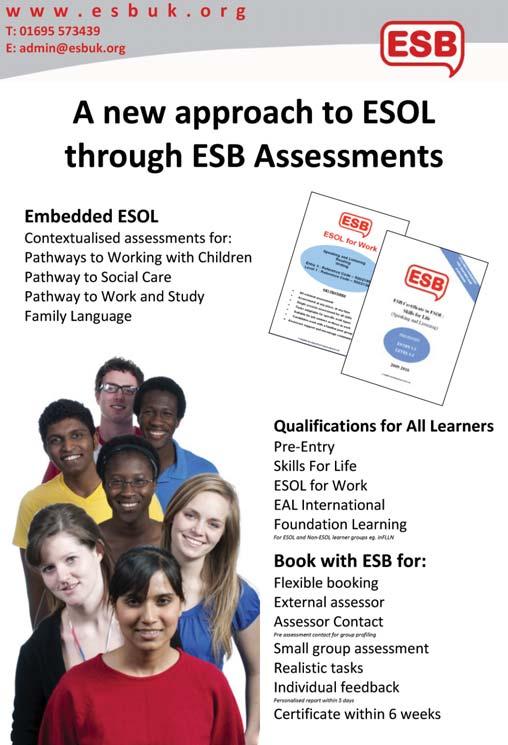
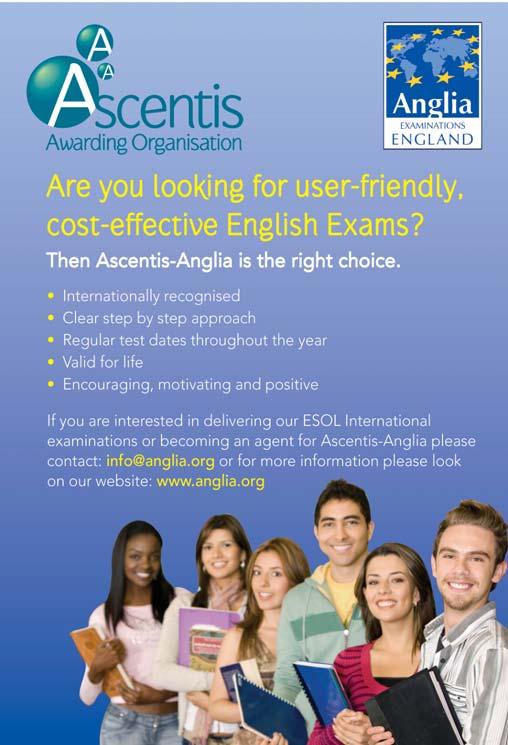
RegistrationDesksOpen:0830-1730 ELTResourcesExhibition:0830-1730
Plenary Session : 0900-1010
0830-1730Registrationdesks and Exhibition open
0815-0845IATEFLHow to... track
Room 1H o
CatherineWalter
Givingapresentationcanbeastressfulexperience.Thissessionwillgiveyouwaysoforganising yourselfbeforeyourpresentationandconductingyourselfduringyourpresentationtoreducethat stress.Theaimofthesessionistomakeyourpresentationamoresatisfyingexperienceforyouandfor your participants.
Room 3H o w t o g e
ShelaghRixon
InthissessionIwilldrawonmyexperiencesasanMAtutorandontheperspectivesofsomerecentMA students,collectedbyquestionnaireandinterviews.Themeswillinclude'HowIchosemycourse','My worst mistake', ‘What I would definitelydoagain/neverdoagain'.
0900-1010PlenarySession
Auditorium 2 (640audience)
andrelayedto Syndicates 1&2&3&4 (each 400
audience)
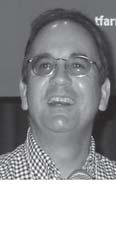
ThomasS.C.Farrelli
w o r k e d i n K o r e a , S i n g a p o r e a n d C a n a d a H e i s s e r i e s e d i t o r f o r T E S O L ’ s Language Teacher
Research s i x v o l um e s e r i e s H i s r e c e n t b o o k s i n c l u d e Reflective Language Teaching: From Research to Practice ( 2 0 0 8 , C o n t i n u u m P r e s s ) ; Teaching Reading to English Language Learners: A Reflective Approach ( 2 0 0 8 , T h o u s a n d O
; Talking, Listening and Teaching A Guide to Classroom Communication (
) ; Essentials in Language Teaching (
Reflectivepracticegenerallymeansthatlanguageteacherssubjecttheirassumptions,beliefsand teachingpracticestoacriticalanalysissothattheycanbecomemoreawareoftheirpractice.Gaining teachingexperienceasalanguageteacherisnotenoughtoprovideautomaticprofessional development,forwedonotlearnmuchfromexperienceasmuchaswelearnfromreflectingonthat experience;thus experiencecombinedwithsystematicreflection can leadtoprofessional growth sothat wecanbecomemoreeffectivelanguageteachers.Thisinteractiveplenaryoutlineswhatreflective practiceisandhowlanguageteacherscandoitregardlessoftheirlevelofteachingexperience.Iam hopingthatthisinteractivetalkwillgiveyouachancetotakeareflectivebreakasyoubegintoexplore, examine,challenge and reflecton your assumptions, beliefsand classroom practices.
Session3.1:1025-1110
1025-1110Session3.1
Boardroom 25 audience
Workshop GEN
Gresham
70 audience
Talk
Paganini
300 audience
Talk
TEA
Regency
120 audience
Talk
LA, MD
Tudor
70 audience Talk
Picturesareapowerfultoolforteachersandstudentsalike,butdoweimposeourown orinviteourstudentstogenerateanddeveloptheirs?Thisworkshopwilllookat multipleadvantagesofthestudentsworkingfromtheirownimagesthroughaseriesof practicalactivitiesandwillexperimentwithacoachingtechniquethatworksonthis premise.
Inthissession,thepresenterswilltalkaboutpopularcollaborativeweb2.0toolsand explainhowtousethemcreativelyandsystematicallyinuniversitypreparatoryschools. Thetalkwillofferanumberofreasonswhyitisnecessarytointroduceweb2.0tools intoEFLcontexts,anddiscussessomeofthepotentialproblemsandsolutionsinvolved inthisintegrationprocess.
WhataccommodationsdoestheTOEFLtestoffertostudentswithdisabilities?Howare the“alternativeformats”ofTOEFL(Audio,Braille,andseveralothers)created?By explaining thework thatgoesintomaking TOEFLaccessibletostudents with disabilities, thepresenterhopes to increase the awareness of thisaspectof EFL testing. ie pub
DoyouhaveaSACorcomputersuiteinyourinstitution?Doesitsometimesfrustrateyou thatstudentsuseitforlittlemorethanemailinghome?Basedonrecentresearchinthe privatelanguageschoolwhereIwork,Iwillpresentawealthofideasthathaveworked well - tohelpyou better exploityour own resources.
Argumentationskillsarecrucialformasteringoralandwrittencommunicationin internationalresearchworld.Yetdevelopingargumentationskillsintheaudienceof professionalstudentsisachallengeasthestyleandpragmaticsofarguingdiffers greatlyacrosscultures.Thetalkinvitestheaudiencetodiscusstypicalacademic argumentativecontexts, materials based on controversial issues and possible exercises.
Auditorium2
600 audience
Talk
GEN
Readingisevolvingdramaticallyawayfromareflective“listeningtothedeadwithour eyes”.Isitgettinghardertoreadabook?Areourbrainsrewiringfordynamiconline flittingandsmudging?Thissession reviewsthelatestscientificthinking onwhatreading isandaskswhetherELT’sdescriptionofskillsisstillrelevantoniPadsorinyour classroom.
e=experiencedaudience
ie=inexperiencedaudience
bkprom=promotingabook
p=primaryteaching s=secondaryteaching
fp=focusingonpublished/commercialmaterial
pub=speakingonbehalfofpublisher/examinationboard/commercialorganisation
t=tertiaryteaching a=adultteaching
Room 1
100 audience Workshop
TTEd
Room 3
50 audience Workshop
YLT,L L M C S S I G
P r o g r a m m e
Room 5
50 audience
Talk
Mentoring
Room 6
60 audience Workshop
T D S I G
P r o g r a m m e
Room 8
50 audience Talk
LA, YLT
Room 9
60 audience
Talk
EAP,E E S P S IG
P r o g r a m m e
Session 3.1 : 1025-1110
)
The workshop discusses the features that contribute tothe effectiveness of a language practiceactivity in terms of validity,learnerengagement, success-orientation andso on. This is followed by a skills/grammar-based activity which involves the audience. Participants thenevaluate the practiceactivity by applyingthe criteria ofeffectiveness presented earlier and discuss how farthis is learning-centred.
Bepreparedto use your imagination andlet yourself go! We’ll usecluesfrom Lewis Carroll’s popularpoem"Jabberwocky"to make our own interpretations and actthem out.We’ll also discuss a recent four-minutefilmof the poem that can beused inclass to free students from the idea that a poem can have only one meaning.
J i a nm e i X i e ( U n i v e r s
, U K)
Mypresentation introduces twomentorships that I experienced in my professional development asan EFLteacher at a Chinese universitybetween2002 and 2006.In exploring the mentorships’ impact on mypersonal and professional development, this presentation also attemptsto provide somerecommendations for formal and informal mentoring for teachers in the Chinese or overseas contexts.
R u l i n g t h e u n
B
(
English teachers in the tertiary andadult educationsectorsare often leftontheirown when confronted withpoor behaviour in the language classroom.In this workshop, we will discussthechallenges and possible solutions to several discipline issues. The speakerwill also ask participants to express their frustrations and encourage others to offer solutions totheir colleagues.
Z o e T y s o e ( B r i t i s h C o u n c i l M e x i c o )
Making learnersmore autonomousisbecoming increasingly moreessential asdifferent modes ofstudyemerge in ELT, but how does this fit inwithYoung Learner teaching methodologies? Thistalk works through six steps to makingyounger learners more awareof their learningneeds, taking the“Kids Plus” group from British Council Mexico as a case study.
S
I have been working with awriting developmentgroup madeupof internationalMA TESOL students. We havetried to understandthesocial andcultural, ratherthan linguistic,challenges that they facewhen writingessaysfor assessment. Ireport on our use of a variety of techniques to increase confidence and develop academic voice. e, ie, t
a h V
AL= Applied Linguistics
BE = Business English
EAP = English for AcademicPurposes
ES(O)L = English asa Second Language
ESP= English for Specific Purposes
GEN =General
GI =Global Issues
LA= Learner Autonomy
LAM= Leadership & Management
LT = Learning Technologies
LMCS= Literature, Media & Cultural Studies
MD = Materials Development
PRON = Pronunciation
RES = Research
TD = TeacherDevelopment
TTEd = Teacher Training& Education
TEA = Testing, Evaluation& Assessment
YLT= Young Learners & Teenagers
Room 10
50 audience
Room 11
20 audience
Talk
Room 14
30 audience
Talk
TTEd
Room 15
60 audience
Talk PRON, TTEd
Skyline
90 audience
Talk MD
Syndicate 1
200 audience
Talk
Vocabulary
Learners bring gender discrimination fromtheir social setup into their classrooms. In this workshop, we will considerthe challengesthis poses foran Englishteacher, consider the use of action research in this situation and participate in activities that can be used to create awareness amongst learners. Authentic material,relevantto the learner’s society will be usedduring the workshop.
One-on-one conferencing is a useful techniquefor the teacherto communicate with learners.It is a chance tocheck what they meanand understand and the teacher can also encourage them to havetheownership of their work.In thispresentation, I want to share an evaluation study that I have carried out with Pre-Intermediate andIntermediate students on this.
A presentationand discussionbased on researchintotheeffectiveness of INSETT courses and workshops carried out by the British Council intheirRussiaandNorth Europe Region.Were thetechniques and practicesintroduced during INSETTtraining actually usedin the classroom? What were the factors that hindered (barriers) or helped (boosters) their implementation? What can trainerslearn from this?
What's the connection betweenpronunciation and other areasof learning English? How do we choose priorities and a model for learners? Whatdo we do if our own accent is not nativespeaker? Do weignore pronunciationand hopeit willtake care of itself? These are some of the questions I'll be asking (and answering) in this practical session. e, ie, p, s, t, a
With the increased use of authentic video in teaching, are we focusing enough on how students experienceit?Usingexamples from the PearsonLongman course Speakout , writtenin cooperation withthe BBC,SteveOakes will look at howauthenticclassroom material can beexploited so that it's notjust thematerialthat's authentic, but the students' experience aswell. e, ie, t, a bkprom, fp, pub
S t u a r t R e d m a n ( U K )
Many students find idioms and phrasal verbsdifficult to learn; manyteachersfind them difficultto teach. Thetalk will address this issue, offeringways of contextualizingidioms and phrasalverbs together ininteresting ways. I willshow material from twonewbooks in the Oxford Word Skills series: IntermediateIdioms and Phrasal Verbs , and Advanced IdiomsandPhrasalVerbs
e = experienced audience
ie = inexperienced audience
bkprom = promoting abook
p = primaryteaching
s =secondary teaching
fp = focusingon published/commercialmaterial
pub = speaking onbehalf ofpublisher/examinationboard/commercial organisation
t= tertiary teaching a= adult teaching
e, ie, s, t, a bkprom, fp, pub
Session 3.1 : 1025-1110
Session 3.2 : 1145-1245
Syndicate 2
200 audience
Talk AL, RES
Syndicate 3
200 audience
Talk MD
Syndicate 4
Collins s COBUILD D English h Grammar: : a nd d I w a s , l i k e , w o w !
P e n n y H a n d s & K a t e W il
Just asthe vocabulary of alanguage is inconstantflux, so,too, is its grammar;itsimply evolves at a differentrate.At COBUILD, we have beentracing the development ofa selection of grammatical features over thelast 20 years. Theneweditionof COBUILD English Grammarpresents the results ofthis research in our trademarkuser-friendly style. e, ie, s, t, a bkprom, fp, pub
B
A
( H a r p e r C o l l i n s )
)
How can we helpstudents improvelistening skills? Is students'failure to listenthe problem or is it an inability to hear? Whattexts do students need to hear? With some anecdotesand experimentsItryto answer thesequestions. I'll presentsomepractical tasks applicableto anylistening class, illustratedwithmaterial from Outcomes and Innovations.
Thistalkaimsto explore the languagethat a teacher of CLIL may need forboth preparing and delivering their lessons. The talk will lookat the pointers provided by research on the scope and functionsoflanguagethat allows the teacherto carry out the wide variety of roles that CLIL teaching requires.
1110-1145Coffee break
1145-1245Session 3.2
Boardroom 20 audience Workshop GI, YLT
Gresham 70 audience Workshop GI
In an age of ‘bespoke’ courses,Young Adults(15–17) are neglected inELT materials which aregeared insteadtowards teenagersorolder adult learnerswithvery littleageappropriate content forYAs. We will demonstrate thatby ‘keeping it real’ and using authentic materials which incorporate relevantglobal issues we can facilitate farricher language and skills development.
Unlike other subjects, foreign languages have no given content tocover.So what determinesthe contentwe bringtoour classrooms?The coursebook we areusing? Our own interests as teachers? Student choice? How cantheteacher’sroleaseducatorbe reflectedin the choice ofcontent?And in what other ways do we educate aslanguage teachers? e, ie, s, t, a
AL= Applied Linguistics
BE = Business English
EAP = English for AcademicPurposes
ES(O)L = English asa Second Language
ESP= English for Specific Purposes
GEN =General
GI =Global Issues
LA= Learner Autonomy
LAM= Leadership & Management
LT = Learning Technologies
LMCS= Literature, Media & Cultural Studies
MD = Materials Development
PRON = Pronunciation
RES = Research
TD = TeacherDevelopment
TTEd = Teacher Training& Education
TEA = Testing, Evaluation& Assessment
YLT= Young Learners & Teenagers
Session 3.2 : 1145-1245
Paganini
300 audience
Workshop
L T S I G
P ro g r a m m e
Regency 120 audience
Workshop GEN
In this workshop Iwill be looking at recent developments in mobile and handheld learning (mLearning)and therationale for bringing connected, mobile devices into the classroom.The workshop willlookat various applicationswhichcan be blendedinto classroomteachingas wellaswaysof incorporating mLearning into homework and extra-class study.
How can we adapt our lessonsin responseto learners' needswithout losingcontrol of thelesson? We look at three essential elements foreffective adaptable teaching: mindset,where we explore the knowledge an adaptable teacher needs; toolkit, where we look at thedifference between adaptable and non-adaptable materials; skillset, where we developskills beyond those conventionally associated with teaching.
Tudor 70 audience Workshop TTEd
Auditorium 2 600 audience
What process categories exist inonline trainer training? Whatcantheybe used for? This workshop willuse materialsfrom anonlinetrainer trainingcourse to consider these questions.The outcome of the workshopwillbea list of online trainer training tasks withexamples based on McGrath’s process categories offeeding, leading,showing and throwing.
Weconsider what a grammarat CEFR B1/B2 levelshould include, based oncorpus evidence. Weshow how learnercorporacanbe used to track the emergenceof grammatical features among B1 and B2learners, howerror-information can be interpretedand howregister differences can behighlighted(e.g.speech vs. writing)to produce a useful reference grammar for upper-intermediatestudents.
Room 1
100 audience
Workshop
Room 3
50 audience
Workshop
YLT,L L MC S S I G
P ro g r a m m e
If you attended Tom Farrell’s plenary session this morning on “Reflective practice for languageteachers”,youare welcome to attendthis related workshop. This willallow participants to askany questionsoraddressany issues that have been raisedbyTom’s plenary talk.
Animation can beused withany level and any aged group andis anaturalextension of classic activities suchas shortstorywriting, story boarding, advert makingandteam building tasks. Thisworkshop is a hands-on beginners’guide tomakinganimation anda practical exploration of how,when and why animationis a fun and effectiveteaching tool. ie, s
e = experienced audience
ie = inexperienced audience
bkprom = promoting abook
p = primaryteaching
s =secondary teaching
fp = focusingon published/commercialmaterial
pub = speaking onbehalf ofpublisher/examinationboard/commercial organisation
t= tertiary teaching a= adult teaching
Room 5
50 audience Workshop
TEA
Room 6
60 audience Workshop T D S I G P
Room 8
50 audience Workshop GEN
Session 3.2 : 1145-1245
What makes a reliable, valid test? This workshopwillprovide aninsight intowhatis involved increating tests forCambridgeESOL with theaim of demonstrating howtests areproducedin orderto aid exam preparation and how to become involved inwriting, trialling and examining with Cambridge ESOL. e, ie, p, s, a pub
Dare we help learners say what they want tosay rather than what we as teachers want to hear? In this hands-on workshop we will create a role play usingtechniques taken from PDL (Psychodramaturgie Linguistique) designed to maximizelearner input. Minimal preparationisbalanced by a highdegree of empathyand flexibility onthe part of the teacher.
Learning to listen wellisachallenging, but worthwhileundertaking. Byfostering a cultureof listening in the classroom,teachers canmotivate learners andhelp them to becomegood listeners, not only in languagelearning but also in allaspects of their personal and professionallives. This hands-on workshop will offersome ideas and activities on how to achieve this e, ie, p, s, t
Room 9
1145-1215
60 audience
Talk
E S P S IG
Room 9
1215-1245
60 audience
Talk
TTEd,E E S P S I G
P r o g r a m m e
Room 10
50 audience Workshop TTEd
Teaching Englishto Cubanhealth technologylearners has become achallengeand a dilemma. Theauthors of a course bookexplore theadvantagesof an adequatebalance of the communicative,functional/notional, task-basedlearning andgrammatical approachesin which the maingoal is to teachhowto use English in a health technology specialist’s domain and context.
What difference does a training course make for the trainee?- is it a change in “thinking” or a change in “approach”and towhat extent dothese happen? Many trainerstry to explore theanswerto these questionsthroughdifferent means. This talk,will explore these issues withreference toanEAP teacher training course anddata collected from trainees.
Face to facesupervision inahumanistic MATESOL programmeans becoming anextra pair ofeyes andearsin service toan experienced teacher’sprofessionaldevelopment and personal growth. Isit possibleto transfer the depth and quality of this experienceto distance learning?This workshop will explore this question, callingon participants to share their current thinkingand experience.
AL= Applied Linguistics
BE = Business English
EAP = English for AcademicPurposes
ES(O)L = English asa Second Language
ESP= English for Specific Purposes
GEN =General
GI =Global Issues
LA= Learner Autonomy
LAM= Leadership & Management
LT = Learning Technologies
LMCS= Literature, Media & Cultural Studies
MD = Materials Development
PRON = Pronunciation
RES = Research
TD = TeacherDevelopment
TTEd = Teacher Training& Education
TEA = Testing, Evaluation& Assessment
YLT= Young Learners & Teenagers
Session 3.2 : 1145-1245
Room 11
20 audience
Workshop YLT
Room 14
30 audience
Workshop
ES(O)L, TEA
Althoughindependent andeffective text comprehension is an expected ability of learnersbythe time theyreach secondarylevel, more oftenteachers feel frustrated at the nature and range of failureoflearnersin understanding simpleESL texts. This workshopplansto address this malady bysuggesting scaffolding activitiesin phonological awareness and comprehension techniques.
Oral proficiency examinations are often examiner-led and question andanswerfocused.
To address this issue theGradedExaminations in Spoken English include a task whereby the candidateselects and prepares a topic for discussion.This workshop looks at how teacherscanhelp students prepare theirtopic.Thetasks are lessonfocused and can be used for generalfluency practice.
Room 15
60 audience Workshop
CLIL, YLT
This workshop explores the rolethatdifferent kinds of picture books can play in enrichingchildren’s understanding of content fromotherareas of the curriculumand developinglanguage and cognitiveskills. We will do and discuss a range ofpractical examples, andconsider the importance of balancingand integratingcontent-based teaching with stories and narrative texts during the primary years.
Skyline 90 audience
Workshop LAM, TTEd
Syndicate 1
200 audience
Workshop GEN
Syndicate 2 200 audience Workshop
This practicalworkshop will inviteyoutoreflect onwhy itis important for ELT professionalsto specialise,and give youthe chancetoexplore career options and to develop anaction plan.Optionsexplored will includecourses, modelling, the apprenticeship model,coaching andmentoringand communitiesof practice. Examples will be drawn from management, teacher trainingand business English.
We oftenconcentrate on the things that gowrong.But how abouta changeofmindsetso that we focus onthe good thingsabout our profession? Using a series of flipcamvideo interviews we will listen to / watch teachers telling usabout successfullessons to try and discover what they believe aboutteachingand learning. e, a
Do you have difficulty getting learners tospeak freely in your CLIL classes? This practical workshopwill presenttasks aimed at developing speaking in the CLIL classroom. Participants will carryout CLIL speaking tasks and identifyprinciplesof task structureanddesignin order to go homeequippedwith ideas andtechniquesfor creating their own CLIL speaking tasks.
e = experienced audience
ie = inexperienced audience
bkprom = promoting abook
p = primaryteaching s =secondary teaching t= tertiary teaching
fp = focusingon published/commercialmaterial
pub = speaking onbehalf ofpublisher/examinationboard/commercial organisation
adult teaching
Syndicate 3
200 audience Workshop MD
Syndicate 4
200 audience Workshop MD, YLT
TBank
20 audience Workshop YLT
Session 3.2 : 1145-1245
Session 3.3 : 1345-1415
We will begin by discussinga numberofstatements about TBL,includingsome widely heldmisapprehensions. Participants will takepartin a task-based cycle inaction, and then explorewhetheror not pair work, drillsand grammar patternpractice, rotelearning,written language, use of L1and asystematiclanguage syllabus are compatible with a task-based approach.
Language plants are beautifulresources,like grammatical MindMaps.Over the last few years, so many teachershave said "Wow, these are great! Can we makeourown,tofit our own courses,to suit our own learners' needs?" Nowtheansweris Yes! Yes, you can! And we will, all together in this truly creative workshop.
Creativityis not only a word whichfrequentlyappears on ELT resources. It is anability, attitude and also a process. This session is forteachers who wantto enhancetheir teaching oftheskillsinEnglishthrough creativestrategies. Wewill try to find ourown potential. There willbe lots of practicalideas and activities, sobeready!
Gresham
audience
i n i n g A ge n c y , C r o a t i a )
The lackof qualified teachers for early EFL programmesseemsto be a great problem in schools.Both pre-serviceand in-serviceEFL teacher training programmes have traditionally overlooked the teachingof young learners. Whatshouldbedone in orderto improve EFL teaching in primary schools?Whatis the role of teacher traininginstitutes? What areother professional development opportunities?
A
Nowadays,there are fewwho doubttechnology's ability and relevanceto supportthe teaching of languages.Thepopularity ofe-learning is one signofthis, butICT canplaya major part in face-to-face language teaching too, offering newwaysofsolving old problems.During this presentation,youwillsee somebenefits thatICThas on learner interaction and motivation.
AL= Applied Linguistics
BE = Business English
EAP = English for AcademicPurposes
ES(O)L = English asa Second Language
ESP= English for Specific Purposes
GEN =General
GI =Global Issues
LA= Learner Autonomy
LAM= Leadership & Management
LT = Learning Technologies
LMCS= Literature, Media & Cultural Studies
MD = Materials Development
PRON = Pronunciation
RES = Research
TD = TeacherDevelopment
TTEd = Teacher Training& Education
TEA = Testing, Evaluation& Assessment
YLT= Young Learners & Teenagers
Session 3.3 : 1345-1415
Paganini
300 audience
Talk
GEN
Regency
120 audience
Talk
TEA
Tudor
70 audience
Talk AL, RES
Auditorium 2
600 audience
Talk GEN
Room 1
100 audience
Talk GEN
Room 3
50 audience
L
Thisdemonstration will show howthe BritishCouncil in LAC developedand delivered online English Languagedevelopment (e-English for Teachers)to public sectorteachers in severalLatinAmerican countries.Attendeeswill benefit fromlessons learned and a reflection on best practices forinstitutionalpartnerships. Another exampleof online development in Brazil, usingEnglish Teachers' Portfolio, will also be briefly demonstrated.
Exam preparation courses can be stressful both forteachersand learners. This talk exploressome of theways short coursescan use a blended "wiki + f2f lessons"format to "createmoretime". Wealso explore how to keepthefocus bothon the examitselfas well as developing the learner's own skills and language competence whilst motivating learners.
This studyexamines the ideas andpractices of postmethod pedagogies, presents the Bangladesh contextin briefand reportstheresult of an experimental study with aset of postmethodtasks and materials in the Bangladeshcontext where teacher fronted, memory based teaching-learningcultureis currently being replaced byCLTwith no visible sign of improvement.
Some studentswant to beable tousespoken grammar features suchas vague language, interjections and headers.I’ll suggest that, once we’ve selected a set of useful items, we mayneed to offerlearners clearexplanationsof how these features work,and thekinds of conventional exercises thatallows themtimeto practisethis new language. I’ll refer to AHandbookofSpokenGrammar(to be published in autumn). e, a bkprom, fp
O s c a r H e r n a n M o n t o y a Go m
This session reports on an experience carried outwithtwo different groupsoffuture teachersduring theirinitialteacher education inColombia. The experience is aimedat joining tutors’ andstudents’efforts, both from a local highschool and theUniversityof Quindio whereschool teachers are educated. Thisprocessis intendedtoimprovethe quality of teaching English to children at primary schoollevel.
Come andlearn moreaboutthework of the LMCS SIG,meet thecommittee,andfindout how you can contribute towhatwe do. Foryourentertainment,committee members will each read and talk briefly about a poem which is connectedto the sea or the seaside.
e = experienced audience
ie = inexperienced audience
bkprom = promoting abook
p = primaryteaching s =secondary teaching
fp = focusingon published/commercialmaterial
pub = speaking onbehalf ofpublisher/examinationboard/commercial organisation
t= tertiary teaching
adult teaching
Room 5
50 audience Talk GEN
Room 6
60 audience Talk LAM,T
Room 8
50 audience Talk TTEd
Room 9
60 audience
Room 10
30 audience Talk LA
Room 11
20 audience Workshop
Session 3.3 : 1345-1415
Thissession describes the project promotedby theMinistry of Education in coordination with the British Council and Colombian Universities offeringIn-service training and development. Presenters will describe the collaborativeprocess and itsimplications at variouslevels namelyrole of the universities involved,importance ofprofessional networksto ensure professionalstandards, communicationbarriers between academics and administrators and policy makers.
Mostofthetime classroomobservationsinvolve an observer andan observee. This talk focuses ona 'three-way' approach toclassroom observations, as anattemptto: make trainers,teachersand learners more aware of their roles and responsibilities in the languagelearningprocess;and foster a more enhancedself-reflection process by including immediate student feedback on teaching and learning.
Promotingreflection, exploring beliefs, and takinga dialogic approachto postobservationfeedback are increasingly important inteacher education.Onour Graduate Diploma balancing these aims withthe need toassess teachers can be challenging.We report on our useof digital technologiesto promote teacherreflection and improvethe observation and assessment process.
The purpose of the ESP SIGOpen Forum is toreview developments thathave taken place inthepast year. Theparticipantswill have an opportunity to access the SIG'smost recentreport, examine its most recentpublications (booksand theJournal), hear ofnew globaland local initiatives, and networkwith fellow professionals.
s
M a r i a C B r a v o
My talk highlightstheprocedure and resultsofsimple language activities between a multicultural group of Erasmus students (with strong EFL skills) and a weaker EFL class of Portuguese undergraduates. Tasksto meet each group’s needs were discussedand preparedprior to fortnightly conversationclasses. The outcomes wereauthentic intercultural communication atdifferent levels and noticeable EFL improvement.
All learnersneedarestwithinthe lesson. Thisworkshop isbased on the results ofan action research studywhich suggests usingenergizers inthe formof “mini breaks” within the lesson. A brief presentation ofthe findings as well as energizers, whichwere used to refresh students and re-engagethem in the lesson, will be shared. ie, t
AL= Applied Linguistics
BE = Business English
EAP = English for AcademicPurposes
ES(O)L = English asa Second Language
ESP= English for Specific Purposes
GEN =General
GI =Global Issues
LA= Learner Autonomy
LAM= Leadership & Management
LT = Learning Technologies
LMCS= Literature, Media & Cultural Studies
MD = Materials Development
PRON = Pronunciation
RES = Research
TD = TeacherDevelopment
TTEd = Teacher Training& Education
TEA = Testing, Evaluation& Assessment
YLT= Young Learners & Teenagers
Session 3.3 : 1345-1415
Room 14
30 audience
Talk
GEN
Room 15
30 audience
Skyline
90 audience Talk
This talk aims to explore Japanese students’ perceptions of the concept of whatmakes a good language learner beforecoming tothe UK.Based on interview analysis, the study examines whataspectsof the experience ofliving and studying abroad can help Japanese learners to improve their abilities in learning English as a foreignlanguage.
This talk investigates how a group of overseas learners have used anonline community as an importantsocial strategy for IELTSpreparation,andhow they effectively usethe forum.It aims to discoverthe issues,suchas howlearnersinitially approachthe forum, how they interactwith otherusers,andhow theyfilterother users’ suggestions, to support their individualIELTS preparation. e,
A high sampleofELT students andteachers in Spanish compulsory education (2063 and 79, respectively) were recently surveyed on different aspects related to CLIL, in particular to cross-curricularteaching in theEnglish classroom. This talk will show the effect of the variables of level, cycle, gender, age and kind of institution in their answers. ie,
Syndicate 1
200 audience
Talk YLT
Syndicate 2
200 audience
Talk GEN
Syndicate 3
200 audience
Talk GI
This talk examines how some of my teenage students who had very little ornointerest in studyingEnglish completely transformed their attitude thanksto drama activities and involvementina play.It discusseshow dramaprovidesa range of opportunitiesto fit differentneeds ofmy different studentswho thus assume (finally) some responsibility for their own learning.
This talk presents the content and aimsoftwoinnovative trainingprogrammes into approachesto learning EFL, conducted with40in-serviceEFLteachersand 30 learners. Student approaches to learning EFLare acombination ofmotivation andlearning strategiesand are categorizedas eithersurface, deep,or achieving.The training focused on learner education, teaching activities, motivation, and assessment. e,
p, s,
Syndicate 4
200 audience
Talk TTEd
Thispresentationwillconsider ELT in developmemnt issueswith particluarreference to Afghanistan and Pakistan. How for instance can audiences without electricity receive mass audienceELTY radio programmes.The presenter was latterly BritishCouncil Directorin Afghanistan and hasextensive experience ofmnanaging ELT projects in the Middle East andAfrica.
This talkwill present anddetailthe different stages ofa six-month teachertraining and development project implemented in a largeEFL institution in Brazil which sought a means of meeting the needof having ahigh numberof suitablytrained young learner teachers. A critical reflection based on the project result will then beshared.
e = experienced audience
ie = inexperienced audience
bkprom = promoting abook
p = primaryteaching s =secondary teaching t= tertiary teaching a= adult teaching
fp = focusingon published/commercialmaterial
pub = speaking onbehalf ofpublisher/examinationboard/commercial organisation
Session 3.3 : 1345-1415
Session 3.4 : 1430-1515
TBank
20 audience Talk LAM
S
In the traditional classrooms,there isusually a mismatch between students’ needsand classroom structure. Havingclasses withcooperative learning helpsreduce management problems.This paper deals with groupmanagementskillsandprovides teachers with material to help students buildcommunity, raise their self-esteem, and givethemthe opportunity to approach, process, andcomplete ‘real-life tasks’.Detailed handout provided.
Boardroom
25 audience Talk YLT
Gresham
70 audience Talk
LA, L L T S I G P r o gr a m m e
Thispresentation presents two intercultural exchange projects carried out in a Taiwanesesecondaryschool.The projects integrated process writing withemail exchange toimprove students’reading, writing andculturalawareness. Learners experiencedintercultural challenge when they visitedKoreaandthe UK. Suggestionsfor the interculturalexchanges projects will be provided.
Thistalkfocuses on a Twitterproject I havedeveloped sincelastyear with two classes. Social networkingwebsitesare very popular.Utilising them as teachingtools can accelerate thelearning process by encouraging interaction. I shall share practicalideas regarding the use of Twibes in class and I will give an indication as to the results thus far achieved. e,
Paganini
300 audience
Workshop GEN
Regency
120 audience
Talk
LT, TTEd
In thisworkshopwe invite you to takepartin two activities and engage withsomeof the ideas that have informed our new publication English through Art (publishedby Helbling).This presentation will showhow language acquisition can bestimulated in an original, creative and enjoyable way using art.
e, ie, s, t, a bkprom, fp, pub
Training teachers touse learningtechnologies – thistalkwill demonstrate howwe developedanonlinetraining course to helpteachers develop best practiceportfoliosof sharable,learning technology-rich lessonresources.Find out about thetools we used (Moodle+ others), how the teachers fared(extracts fromtheir learningjournals)and how their teaching has changed since completing the course e, ie, a
AL= Applied Linguistics
BE = Business English
EAP = English for AcademicPurposes
ES(O)L = English asa Second Language
ESP= English for Specific Purposes
GEN =General
GI =Global Issues
LA= Learner Autonomy
LAM= Leadership & Management
LT = Learning Technologies
LMCS= Literature, Media & Cultural Studies
MD = Materials Development
PRON = Pronunciation
RES = Research
TD = TeacherDevelopment
TTEd = Teacher Training& Education
TEA = Testing, Evaluation& Assessment
YLT= Young Learners & Teenagers
Session3.4:1430-1515
Tudor
70 audience
Talk
LT, MD
Auditorium2
600 audience
Workshop
Onlinevideoscanbeanidealsupplementtobothtraditionalclassroomteachingand onlinetutoringinordertocreateablendedlearningenvironmentwithmanybenefitsto teachersandlearners.Thispresentationwillshowthepracticalusageofonlinevideos fromLinguaTV.comanditsintegrationinEnglishLanguageTrainingaswellasa reflection ofits strengths and limitations.
Inthispracticalsession,Iwillsuggestthatteachingcreativelymayhaveahugeimpact onthestudents’motivationbecauseitfuelstheirinterestandcuriositytolearn.Wewill lookatthedifferenttypesofcreativity,wewilloutlinestrategiesthatcanenhanceour creativepotential,andwewillillustratehowcreativitycanbeimplementedinthe classroom. e,ie,s,t, a
Room 1
100 audience
Talk YLT
Room 3
50 audience
Talk
L M C S S I G
P r o g r a m m e
Pass in English:
J
Mytalkwillfocusonsomepracticalideasonhowtomotivateyounglearnerstodevelop theiroralskills.Firstly,Iwillbrieflyreviewtheliteratureonmotivation.Then,Iwill presenttheworkIhavebeendoingusingfootballasaframeworkformotivatingyoung learners.Finally,Iwillpresentsome classroomactivitiesthatcanachievethese objectives. p, s bkprom, fp, pub
Room 5
50 audience
Talk
GEN
Thistalkfocusesonhowtoemployamultimodalapproachwhenusingpoetryduringan Englishlesson.Itexamineshowteachersmayuseanimatedpoemsandsimilar techniquestoliftpoetryofftheprintedpageanddevelopstudents’languageproficiency andcreativeengagement.Themultimodalapproachhelpsstudentstoplaywith language and transforms poetry into a performance.
Thispresentationsharesthefindingsofaqualitativestudywhichaimsatdiscovering contributionofrealclassroomteachingpracticesofELTstudent-teacherstotheir professionaldevelopment.Thedatawascollectedthrough,(i)student-teachers’ reflectivejournalentries,(ii)writtenfeedbackoftheircooperatingteachersand supervisor,and(iii)theinterviewstorevealdifferenttalesofstudent-teachersfrom multiple views.
Room 6
60 audience
Talk
ThepresentationdescribesthedetailedprocedureofpeercoachinginanEFLcontext throughpre-observation, observation,andpost-observation cycles.Thetalk alsoreports theresultswhichshowthatpeer-coachingsignificantlyaffectsEFLlearners’overall achievementaswellasteachers’attitudesalongwith thechangesitbringsaboutintheir teaching.
e=experiencedaudience
ie=inexperiencedaudience
p=primaryteaching s=secondaryteaching
bkprom=promotingabook fp=focusingonpublished/commercialmaterial pub=speakingonbehalfofpublisher/examinationboard/commercialorganisation
t=tertiaryteaching a=adultteaching
Room 8
50 audience Workshop GEN
Room 9
60 audience
Room 10
50 audience
Talk RES
Room 11
20 audience
Talk GEN
Room 14
30 audience
Talk RES, TEA
Session 3.4 : 1430-1515
‘Creating audience forstudents writing’ wasapplied with fourseparate projects. These are sendingformal emailsto people indifferent entities, sendingletterstostudents in another school, using onlinestudents'forums and ‘YouthAdobe Voice’project. YAV encourages students tochoose a topic, write questionnaires,interview people,produce videos, upload them to the YAV website and write their own reflection.
N
In a world of increasing communicative complexity, wherethe boundaries between nations,institutionsand disciplines are increasinglyporous, how can ESP teachersand course designersdeal with ever-shifting demandsin the multicultural andmultilingual workplace? Howspecific can ESP be in suchcircumstances?This talk focuses on an action-oriented, task-based approach to needs analysis and course design.
We’ll look atteacherand studentperceptions ofcoursebookuse andthe impact of coursebook useon studentengagement andspeaking time during lessons.Based on action research including 50 hours of class observations with adult learnersat the British Council Thailand, we’lldiscussactivities and techniques that seem topromote high engagement and student speaking time.
Learner autonomy isa leading issueinlanguage teachingthathas been promoted by the new Curriculum Reform Project establishedby The Ministry of HigherEducation of Uzbekistan and supported byBritish Council.Through practicalactivitiesbased on the topicssuggestedby theNew Curriculum this workshop willoffer useful tipsin developing learnerautonomy.
Involvingundergraduates in research projects can be daunting formanyinstructors,but needn't be.This talkshows howinstructors can maximise undergraduateresearchers’ involvement and ownership by implementing thecollaborativeresearch (CR) model. Through CR, the project(inthis case,developing arubric toassess ESL/EFL placement tests), becomes a manageable, step-by-step process,allowing effective mentorship of student researchers.
Room 15
60 audience Workshop
Participants will havethe opportunity to considerchants as anengaging and effective approach with young learners.Linking theory to practice, participants will reflect on how different activities appeal to Gardner’s Multiple Intelligences. They will also try out activities, write their ownsimple chantsfor classroom use and considerhow tocreate chantswith young learners.
AL= Applied Linguistics
BE = Business English
EAP = English for AcademicPurposes
ES(O)L = English asa Second Language
ESP= English for Specific Purposes
GEN =General
GI =Global Issues
LA= Learner Autonomy
LAM= Leadership & Management
LT = Learning Technologies
LMCS= Literature, Media & Cultural Studies
MD = Materials Development
PRON = Pronunciation
RES = Research
TD = TeacherDevelopment
TTEd = Teacher Training& Education
TEA = Testing, Evaluation& Assessment
YLT= Young Learners & Teenagers
Session 3.4 : 1430-1515
Skyline
90 audience
Talk
GEN
Syndicate 1
200 audience
Talk
TEA, Vocabulary
CLILproposals andresearch will be considered criticallyto show it is not awin-win answer to foreign language teaching in the EU. In fact, not onlydoes some of the researchshow thatCLIL has limited benefits,butwhere there might bebenefitsthey tend tobe the resultof selection and privilege. Andwhat happens to the rest? e, ie, s
English Profile is aground-breakingprogramme thatisshapingthe future of language learning, teaching and assessment. Interimresearch from the English ProfileWordlists was presented in2009 (IATEFL Cardiff). The UK versionofthe Wordlists forA1-B2 are now available, following triallingand validation. Iwill reportonthisprocessandshare insights on vocabulary development across the six CEFR levels.
Syndicate 2
200 audience
Talk GEN
Syndicate 3
200 audience
Workshop TTEd
One ofthe greatest challenges we have found when teaching FCE and CAE is cramming in the input andpractice neededto meet the requirementsof the exam and at the same time keeping thestudents motivated. Thistalkwill present some fun butalso timeefficient activities for each of the fivepapers to tackle these challenges.
Teachers give careful thought to theactivities they use withtheirlearners butoften give less thought to how they willhandlefeedbacktothem, resulting infeedbackbecoming lengthyandunfocussed.Wewill review criteria which helpusto decidethe type of feedback required andtry outa variety of techniques to engage learnersinthiscrucial stage.
Syndicate 4
200 audience
Workshop TTEd, TEA
TBank
20 audience
Talk
TTEd
The TKT: Practical assessment gives teachers the opportunityto demonstrateand receive certification of their practicalteaching ability.This presentation will explainhow the assessmentcriteria canbe used constructively on courses to acknowledge teacher achievementand encourage teacherdevelopment. Participantswill have practice in applying the criteria using assessment material from TKT courses. e, ie, a pub
Thistalkwill discuss the issue of beliefandpractice in pedagogy, withparticular reference toa regionaltrainer training programme which took place in the Middle East from 2006-09. Thespeaker willshowhow participants on trainingcourses will adapt the methodology beingpresented accordingto theircultural contextand beliefs regardign pedagogy.
1515-1550Coffee
e = experienced audience ie = inexperienced audience
bkprom = promoting abook
p = primaryteaching s =secondary teaching
fp = focusingon published/commercialmaterial
pub = speaking onbehalf ofpublisher/examinationboard/commercial organisation
t= tertiary teaching a= adult teaching
1550-1635Session 3.5
Boardroom
25 audience
Talk
LT, TTEd
Gresham
70 audience
Talk
L T S I G
P r o g r a m m e
Paganini
300 audience
Talk GEN
Session 3.5 : 1550-1635
Usingvideos in class has contributed to theacquisition and improvement of theEnglish language. However,some Cuban teachersstill don’tfeel confident enoughwhen preparing their English lessons using videos.So,the author designed a blog that shows andillustrates toteachers and teachers trainers in Cuba how touse different videos with a variety of activities in class.
Iwill first discuss the existing m-learning solutions in India, their affordances and constraints,and then report a studyto show howfar m-learningisfeasible in rural, underdeveloped areas inIndia. Finally, I will discuss what I see asthe future directions for moreaccessible and interactive m-learning in Indiancontext. e, ie, s, t
C
TDI: : The e Blended d Course
)
Introducingblended learning for EFL teachers who havenot hadELTtraining,or wish to refresh theirknowledge. TDI:The Blended Course offers fivecomprehensive modules, each based on 20 hours of face-to-face instruction specifically tailoredto complement each 20-houronline module.Written byleading authors and usinginternational classroom video this dynamic course brings affordable teacher development toall.
e, ie, p, s, t, a bkprom, fp, pub
Regency 120 audience
Talk YLT
Tudor
70 audience
Talk LT, TTEd
Auditorium 2
600
Discover the online world ofactivities andgames for younglearnersof English at school or at home that is Littlebridge.com. Already established in over20 countries, the3D charactersand virtual world ensure that languageisrooted in a lively community with which students immediately identify. Presentation by the author. e, ie, p bkprom, fp, pub
Over the last fewyears theamount of training anddevelopmentoffered online has increased, with even theCambridgeCelta now moving towardsonlinedelivery. Withthis inmind,this talktriesto pin down what the keycompetencies for being anonline trainer are and asks if a good face-to-face traineris automatically a good trainer online? e, ie
S te v e T a y l o r e - K n o wl e s ( U K )
openMind
You knowthat you needto develop your students’ critical,creative and logicalthinking skills, aswell asequipping them with thelanguage skillsthey need. But youaren’t sure exactlyhow togo aboutit. I’ll show yousimple techniques you can use immediately, based on work done in developing the acclaimed young adult course, openMind e, ie, t, a bkprom, fp, pub
AL= Applied Linguistics
BE = Business English
EAP = English for AcademicPurposes
ES(O)L = English asa Second Language
ESP= English for Specific Purposes
GEN =General
GI =Global Issues
LA= Learner Autonomy
LAM= Leadership & Management
LT = Learning Technologies
LMCS= Literature, Media & Cultural Studies
MD = Materials Development
PRON = Pronunciation
RES = Research
TD = TeacherDevelopment
TTEd = Teacher Training& Education
TEA = Testing, Evaluation& Assessment
YLT= Young Learners & Teenagers
Session 3.5 : 1550-1635
Room 1
100 audience
Workshop
GEN
Room 3
50 audience
Workshop
L
P
Room 5
50 audience
Talk
TTEd, YLT
Whenlearners request an exampleto enhance ourexplanation of languagewecan becometongue tiedor draw ablank completely.Onotheroccasions, our examplesare not usefuleither for providing clarity or opportunities for conceptchecking. Some solutions tothese problems will be provided in the formof activities,exercises and discussion.
Readingcircles are fun student-led reading activities that engage learners in structured, open and natural group discussions about books. Students takeondifferent roles and share informationto construct meaning. They think,talk, question, make choices, exchange ideas,listen and takeresponsibility.Inthis practical workshop we'll explore easy steps to run readingcircles and have a go ourselves.
A practical sessiondealingwith challengesteachers faceconcerningdifficult students. The session will focusonquestions such as howto identifydifficult students,how to createan optimalclassroom environment , andhow to deal with disruptive behaviour. The session will then move on toprovidingvarious examples of class tested activities which engage students in the classroom.
Room 6
60 audience
Talk
RES,T T D S I G
P ro g r a m m e
Room 8
50 audience Symposium 1550-1820
I nn e r v o i c e c o a c h i
This talk focuses on the resultsof research I conducted with students to encourage them torecognise andactivate their innervoice. I’lllook at techniques and approaches used and suggest waysfor incorporating these in yourteaching. I’ll describe how my students are movingfrom analysis of text to awareness of syntactical features as a result ofthe work we’ve done. ie, a
Thissymposium aimsto take acloser lookat languageacquisition activitiesand teaching strategiesthattake place outsidethe traditionalclassroom setting. Our objective is topresent a broadrange of creative solutions for takingadvantage of authentic resources andonline collaborative applications that areavailabletoday, highlighting motivational factors and effective opportunities for learning a language beyondthe classroom. Throughout thebroadrange of topicspresented bythespeakers, a commonthread thatwillbe discussed ishow to developlearner autonomy ina variety of contexts.
First, aspects of lifelonglearningthroughlanguage maintenancewill bepresented by A m y F o w k e s ( La ng ua ge e B o x ) . Adults cancontinueL2language development in specific areas through small group participation in social and cultural learning events. continued...
e = experienced audience
ie = inexperienced audience
bkprom = promoting abook
p = primaryteaching s =secondary teaching
fp = focusingon published/commercialmaterial
pub = speaking onbehalf ofpublisher/examinationboard/commercial organisation
t= tertiary teaching a= adult teaching
Session 3.5 : 1550-1635
r si t y ) continues by examining thevarious possibilities availableto students for simulating aninteractive ‘Englishspeaking environment’ through multi-media, computer games, films andmethods forusing entertainmentfor teaching English.His contribution willalsoinclude a discussion of students’ experiences and feedback. Takingintoconsideration the global situationof economicinstability and the increaseof working adultswho arereturning to university,
al y ) willdemonstrateeffective collaborative learning strategies and illustratehow motivation is essential forthe successof mature language learners ina blended English course at CEFR level A2 who are working towards level B1.
L a
) willillustrate acolourful approach to the correction of onlinewriting in blended Englishcoursesusing collaborative forum and wikiactivitiesin Moodle. Peer interaction, negotiation of meaning and eventual peercorrection, as well asthe online correction strategies of modeling, reformulation andcolour-coding of errors for student editing willbe shown.Examples of students’ onlineproduction will also be demonstratedand the effects on process writing willbe discussed.
Finally,I I v a
H a n no v e r ) willconclude with a presentation focusingon theimportant role teacher education plays regarding the dual applications ofCLIL (Contentand Language Integrated Learning) methodology andWeb 2.0 social networking tools. When online communities are integrated intothe learning process, they not only provide opportunities for teachersto help students develop more autonomouscollaboration skillsbut they also provide authenticcontexts for teachers toexplore andshape into L2 peer-basedlearning activities and materials.
Room 9
60 audience
Talk RES,E E S P S IG
P ro g r a m me B
P e t e W es t b r
The internationalisation ofuniversities hasledto an increasingneed fornon-native speakersto lectureusing English.This talk describes acase study whichfollowsa Danish lecturerduring a tailor-madelanguage course to improve her English for lecturing. A subsequentin-depth interview revealshow affectivefactors can take on even more importancethan purely linguistic ones. a
Room 10
50 audience
Talk MD T he e ' ca n d
This talk examines the representation of linguisticpolitenessin two general English coursebooks. Itquestions ifitis appropriate to present a world where speakers cooperate witheachother politeley or if learners should havethe opportunityto encounter other orders of reality, including impoliteness, in the coursebook. e, a
AL= Applied Linguistics
BE = Business English
EAP = English for AcademicPurposes
ES(O)L = English asa Second Language
ESP= English for Specific Purposes
GEN =General
GI =Global Issues
LA= Learner Autonomy
LAM= Leadership & Management
LT = Learning Technologies
LMCS= Literature, Media & Cultural Studies
MD = Materials Development
PRON = Pronunciation
RES = Research
TD = TeacherDevelopment
TTEd = Teacher Training& Education
TEA = Testing, Evaluation& Assessment
YLT= Young Learners & Teenagers
Session 3.5 : 1550-1635
Room 11
20 audience
Talk
TTEd
Thistalkreportsonthe design and use ofnational standards for the accreditationof teacher statusin modern foreign languages. It willaddress how the groupof a team of colleagues used this strategy tobuild a community of teacher educators within a sociocultural perspective. Itwill address successes andpitfalls as well as the opportunities which lie ahead.
Room 14
30 audience
Room 15
60 audience
Workshop ESOL
This talk aims at sharingtheexperienceof devising an Englishteacher education program in Brazil and at improving networking amongst delegatesfromdifferentparts of the globe.Participants willbe informed of how anELTundergraduateprogram devisedata private university in Brazil hasengaged students ina cooperative learning endeavor, despite of tacit skepticism.
For some learners, English spellingis a nightmare!Giving abstractspelling conceptsa physical form, by using the body and hands, helps make the business of learning spelling manageable,fun andmemorablefor all. Drawing on drama, physical games and crafts, we will explore and tryoutkinaesthetic activities for learners ofallages. Come prepared to move!
Skyline
90 audience Workshop Writing
Syndicate 1
200 audience Workshop GEN
Syndicate 2
Explore andinterect with a selection of genre based activities designed to develop writing skills. Students' intrinsicknowledge helps them recogiseeveryday texts. Once the genre isidentified, theuniquepatterns of language within thetext arehighlighted. Finally, students write their own textusinglinguistic features which come togetherto form a recognisablepieceof written genre.
In this hands-on interactive workshop ourbasic tool will be cards. Together we will explore the versatility of cards as a means of supportingyour learners’ mental processes. A handout with tried andtested ideasadaptableto your classroom will be provided and ready-to-use material willbe available by email.
200 audience Workshop TTEd Y o u ' r e b l o c k i ng g m y v i e w !
A dri a n T e n n a n t ( F r e e l a nc e )
Viewpoints,my regular column in Voicesaims to question many of the things we seem to take for granted interms of methodology, classroom practice and other issues connected to teaching / learning. This workshop aims to exploresome of the issues I've written about overthe pastfewyears. With plenty ofopportunities for participants to contribute.
e = experienced audience
ie = inexperienced audience
bkprom = promoting abook
p = primaryteaching s =secondary teaching
fp = focusingon published/commercialmaterial
pub = speaking onbehalf ofpublisher/examinationboard/commercial organisation
t= tertiary teaching a= adult teaching
s, a
Syndicate 3 200 audience Symposium
1550-1820
Session 3.5 : 1550-1635
Dogme (orTeachingUnlugged) now featuresin the abstracts ofa number of conference presentations aswell as inthebibliographies ofmanyMAsand Diploma 'experimental assignments'. It's abouttime,therefore,wehad our own symposium! So we've got togethera range of practising 'dogmetists' in what weexpect will beananimated and interactive session.
Beginner teachers are often encouragedto dependoncoursebooks and other "resources"; often causing them to forget in theprocessthat they and their students are themostpotent resources available. Let's look at some lessons taughtbynovice teachers which suggestthat "materials"may just getin the waynotonly oflanguage learning,but also ofteacher development.
e
L
Teachers are experimenting with dogme in many differentcontexts and inevitablyin different ways. Some have more freedomto experiment, others less. Some use technology often, others rarely. Here are three checks which educators can use togauge their evolving teaching practice againstdogme principles –and to answer the question: ‘Yes, butis it dogme?’
Wo u l d yo u l i k e t o
)
Story-tellingcan bevery effectively usedinthe BusinessEnglish classroomas knowledge transfer ontwo levels. As students sharetheirstories,theyare imparting knowledgeand know-how of theirexperiencesand lessons learned. On another level, knowledge of how language works and how it is used is also shared.
L e s s t e c h , m o
Mobile devices allow students tocapture images, audio and video of real-life learning experiences out-of-class. Dogmeteachingin-class draws on thismlearning toenable language learning opportunities to emerge.A presentation onhow high-tech,out-ofclass learning benefits from low-tech, in-class teaching and enables students to become more reflective and proactive, autonomous learners.
AL= Applied Linguistics
BE = Business English
EAP = English for AcademicPurposes
ES(O)L = English asa Second Language
ESP= English for Specific Purposes
GEN =General
GI =Global Issues
LA= Learner Autonomy
LAM= Leadership & Management
LT = Learning Technologies
LMCS= Literature, Media & Cultural Studies
MD = Materials Development
PRON = Pronunciation
RES = Research
TD = TeacherDevelopment
TTEd = Teacher Training& Education
TEA = Testing, Evaluation& Assessment
YLT= Young Learners & Teenagers
Session 3.5 : 1550-1635
Syndicate 4
200 audience
Symposium
1550-1820
English language was introduced toAfrica mostlyduring colonialism, and isnow taught andused in most Africancountries, asa foreign orsecond language.ELTteachers, researchers andexperts, from oronAfrica,dealwith many similar ELT challenges, but don’t oftenexchangeideas and publishonELT. Thissymposiumis therefore afirst attempt at IATEFL to bring together teachers, researchers and expertstoshare their experiences with themselvesand participants of other regions and also totryto lay the foundation for future network and dialogue. There will befive presentations involving people whohave lived and worked in, or are familiar with, the Sub-Saharan Africa.
The symposium willstartwitha group presentation on ‘Everythingyoualwayswantedto know aboutPRESETT inAfrica’ byP P
. The team will report ontheir research findings on pre-serviceEnglish teacher training in six Sub-Saharan Africa countries: Nigeria, Cameroon, Sudan,Ethiopia,Rwanda andSouth Africa.They will reflect especiallyonissuesto do with low motivation, lack of booksandmaterials, andfinancial problems for trainees.
This willbe followed by threepresentations onclassroom action researchby teachers
l e s t e S
andC
a t s o uc k G u e y e ( I bo u D i a l l o
H i g h S c h o o l o f S e d h i o u ) who try to improve EL teaching inchallenging andresource constrained contexts.
C e l e s t e S am b e n y & L uc i a P a s c o a l ’ s presentationentitled‘Thepotentialofusingvideo in Angolan Englishlanguage classrooms’ raises theattemptto exploit children’s attraction to TV andvideos to increase their motivation to learn EFL.
C o ns t a n t i n S a n o n will talk about hisexperience‘Designing readingcomprehension materialsinanenvironmentofmaterialscarcity’ ’ in Burkina Faso.
L a t s o uc k G u e y e ’ s talk entitled‘Coping withthe lackof materials in Senegalese settings’ will deal withexploiting theinternetresources to cope with the scarcityof ELT materials.
J o s e p h Y o n g T o hm o h ( CA M E L T A ) andNNi gu s s i e N e g a s h talk on the challenges of teaching English in multilingual contexts in Cameroon and Ethiopia,respectively.
J o s e p h Y o n g To h m o h ’ s presentation on‘English languageteaching inCameroon’s basic Education: unravelling a puzzle’ will highlight the multifacetedchallengesand strategieswhich teachers canuse to solve the problemsoflargeclasses,lack of text books, presence of national languages and how tolearntouseandteach English simultaneously.
N i g u s s i e Ne g a s h , inhis‘EnglishindevelopmentinamultilingualEthiopia ’ will discuss the effect ofpolitical andeconomic changes on teaching English asEFL in a multilingual country likeEthiopia.He willtry toargue for the need toredefine English asa foreign language,because of its expandingfunction as the main language of communication with non-Ethiopians within and outside Ethiopia.
e = experienced audience
ie = inexperienced audience
bkprom = promoting abook
p = primaryteaching s =secondary teaching
fp = focusingon published/commercialmaterial
pub = speaking onbehalf ofpublisher/examinationboard/commercial organisation
t= tertiary teaching a= adult teaching
TBank
20 audience
Talk
TTEd
Session 3.5 : 1550-1635
Session 3.6 : 1650-1735
My research investigates towhat extent reflective practice has contributed to the developmentofteaching skills ofsome Libyan trainee teachers. Itwas conducted in three phases- in college (theoretical), in college (practical) andin a real life context. This talk explainshow reflective practice wasimplemented,received andhow it might be presented again.
Boardroom
25 audience
Talk
AL, TTEd
Gresham
70 audience
Talk
LA, L L T S I G
P r o g r a m m e
Paganini
300 audience Workshop TEA
This presentationdescribes some insights gained whileinstructing trainee teachersin aspectsof appliedlinguistics andteaching methodology. It explains the rationale behind my decision to foregroundelementsof theoryin methodologycourses, andhowmy expectations have been supported or modified by students’ responsestoideas.The talk will focus on recent experiences working with undergraduate students from Malaysia.
In very little time, many of our students’ phones have evolved fromportable telephones to internet-enabledmulti-media mobile computing devices. But how are learnersusing thesephonesto learnEnglish?Thistalk focuseson the resultsof case studiesinto the use ofsmartphones (e.g.the Apple iPhone) tolearn English in and out ofthe English classroom. e, ie, t, a
Thisworkshop will focus onhowanalysis of questions and questiontypesintheIELTS readingand listening paperscan help studentsunderstand thetestandimprove their test-taking strategies. This session will start by analysing question typesandcontinue by presentingand discussing effective teaching activities for both experienced and nonexperienced teachers. e, ie, a
Regency 120 audience Workshop GEN
Alliteration is used in avariety of genres: poetryand nursery rhymes(“tinker, tailor, soldier, sailor”), advertising and pop culture (MickeyMouse) as well as everyday life (Bed & Breakfast, credit crunch). In thislight-hearted workshop we will look at some classroom activities to make your studentsmore awareof this phenomenon in English.
Weknow that English is firmlyentrenched as a global language.So whatdoes this mean for the roles of native andnon-nativeEnglishspeakers inthe classroom? This talkwill exploreattitudes native speaking teachers andnon-native teachers andstudentshave, and most importantlydiscusshowboth groupscan learn fromeachother andbecome better teachers and learners.
AL= Applied Linguistics
BE = Business English
EAP = English for AcademicPurposes
ES(O)L = English asa Second Language
ESP= English for Specific Purposes
GEN =General
GI =Global Issues
LA= Learner Autonomy
LAM= Leadership & Management
LT = Learning Technologies
LMCS= Literature, Media & Cultural Studies
MD = Materials Development
PRON = Pronunciation
RES = Research
TD = TeacherDevelopment
TTEd = Teacher Training& Education
TEA = Testing, Evaluation& Assessment
YLT= Young Learners & Teenagers
Monday 18 April
Session3.6:1650-1735
Auditorium2
600 audience
Talk
LAM
Room 1
100 audience
Talk
TTEd
Room 3
50 audience
Talk
Room 5
50 audience
Talk TEA
Room 6
60 audience
T D S I G
P r o g r a m m e
Room 8
50 audience Symposium 1550-1820
Room 9
60 audience
Talk
E S P S I G
P
M a l a y s ia )
MinistryofEducationMalaysiaandBritishCouncilMalaysiaarejointlylaunchingalarge scaleprojectinJanuary2011whichinvolvesrecruiting120nativespeakerEnglish languageteachersfortheEnglishLanguageTeacherDevelopmentProgramme.Inthis talkwewillconsiderlessonslearntfrom ourshared historyandhowthishas shapedthe inceptionofourproject.
Weshallbelookingathowtoimprovethesuccessofpre-servicetraineesinthe planningandexploitationoflessonsbyapplyingamuchmorecollaborativeapproach betweentraineesandtrainers.Theaimisto‘accentuatethepositive’andavoid negativityand failure, so that trainees buildupconfidenceand self-belief.
Ipresenttherationaleforcreatingavisualformofassessmentwithmulti-lingual studentsona20creditmodulein'English,MediaandCulturalStudies',atLeicester University.ThetalkconsidershowtheEnglishtutorandafilmmakercolleagueshared theirrespectivecompetencesinprovidingworkshopsinphotographicjournalismthat facilitatedthe17studentsmakingshortdigitalmovies.
Shouldteachersteachtothetest?Manyinstitutions,includingtestpreparationschools, developcourseswhichareaimedathelpingtesttakersachievegoodresultson languageproficiencytests.Doesthishelporhinderlanguagelearning?Whataspectsof proficiencycanbeimprovedbythesecourses?Wewilllookatactualexamplestosee whateffecttestpreparation has on test takers.
Asusual,theTDSIGopenforumwillbeajoyfulmixofideas,informationandhumour. Comealongifyou’dliketoshareideasonhowtodevelop,ifyou’dliketofindoutmore abouttheSIG,orifyou’djustliketospendanenjoyablesessionwithsomeinteresting, like-mindedpeople.
(Seepages136&137for details)
Brazilisina‘raceagainsttime’togetreadytohostthethousandsoftouristscomingto theWorldCupin2014andtheOlympicGamesin2016.Thispresentationwillreporton thedesignofanEnglishlanguagecourserequestedbytheStategovernmentofSao Pauloto equip studentsentering theexpandingjob market.
e=experiencedaudience
ie=inexperiencedaudience
bkprom=promotingabook
p=primaryteaching s=secondaryteaching
fp=focusingonpublished/commercialmaterial
pub=speakingonbehalfofpublisher/examinationboard/commercialorganisation
t=tertiaryteaching a=adultteaching
Session 3.6: 1650-1735
Language teachersmay provide correctivefeedbackorpreemptive focus onform to raise attentionto linguistic forms. Thisdescriptivestudy investigates how teachers’ experiences influencetheiruseof incidental focus on formpreemptively. Moreover, it explores the linguistic focusof preemptivefocus onform between experiencedand novice teachers in Iranian EFL classes.
Thispresentationwill explore how themetaphor of the 'garden'can be used to explore theissuesof learner pressure, 'bad' languagehabits, and providing adequate space for learnersto absorband learn on their own terms, withinthecontext of monitoring of the progress of short and long-term students. ie, a
Room 14
30 audience Workshop LAM
Room 15
60 audience
Talk
ES(O)L
Skyline 90 audience
Talk TTEd
Syndicate 1 200 audience Workshop MD
This workshop highlights the importance of knowing your language school’sneedsand goals to shape the actionsthat willleadyou to asuccessful, more efficient and effective Talent Acquisition Process.By using a specially designedCompetencyModel and precise instruments, you will hire the best ESL candidate, reducehigh personnel rotation and consolidate institutional results.
AsESOLstudents reach a morefluentlevel(atan intermediate level and on) itbecomes clearthatmost cannotwriteaswell as they speak.Theylack more authentic structures, adequate vocabulary andespecially style, text development. They lack motivation.This session will show creative ideas I have been using toovercome that.
This talk focuses on the process and product ofcreating a practical teacher development tool in Chile. The Online ELT Cookbook was designedto meet the needsof ELT teachers with minimal access to face-to-face workshops. The talkconsidersthethemes of online vs. face-to-face training,theoryvs. practice inteacher development, and the camera in the classroom.
How manywords would allowminimum autonomy toanEFL learner? How manywords would allowhim/hertofollow an academicprogramat tertiarylevel?When you have limitedtime toprepare learners before their academic studies,word frequencyand usingclass time efficientlymatters. This workshopwillofferpractical ideas while selecting what to teach and increasing retention. t
AL= Applied Linguistics
BE = Business English
EAP = English for AcademicPurposes
ES(O)L = English asa Second Language
ESP= English for Specific Purposes
GEN =General
GI =Global Issues
LA= Learner Autonomy
LAM= Leadership & Management
LT = Learning Technologies
LMCS= Literature, Media & Cultural Studies
MD = Materials Development
PRON = Pronunciation
RES = Research
TD = TeacherDevelopment
TTEd = Teacher Training& Education
TEA = Testing, Evaluation& Assessment
YLT= Young Learners & Teenagers
Session 3.6: 1650-1735
Session 3.7: 1750-1835
Syndicate 2
200 audience Workshop YLT
Syndicate 3
200 audience Symposium
1550-1820
Syndicate 4
200 audience Symposium
1550-1820
TBank 20 audience Workshop YLT
This session will look at ways of keepingteenagers’motivation high as they prepare for their all-important school-leaving exams. Therewill be particular attention to the possible negative (and positive) effects of stress onteenage studentsandhow to deal withthis in the classroom.Someexamples will betaken from Gateway, Macmillan’s new course for secondary school students.
(See page 139 for details)
(See page 140 for details)
Recent research has suggested a revised apporoach to language learning thatprioritizes the development oflearner identityin order to maximize learner progress.This post methodology approach highlights particularity,practicality and possibility.This workshop will outline saidprinciples as well asgiving practical classroom based examples andthe opportunityto colloborate to develop materials which promote learner identity.
1750-1835Session 3.7
Boardroom
25 audience
Talk GEN
Gresham
70 audience
L T S I G P r o gr a m m e
Paganini
300 audience
Talk GEN
My talk aims toinform best practice in accommodating the adultdyslexic in an EFL classroom. It identifies thelearning difficulty initsdifferent forms and how they may be recognised and the effectthatthetargetlanguage may have onthe learner. Thetalk considers the learner's journey from learneranalysis through toasystematic,multisensory approach to classroom practice.
Come andmeet other LTSIGmembers, find outmore about usand howyoucanbecome involved. During theOpen Forum we will be talking aboutwhat wehave been doingover thelast year and what lies in store for thefuture.All welcome! We look forward to seeing youthere.
Do teachers need to be creative? Is it beneficial for learners todo ‘creative’ activities in thelanguage classroom? What is creativityanyway?Drawing on resources fromoutside thefield ofEFL as well as personal experience,thistalkexamines thenature of creativity and its relevance (or not) for the language classroom.
e = experienced audience
ie = inexperienced audience
bkprom = promoting abook
p = primaryteaching
s =secondary teaching
fp = focusingon published/commercialmaterial
pub = speaking onbehalf ofpublisher/examinationboard/commercial organisation
t= tertiary teaching a= adult teaching
Regency 120 audience Talk
Tudor 70 audience Talk LT, TTEd
Session 3.7: 1750-1835
Inglobal research conducted for the British Council, sport was oneofthe most popular pastimeswith young people. This talk will look at issues around usingsport asa theme for languagelearning and present materials froma variety ofsources, discussingthe best ways to exploit them to createmotivating languagelearning activities.
Teachereducation centres attemptingto integrate technologyintocourses may face resistance bytrainees, tutorsor community. The casestudy of a smallTeacher Ed institution willbe usedto illustrate issues,alongwiththeresults of a study investigating competencies and attitudes of CELTAtutors regarding technology. Discussionwill include suggestions on best practices for those facing similar challenges.
Auditorium 2
600 audience Workshop MD
Room 1
100 audience Workshop GEN
Room 3
50 audience Workshop
L M C S S I G
P r o g r a m m e
Room 5
50 audience Talk GEN
A collection of innovativeclassroom activities for practice oftarget grammar or vocabulary.The activities are universalin the sense that they're not tied to any particular grammar point or lexicalarea andtherefore they can be appliedto a multitude of different ones. Essentially this collectioncan serve as the sole resource for the selection of language practice activities.
P o l i
M
In this workshop, we will lookathow politeness works in English.We willsee that there is more than one kind of politeness, and it varies according to the relationship of speaker to listener.Wewill consider theproblems this may presentfor learners and try out some classroom activities forraising awareness ofthis aspect of language.
I
R o b
Isit desirableto specifically teach English cultural icons to language students? This practical session will suggestthat is it essential for students to have a grounding in key cultural reference points inorder to begin to engage in the language and culture in which they are studying, andprovide useful and dynamiclanguage teachingresources. t
ie, p, s,t, a
Room 6
60 audience
Talk
This studyexaminedthe effects of mentoringonteaching practices oftwogroups of beginning English teachers in an English languageschool in Iran. Classroom observation andfeedback as well as interviews andself-report sheets were employed tocollect data. The results showed that menteessee mentoringas a support systemwhich developsself-reflection skill and personal growth.
It ispossible toencourage reflectivepracticein teachers.In this talk Iwillpresentthe results ofsomeclassroom research Icarried out in France.Ifound the workofDutch educationalist, Fred Korthagen,particularlyhelpfulin unfolding the many layerstothe teacher-educator: teacher relationshipand in understanding the results I obtained.
AL= Applied Linguistics
BE = Business English
EAP = English for AcademicPurposes
ES(O)L = English asa Second Language
ESP= English for Specific Purposes
GEN =General
GI =Global Issues
LA= Learner Autonomy
LAM= Leadership & Management
LT = Learning Technologies
LMCS= Literature, Media & Cultural Studies
MD = Materials Development
PRON = Pronunciation
RES = Research
TD = TeacherDevelopment
TTEd = Teacher Training& Education
TEA = Testing, Evaluation& Assessment
YLT= Young Learners & Teenagers
Session 3.7: 1750-1835
Room 8
50 audience Symposium
1550-1820
Room 9
60 audience
Workshop
E S P S IG
P
Room 10
30 audience
(See pages 136 & 137 fordetails)
Room 11
20 audience
Talk
Room 14
30 audience
Workshop
Teaching EFL inCameroon isproblematicto learnersand teachers dueto theverylarge class size, lack of resources and lack ofmotivation. It gets more complicated introducing English fortheworkplace essential forthe globalised 21st century world.This workshop focuses on howimplementingtheconceptof MultipleIntelligences could transform and motivate learners and teachers alike.
Where grammar describes the structureof a language, similes and idiomatic expressions give itcolour and authenticity. Native speakers use idiomatic language without thinking; non-natives pick upwordsand expressionsas best they can.In this interactive workshop you will take part inactivitiesdevised toteach adultlearners new idioms in the right context.
Thisstudyexamines word reading andreading comprehension in205 youngESL learnersrandomly assignedto one of the three groups: e-book reading, guided-reading or control. Pre-post intervention assessment revealedthatonwordreadingboth guided-reading and e-book reading were betterthanthecontrol; whereas onreading comprehension only guided-reading group wasbetter than the control group.
Learners at all levelsenjoy learning and practising grammar, aswell asvocabulary, through games and other amusingactivities. Theworkshop will givethe participants the opportunityto try some of theauthenticmaterialsthat motivatelearners and the participants willbe able totake themand usethem inthe classroomwith theirown students.
p
ie, p, s
Room 15
30 audience
Talk YLT
To successfullyengage young teenagers, materials need tobe real and relevant to students’ lives. Multimedia materials with real input can motivatestudents to create real output:creative writtenand spoken products with integrated audiovisual elements which can be published online for a worldwide audience. Some examples, amongothers, will be taken from a forthcomingpublishingproject with Brookemead ELT. e, ie, s pub Skyline
Are good teachersbornor aretheycreated? Which character traitsareoften identified with being a 'goodteacher'? Whichskillsare required of a 'good teacher'? Does a 'good teacher' needto possess some or all of these? Thisworkshop will explore what constitutes a'good teacher' from theperspectivesof students,teachers andan academic manager. ie, a
e = experienced audience
ie = inexperienced audience
bkprom = promoting abook
p = primaryteaching s =secondary teaching
fp = focusingon published/commercialmaterial
pub = speaking onbehalf ofpublisher/examinationboard/commercial organisation
t= tertiary teaching a= adult teaching
Syndicate 1
200 audience
Talk
YLT
Syndicate 2
200 audience
Talk
PRON, Phonics
Syndicate 3
200 audience
Symposium 1550-1820
Syndicate 4
200 audience
Symposium 1550-1820
TBank 20 audience Workshop MD, YLT
Session 3.7: 1750-1835
Today’s languagestudents aren’tgenerally very interested inreadingbooks.Yet extensive reading bringssomany benefits– for languageacquisition, grammar consolidation, and confidence-building. This practical session (inspired by OUP’s new methodology book BringingExtensiveReadingintotheClassroom) explores how toget students painlessly into reading extensively by using ‘classreader’, ‘reading circles’, and ‘library of readers’ approaches.
This session exploresthepoint and valueof phonics; what we mean bythe term, howit's taught in mainstreamUK schools and its relevance to EFLand EAL young learners. We'll exploredifferent methods of delivery and a range of phonics resources including examples from the MacmillanEnglishExplorersReadingProgramme ie,
(See page 139 for details)
(See page 140 for details)
Are you sitting comfortably? Then I’ll begin...The art of storytellinghas survived throughoutthecenturiesand what better place than the EFL classroom to engage in this ancient tradition.Whynot encourage ourstudents to ‘cycle’to any destinationtheir hearts desire byrecycling whatwe already have at hand. Jointhis workshop to ‘cycle’ with some hands-on activities. ie, a
AL= Applied Linguistics
BE = Business English
EAP = English for AcademicPurposes
ES(O)L = English asa Second Language
ESP= English for Specific Purposes
GEN =General
GI =Global Issues
LA= Learner Autonomy
LAM= Leadership & Management
LT = Learning Technologies
LMCS= Literature, Media & Cultural Studies
MD = Materials Development
PRON = Pronunciation
RES = Research
TD = TeacherDevelopment
TTEd = Teacher Training& Education
TEA = Testing, Evaluation& Assessment
YLT= Young Learners & Teenagers
Evening events: 1900-2215
1900-2215Evening events
Comedy night with Mrs Hoover 1900-2000 inRegency
Come and meet Brighton’s LeadingLandlady for overseas students, delegateto the hostmothers of Great Britain and thewomanwhoputthe‘hospital’in‘hospitality’.Thoughnot a trained teacher herself, MrsHoover has some robust opinions on how to teach English (“I’m a native speaker, it just comes naturally to me.”) And afterfour decadesof catering for Englishlanguagelearnersfromall over the world, sheknowsathing or two about cross-culturalunderstanding:“We’ve got the cultureand it makesmecross when they don’t understand it!”Hold onto your hats for an end-of-the-pier ridethrough the eccentric world ofMrs Hoover — Hostess to the World. Fun, laughter, free biscuits and some (very) irregular verbs!
The IATEFL International Quiz evening 2015-2215 inPaganini
Come along to the now infamous IATEFL Quiz. Pit your wits against your colleagues from around the world. Drink, makefriends and see justhow much you know (or don't)about the world we live in(or is iton?). There'll be prizes for the winning team and lotsof FUN had by all.So come and joinyour host for the evening - Adrian Tennant - for yet another night of mayhem!

Registration Desks Open: 0830-1200
ELT Resources Exhibition : 0830-1200
Plenary Session : 0900-1010
0830-1200Registration desks and Exhibition open
0815-0845IATEFLHow to... track
Room 1H H o w t o w r i t e s u c c e s s f u l l y fo r IATEFL L Conference e Selections
Tania Pattison
Are youpresenting at IATEFL?Ifso,you may writeup yoursession forconsideration for IATEFL’s annual Conference Selections publication. The editor will provide guidance on howto prepare yourreport,will show examples of pastsubmissions that wereaccepted for publication, andwill answer any questions you have.
Room 3H H o w t o G r o w a P e r s o n
Nik Peachey
( P L N )
Having a healthyPLN can help you get new ideas, keep in touchwith what's happening in the world and become a key part of your professionaldevelopment, but how do yougrow one? Come along and find out how to make your PLN work for you.
0900-1010Plenary Session
Auditorium 2 (640 audience) and relayedto Syndicate 3&4 (400 audience)
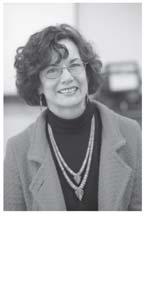
c o n f e r e n c e I n t h e 1 9 9 0 s , C a t h e r i n e w a s t h e f i r s t f e m a l e P r e s i d e n t o f I A T E F L L a t e r , i n w h a t m i g h t
b e c a l l e d a c r o s s o v e r , s h e s t ud i e d fo r a P h D a t t h e U n i v e r s i t y o f Ca m b r i d g e a n d b e g a n t e a c h i n g a n d
r e s e a r c h i n g i n a p p l i e d l i n g u i s t i c s S h e n o w l e c t ur e s a t t h e U n i v e r s i t y o f O x fo r d , a n d h e r l a t e s t
e n t e r p r i s e t h e r e i s a d i s t a n c e D i p l o m a i n T e a c h i n g E n g l i s h L a n g u a g e i n U n i v e r s i t y S e t t i n gs
C a t h e r i n e i s a m e m b e r o f t h e A d v i s o r y Co u n c i l o f I A T E F L a n d o f t h e W i d e r M e m b e r s h i p S c h e m e
A d v i s o r y Co m m i t t e e ; s h e i s a l s o t h e Ch a i r o f t h e B r i t i s h C o un c i l ’ s E n g l i s h L a n gu a g e A d v i s o r y
G r o u p , a n d a m e m b e r o f t h e B A A L / L A G B C o m m i t t e e o n L i n gu i s t i
Questionsabout teachinggrammar do notgo away. Shouldwe forget grammarandonlyteach vocabulary?Or should weteachgrammar,but only thegrammar learners need when they can’texpress themeanings they have in mind? Or should we plan our grammar teaching in advance? Should we promote learners’ noticingofgrammatical features,or just letithappen?Should weteach rules,or shouldwelet the learners figure themout? If we doteachrules, wherein thetaskcycle should we teach them?
This presentation will assess theevidencefordifferent points of view on these questions. It will also look at eachquestion in thelightof thedemands thatare made onteachers andlearnersin classrooms aroundthe world. Itwill suggestsome ways for teachers to think about the questionsand to look for answers that are adapted to their contexts.
Session 4.1: 1025-1055
1025-1055Session 4.1
Boardroom
20 audience
Talk LT, TTEd
Gresham
20 audience
Talk LA, LT
Paganini
300 audience
Talk GEN
Regency
120 audience
In a matterof months I developed from beinga primary schoolteacher to becoming an online trainer. Iwant to share this experience as many teachers and trainers are now moving from face-to-face to online learningand I would like to give some tips of how to make this move successfully.
Class blogs, Podomatic and Voicethread are examplesof Web 2.0tools that the presenters used intheirclasses innovatively. The sessionwill highlight the relationship between the particularuse ofthese tools and the motivation levelofthe students by looking at specific examples and the results of a survey. ie, a
This studysheds lighton how 3 indispensable components of the reflectiveprocess (i.e. reflection-on-action, reflection-for-action and reflection-in-action) tookplace among 8 pre-service Englishteachers.Blog-basedreflective entries and recorded lessons at different phases of their teaching were collected toidentify features, factors, and problems indeveloping reflectivity.Suggestionson how to uplift reflectivity are made to enhance teacher development.
Talk EAP, ESP A
Thistalk presentsthe design and implementation ofagenre-basedcourseinEAP deliveredonline by alarge universityinBrazil. It reports the identification process of specific genres, followed bythe implementation and exemplificationof the course. Finally, it addressessomechallenges, problemsand solutionsin thee-learning genrebased material planning and preparation for the specific targetaudience.
Tudor
70 audience
Talk MD, TTEd
Auditorium 2
600 audience
Talk TD
This presentationexplores the challengesthatOmaniteacher trainersface in designing in-service trainingmaterialsand how theyovercome thesechallenges byadopting different practical strategies. Basedon theexperiencesof Omani trainers working in the Ministry of Education, issues of perceptions, confidence, skills and strategies will be discussed and practical implications for designing training materials will be explored. e, ie, p, s, t, a
One-to-one teaching is an extremely popular way to learn a language, but there are few materials designedspecifically for one-to-one lessons. This presentationwillexplore fivedifferent ways ofadapting activitiesand lessons tosuit theneeds of yourindividual learner. It willoffersomepractical suggestions for varyingyour one-to-one lessons using ideas from LearningOne-to-One , CUP 2010.
e = experienced audience
ie = inexperienced audience
bkprom = promoting abook
p = primaryteaching s =secondary teaching
fp = focusingon published/commercialmaterial
pub = speaking onbehalf ofpublisher/examinationboard/commercial organisation
t= tertiary teaching a= adult teaching
Room 1 20 audience
Room 3
30 audience
Room 5
50 audience Talk TD
Session 4.1: 1025-1055
This studyinvestigated thephenomenon of foreign languageanxiety experienced by Indonesianstudents studying English inAustralia prior to their university studies.Using Foreign Language ClassroomAnxiety Scale(Horwitz et.al, 1986) the research identified the level of participants'anxiety. Italsodescribed the manifestationof anxiety and found out anxiety coping strategies used by participants.
To get a solid understandingof environmentalproblems, I havedevelopedananimal project based on theme and tasklanguageteaching(TTBLT). Byusing TTBLT,students can take initiatives in learning and explorethe lessonwith higher motivation to complete their tasks.The teachers can help students develop and weavetheir knowledge basedin the themethrough classroom activities.
The talk isbased on arecentstudy aimed to achieveabetter understanding of experienced teachers’knowledge,beliefsand practiceteaching advanced-level reading comprehension forpreparation classes of ahigh stakesEFL proficiency test. Implications for effective teacher education for teachers who need to preparestudents for a variety of EFL proficiency examinations administered worldwidewill be discussed.
Room 6
60 audience
Talk AL, RES C ul t ur a l i n t e l l i g e n c e a n d g r
The talk discussesTomasello'stheoryof mind(Tomasello1999, 2005) and the Cultural IntelligenceHypothesis (Molland Tomasello 2007; Hermann etal. 2007) as the underpinnings of form-focusedinstruction at the advancedlevelof foreignlanguage learning.The theoretical considerationswill be backedup by the resultsof research into formalinstruction on the semantics of the English time talk.
Room 8
50 audience
Talk ESP
Room 9
60 audience Talk ES(O)L, TD
Speaking fromher experience of teaching content-basedEnglishclasses tomultilingual students inEuropean higher education,the presenter suggests thatfollowing subject interest is a relatively natural way for learnersto bethemselves in English. She mentions current research on identity investment and then discusses apractical framework she uses for giving priority to capturing and sustaining content interest.
A CPD coursewas taughttoTeresina(Brazil) English teachers as an opportunityto improve theirlanguage skills and confidence as teachers of English writing.The presentationwill concern howparticipants engaged in the activities proposed, considering itsimpact in Englishwritingpedagogy, participants’ interestinbecoming betterwriters of English, andreflections about their practice and the course.
AL= Applied Linguistics
BE = Business English
EAP = English for AcademicPurposes
ES(O)L = English asa Second Language
ESP= English for Specific Purposes
GEN =General
GI =Global Issues
LA= Learner Autonomy
LAM= Leadership & Management
LT = Learning Technologies
LMCS= Literature, Media & Cultural Studies
MD = Materials Development
PRON = Pronunciation
RES = Research
TD = TeacherDevelopment
TTEd = Teacher Training& Education
TEA = Testing, Evaluation& Assessment
YLT= Young Learners & Teenagers
Session 4.1: 1025-1055
Room 10
50 audience
Workshop GEN
Room 11
20 audience
Talk MD
Room 14
30 audience
Talk GI
Room 15
60 audience
Talk
LAM, TD
The workshopconsists ofan activity that integrates the fourmacro skillsof language. Participantsdo a sectional reading thatchallengestheir predictiveskill.They willthen be guided to raise questions relevant to the topic, categorize themand research. Actual student outputs will be shared (reading, writing, speaking, listening integrated).
EFL students encounterproblems with reconciling the grammar they learn intextbooks and the more flexible rulesof‘real’ English they are exposed to outside the classroom.
Thistalk shedslight on the difficulties facing teachersin tackling thisproblem and proposes a novel approach ofaddressing those nuancesof languagethat may hinder the learning process in General English. a
)
Informed by criticalapproaches to English languageeducation, thispresentation aimsto describe interactional routinesunderlyingdifferent instructional stages in a year seven EFLclass in Turkeywith a particular emphasis on theworkings ofpower relations between theteacher and thestudents. The presentation explores participants’ rights and obligations as wellas the rules and norms governing classroom interaction.
Thistalk presents the interestingissues emerging outofthe cross-cultural interaction andcollaboration between theBritishCouncil, the IATEFLandthe ELTAI (India)in course of aChapter Leadership Development Project that ELTAI ran with the supportof theBritish Council and IATEFL. The implicationsfor organisational managementand cross-cultural communication for TAs are also discussed. e, ie, p, s,t, a
Skyline
90 audience
Talk
GI
Syndicate 1
200 audience
Talk LT
Syndicate 2
200 audience
Talk GEN
)
Aslearning is becoming heavily linked tousingtheinternet,plagiarism among students is becoming, not onlymorewidespread, butmoredifficult tocontrol. However, some students plagiarize more than others, while somenever intentionallyplagiarize at all. This studyexamines the possible relationship between students’ learning styles, their required assignment andtheir attitude towards plagiarism. e, a
Thispresentation refers to casestudy and survey researchconductedat theBritish CouncilJordanin2010. The findingsrelateto whether teachers are positiveabout electronicwhiteboardsand the reasons forthis.In addition, it discusseshow we can apply these findings and improve the integration of IWBs into ELT. e, a
This talkpresentsexamplesofusing large-scale corpora in ELTclasses anddiscusses thevalidity of the practice. The corporaBNC, COCA and ukWaC are employed ina number of classes at aJapanese university to investigate the proposition that corpora can facilitate discovery learning and,usedin combination with dictionaries, serve for acquiring confidence in writing English.
e = experienced audience
ie = inexperienced audience
bkprom = promoting abook
p = primaryteaching s =secondary teaching
fp = focusingon published/commercialmaterial
pub = speaking onbehalf ofpublisher/examinationboard/commercial organisation
t= tertiary teaching a= adult teaching
Syndicate 3
200 audience Talk AL, LMCS
Syndicate 4
200 audience Talk GEN
TBank
20 audience Talk
Session 4.1: 1025-1055
Session 4.2: 1125-1210
Story-tellingfires theimaginationand conveys meanings which can demonstrate one cultureand simultaneously illuminateanother. Kamishibai or story cardtheatre, engages the listenerina uniqueandcompelling ways and framescross-cultural activities: compareand share cultures,creativewriting, and teaching EFL. This talk will demonstratekamishibaiand discussthe applications inthe international classroom and EFL pedagogy.
Thepresenters will describe aCLIL training course forin-service Maths and Science teachers which aims toheighten understanding of how the management of routines in thecontent classroom can enhance languagelearning. Themajor focus is on strategies for integrating languagesupport withcontent-basedtasks, followed by classroom observation.
Theeffect of instruction on EFL teenage learners’development of pragmatic competencehasreceived limitedcoverageinacademic circles. In this presentation the conceptual frameworkof implicit and explicit instruction will be discussed.Thenthe findingsof a research study investigating the effect of explicit andimplicitinstruction on the pragmaticcompetenceof Turkish teenageEFL learners will be presented.
Boardroom
25 audience Talk
LA, LT
Gresham
70 audience
Talk
LT, TTEd
Personal Learning Environments constituteallthe resources, attitudes and knowledge that we bring to the learning process. Underlying them is an understanding that learning takes placein manydifferent ways,places and contexts. Inthisworkshopwe will explore the implications of PLEs for language learning and how we can help our students to build up their own PLEs.
A wikicangiveaboost in the educational community collaborativeefforts.In this presentation, participantswill have an overview of how a group of educators transformed the way theycollectivelyconstructed knowledge through anonline networkedspace tosharelessonplans andclassroom materials that has been successfully impacting onstudent engagement anda better lesson design. e, ie,
AL= Applied Linguistics
BE = Business English
EAP = English for AcademicPurposes
ES(O)L = English asa Second Language
ESP= English for Specific Purposes
GEN =General
GI =Global Issues
LA= Learner Autonomy
LAM= Leadership & Management
LT = Learning Technologies
LMCS= Literature, Media & Cultural Studies
MD = Materials Development
PRON = Pronunciation
RES = Research
TD = TeacherDevelopment
TTEd = Teacher Training& Education
TEA = Testing, Evaluation& Assessment
YLT= Young Learners & Teenagers
Session 4.2: 1125-1210
Paganini
300 audience
Talk
LT, MD
Regency
120 audience
Talk
LT
Tudor 70 audience
Talk ESP, MD
Auditorium 2
600 audience Workshop LAM, LT
Thistalk focuseson the growingemergenceof ebooks within ELT, and -througha demonstration of Macmillan’s own ebooks - explores the formats, devicesandflexibility thatthe ebookrevolution offers teachers andstudents.We’ll takea lookat a range of gadgets through which ELTcontentis increasingly beingoffered, asweaim to shatter that ‘generational thing’ illusion!
Do yourstudentsget enough speaking opportunitiesin class? Do they get individual feedbackand the chance to tryagain? How do you assess their speaking? And canthey practisespeaking outside class? Thesethings can bedifficult, so comeand find out about a new way of practising speaking which can help– NewEnglishFileOnlineSkills Practice
In this talk, based onthe presentation'A wish listfor ESPcoursedesign' Iattended at IATEFL Cardiffconference 2009, Iwill elaboratefurtherby adding my ESPexperiences and reflectionshaving in mindthe mainstreamELT approaches. In the ongoing’expert vs non expert teacher inESP’ debate I hope to prove it a self fulfilling prophecy. ie, a
This presentation will look at ways of adaptingcontent and methodologies between faceto-face, blended, and online trainingin project managementskills and at someof the challenges andresponsesIhavecomeup within the process. Theworkshop will beof usefor anyonedelivering online training, as well as anyone interested inthe subject of project management itself. e, a
Room 1
100 audience Workshop PRON I nt
If youare struggling to integratephonologyinto yourlessonsand wouldlike to bring yourtextbookto life, come and do somesimple activities whichhelp:sentencing and punctuation, raise awareness of phonemicscript, word stress, features of connected speechand last butnot least achoral karaoke to motivate and empoweryourstudents out in the real world.
Room 3
30
The present study discusseshow aMacau teacher engages in inquiry into her own experiences and explores how theseexperiences haveinformed her languageteaching. Inquiry into personallivedexperiences may becomeameansthrough which teachers actualize their ways ofknowingandsustain their professional developmentthroughout their careers.
e = experienced audience
ie = inexperienced audience
bkprom = promoting abook
p = primaryteaching s =secondary teaching
fp = focusingon published/commercialmaterial
pub = speaking onbehalf ofpublisher/examinationboard/commercial organisation
t= tertiary teaching a= adult teaching
Room 5
50 audience Talk
TTEd
Room 6
60 audience Talk
RES, YLT
Room 8
50 audience Talk TD
Room 9
60 audience Workshop LT
Room 10
50 audience Talk GEN
Session 4.2: 1125-1210
In this presentation,I sharethe journey of puttingthe new Delta Module2 assignment (PDA) into practicein our centre.First,I willexplain how we incorporatedthemodular Delta into our existingscheme andhowweplannedthePDA. ThenI will talkabout the four stagesand share some comments from the candidates andtutors.
Room 11
20 audience Talk BE
The trendtowards English bilingualeducation(EBE) remains strong despiteagrowing body of research questioning its rationaleandefficacy. The BritishCouncil has conducted a major study across five East Asian countries toinvestigate EBEpolicyand planning, rationalesand realities, and future directions.This challenging sessionwill discuss the findings, and present their subsequent practicalapplication in Indonesia.
This talk is the product ofseveral years of original classroom-based as wellas academic research into the field of strategic competence/communication strategies. Specifically, it asks thefollowing questions: (i) What strategiesdo speakersuse when theylack the means to expressan idea? (ii) Which strategiesare successful/unsuccessful? (iii) Is it possible to teach communication strategies?
Handheld electronicdictionariesdo not only offer different access ways to thedictionary entries butthey doalsocontain various vocabulary learningaids. The questiontobe investedintois whether those aids really meetthe learners' needsaccording to the latest insights into language acquisitiontheory. Besides, lexicographical aspects will be considered, too.
Over recent years therehasbeen an (admirable) movement awayfrom the 'native speaker' as a paradigmof the language.InthistalkI will discuss andillustratesome concerns I have that ideas of natural acquisition, collocation and 'probable'language and even ELF ideas of 'acceptable variants' on 'correct' languagemay be native-speakerism bythe back door...
Thistalk presentsa rationale adoptedwhen designingcourses to meetthe demands of adult professional learners,whoseneeds and profilewill be detailedin the session. Also practical aspects related totheimplementationofa business conversation coursewill be presented aiming at demonstratinghow thechallenges in addressingthis specific group of learners have been successfully met. a
AL= Applied Linguistics
BE = Business English
EAP = English for AcademicPurposes
ES(O)L = English asa Second Language
ESP= English for Specific Purposes
GEN =General
GI =Global Issues
LA= Learner Autonomy
LAM= Leadership & Management
LT = Learning Technologies
LMCS= Literature, Media & Cultural Studies
MD = Materials Development
PRON = Pronunciation
RES = Research
TD = TeacherDevelopment
TTEd = Teacher Training& Education
TEA = Testing, Evaluation& Assessment
YLT= Young Learners & Teenagers
Session 4.2: 1125-1210
Room 14
30 audience
Talk
TTEd, YLT
Room 15
60 audience
Workshop
BE
Syndicate 1
200 audience
Talk LA
Syndicate 2
200 audience
Talk LT, MD
Syndicate 3
200 audience
Workshop EAP
Korea isat a crossroads inthe development of primary schoolteachers of English. With a plethora oflearning opportunities available for both teachers andlearners, is the government’s ambition thatall schoolteachers teach English using English getting watereddown?Drawing on hundreds of stakeholders’voices,"dos and don'ts" for primary school teacher training willbe shared.
The aim ofthis session is to explore somepossibilities for language teaching through drama and drama methodology. Using both scripts and improvisation, Shakespeare and Stanislavski andI want to demonstatehowtoapply sometheatricalideas to create stimulating, dynamic and interactive lessons, for fluency, lexis and presentation skills. ie, a
Developed byClaireSelby tobring structure toa rangeof children's ELT programmes, the Spiral Language Systemdraws on a decade ofresearchto bring you an effective,fun methodology you can start using today. Thisworkshop will provide the explanations, examples and practicalactivities youneed to help yourclasses learn andremember English more effectively. e, ie, p bkprom, fp, pub
Input/output comprehension is purely receptive. Learners examinetexts,then recall and reproducethe content. This session suggests learners shouldenter andinteractwith the textto createtheirpersonal understandingand finally,take possession andbe enriched by the ideas. We examine practicalactivities to achieve this in the classroom. e, p, s
The world is changing,and with itpeople’slearning behaviour isevolving. Collaboration in and beyond the classroom is now recognised as a valid mechanism forknowledge and skills development, and Serious Gaming is joining the learning spectrum. Jointhis session for an overview of new and emerging learning opportunities. pub
Thisworkshopwill showhow studyingproofreading anderror correction can highlight persistent errorsin student writing andassistEAPprogrammedevelopment at class and syllabus level. There will be an analysis of how this data can address student needs and make teaching morestudent-focused.Participants will analyse students’ writing and discuss relatedteaching activities.
Syndicate 4
200 audience
Workshop LT
This presentation will focusonthe methodologicalapproachwhich CambridgeESOLhas adopted towards the development of blended learning courses acrossarange of different products.We will demonstrate how someof the key concepts ofblended learning are reflected in the range of different courses that CambridgeESOL offers.
e = experienced audience
ie = inexperienced audience
bkprom = promoting abook
p = primaryteaching s =secondary teaching
fp = focusingon published/commercialmaterial
pub = speaking onbehalf ofpublisher/examinationboard/commercial organisation
t= tertiary teaching a= adult teaching
TBank 20 audience Workshop GEN
Session 4.2: 1125-1210 Session 4.3: 1225-1310
Bothlearning and teachingforeignlanguages can at timesbe difficult and frustrating.If we put into teaching humour and playfulness it can become arewarding, joyful process for everyone involved.Use as manyjokes,songs and games as you can and youwillturn hardwork into pleasure and learning into playing. e, a
Boardroom 25 audience Workshop LT M
Come andseehow easy-to-usefreeware suchasAudacitycan be used to encourage studentsto practise stresspatternsandspeaking skills in a funandnon-threatening way.Basedupon my ownexperiencesusing thisfreeware, I hope to give somehands-on help, andencourage teachersto think of ways theycan incorporatethesetools into their own classrooms. ie, a
Gresham
70 audience
Talk EAP
Paganini
300 audience
Talk
LT, YLT
Thisisamuch-needed new tool for administrators of EAPcourses. Currentplacement tests focus on GeneralEnglishskills and vocabulary rather than EAP. They requirea lot of manual marking to achieve reliability. Finally,they arenoteffective at discriminating overa wide range of levels. The i-Testfrom Garnet Education deals with all these issues. e, a fp, pub
m Animal l Explorers
Regency
120 audience
Talk EAP, YLT
Tudor 30 audience
Workshop LT
S u s a n H
Animal Explorers is adynamic, new interactiveresource foruse in theyoung learner classroomwithan interactive whiteboard or projector. Supportingandextendingtopicbased work,it contains ahost of interactiveactivities, stories,videos andwebprojects. This presentationuses AnimalExplorers to discuss creative ways toincorporate online material andproject-work in theclassroom.
M
( L 2 )
How can vocabulary learning be made more effective? WORDREADY (www.L2.co.uk)is an innovativeapproachto vocabulary thatapplies sound pedagogy and new technologies. The result isa personalised interactive learning experience thatdelivers clear learning gains. The design principleswillbe explainedanddemonstrated, and participants shown real-world examples of how WORDREADYis making a real difference tolearners.
e, ie, p, s bkprom, fp, pub
e, ie, p, s, t, a bkprom, fp, pub
In this workshop wewilllookata rangeofE-tivities that the British Council in Istanbul has used tobuild arange of successfulonlinenetworks forteachers through courses, SharePointand social networking sites such as Facebook.Participantswill also havethe opportunityto assess a variety of E-tivities for use in their own contexts. ie, a
AL= Applied Linguistics
BE = Business English
EAP = English for AcademicPurposes
ES(O)L = English asa Second Language
ESP= English for Specific Purposes
GEN =General
GI =Global Issues
LA= Learner Autonomy
LAM= Leadership & Management
LT = Learning Technologies
LMCS= Literature, Media & Cultural Studies
MD = Materials Development
PRON = Pronunciation
RES = Research
TD = TeacherDevelopment
TTEd = Teacher Training& Education
TEA = Testing, Evaluation& Assessment
YLT= Young Learners & Teenagers
Session 4.3: 1225-1310
Auditorium 2
1 2 2 5 - 1 2 5 5
600 audience
Talk
LT, RES
Room 1
100 audience
Workshop
TEA
Room 3
50 audience
Talk
LT, MD
Room 5
30 audience Workshop EAP
The presentation focusesonusing mobilephones andother portable devices for English learning inhigher educational institutionsof Russia.Ithasa dual aim: toshowthe advantages ofmobile technologies over traditionalonesand todiscuss their potential forfurtherdevelopment. Examples of mobileteachingstrategies and possible students’ activities areprovided.
Thepresenters will outlinereasons forhaving a standardspeaking rubricforclassroom use and will discuss different types and effective use of rubrics. The presenters will then demonstratehow todevelop rubrics for speaking in fiveeasy steps. Participantswill leave the session equipped with thetools needed to develop their own rubrics ie,
Thistalk looks at challenges that teachers can facewhendealingwithcopyrightissues in our internet-enabled information age. Itfurther proposes waysout of the intellectual propertyquagmire withthe use of Creative Commons licences and exploreshowthe internet can be a very effective tool forfinding and sharing free educationalresources. ie, a
Manyinternational students atUK universities are extremely anxiousabout their levelof English and, in particular,their ability to write academically.This workshop looks at how the roles of talk, feedbackandtechnology have beencombined to create and to deliver an effective and popularcourse ofacademic writing thathas helped hundreds of students since 2006.
Room 6
30 audience Workshop GEN
Room 8
50 audience
Talk ESP, LT
Room 9
60 audience
Talk
TTEd
A healthygroup makes forhappier andmoresuccessful learners; but howcanteachers encourage and foster good group dynamics? Come along andgain abetter understanding ofgroup dynamics, and trya selection of activities for newgroups and established groups. For teachers of adult learners, in any context. e, ie, a
How do youcreate a senseofcommunity andprovide expertknowledge to yourESP studentsusing thewonders of Web 2.0? Wewill demonstrate activities andideaswe used with theology undergraduates studying English for Religious Purposes in Cairo, motivating them toget blogging,use forums andgenerally interact with peers and teachers using the Ningsocialnetworking platform. e, ie, a
Using ethnographic notes canprovide more objectivity for the observation process. This research looks at how ethnographic notes were used systematicallyto record classroom observations for thepurposesof teacherevaluation,teacher development and in-depth feedbackof observations. Finally, documented reflection of theobservers’stances changedthrough timewith the use of ethnographicnotes.
e = experienced audience
ie = inexperienced audience
bkprom = promoting abook
p = primaryteaching s =secondary teaching
fp = focusingon published/commercialmaterial
pub = speaking onbehalf ofpublisher/examinationboard/commercial organisation
t= tertiary teaching
adult teaching
Room 10
50 audience Talk EAP
Room 11
20 audience Workshop ES(O)L
Room 14
30 audience Talk GEN
Room 15
60 audience
TD
Skyline 90 audience Talk TTEd
Syndicate 1 200 audience
Talk EAP, TEA
Session 4.3: 1225-1310
Working with students individually is akeyelement in many EAP courses. This presentationdemonstratesthatprogresscan be made not only in writingskills per se, but also promote a more independent approach to languageand learning. The impact of feedback andfocussedtutorial timewill beexemplified throughsamples ofstudents’ work andexcerpts from feedback tutorials.
Howdo youradult students feel when toldto 'play games' inthe EFLclassroom? Object or see the objective? Come alongandjoinin the funtoseehow studentsfeel whenwe ask them to be playful in the classroom. Theaim ofthis workshopis to showthe valueof learning through play.
Traditionally, course books andteachersfocus onwhat toteach and howtoteach it;the restis up to the learner. Recording theinput isoften ignored. Visual Grammarexamines how to represent the concepts of grammar visually, making the ideas clearer and more memorable, andeasier to record and retrieve. e, a
How can lack of confidence affect teachereffectiveness? How often do teachers find themselvessecond guessingtheirteaching methods? How can directorsof studies and teacher trainers help? What partdoesfeedback play? Finally, isexperiencethekey factor to being confident? Let’s find the answers together in a lively presentation.
Learningoutside the classroom can bebeneficial and motivational. Basedon consultations with30 international languageinstructors,the talk describesand demonstratesways thatstudents can learnEnglish through varied,innovativetasks in different environments.For bothnon-English speaking countries and English-speaking countries,these ideas willprove inspirational,effective, practical and fun. Students, instructors and budget managers will love them!
Can IELTS results be relied upon to predictlanguage behaviour in an academic setting? Is thereany significant relationship between IELTS results and subsequent academic performance? What other predictivefactorsareat play? To what extent does IELTS' predictive validity vary across levels and subject fields? This talk reviews existing research evidence andoffers some answers (and further questions).
AL= Applied Linguistics
BE = Business English
EAP = English for AcademicPurposes
ES(O)L = English asa Second Language
ESP= English for Specific Purposes
GEN =General
GI =Global Issues
LA= Learner Autonomy
LAM= Leadership & Management
LT = Learning Technologies
LMCS= Literature, Media & Cultural Studies
MD = Materials Development
PRON = Pronunciation
RES = Research
TD = TeacherDevelopment
TTEd = Teacher Training& Education
TEA = Testing, Evaluation& Assessment
YLT= Young Learners & Teenagers
Session 4.3: 1225-1310
Syndicate 2
200 audience
Workshop
LMCS, YLT
Syndicate 3
200 audience
Talk EAP, LA
Syndicate 4
200 audience
Talk LT, MD
TBank 20 audience Workshop TTEd
Not everyone wantsto readonlystories. With OxfordReadand Discover learnerswillbe thrilledby amazing facts and fascinating information.This session will consider how carefullygradednon-fiction can motivate learners to read. CLILteachers will discover howthis content-rich series encourages critical thinkinganddevelops language skills, and we will try out some practical classroom activities.
Supposing students asked you:which leading online newspaper uses thecollocation turnablindeyein relation toclimate changethe most, what wouldyouranswer be? This talk tells youwhereto download free websearching softwareproviding an instant answer andpresents arelated volume, Web-based Concordancing and Annotation, describing websearch activities learners of any age willenjoy.
This talk will offer practical suggestions forkeeping lessonsflowingif the internet goes down or other technologyfailsin the classroom. Iwill demonstrate some quick fixesfor common equipment problems,and look at examples of user friendlytools that can be used to create standalone activities for backupwhen technology based lessonsdon't turn out as planned.
Hands-on introduction toCelestin Freinet’smodel of teacher-driven professional development,whichfocuses on a teamapproach tomaterials development. Brief overview ofthemodel, followed byextendedjigsaw discussion of key Freinet recommendationsin light of participants’ ownprofessional-development ideals and experience. Collaborative production of a best-practices statement for effective teacher professional development.
e = experienced audience
ie = inexperienced audience
bkprom = promoting abook
p = primaryteaching s =secondary teaching t= tertiary teaching a= adult teaching
fp = focusingon published/commercialmaterial
pub = speaking onbehalf ofpublisher/examinationboard/commercial organisation
Final plenary & closing : 1320-1500 IATEFL conference farewell : 1500
1200Registration and the exhibition close
1320-1420Final plenary session
Auditorium 2 (640 audience)
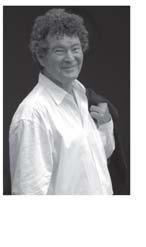
i s t h e e d i t o r o f The e Puffin n Book k of f Modern n Children ' s Verse. . H i s o
t h e h i g h l y p o p u l a r c o l l e c t i o n s Gargling g With h Jelly, , Thawing g Frozen n Frogs a n d Juggling g With
Gerbils H i s m o s t r e c e n t a d u l t c o l l e c t i o n s a r e Selected d Poems ( P e n g u i n , 2 0 0 9 ) a n d Collected d Love
Poems ( H a r p e r P e r e n n i a l ) H a w t h o r n P r e s s h a s j u s t r e l e a s e d B r i a n ’ s s u p e r b r e t e l l i n g o f t h e
A m e r i c a n I n d i a n f o l k t a l e , Jumping g Mouse i n t h e i r H a w t h o r n C h il d r e n ' s C l a s s i c s H e h a s w o n
n u m e r o u s a w a r d s , i n c l u d i n g T h e C h o l m o n d e l e y A w a r d f o r P o e t r y , a n d a s p e c i a l a w a r d f r o m t h e
M y s t e r y W r i t e r s o f A m e r i c a G u i l d f o r h i s C h i l d r
Juggling with gerbils – poetry off the page
One ofthe UK’s finestpoets performs new work along with humorouspoems fromhishugelypopular children’s books Gargling withJelly and Juggling withGerbils – both used extensively in class. Brian also suggests livelyways of usingcontemporarypoetry to explore the richnessof the English language. Brian has performed hiswork anddelightedstudents in places as diverseas The IslamicStudents Union in Khartoum and schools in Mumbai, as well as a hostof European venues.
1420-1500Closing
Auditorium 2 (640 audience)
Eric Baber, President of IATEFL, will make a closing address.
There will be a freerafflefor attendees of the final plenary and closing. The wonderful prize of an iPadis kindly sponsored by CambridgeUniversity Press.
1500IATEFL
SkylineThe conference ends with a complimentary snack in Skyline as wesay farewelltoyou. We thankthe local organisations for their sponsorship (listed on page 25).
TUESDAY
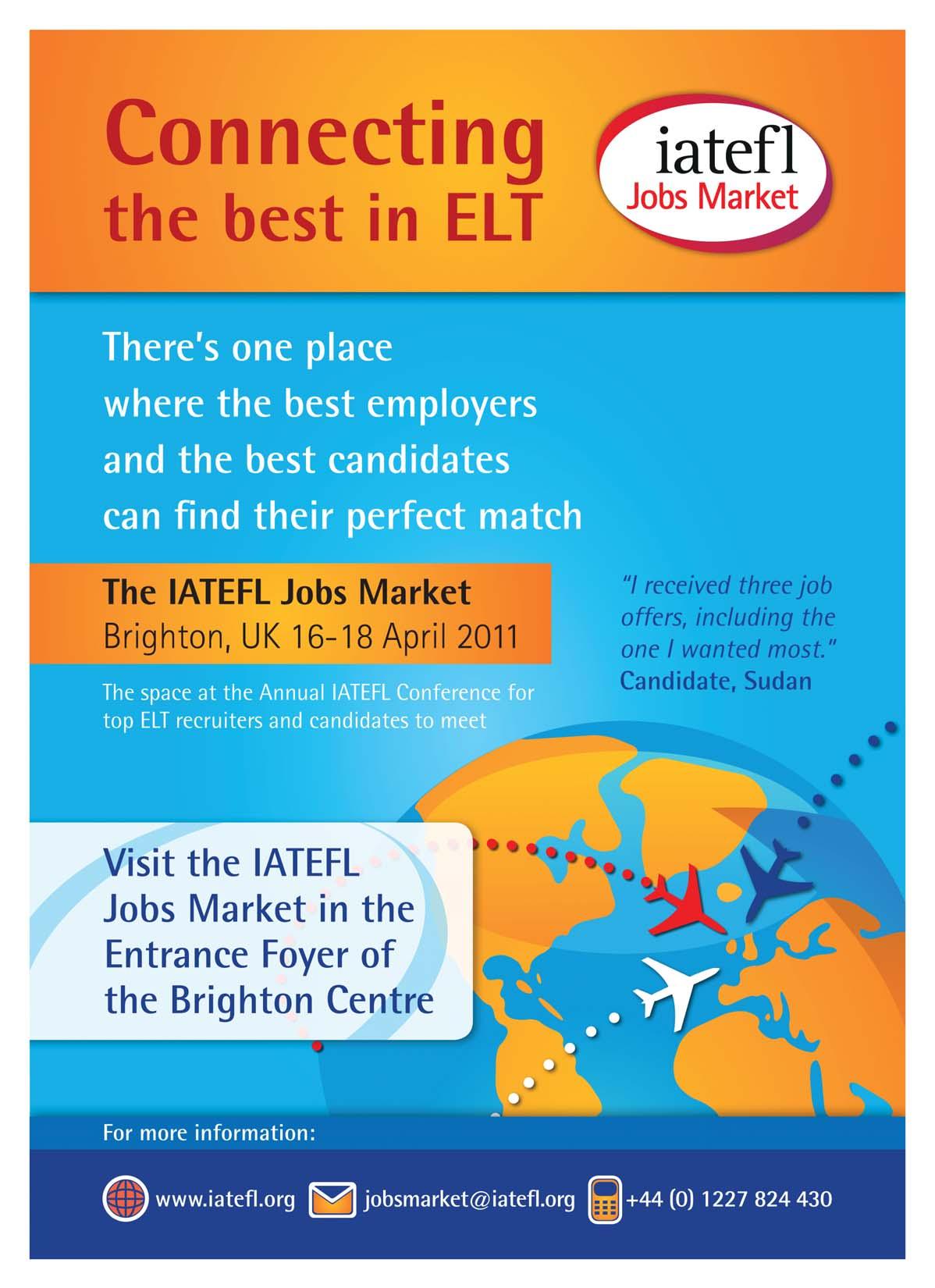
A P P L I EDDL I N G U I S T I C S
Thereis(no)needforthat!1.3
Understandinglanguageattitudesthroughacollaborative internetdictionary1.5
Themodeloflanguagelearninganxiety1.6
InternationalEnglishteachers'perceptionsofEnglishas aninternationallanguage2.1
EnglishasaninternationallanguageinanFLmedical context2.1
Spellingischaotic:whatfactsliebehindthispopular judgment?2.2
TheimportanceofgamesintheEFLclass2.3
Let’sGO:enhancinglexicalacquisitionusingmindmaps (graphicorganisers)2.4
Developinglower-levelprocessingskillsinEnglishL2 reading2.5
Taiwaneseuniversitystudents'motivationforstudying English2.5
CollinsCOBUILDEnglishGrammar:andIwas,like,wow!3.1
NegotiatingpostmethodchallengesintoBangladesh3.3
Howdoes‘theory’helplanguageteachers?3.6
Experiencedvs.noviceteachers’useofpreemptivefocus onform3.6
Culturalintelligenceandgrammarpedagogy4.1
TraditionalJapaneseKamishibaistorytellingforcrossculturalandEFLlearning4.1
B U S I N E S S SE N G L I S H
WhatEFLteachersshouldknowaboutintercultural competence1.1
MakinguseofProfessionalEnglishOnline1.1
Turningacademicskillsintotransferableandsoft employmentskills1.7
Teachingreaderperspectiveinbusinesswriting2.1
Doingbusinesswithaspokencorpus:grammarinaction2.2
Thepowerofpresentation2.3
HowdoyoumakeyourstudentsTHINK?2.4
ThemanyrolesweperformasbusinessEnglishtrainers2.5
CommunicatinginternationallyinEnglish2.6
NeedsanalysisandESPinaninterconnectedglobal environment3.4
Meetingchallengesincoursedesignforadult professionallearners4.2
Dramamethodologyandlanguagelearning4.2
E N G L I S H HF O R RA C A D E M I C CP U R P O S E S
Criticalthinking:whattheheck?1.1
Practisingthegrammarofacademicwriting1.1
ThesecretdiaryofanEAPteacher1.2
TeachingIELTS:asurvivor’stoolkit1.2
A(critical)friendorafoe?Criticalthinkingandfeedback1.2
ExtensivereadinginanEFLuniversitycontext1.2
Themissinglink:addingscholarshiptouniversity preparationcourses1.3
Plagiarism:amoretolerantoutlook1.3
TeamteachingandinterdisciplinarycollaborationinEAP andESP1.3
EFLteachers'beliefsandpracticesofreadingstrategies1.3 Startingstudyskillsearly–anintegratedapproach1.4
WhatIknowthatyouknow:howinferenceaffectswriting1.4 Respondingtowriting:matches/mismatchesbetween teachers'beliefsandfeedbackpractice1.4 Adeeperinquiryintostudents'mindsat'whilereading' stage1.5
Peerwritingworkshops:students’attitudesand perceptions1.5
AnactionresearchplantoteachmedicalEnglish terminology1.6 ChallengesofteachingESPinaculturally-diverse Zimbabweantertiarycommunity1.6
Researchingtogether:exploringundergraduatestudents’ experiencesasnoviceresearchers1.6 Anattainablemodel:pointingthewayforwardusing learnertexts1.6 BritishCouncil'RoadtoIELTS':improvingstudents' writingskills1.7 IWBscanreallyenhanceIELTSteaching1.7 Developingagrammartextbook:fromtheorytopractice2.1 Theeffectoflanguageofnote-takingandtaskcompletion2.1 Makingacademicwritingachallenging,pleasantlearning experience2.1 Theimpactofdirectlyteachingvocabularyonvocabulary learning2.3 Doingtheproduct:anexperientialtask-basedapproachto inspirelearners2.4 HelpingyoungerstudentswithIELTS2.4 SwapshoponcriticalreadingactivitiesforEAPstudents2.4 Principlesofacademicwriting2.4 TheMultipleIntelligencesentrypointsapproachforany EAP/ESPclass2.4 Negotiatedidentityandacademicwriting2.5 ChallengingtheEAPchallengeintheDemocratic RepublicofCongo2.5 Theeffectofvocabularynotebooksonvocabulary acquisition2.5 Art,tutorsandacademictussles2.6 EAPgrammar:movingfromtensefocustosyntaxfocus2.6 WherenextforEAP?2.7 Whataccountsfordifficultydifferencesinreadingtest questions?2.7 Generatingteachingmaterialsfromvideo-recorded presentations2.7 Writingatpostgraduatelevel:buildingconfidenceand developingvoice3.1 Agenre-basedcourseinEAP:anonlineexperience4.1 UsingproofreadinganderrorcorrectiontoinformEAP teaching4.2 Thei-test4.3 Vocabularylearning:wherethefuturelies4.3 Talk,technologyandfeedback–creatingtheconditions forwriting4.3 Maketimefortutorials4.3 IELTS:powertopredictacademicandlanguage performance4.3 ClimatechangewebsearchinginELTweb-based classroomsandbeyond4.3
TeamteachingandinterdisciplinarycollaborationinEAP andESP1.3 Businessandengineeringcommunicationsimulations usingauthenticonlinematerials1.5 AnactionresearchplantoteachmedicalEnglish terminology1.6 ChallengesofteachingESPinaculturally-diverse Zimbabweantertiarycommunity1.6 EnglishasaninternationallanguageinanFLmedical context2.1 Englishfortheworkplace:acourseforIThelpdesk operators2.1 EnvironmentallyinducedchallengesaffectingEnglish languageteachersinNigeria2.1 Mudmenandmonkeyboards:copingwithspecialist contentinESP2.2 Transitionpoints:supportingteachersthrougha developmentaljourney2.3 AssessingEnglishforaccounting2.3 TheMultipleIntelligencesentrypointsapproachforany EAP/ESPclass2.4 Howaboutthemteachingus?2.5
ChallengingtheEAPchallengeintheDemocratic RepublicofCongo2.5
Teachthemgrammar!:thechallengefortheNigerianESP teacher2.5
Art,tutorsandacademictussles2.6
SpeakinganxietyofstudentsofmedicineinEnglish languageclasses2.7
Usingaperformance-basedmodelwithinternationallyeducatedhealthprofessionals2.7
Writingatpostgraduatelevel:buildingconfidenceand developingvoice3.1
TeachingEnglishtoCubanhealthtechnologylearners: challengesanddilemmas3.2
HasyourapproachtoEAPcoursedesignchanged?3.2
NeedsanalysisandESPinaninterconnectedglobal environment3.4
Bridgingauniversitylecturer’slinguisticandaffective gaps3.5
Coursesondemand:acoursedesignedforBrazilianstate schools3.6
ImplementingMultipleIntelligencesmodelinlarge EnglishforWorkclasses3.7
Agenre-basedcourseinEAP:anonlineexperience4.1
Contentinterestasidentityinvestment4.1
Somethingborrowed,somethingnew-ESPwishlist revisited4.2
MakingsocialnetworkingworkforyouandyourESP students4.3
E S ( O ) L
ESOLandmaths-twoplustwoequalsfive?1.1
Reassessingtheprinciplesofteachingreading1.2
Languagematters:buildingbridges,mendingfences-a communityproject1.4
Integratingfunspellingintoeverydaypractice1.5
Learningasecondlanguagewhenyourfirstisastruggle1.6
Literacy,multilingualismandintercultural&citizenship educationincontext1.7
AcquisitionofidiomaticEnglishbynon-nativelearnersof English2.1
BecominganEnglishteacher:'anewself'inthemaking?2.1
RealbenchmarkresponsesfortheTOEIC®Speakingand WritingTests2.2
Gettinguptospeedinreading2.3 Let’sGO:enhancinglexicalacquisitionusingmindmaps (graphicorganisers)2.4 ‘Doinggeography’:integratingcontent,languageand criticalthinking2.6
NotjustaQandAsession:oralassessmentsrevisited3.2 Full-bodyspellingworkout3.5 Ideasforimprovingstudents'writingskills-my experience3.6 WritingasameanstoenhancecreativityinEnglish teaching4.1
Playfullearning.Learnerobjectiveorlearnerobjection?4.3
G E N E R A L
Storytellingtocelebrateculturaldiversity1.1 Selectingnewsarticles.Whatteacherscanlearnfrom newspapereditors1.1 Unleashingthepowerofimages1.1 PlantingseedsofconfidenceinELT1.1 PromotingproofreadingwithNotebooksoftwareandtext images1.1
Storiesaboutme-theteacher1.1 Wherereadingandgrammarmeet1.2 Communicatingglobally:challengesandsolutionsfor languagelearnersinMexico1.2
Voice,music,silence1.2
Astudyontheuseofsituation-boundutterances1.3
Textsandcontexts:wherereadingcantakeus1.4 Thereismoretodictionaryusethanlookingupwords1.4 “Arousal”intheESLclassroom1.4 Makingsenseoflexis:presentingreallanguageathigher levels1.4
Teachers’beliefsaboutEFLgrammarlearningand teaching1.5
Howwelldoyouknowyourstudents?1.5 WouldteachingEnglishbedifficultorchallengingtoyou?1.6 CookingupCLIL,withoutakitchen1.6 Usingthe'innerworkbench'toenrichteachingand learning1.7 Thepowerofprops1.7 CLILatsecondarylevel:principlesandpractice2.1 Cansystemicfunctionalgrammarresolvethosemyths pedagogicgrammarperpetuates?2.2 Questionsofidentity2.2 Classroom,comedy-sketchperformanceforstress, intonation,timingandcontext2.3 Memories2.3 Wealllearnfromourmistakes(ordowe?)2.3 Whatworksandwhy-Evidence-basedteachinginCLIL2.4 "Ifit'snotfun,you'renotdoingitright!"2.5 Differentiatedinstructions:onesizedoesnotfitall!2.6 ApproachingsettextsintheCambridgeEnglish: Advancedclassroom2.7 Practicalactivitiestopromotecriticalthinking2.7 Ifapicturepaintsathousandwords...oursortheirs?3.1 Argumentationskillsdevelopmentasthekeytoacademic English3.1 Hyperlinkheroin:thenewscienceandskillsofreading3.1 Informalmentoringinateacher’sprofessional development:amentee’sview3.1 Englishforgenderequalityinclassrooms3.1 Thepowerofone-on-oneconferences:the'what'and 'how'3.1 Don’tgiveuponidiomsandphrasalverbs!3.1 LanguageandtheCLILteacher3.1 Aguidetoadaptableteaching3.2 Fosteringacultureoflisteninginthelanguageclassroom3.2 'Itwaswonderful,wonderful!'-Teachersuccess,teacher beliefs3.2 CLIL–Developingspeakingincontent3.2 e-EnglishforTeachers:acasestudyinLatinAmerica3.3 Practisingspokengrammar3.3 Teachingchildren:acollaborativetrainingapproachfor teachers3.3 Thesearchforaprofessionaldevelopmentframeworkin thestate3.3 Usingenergizerstoincreasestudentparticipation3.3 Students’perceptionsofgoodlanguagelearners3.3 Learners’strategicuseofanonlinecommunityforIELTS preparation3.3 StudentapproachestolearningEFL:teachertrainingand learnertraining3.3 Englishthroughart:exploringthepotentialofartinEFL3.4 Whatmotivatesourlearners?3.4 AlookatprospectiveELTteachers'journeys:motivations andfrustrations3.4 Creatingaudienceforstudents'writing3.4 Developinglearnerautonomythroughnewcurriculum reforminUzbekistan3.4 CLIL:whatbenefits,whobenefits?3.4 Funandtime-efficientactivitiesforFCEandCAE3.4 Theperfectblend!Professionaldevelopmentthrough TDI:TheBlendedCourse3.5
Helpinglearnerswithspontaneousexamples3.5
Developingclassroommanagementskillsinthe cooperativelanguagelearningclassroom3.3 Mutualityincollaborationunpacked:Ministryof
Workingacrosscultures-issuesinmanagingateacher's
Creativity:justanotherfaddishbuzzwordoraparadigm
change?
Englishandsport-Twogloballanguages3.7
Politeness:morethanjustpleaseandthankyou3.7
how gets: it as good As
G L O B A L I S S U E S
Investigatinglargeclasses:arewemakingprogress?1.1 Accentandidentity:prejudiceandinsecurity1.2
Helpingstudentstoapproachauthenticnewsmaterials1.6
Plagiarismbetweenperceptionandpractice2.1
Arelearningculturesmutuallyexclusive,ornegotiable?2.1
Becoming anEnglishteacher:'anewself'inthemaking?2.1 LanguagepracticeideasforBESteachersinnon-English
Puttingthe‘young’andthe‘adult’intoyoungadultsELT3.2
Onlinetrainingforprojectmanagement-activities,
methodology,
‘Loandbehold,freebeedogsbody!’Mobilelearningand 1 1 ELT
A(critical)friendorafoe?Criticalthinkingandfeedback1.2
Ethicalconcernsinpractisingandresearchinglanguage 3 1 counselling
Improvingreadingcomprehensionandfrequencythrough 3 1 subtitles television and film
Isthereaninnergameofforeignlanguagelearning?1.4 Learnerautonomyinquestion:effectsoftheEuropean 5 1 Portfolio Language
Helpingstudentstoapproachauthenticnewsmaterials1.6 Anattainablemodel:pointingthewayforwardusing 6 1 texts learner
Learninglessons:implementing theautonomyapproach1.7 Turningacademicskillsintotransferableandsoft
skills employment
Lifelong,lifewideandlifedeeplearningandthe
learner language autonomous Technologyintheconnectedclassroom2.2 Facilitatinglanguagelearningthroughlearnertraining2.3 Usingthecorpusforclassroomactivitiesbasedonreal
language
us? teaching them about How Autonomyinlanguageeducation:thestruggleagainst
misrepresentation and ideology
SuccessfulSelfAccessCentres–Improvinglearner
autonomy
Sixstepstomaking youngerlearnersmoreautonomous3.1 Exploringnew normalities in FLclassrooms:intercultural
Plagiarism:agameofwitsorawayoflearning?4.1
Developing
distance at – teachers
Developingeffectiveleadershipskillsandstrategies1.4 Performancemanagementandappraisalforteachers1.5 HowtogetvaluefromITduringaneconomicdownturn1.6 ChangemanagementinELT:exploringpractical
theory of applications
Teamleadership:teachersandteamcultureinELT2.3
learning language
BringinglifetoEFLclassesbyWeb2.0tools4.1 Helpingourstudentstodeveloptheirpersonallearning
environments
recording voice of value The ‘Loandbehold,freebeedogsbody!’Mobilelearningand
ELT
Web 2.0toolsfor IELTSspeaking andwritingsuccess1.1 Languagetogo:dictionariesinamobileworld1.2 Goingdigital:anintroductionto English360forteachers 2 1 schools and
1 easy made recordings audio Authentic
Identitycrisis:managingonlinereputation1.2
Sharingstories:motivatingyounglearnersthrough 1.2 storytelling digital mobile
Digitalstories:thebestoflearningtechnologiesin
training teacher
Lessonslearnedfromusingaclasswiki1.2
Thebenefitofusingonlineportfoliosinawritingcourse1.3
Integratingasynchronouswritingandspeakingtoolsfor EFLlearningoptimisation1.3
Teensandout-of-classroomlearning:thefinalfrontier1.3
Blogsinaction:Reflectionsfromacollaborativeblogging experience1.4
LearningEnglishthroughDigitalPlay1.4
AVALONlanguagelearninginSecondLife1.4 Autonomyonthemove1.5
Ontrack-ensuringlearnersdon’tfallthroughthenet1.5 EFLclassroominteraction:who’sincharge?Teacher, learner,orIWB?1.5
Fromideatoreality-Usingtechnologytoengage students1.6
HowtogetvaluefromITduringaneconomicdownturn1.6 Investigatingstudents’attitudeandmotivationinan onlinedistancecourse1.6
Anapproachtovideoannotationfororalskillsfeedback1.7 Digitisingyourcoursebookmaterials1.7
UsingYouTube:techniquesforusingonlinevideointhe classroom1.7
Wordrecycle:integratingEnglishlanguagelearningwith thebloggingworld2.1
MeaningfulEnglishthroughmultimediaprojects2.2 Technologyintheconnectedclassroom2.2 Expandthehorizonoflearning:digitalgamesbydigital learners2.2
Digitalgame-basedtasks2.3 UsingMoodlefortesting2.3
Handheldlearning:deliveringtrainingandlanguage practicethroughmobilephones2.3 10yearsofonestopenglish:essentialtips,tricksand lessonideas2.4
CooperativelearningandSMARTBoard-Theperfect match2.4
TeachingidiomseffectivelywithWeb2.0tools2.6 GotIT?Thefutureofe-learninginELT2.6 EFLfutorology-ThefutureoftechnologyandEFL teaching2.6
Lessonsinblendedlearning:acasestudyfromMunich2.6 Fitforreallanguageexperiencethroughvirtualworld learningjourney2.7 DIYdevelopment2.7 Usingaperformance-basedmodelwithinternationallyeducatedhealthprofessionals2.7 IntegratingWeb2.0tothecurriculaofuniversity preparatoryschools3.1 Location,location,location:mLearninginpractice3.2 TeachingEnglishlanguagethrougheLearning/learning technologies3.3 CULTWEEPLE:enhancinginteractionandcollaboration amongEFLlearners3.4 Trainingteacherstouselearningtechnologies3.4 UsageandimplementationofvideosinELT-Practical insights3.4 Ablogfortrainingteacherstointegratevideosinclass3.5 m-learninginTESOL:howfarisitfeasibleinIndia?3.5 Isagoodf2ftrainerautomaticallyagoodonlineone?3.5 Dosmartphonesmeansmartlearners?Mobile&English languagelearning3.6 Frompapertopaperless-Teachereducationintransition3.7 Fromteachertoonlinetrainer–apersonaljourney4.1 BringinglifetoEFLclassesbyWeb2.0tools4.1 Teacherperceptionsofelectronicwhiteboardswithadult learners4.1 Helpingourstudentstodeveloptheirpersonallearning environments4.2
Onlinecollaboration:ashowcaseofeducator-generated digitalproduction4.2 Learningischanging.Languageismobile4.2 Freedomofspeech:speakingpracticeoutsidethe classroom4.2 Onlinetrainingforprojectmanagement-activities, methodology,tools4.2 Handheldelectronicdictionaryandthelearners'needs4.2 Thefutureoflearningandteaching4.2 Supportinglearnersandteachers:CambridgeESOL's approachto'blendedlearning'4.2 Makingshadowreadingvisual,challengingyetfun!4.3 Makingconnections:usinginteractiveresourcesfrom AnimalExplorers4.3 UsingE-tivitiestocreateonlinecommunities4.3 NewtendenciesinmobileassistedEnglishlearning4.3 CreativeCommonsintheclassroom:use,share,remix4.3 MakingsocialnetworkingworkforyouandyourESP students4.3 Teachingwithtechnology:planB4.3
L IT E R AT U R E,,M E D IA A&
Poemsforlearning–Learningwithpoems1.3 Usingtravelliteraturetoextendinterculturalcompetence2.1 Questioningfourconceptsacceptedineducationand languageteaching2.2 Let'shavefunintheclassroom2.2
Hotseats,slithytoves:enhancingthepleasureofthetext2.4 PersonalizinglearningEnglishwithpoetryinacrossculturaleducationperspective2.5 Youngreadersmakeyounglearners2.6 'Twasbrillig...Interpretingpoetrythroughfilmanddrama3.1 Ananimatedclassroom3.2
ThemultimodalapproachtousingpoetryinELT3.4 Readingcircles:engrossyourstudentsindiscussions aboutgreatstories3.5 Visualmediaassessments:ateam-teaching photojournalismexperiment3.6 It’snotjustcricket,it’sculture,innit?3.7 TraditionalJapaneseKamishibaistorytellingforcrossculturalandEFLlearning4.1 Thethrillofdiscovery:readingtolearn4.3
Criticalthinking:whattheheck?1.1 Goingdigital:anintroductiontoEnglish360forteachers andschools1.2 Theauthenticitytrap1.4 Adeeperinquiryintostudents'mindsat'whilereading' stage1.5 Fromideatoreality-Usingtechnologytoengage students1.6 Digitisingyourcoursebookmaterials1.7 Beginnersandcreativity:constructingidentity,creating community1.7 Usingstoriestotrainlocalprimaryschoolteachers1.7 Creativityandmemorisation:findingthelinks1.7 Developingagrammartextbook:fromtheorytopractice2.1 Englishfortheworkplace:acourseforIThelpdesk operators2.1 Greatspeakersneedgreatlisteners2.2 Facilitatinglanguagelearningthroughlearnertraining2.3 Theimpactofdirectlyteachingvocabularyonvocabulary learning2.3 CLILorSBLT?ForanEFLprimaryschoolcontext2.3 Usingthecorpusforclassroomactivitiesbasedonreal language2.4 SwapshoponcriticalreadingactivitiesforEAPstudents2.4
thinking?
Accentandidentity:prejudiceandinsecurity1.2
InternationalEnglishteachers'perceptionsofEnglishas
language international an
Spellingischaotic:whatfactsliebehindthispopular
judgment? Communicativepronunciation...withadifference2.3
CollinsCOBUILDEnglishGrammar:andIwas,like,wow!3.1 NegotiatingpostmethodchallengesintoBangladesh3.3 Coursebookswithadults:helpingorhindering
Howtoimproveyourcommunicationskills1.1 ESOLandmaths-twoplustwoequalsfive?1.1 Englishthroughthe writingon your forehead1.1
learn to Learning
1 distance at – teachers Developing DifferentiatedinstructioninEnglishlanguageteaching1.2 Giantsteps:anapproachtoimprovisationinthe
R E S E A R C H
combinin4
music with TPR g
Investigatinglargeclasses:arewemakingprogress?1.1 Studyingteacherdevelopmentintwonationalcontexts1.2
TheevaluationofTESOLprograminKorea1.3
Deverbalisingfororal/writtenexpressionenhancementin
elsewhere and EFL
Attributiontheory:comparingtwoculturalcontexts1.4 Exploringthepotentialofactionresearchinanational
AttitudestowardsresearchinanEFLcontext1.5 Isdictoglossananswertosuccessfulgrammarteaching?1.6 Themodeloflanguagelearninganxiety1.6 Supportingthepreparatoryyearstudentexperience:
Accompanyingteachersontheircareerjourneys2.2 Lights,camera,action:featuringtheteacher2.2 10yearsofonestopenglish: essentialtips,tricksand
study research a from reflections
Negotiatedidentityandacademicwriting2.5
Teacherpersonasresearch:adaptingtothelocalcontext2.6
teaching/learning Teachers'metaphors-making implicit beliefs explicit2.5 EFLfutorology-ThefutureoftechnologyandEFL
LanguagepracticeideasforBESteachersinnon-English
Teachingone-to-one:5waystodevelopyourlessons4.1
Focusontheteacher4.1
WritingasameanstoenhancecreativityinEnglish teaching4.1
Workingacrosscultures-issuesinmanagingateacher's association4.1
TheeffectofinstructiononEFLlearners’pragmatic competence4.1
Inquiryintoalanguageteacher’slivedexperiences:a Macaustory4.2
Communicationstrategiesininterculturalsituations4.2
Confinedorconfident?Issuesofconfidenceinteacher development4.3
T E A C H E R RT R A I N I N G G&&E D U C A T I O N
Maximisingthebenefitsofpeerobservation1.1
CLILprojectsforyounglearners1.1
WhatEFLteachersshouldknowaboutintercultural competence1.1
Assessmentofteachers:whatarewemeasuring?1.2
Digitalstories:thebestoflearningtechnologiesin teachertraining1.2
Understandingtherelationshipsbetweenpreservice teachers’cognitionandclassroompractice1.3
TheevaluationofTESOLprograminKorea1.3
Assessmentpracticesandstudents’creativity1.3
GrowingteachertrainersfromthegroundupinKosovo1.3
Earlydays:theexperienceofnewly-qualifiedteachers1.3
Transcendinglimitationsonnewlyqualifiedteachers; unplugginginweekone1.4
Attributiontheory:comparingtwoculturalcontexts1.4
Borrowingwisdom1.4
Nativevs.non-nativeEFLteachersinJapanese elementaryschools1.5
Teachertraining,professionaldevelopmentandTKT:the Cubanexperience1.5
TESOLstudentsundertakingpeerteaching:good,bador ugly?1.6
BecomingateacherinChinaandtheUK1.6
Usingstoriestotrainlocalprimaryschoolteachers1.7
Learningforallstudentsinlargelanguageclasses1.7 Whoknowsbest?Teachertrainersorlanguagelearners?2.1 TimeoutforINSET!2.2
Readingandreactionasateacherprofessional developmenttool2.3
Storytellingrevisited:makingsenseofourprofessional practice2.4
ELTterminology:ausefultoolorunhelpfuljargon?2.6 Pre-teachingvocabulary–whatisthepoint?2.7 Effectivelanguagepracticeintheclassroom3.1 HoweffectiveisINSETT?Barriersandboosters3.1 Pronunciationmatters!3.1 Feeding,leading,showingandthrowinginonlinetrainer training3.2 HasyourapproachtoEAPcoursedesignchanged?3.2 Distancesupervision3.2 Ifyouwanttogetaheadinlanguageteachingspecialise!3.2 HowtoimproveEFLteachinginprimaryschools3.3 Shiftingfocus:promotingteacherreflectionusingdigital technologies3.3 Trainingyounglearnerteachers:facingthechallenge3.3 Trainingteacherstouselearningtechnologies3.4 Handlingfeedbackintheclassroom3.4 Intheeyeofthebeholder?Standardisingteaching assessment3.4 Beliefandpracticeintraining.NotesfromtheMiddleEast3.4 Ablogfortrainingteacherstointegratevideosinclass3.5
Isagoodf2ftrainerautomaticallyagoodonlineone?3.5
Strategiesforreachingandmotivatingdifficultstudents whileteachingEnglish3.5
Buildingcommunity:developingandusingteacher educationstandards3.5 LearningfromEnglishteachers-to-be:whattheyreally want3.5 You'reblockingmyview!3.5 EnhancingpedagogicskillsofLibyantraineeteachers throughreflectivepractice3.5 Howdoes‘theory’helplanguageteachers?3.6 Whatnativescanlearnfromnon-natives3.6 Ac-cent-tchu-atethepositive3.6 Teacherdevelopmentinalong,thincountry:aChilean approach3.6 Frompapertopaperless-Teachereducationintransition3.7 Fromteachertoonlinetrainer–apersonaljourney4.1 Designingtrainingmaterials:fromchallengeto competency4.1 Onlinecollaboration:ashowcaseofeducator-generated digitalproduction4.2 PDAcomingalive:theDeltaProfessionalDevelopment Assignmentinpractice4.2 TeachingEnglishusingEnglish:fullspeedahead,or...?4.2 Movingtowardsobjectivityinclassroomobservationusing ethnographicnotes4.3
Varietyoutsidetheclassroomatlittleornocost4.3 Freinetmovementandbestpracticesforprofessional development4.3
T E S T I N G
Web2.0toolsforIELTSspeakingandwritingsuccess1.1 UtilizingtheCEFRLtoenrichcurriculumandassessment: anexample1.2 Howcan/shouldteachersandtestersworktogether?1.3 EnglishlanguageassessmentandtheChineselearner1.4 Qualitycontrolproceduresinstandardizednational exams:experienceandguidelines1.6 BridgingthegapfromPETtoFCEspeaking1.7 BritishCouncil'RoadtoIELTS':improvingstudents' writingskills1.7 Designingandanalysingacomputer-basedplacement test2.1 AOCandbeyond-Adiagnostictestanditsformative benefit2.2 RealbenchmarkresponsesfortheTOEIC®Speakingand WritingTests2.2 Inotherwords:paraphrasingatFCE2.2 UsingMoodlefortesting2.3 AssessingEnglishforaccounting2.3 HelpingyoungerstudentswithIELTS2.4 Usingtheinternetforself-studyandclassroomexam preparation2.6 Fromfourskillstooneskill?AfocusonESPtests2.6 Whataccountsfordifficultydifferencesinreadingtest questions?2.7 MakingTOEFLaccessibletostudentswithdisabilities3.1 TheingredientsofaCambridgeESOLtest3.2 NotjustaQandAsession:oralassessmentsrevisited3.2 Ablended,learner-centredapproachforexam preparationcourses3.3 Involvingundergraduatestudentsincollaborative research:amodelthatworks3.4 ProfilingA1-C2vocabulary:completingtheEnglish ProfileWordlists3.4 Intheeyeofthebeholder?Standardisingteaching assessment3.4
TheimportanceofgamesintheEFLclass2.3 Tenthings(I think)Iknowaboutteaching(andlearning)2.4
Sixstepstomaking youngerlearnersmoreautonomous3.1 Puttingthe‘young’andthe‘adult’intoyoungadultsELT3.2
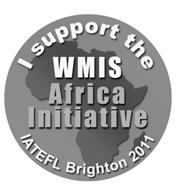
English Language Teacher Development
Find
http://arts.brighton.ac.uk/tesol
+44 (0)1273 643354 postgrad.languages@brighton.ac.uk

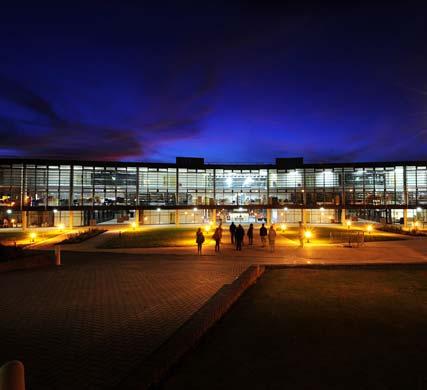

For a 20% discount on these books, as well as a wide range of other titles, make sure you visit our stand (no.48).


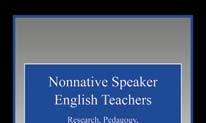
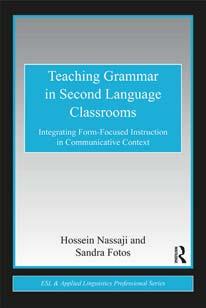


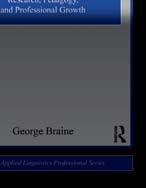
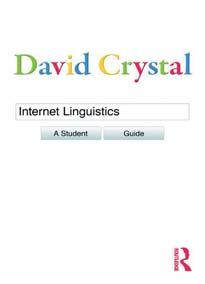



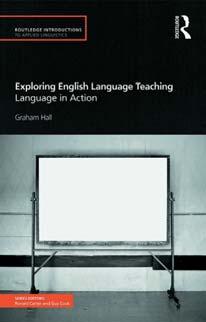
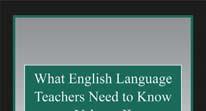

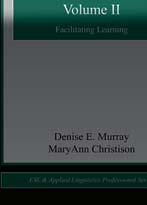


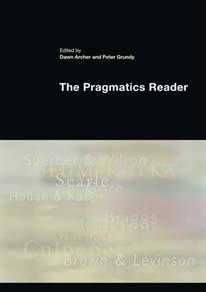

A b d e r r a h i m Farida farida_abderrahim@hotmail.com
A b d u l l a h Amira
A b d u l w a h a b Tariq mahmoditariq@yahoo.com
A b e d i n Manzoorul ma455@cam.ac.uk
A b o u - S e t t a Amal amal_a6@yahoo.com
A b u S e i f Leen winsomeleen@yahoo.co.uk
A b u k l a i s h Abdelhafied buklish78@hotmail.com
A d a l a r Nevin nevin.adalar@emu.edu.tr
A h m a d a l i e v a Dilrabo robiya0707@mail.ru
A i s h Fiona fiona@target-english.co.uk
A j a n a h Emmanuel Enesi enesielaj@yahoo.com
A j j a n Mais
A k s i t Zeynep zaksit@gmail.com
A k y o l Burcu akyol.burcu@gmail.com
A l a a l i Naeema
A l - B a r a z y Husam Al-Deen hdbarazy@lycos.com
A l e x a n d e r Olwyn O.Alexander@hw.ac.uk
A l - H a s s a n Ahmad dral_hassan@hotmail.com
A l i Sally sally.ali@uaeu.ac.ae
A l l e m a n o Jane
A l o n z o Rose rialonzo@gmail.com
A l R i s i Raya raya.alrisi90@moe.om
A l s h a b i Abduljabbar abduljabars@yahoo.com
A l - S i n a n i Salima
A l t a y Janset Muge jansethoca@hotmail.com
A l t e n r e i t e r Monika monika.altenreiter@fh-joanneum.at
A l t i n t a s Fikri fikri.altintas@emu.edu.tr
A l t u n E v c i Hatice haticealtun@gmail.com
A r a g o n e s Elsa earagones@pucp.edu.pe
A r e g a Awgichew awgichewarega@yahoo.com
A r e n a Carla carlaarena@gmail.com
A r f a K a b o o d v a n d Mandana M_Arfa@yahoo.com
A r g e n t Sue
A r n o l d Jane arnold@us.es
A t i e y a Marwa
A t k i n s o n Eric eric.atkinson@britishcouncil.pl
B a b e r Eric eric.baber@gmail.com
B a b i c k a Blanka
B a d g e r Richard r.g.badger@education.leeds.ac.uk
B a f f o k a Michael
B a j a j Meenu meenu.bajaj@in.britishcouncil.org
B a l d r y Anthony anthony.baldry@gmail.com
B a l l a n t y n e Neil neil.ballantyne@britishcouncil.org.hk
B a l s e m a o O s s Debora deboss@terra.com.br
B a r d u h n Susan susan.barduhn@sit.edu
B a s s e t t Jennifer jsb@bassettword.co.uk
B a s u Bijoy bijoybasu@gmail.com
B e a v e n Briony brionybeaven@t-online.de
B e c h l e r Sabrina bechler@em.uni-frankfurt.de
B e c k Martin
B e d d i n g t o n James jbeddington@gmail.com
B e l a k Mojca mojca.belak@guest.arnes.si
B e l i c k a Liga liga.belicka@lu.lv
B e l l Emily
B e l o u s o v a Marina marbelousova@gmail.com
B e n e v o l o F r a n c a Valeria vbenevolofranca@gmail.com
B e n t l e y Kay
B e n w e l l Tara benwell.tara@gmail.com
B e r m a n Michael michaelberman@blueyonder.co.uk
B i a n c h i n i Janet janetbianchini@hotmail.com
B i c k n e l l Roy royparmesan@hotmail.com
B i e n g e Hannah
B i l b r o u g h Nick nickbilbrough@yahoo.co.uk
B i z i m Meltem meltemb@sabanciuniv.edu
B l a i r Andrew
B l a n d Janice
B l o c k David d.block@ioe.ac.uk
B o c i e k Hania hania.bociek@bluewin.ch
B o o g Annabel
B o o n H u a Lee lee.boonhua@yahoo.com
B o o t h David david.booth@pearson.com
B o w e n Tim timwbowen@gmail.com
B o y Isil
B o z k u r t Neval neval.bozkurt@hotmail.com
B o z k u r t Zeral zeralbozkurtt@gmail.com
B r a d d o c k Paul paul.braddock@britishcouncil.es
B r a d l e y Terence
B r a n d o n Katherine
B r a v o Maria C mcbravo7@sapo.pt
B r e w e r Sarah
B r e w e r Stephen sscott.brewer@lille.iufm.fr
B r o a d h e a d Annie
B r u n e t Yordanka nayyor@infomed.sld.cu
B r u t o n Anthony abruton100@yahoo.com
B u c h a n a n Heather h.buchanan@leedsmet.ac.uk
B u c k Gary gary@lidgetgreen.org
B u d g e l l Gill gbudgell@frattempo.co.uk
B u k i n Steven steven.bukin@btinternet.com
B u r n s Anne achburns@gmail.com
B u r w o o d Sarah sarah.burwood@telus.net
B u x t o n Barbara barbara@barbarabuxton.orangehome.co.uk
C a g n o l Bethany bethany@cagnol.com
C a l d w e l l Elisabeth
C a m e r e r Rudolf r-camerer@t-online.de
C a p e l Annette annettecapel@mac.com
C a p l e n - S p e n c e Noreen ncaplenspence@yahoo.co.uk
C a r r Richard
C a r r i e r Michael mcarrier@btconnect.com
C a r r i o n David david.carrion@ses-folkestone.co.uk
C a s e y Annette
C a s t i l l o Digi Ann digi.castillo@britishcouncil.org.ph
C a u l d w e l l Richard rtc@blueyonder.co.uk
C e l e b i Hatice haticecelebi79@gmail.com
C e l y Rosa Maria
C e r d a Yolanda Y.Cerda@sussex.ac.uk
C h a m b e r l i n Barbara
C h a m o t Anna Uhl auchamot@aol.com
C h a n g Ya-Hui (Anne) ya-hui.chang@stir.ac.uk
C h a p p l e Julian julianchapple@mac.com
C h a r u b u s p Sasima charubusp@hotmail.com
C h a t t o p a d h y a y Kalyan profkalyan@gmail.com
C h e r n e n Joann jchernen@dccnet.com
C h i c k Mike mchick@glam.ac.uk
C h o i Sun-Young
C h o n g Chia Suan thebluesandniceshoes@yahoo.co.uk
C h r i s t o p h e r Nkechi nmxtopher@gmail.com
C h r i s t o p h e r Virginia vlchrist@ucalgary.ca
C h u n g Hiu Yui
C i m e r m a n o v a Ivana
C l a n d f i e l d Lindsay lclandfield@yahoo.ca
C l a r k Rachel
C l a r k e Darren darren.clarke@britishcouncil.or.th
C l e a r y Maria m.cleary.euronet@fastnet.it
C o j o c a r i u Marinela marinelacojocariu@yahoo.com
C o l e m a n Hywel
C o l e m a n Loes l.coleman@let.ru.nl
C o n s t a n t i n i d e s Marisa info@celt.edu.gr
C o o p e r Robert rcooper@studygroup.com
C o o z e Margaret
C o u l t e r Dale dalecoulter@hotmail.co.uk
C o x Andy
C o x h e a d Averil
C r o w l e y Nicola nicola.crowley@britishcouncil.org.il
C u r t i s Andy andycurtisorg@gmail.com
D ' C o s t a Chrissie
D a b i a Mustafa mustafa_am1978@yahoo.com
D a h a l Hemanta Raj dahalhr@yahoo.co.uk
D a l - B i a n c o Veronica veronica.dal-bianco@fh-burgenland.at
D a s k a l o v s k a Nina nina.daskalovska@yahoo.com
D a v i d s o n Peter peter.davidson@zu.ac.ae
D a v i d s o n Tania taniad@edusoft.co.il
D a v i s o n Jane j.davison1@tiscali.co.uk
D a w s o n Nick nickdaw@btinternet.com
D e C h a z a l Edward
d e L o t b i n i e r e Max
D e l g a d o Natanael natanaeldelgado.puaali@gmail.com
D e l l a V a l l e Gabriella
D e l l a r Hugh hughdellar@mac.com
D e m i a n Amani
D e m i r e l Huseyin huseyin.demirel@emu.edu.tr
D e m p s e y Susan
D e x t e r Phil phil.dexter@britishcouncil.org
D i a z M a g g i o l i Gabriel gabrieldiazmaggioli@hotmail.com
D i n g Alex alex.ding@nottingham.ac.uk
D i o u f Abdoulaye adiouf73@yahoo.fr
D i s l i Ozge
D i x i t Krishna Kalyan
D o d g e Valentina valentinadodge@tiscali.it
D o n a l d Julie
D o n n a r u m m a David d.donnarumma@open.ac.uk
D o u g l a s Alastair alastair.douglas@ihlondon.com
d u V i v i e r Madeleine m.duvivier@btopenworld.com
D u d e n e y Gavin gavin.dudeney@theconsultants-e.com
D u n n e Louisa louisa.dunne@britishcouncil.fr
D u r a n H o w a r d Katherine Grace
E l H a g Yasir Hassan Hussein
E l l i s Gail
E r g u n Mutlu Isil isilsen@bilkent.edu.tr
E r k m e n Besime berkmen@hotmail.com
E s t e v e s Vanessa vcreis.luis@gmail.com
E t e d a l i Mohammad Mehdi etedali@hotmail.com
E y d e l m a n Natalia eydelman.natalia@gmail.com
F a r h a t Dima farhatdima@hotmail.com
F a r r e l l Tom tfarrell@brocku.ca
F e b e n Ben benfeben@yahoo.co.uk
F l e e t Liz Fleet.Elizabeth@britishcouncil.org.jo
F l e t a M. Teresa tfleta@perlaunion.es
F l i n d e r s Steve steveflind@aol.com
F o l e y Mark
F o o r d Duncan duncan@oxfordtefl.com
F o r d Martyn
F o r e m a n Ann foreman@ydemas.com
F o w k e s Amy amyfowkes@gmail.com
F o x Anne foxdenuk@gmail.com
F r a n c i s Nicky nicky.francis@britishcouncil.fr
F r a n c o Renata
F r e n d o Evan evan.frendo@e4b.de
F r o e t s c h e r Doris doris.froetscher@uibk.ac.at
G a r b e y S a v i g n e Eduardo egarbey@infomed.sld.cu
G a r c i a G o m e z Pablo pggomez@ets.org
G a r d n e r Barbara bgardner@studygroup.com
G a r t o n - S p r e n g e r Judy
G a u g h a n Anthony anthony.gaughan@gmx.de
G e b r e h i w o t Habtamu
G h o l a m i Javad
G i e n a n d t Philip philip.gienandt@linguatv.com
G i l l Michael dos@stgiles-eastbourne.co.uk
G i r g i n A k i s k a l i Esra
G k i o u z e l i Adamantia dgiouzeli@yahoo.com
G o l d Lonny lonny@going-for-gold.net
G o l d c h l e g e r Lizika lizika@culturainglesasp.com.br
G o l d s t e i n Ben ben@bengoldstein.es
G o m e z M a r t i n e z Susana susanag@fing.uva.es
G o n z a l e z Ana Sofia asm_gonzalez@yahoo.co.uk
G o o d g e r Charles charles.goodger@funsongs.co.uk
G o o d i e r Tim tgoodier@eurocentres.com
G o r r i n g e Andrew gorringe@kwassui.ac.jp
G o u l d Keith
G r a n t Beth
G r a v e s Kathleen gravesk@umich.edu
G r a y Gavin
G r e e n William wrgreen@sapporo-u.ac.jp
G r u n d y Peter grundypeter@btinternet.com
G u e r r i n i Michele C michele@mguerrini.eu
G u e y e Latsouck latmbathio@yahoo.fr
G u l e n e r Birgul birgul@bilkent.edu.tr
G u n t e l b e r g Connie connie@guntelberg.dk
G u t t Lindsey lindsey@scout2win.com
G u v e n Aysen caysen@bilkent.edu.tr
H a d f i e l d Jill jhadfield@unitec.ac.nz
H a d i s a n t o s a Nilawati H a d k i n s Helen helja21@gmail.com
H a l e s Rebecca rebecca.hales@britishcouncil.org.vn
H a l l David david.hall@mq.edu.au
H a l l Diane diane@dianehall.co.uk
H a l l Geoff g.m.hall@swansea.ac.uk
H a m a d Noor noora.email@gmail.com
H a m i l t o n Eilidh eilidh.hamilton@britishcouncil.org.tr
H a m i l t o n Richard hamiltonricharda@hotmail.co.uk
H a n c o c k Mark markhancock@telefonica.net
H a n d s Penny penny@pennyhands.com
H a r d y - G o u l d Janet janet.hardygould@btinternet.com
H a r e Peter peter.hare@et.britishcouncil.org
H a r m e r Jeremy jeremy.harmer@btinternet.com
H a r r i s Bill bharrisefl@gmail.com
H a r r i s Vicky dos@stgiles-eastbourne.co.uk
H a r t l e Sharon sharonhartle@yahoo.it
H a s a n Diana diana_asril@yahoo.com
H e a p Stephen
s.heap@icte.uq.edu.au
H e a t h f i e l d David david@davidheathfield.co.uk
H e l l w i g Liet
H e m s w o r t h Lesley
H e n d e r s o n Mary mhenderson@studygroup.com
H e n d r a Leslie Anne
H e y n s Conrad c.heyns@arts.ac.uk
H i c k s Gary garyonthecoast@hotmail.com
H i g h o Carol carol.higho@pearson.com
H i l l David R drh@marshbrook.eclipse.co.uk
H i l l Kathy katherine.hill@ihlondon.com
H i l l Robert robhill@tin.it
H i n e s Susan shines@ets.org
H o a r e Philip
H o c k l e y Andrew adhockley@gmail.com
H o c k l y Nicky
H o d g s o n Graeme graeme.hodgson@britishcouncil.org.br
H o l d e n Susan sh@easynet.co.uk
H o l m e s Ian David ian77dholmes@hotmail.co.uk
H o o d Jonathan dos@stgiles-eastbourne.co.uk
H o u s e Roger access@otenet.gr
H o u t e n Michael
michael.houten@britishcouncil.org
H u a n g Chi-Chu jewelsai@hotmail.com
H u n t e r Duncan
d.i.f.hunter@warwick.ac.uk
H u s s e i n Najah
I m b e r Brenda prousimb@umich.edu
I n a l Dilek inald@istanbul.edu.tr
I o a n n o u - G e o r g i o u Sophie sophiecy@yahoo.com
I r v i n e- N i a k a r i s Christine cniakaris@hau.gr
I s i k T a s Elvan Eda edaisik@metu.edu.tr
I v a n o v a Tatiana tatiana-szelinger@yandex.ru
J a c k s o n Patrick patjack67@hotmail.com
J a h a n Rubaiyat finnegunwake@yahoo.com
J a m e s Fiona fionajames@hotmail.com
J e f f r i e s Linda ljeffries@tiscali.it
J e n k i n James james.jenkin@i-to-i.com
J i b o w o Adejoke avjibowo@yahoo.com
J i l k o v a Jana jajilkova@gmail.com
J o h n s o n Jenny jennyjohnson.btn@gmail.com
J o h n s o n Melanie meljohnson.englishteacher@gmail.com
J o n e s Antony tony.jones@britishcouncil.org
J o n e s Ceri cerijones@ono.com
J o n e s Glyn glyn.jones@pearson.com
J o n e s Tamara jonestamara@hotmail.com
J o t o Akiyo
J o v a n o v i c h Natasha natasa-jovanovic@sbb.rs
K a c a r Isil isil@metu.edu.tr
K a l n b e r z i n a Vita vita_kalnberzina@yahoo.com
K a n g Nam-Joon nohkang@hotmail.com
K a o Shu-Hua shuhua_k@hotmail.com
K a r a o g l u Ozge ozge_karaoglu@hotmail.com
K a r i k i a n Nataly nat_mir@hotmail.com
K a r i m k h a n l o u e i Ghiti ghiti@zums.ac.ir
K a r l s s o n Leena leena.karlsson@helsinki.fi
K a s s a b g y Nagwa nagwa@aucegypt.edu
K a t o Shigeo skato@ed.niigata-u.ac.jp
K e d d i e Jamie jamiekeddie@hotmail.com
K e e d w e l l Andy
K e e g a n Phil philk66@gmail.com
K e l l y Keith keithpkelly@yahoo.co.uk
K e n n e d y Loraine loraine.kennedy@bell-worldwide.com
K e r a n e n Nancy Susan lajoya108@yahoo.com
K h a b i r i Mona monakhabiri@yahoo.com
K h a l i l Rania rania.khalil@bue.edu.eg
K h a m i d o v a Natalia natalya_karshi@mail.ru
K h a n Iffaf iykhan@essex.ac.uk
K h a n Intakhab
K h a n Rubina rkhan@agni.com
K i d a n e Haftamu
K i d d l e Thom thomkiddle@yahoo.com
K i e l y Richard rkiely@marjon.ac.uk
K i m Jung In junginki@buffalo.edu
K i m Nammi sherrynmkim@hanmail.net
K i r k l a n d Finn f.kirkland@macmillan.com
K i r s h Judith judykirsh@aol.com
K j i s i k Felicity felicity.kjisik@helsinki.fi
K n i g h t Paul paul.knight@nottingham.ac.uk
K o n g Stella stella@ied.edu.hk
K o r o l Olena elena_korol@list.ru
K o t b y Inas
K o z h e v n i k o v a Tatiana skalar@online.ru
K r a k e Astrid englishcampus@macmillan.com
K r s t i n i c Marija marijakrstinic@yahoo.com
K r y s z e w s k a Hanna hania.kryszewska@pilgrims.co.uk
K u l k a r n i Shefali shefali.kulkarni@gmail.com
K u n s c h a k Claudia claudiakunschak@yahoo.de
K u p e t z Rita rita.kupetz@engsem.uni-hannover.de
L a c k m a n Ken kenlackman@yahoo.com
L a i Hsuan-Yau Tony tony823@ms17.hinet.net
L a k n e r Andreja andreja.lakner@siol.net
L a m Kit Shan lamcherlotte@yahoo.com.hk
L a m b Melissa melissa.lamb@ihlondon.com
L a m b e r t Jerry jerry.lambert@oup.com
L a n g e Josh josh.lange@ucl.ac.uk
L a n s f o r d Lewis wing.on@me.com
L e a n e y Cindy cslean@essex.ac.uk
L e a t h e r Sue sue@sueleatherassociates.com
L e d b u r y Robert robledbury@gmail.com
L e e Hyoshin
L e f e v e r Samuel samuel@hi.is
L e k i c Ivana ivana.lekic@azoo.hr
L e m o s C o e l h o Cecilia cecilialcoelho@gmail.com
L e n g e l i n g Martha lengeling@hotmail.com
L i n Mei-liang meiliang@yahoo.com
L l o y d Mark markalloyd70@btinternet.com
L o r i n c z Tamas tamaslorincz@hotmail.com
L u c i e t t o Sandra sandra.lucietto@vodafone.it
L u c z a k Aleksandra luczak@luczak.edu.pl
L y o n - J o n e s Sue suelyonjones@esolcourses.com
M a c F a r l a n e Gaele Morag
M a c k e n z i e Alan alan.mackenzie@in.britishcouncil.org
M a c K e n z i e S p e n c e Graham
M a c S w e e n Fay
M a d a o u i Redouane madaouiredouane@gmail.com
M a d e r Elsbeth engl.home.gos@bluewin.ch
M a d e r Judith j.e.mader@t-online.de
M a g a d z i r e Runyararo rmagadzire@gmail.com
M a g l i o n e Paul paul.maglione@english-attack.com
M a k h l o u f Sanaa sanaaam@aucegypt.edu
M a l e y Alan yelamoo@yahoo.co.uk
M a l s t e r Kerry
M a n n e y Linda manney@pinewood-school.gr
M a r e n z i Ivana marenzi@L3S.de
M a r k Geraldine
M a r t i n Justyna jmartin@empik.edu.pl
M a t s u m u r a Shoichi
M a w e r Kyle kyle.mawer@britishcouncil.es
M a y a d u n n a g e Dushmantha Dissanayake
M a y n a r d Carson
M a z g u t o v a Diana
M a z u e l o s Sandra
M c C a r t h y Michael
M c E w a n Jacqueline jacqueline.mcewan@ihlondon.com
M c G r a w Rhoda rhoda.mcgraw@mail.enpc.fr
M c M a h o n John johnlizm@yahoo.com
M c M a h o n Liz
M c M a s t e r Ian
M c N u l t y Julien julienmcnulty@gmail.com
M e a k i n Jean sbl-elw-dsl@agctg.mod.uk
M e d d i n g s Luke lukemeddings@gmail.com
M e e n a k s h i s u n d a r a m Chockalingam
M e l d r u m Nicola nicolameldrum@yahoo.co.uk
M e l l o Giana giana.mello@culturainglesasp.com.br
M e s h Linda ljmesh@gmail.com
M i d d l e t o n Phil philmids@hotmail.com
M i l l e r Cleve cleve@english360.com
M i l l w a r d - S a d l e r Adrian
M i m i c a B e z j a k Gjurgjica gmbezjak@yahoo.co.uk
M i s c i n Evelina evelinamiscin@yahoo.co.uk
M i t s a k i Catherine cmitsaki@yahoo.gr
M o n t e s a n t o Maryann maryannmontesanto@hotmail.com
M o n t o y a G o m e z Oscar Hernan
M o o r e Caroline caroline_moore@me.com
M o o r e Caroline caro_moore@yahoo.com
M o o r e Tim tim.moore@britishcouncil.org.vn
M o r d u e Suzanne Suzanne.mordue@britishcouncil.org.tr
M o r g a n Johnny johnny.morgan@britishcouncil.or.th
M o r g a n Sian sianmorgan@katamail.com
M o r r i s o n Brian morrison_brian@yahoo.com
M o r r o w Keith
M o s e s Antoinette amoses@btinternet.com
M o t a l l e b z a d e h Khalil k.motalleb@iautorbat.ac.ir & kmotallebz@gmail.com
M o u n t Sarah
M o u r a o Sandie nettlehouse@mail.telepac.pt
M u i r h e a d Lucy lmuirhead@studygroup.com
M u m f o r d Simon simumford@yahoo.com
M u n d a y James
M u r p h y Niamh niamh.murphy@regent.org.uk
M u s t a f a Blerta blerta.mustafa@gmail.com
N a m b u Akiko akikonanbu@hotmail.com
N a n a m e e M b a y u Martina Muyusi nanambayu@yahoo.com
N a t i o n Paul
N a v i d i E s t a l k h i Nargess
N a y a k Gopa gopanayak@gmail.com
N e g a s h Nigussie
N e l s o n O z e r Marci marci@bilkent.edu.tr
N e v a r i l Josef josef.nevaril@upol.cz
N e w b r o o k Jacky Ridout.K@CambridgeESOL.org
N e w s o m e Julia julianewsome@mac.com
N g u y e n Thuy Hanh
N o r r i n g t o n - D a v i e s Danny danny.norrington-davies@ihlondon.com
N o r r i s Roy rnorris@telefonica.net
N o r t h Brian
N o r t o n Julie jen7@le.ac.uk
N o r t o n Maria maria.norton@britishcouncil.or.kr
N o s h c h e n k o Mykhailo
N o v a k Jakub jnovak@ets.org
N o w a c k a Dorota ndorota@ifa.amu.edu.pl
N y e Andrew
O ' F a r r i l l Isora Enriquez egarbey@infomed.sld.cu
O ’ K e e f f e Anne
O ' N e i l l Fatma fatmaoneill@gmail.com
O ' R e g a n John
O a k e s Steve steveoakes99@gmail.com
O e s t e r r e i c h e r Mario mario.oesterreicher@web.de
O k o h Nkem h_sazu57@yahoo.co.uk
O l a d u n j o y e Oluwayomi yomi_yemi@yahoo.com
O l i v e i r a Raquel oliveiraquel@gmail.com
O m e n e k e Siyaka Rekiyat
O n d e r Neslihan neslihaneap@gmail.com
O r a l Yasemin yoral@istanbul.edu.tr
O r r Andrew andy.orr@regent.org.uk
O s b o r n e Mark mark.osborne@L2.co.uk
O t t w a y Tom tottway@studygroup.com
O z d e m i r Esra esraoz@istanbul.edu.tr
O z t u n a l i Tamer t.oztunali34@gmail.com
P a g e Jeremy
jnp20@sussex.ac.uk
P a l m e r Lucy lucyp@teachit.co.uk
P a l m e r Sue www.suepalmer.co.uk
P a r k e r Kevin
P a r m i n t e r Sue sueparminter@gmail.com
P a r r y David david.parry@britishcouncil.or.jp
P a s c o a l Lucia
P a t e r s o n Ken ken.paterson@gmail.com
P a t e s Dominic dpates@studygroup.com
P a t t e n Brian
www.brianpatten.co.uk
P a t t i s o n Tania
tpattison@trentu.ca
P a w l a k Miroslaw pawlakmi@amu.edu.pl
P e a c h e y Nik nikpeachey@mac.com
P e a c o c k Martin martin.peacock@britishcouncil.org
P e a c o c k Matthew enmatt@cityu.edu.hk
P e n d e l l Patrice pendell@kinjo-u.ac.jp
P e r i n o Hansjuerg hperino@mac.com
P e t e r s Helen
P h e l p s Christina
P h i l l i p s Terry terry@wtcinelt.com
P h i l l i p s Tim tim.phillips@britishcouncil.org
P h i l p Heike
heike.philp@lancelotschool.com
P h i l p o t Sarah sarah.philpot@laposte.net
P i c k Lisa literatelisa22@yahoo.co.uk
P i c k e r i n g Angela
P i c k e r i n g George georgeuk32@aol.com
P i n w e h a Sumanee p_sumanee2@yahoo.com
P o c k l i n g t o n Jackie pockjack@gmail.com
P o p Anisoara pop.anisoara@cantemir.ro
P o p o v i c Radmila
P o u l t e r Monica
P r o w s e Philip philip.prowse@ntlworld.com
P u g l i e s e Chaz chazpugliese@gmail.com
P u g s l e y Jenny Ann jenny.pugsley@trinitycollege.co.uk
P u l v e r n e s s Alan AlanPulverness@msn.com
R a f i e y a n Homa hmrafieyan@yahoo.com
R a h m a n Arifa arifa73@yahoo.com
R a m a c h a n d r a n Rakesh
R a m o s Rosinda rramos1@uol.com.br
R a s c o n M o r e n o Diego diegorascon@hotmail.com
R e a d Carol carolread@readmatthews.com
R e d m a n Stuart
R e d p a t h - C o l e Laine
R e v e s z Andrea
R e v i c h Izabella irevitch@yahoo.com
R e y e s F i e r r o Maria del Carmen R i c h a r d s o n Silvana silvana.richardson@bell-worldwide.com
R i m m e r Wayne wrimmer@hotmail.com
R o b b B e n n e Rebecca robb.benne@gmx.com
R o b i n s o n Carole carolearobinson@hotmail.com
R o c c h i c c i o l i Anne annet.rocchiccioli@gmail.com
R o d g e r s John jmhrodgers@hotmail.com
R o g e r s Ian ian.rogers@zu.ac.ae
R o g e r s Paul paul.rogers@manic-monkey.com
R o j a s G o n z a l e z Teresita
R o n d o n Maria Estela Ribeiro Jardim estelarondon@gmail.com
R o s e n b e r g Marjorie mrosenberg@aon.at
R u m o r a Ksenija krumora@gmail.com
R u s s e l l Roberta
R y d e r Jane jane.ryder@wanadoo.fr
R y l e y Peter peterryley@hotmail.com
S S o t h i n a t h a n Jayanti jayanti@eltc.edu.my
S a b o o n i Siddika ukbahrain@hotmail.com
S a c h p a z i a n Maria Araxi msachpazian@hyphen.gr
S a l a h E l - D i n Yasmine yasmine@aucegypt.edu
S a l a m a n c a Aida aida.salmanca@britishcouncil.org.co
S a l e e m Mehvish
S a l l i Aysegul aysegul.salli@emu.edu.tr
S a m a n t r a y Kalyani k25samantray@gmail.com
S a m b e n y Celeste c.sambeny2010@hotmail.com
S a m p a i o Gloria RL gloria_sampaio@hotmail.com
S a n c h e z Liliana
S a n c h e z T e r r e l l Shelly
S a n g a b a u Raymond sangabau@hotmail.com
S a n o n Constantin constsano@yahoo.fr
S a n o t s k a Larysa sanotska@yahoo.com
S a n t a n a Josefina jsantana@up.edu.mx
S a n t a n a Rosa Elena
S a n t o s Denise denise@denisesantos.com
S a r a i v a d e L i m a Kalina kalina.lima@soton.ac.uk
S a s a j i m a Shigeru sasajima@saitama-med.ac.jp
S c h a e f e r Annett schaefera@uni-landau.de
S c h a e f e r Eugene eugeneschaefer@aol.com
S c h e d l Mary mschedl@ets.org
S c h e l l e k e n s Philida philida@schellekens.co.uk
S c h i r m e r Amy amy_schirmer@hotmail.com
S c h m i d t Eva Maria
S c h m i t t Diane
S c h m i t t Norbert
S c h u l l e r Anita aschuller@vcc.ca
S c r i v e n e r Jim jimscrivener@gmail.com
S e a t h Jonathan jseath@googlemail.com
S e l b y Claire claire.selby@yellowh.com
S e l b y Greg greg.selby@britishcouncil.or.th
S e l i v a n Leo leo.selivan@britishcouncil.org.il
S h a h i d u l l a h Mohammad msullah1956@yahoo.com
S h a m i m Fauzia
S h e e h a n Susan
S h e n Wei-Wei wwshen@fcu.edu.tw
S h e t h Dharmendra shethdharmendra@hotmail.com
S h i m a z u m i Marilisa marilisa.shimazumi@culturainglesasp.com.br
S i d d h a r t h a Tara
S i m o v i c Marina simovic.marina@yahoo.com
S i n c l a i r Barbara
S i v e l l John jsivell@brocku.ca
S k i n n e r Jody jody@uni-koblenz.de
S l a g h t John j.slaght@reading.ac.uk
S l a t e r Paul
P.S.Slater@bton.ac.uk
S m i t h Ann F.V. ann.smith@nottingham.ac.uk
S m i t h Howard howard@oxfordohc.co.uk
S m i t h Kristina kristina123smith@hotmail.com
S m i t h Mark markwordsmith@yahoo.co.uk
S m i t h Richard
S m i t h Simon simonsmith.elt@gmail.com
S m y t h Stella sks6@le.ac.uk
S o k e l Fran fsokel@gmail.com
S o l l y Mike
S o t o Alejandra
S o u z a Lelia lsmsouza@hotmail.com
S o y o z Sirin
S p e n c e r David davespencer@terra.es
S p r a t t Mary mary.spratt@ntlworld.com
S t a n l e y Graham blogefl@gmail.com
S t a n n a r d Russell russellstannard@btinternet.com
S t e i n h u b e r Belinda belinda.steinhuber@cebs.at
S t e p h e n Bryony bryonystephen@hotmail.com
S t i r l i n g Johanna johanna.stirling@gmail.com
S t r a k o v a Zuzana strakova@unipo.sk
S u l e Kati k.sule@macmillan.com
S u t h e r l a n d Lisa lisa.sutherland@harpercollins.co.uk
S v e t i n a Ruta
S w a n Michael
S w e e n e y Paul paul@eduworlds.co.uk
S y k e s Helen helen.sykes@britishcouncil.org.il
S y l v e s t e r Karenne kalinago.english@gmail.com
S z e s z t a y Margit margit.szesztay@gmail.com
T a c k Sonja srtack@googlemail.com
T a g h a v i a n Naseradin Ali
T a l b o t Ann a.l.talbot@shaw.ca
T a l e b z a d e h Alireza talebov@yahoo.com
T a m u l i Anita tamulis.aj@gmail.com
T a n g Eunice
T a r t s a y N e m e t h Nora nora@tartsay.hu
T a s k i n S i m s e k H. Sibel
T a t z l Dietmar dietmar.tatzl@fh-joanneum.at
T a u s c h i t z Isolde
T a y l o r Cathy cathy.taylor@trinitycollege.co.uk
T a y l o r Florentina florentina.email@gmail.com
T a y l o r e - K n o w l e s Steve stevetk01@gmail.com
T e n n a n t Adrian adrian.tennant@ntlworld.com
T e z c a n U n a l Burcu btezcan@bilgi.edu.tr
T h a i n e Craig cthaine@ptchev.net.nz
T h o m a s Michael
T h o r l b y Tricia
T h o r n b u r y Scott scott.thornbury@gmail.com
T h o r p Alex info@elc-brighton.co.uk
T i m e r i c k Jo jtimerick@studygroup.com
T o e c h t e r l e Anita
T o h m o h Joseph Yong tohmohj@yahoo.fr
T o m l i n s o n Joanne jo@target-english.co.uk
T o r u n F. Pinar pinartorun08@gmail.com
T o s t e Verissimo vtoste@netcabo.pt
T r a n t e r Geoff info@mondiale.de
T s a i Bonnie tsaibonnie@hotmail.com
T s a i Yi-Jen jessie.uk@gmail.com
T s a p i k i d o u Danae dt321@cam.ac.uk
T s a r i k o v a Natalia natalia.tsarikova@britishcouncil.uz
T u r u l a Anna anna.turula@gmail.com
T u t u n i s Birsen tutunisster@gmail.com
T y n a n Rolf rtynan@studygroup.com
T y s o e Zoe zoe.tysoe@britishcouncil.org.mx
U g u r E s k i c i r a k Fatos fatos.eskicirak@bahcesehir.edu.tr
U m e s a k i Atsuko ufatsuko@hcn.zaq.ne.jp
U n d e r h i l l Adrian adrian@aunderhill.co.uk
U r k u n Zeynep zeynepu@sabanciuniv.edu
V a l e n t e David
v a n O l s t Candy candida.vanolst@ntlworld.com
V a r n e y - B u r c h Sarah S.Varney-Burch@brighton.ac.uk
V a r o l Burcu burcuunalvarol@gmail.com
V e l i k a y a Elena evelikaya@hse.ru
V e l i k o v a Sylvia sylvia.velikova@gmail.com
V e r d o n k Desiree desiree.verdonk@fhwn.ac.at
V i c k e r s Howard howard@avatarlanguages.com
V i n e y Peter efl@viney.uk.com
V i o l a Mercedes mercedesviola@4d.edu.uy
W a c h Aleksandra waleks@ifa.amu.edu.pl
W a l e n n Jeremy walennjj@hotmail.com
W a l k e r Robin robin@englishglobalcom.com
W a l k l e y Andrew andrewwalkley@mac.com
W a l l Berni berni.wall@language-tuition.co.uk
W a l l a c e Catherine
W a l t e r Catherine catherine.walter@education.ox.ac.uk
W a n g Xiaobing icysprite@gmail.com
W a r d Sofia wordrecycle@gmail.com
W a r r David david@languagegarden.org
W a r t e r s Martin martinwarters@hotmail.com
W a r w i c k Lindsay lindsay.warwick@bell-worldwide.com
W a t e r s Alan
W a t k i n s Peter peter.watkins@port.ac.uk
W a t s o n Emma emma@english360.com
W a t s o n Jessica jesswatson0@lycos.com
W a t t s Eleanor watts.eleanor@yahoo.co.uk
W e b b Rhian
rwebb@glam.ac.uk
W e s t b r o o k Pete westbrook@hum.ku.dk
W e s t w e l l Rosemary rjwestwell@hotmail.com
W h i t c h e r Anna
W h i t e Goodith
W h i t e h e a d Danny danny.whitehead@britishcouncil.or.id
W i l d Kate
W i l d e n Shaun shaun.wilden@ihworld.co.uk
W i l l i a m s Eddie
W i l l i a m s Lucy
W i l l i a m s Simon
W i l l i s Dave dave@willis-elt.co.uk
W i l l i s Jane jane@willis-elt.co.uk
W i l l i s Julie
W i l s o n Amanda
Amandalanguage@btinternet.com
W i l s o n JJ jjawilson2000@yahoo.com
W i l s o n Ken kenwrite@btinternet.com
W i l s o n Rosemary rj.wilson@bbk.ac.uk
W i n May May
W i n c h e s t e r Jules j.winchester@sussex.ac.uk
W i s e m a n Anne annewiseman654@btinternet.com
W i s n i e w s k a Halina halinannawu@gmail.com.br
W i s n i e w s k a Ingrid iwisniewska@hotmail.com
W o n g Matilda matildaw@umac.mo
W o o d s Paul rphwoods@gmail.com
W r i g h t Angela W u Fanghui judywufanghui@hotmail.com
X e r r i Daniel dx509@york.ac.uk
X i e Jianmei jx219@exeter.ac.uk
Y a e l Linda linday@cab.cnea.gov.ar
Y a l i n Sezgi sezgi.yalin@emu.edu.tr
Y a m a u c h i Mari yamauchi.mari@gmail.com
Y i l m a z Beyza Nur beyzayilmaz@gmail.com
Y i l m a z Sinem sinemyilmazz@gmail.com
Y i l m a z Y a k i s i k Burcak burcyilmaz@yahoo.com
Y u n a t o v a Irina irinayunatova@rambler.ru
Y u r t s e v e n Bengu bengu@bilkent.edu.tr
Y u s u f Ramzi Abdurahman
Z d e r i c Ante vid@net.hr
Z h e n g Ying ying.zheng@pearson.com
Abbreviations,
aThe presentation focuses on Adult Teaching
AEAcademic English
AGMAnnual General Meeting
ALApplied Linguistics
BCBritish Council
BEBusiness English
bkpromThe presentation promotes a particular book
BSLBritish Sign Language
CAECertificate in Advanced English
CALComputer-assisted learning
CALLComputer-Assisted Language Learning
CEFCommon European Framework
CEFRCommon European Framework of Reference
CESOLCommunicating in English with Speakers of Other Languages
CLILContent and Language Integrated Learning
CMCComputer-Mediated Communication
CoCoCoordinating Committee
CPDContinuing Professional Development
CPECertificate of Proficiency in English
eThe presentation is for an Experienced Audience
E4WEnglish for Work
E4WPEnglish for the Workplace
EALEnglish as an Additional Language
EAPEnglish for Academic Purposes
EFBEnglish For Business
EFLEnglish as a Foreign Language
EGPEnglish for General Purposes
EILEnglish as an International Language
ELFEnglish as a Lingua Franca
ELTEnglish Language Teaching
ELTeCSEnglish Language Teaching Contacts Scheme
ELTJELT Journal
EOPEnglish for Occupational Purposes
ES(O)LEnglish as a Second Language
ESPEnglish for Specific Purposes
EYLEnglish for Young Learners
FCEFirst Certificate in English
GENGeneral
GIGlobal Issues
IATEFLInternational Association of Teachers of English as a Foreign Language
iBTInternet-Based Test
ICTInformation and Communication Technology
ieThe presentation is for an Inexperienced Audience
IELTSInternational English Language Testing System
INSETIn-Service Teacher
INSETTIn-Service Teacher Training
IWBInteractive Whiteboard
L1First Language
L2Second Language
LALearner Autonomy
LAMLeadership & Management
LMCSLiterature, Media & Cultural Studies
LTLearning Technologies
MarcomMarketing Committee
MDMaterials Development
MemcomMembership Committee
MoEsMinistries of Education
NESTNative English Speaking Teachers
NLPNeurolinguistic Programming
NNESTNon-Native English-Speaking Teacher
NNSNon-Native Speaker
NQTNewly-Qualified Teacher
pThe presentation focuses on Primary Teaching
PCEPre-Conference Event
PLNProfessional Learning Network
PRONPronunciation
pubSpeaking on behalf of a publisher/examination board/commercial organisation
RESResearch
RPReceived Pronunciation
sThe presentation focuses on Secondary Teaching
SIGSpecial Interest Group
tThe presentation focuses on Tertiary Teaching
TATeacher Association
TBLTask-Based Learning
TBLTTask-Based Language Teaching
TBTTask-Based Teaching
TDTeacher Development
TEATesting, Evaluation & Assessment
TEFLTeachers of English as a Foreign Language
TESOLTeachers of English toSpeakers of Other Languages
TEYLTeaching English to Young Learners
TTEdTeacher Training & Education
VLEVirtual Learning Environment
WMISWider Membership Individual Scheme
WMSWider Membership Scheme
WSSEWorld Standard Spoken English
YLLYoung Learner Language
YLTYoung Learners & Teenagers
P a t r o n
C o o r d i na t i n g C o m mi t t ee
David CrystalPresident (outgoing)Herbert Puchta
President (incoming)Eric Baber
TreasurerAmos Paran
Secretary (outgoing)Gavin Dudeney
Secretary (incoming)Zeynep Urkun
SIG RepresentativeColin Mackenzie
Associates’ RepresentativeLes Kirkham
Membership Committee Chair(outgoing)AdrianTennant
Membership Committee Chair(incoming)Gary Motteram
ElCom ChairGavin Dudeney
E x e c u t i v e C o m m i t t e e s
Conference CommitteeHerbert Puchta (outgoing Chair)
Eric Baber(incoming Chair)
Graham Hall (outgoing)
Carol Read
Alison Medland (forhead office)
GlendaSmart (for head office)
Alison Wallis (for head office)
Electronic CommitteeGavin Dudeney(Chair)
Eric Baber
Herbert Puchta
FinanceCommitteeAmos Paran (Chair)
Colin Mackenzie
GlendaSmart (for head office)
MembershipCommitteeAdrian Tennant (outgoingChair)
Gary Motteram (incoming Chair)
Gloria Barnett-Powell
Judit Heitzmann
GlendaSmart (for head office)
Publications CommitteeEric Baber (outgoingChair)
Herbert Puchta (incomingChair)
Peter Whiley
Alison Schwetlick
Tania Pattison C
Madeleine du Vivier
Graham Hall
Amos Paran
Ros Wright
S peciallInte res t tGrou p pC oo rdi na tors
BusinessEnglishPaulEast&MarjorieRosenberg
EnglishforSpecificPurposesMarkKrzanowski ES(O)LBevDavies
GlobalIssuesClaudiaConnolly Leadership&ManagementGeorgePickering LearnerAutonomyLeniDam LearningTechnologiesGrahamStanley Literature,Media&CulturalStudiesDavidAHill PronunciationJonathanMarks ResearchAnthonyBruton TeacherDevelopmentMojcaBelak TeacherTraining&EducationBirsenTutunis(ActingCoordinator) Testing,Evaluation&AssessmentSueHackett YoungLearnersHelenEmery&HansMol
AdvisoryyCouncilHerbertPuchta(Chair)
SusanBarduhn(incoming)
RonaldCarter
MichaelCarrier-BritishCouncil
DavidCrystal-Patron AdrianduPlessis
KeithMorrow-Editor,ELTJ
SueSheerin
AdrianUnderhill(outgoing)
CatherineWalter
S cholarshi p pWo rkinggP artyErylGriffiths(Chair)
SophieIoannou-Georgiou
PatrickMcMahon
FelicityO’Dell
AmosParan
WMSSAdvisoryyCom mitteeePeterGrundy(Chair)
KateBarker
MikeClark
JohnMcGovern
MikeSolly
CatherineWalter
IATEFLLStaff
ExecutiveOfficerGlendaSmart ConferenceOrganiserAlisonMedland FinanceOfficerEmmaDexter Marketing&SponsorshipOfficerAlisonWallis SIG&GeneralAdministratorEleanorBroadbridge MembershipOfficerVickySowerby ConferenceProcessorGeraldineBreedon Administration&FinanceAssistantLindaJames






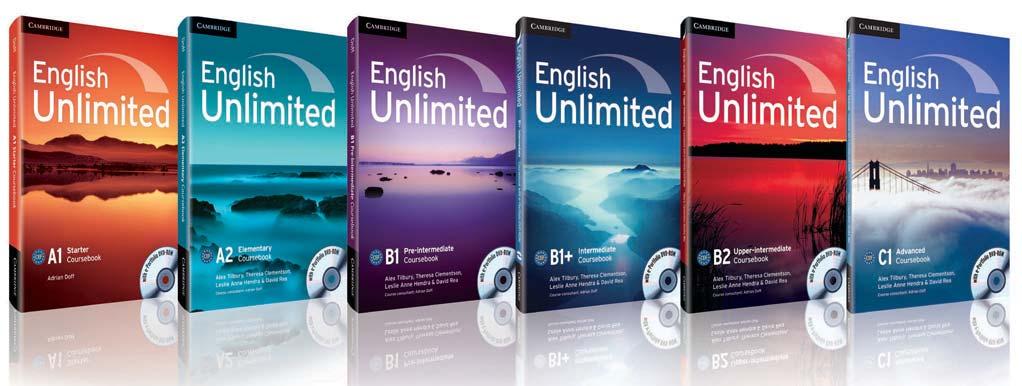




The2011AnnualGeneralMeetingofIATEFL will beheldinSyndicate 1 atthe BrightonCentre,UK on Sunday 17th April2011from1225to1330
All members are invited to attend
1.MinutesoftheAGMheldinApril2010attheHIC,Harrogate.
2.Mattersarising
3.Treasurer’sreport
4.Presentationofaccountsfor2009-2010
5.Re-engagementofLarkings as auditors
6.PresentationbythePresidentandExecutiveCommitteechairsongeneralissues,the workoftheCoordinatingandothercommittees,theSIGrepresentative’sreport,and Associates’ representative’s report
7.Recommendationandappointment of new Trustees
8.Thankstoout-goingPresident,andwelcometonewpostholdersandothernew volunteers
9.Date of next meeting 21st March2012,inGlasgow,timeandvenuetobeconfirmed.
AttendingMemberswillbeinvitedtojoinusforicecream thankstothesponsorshipfromSignLanguagebringsFreedom.

I am writingthisreportat a time when myterm as President ofIATEFL isapproaching its end. I would liketo thank warmly all of our volunteers intheir various rolesaswell asour wonderful staffatHead Officefor the dedication and commitment in working forour charitable causeof linking,developingandsupportingEnglish language teachingprofessionalsworldwide.I am extremely pleased to be able to report on another very successfulyearforour association.This reportwill coverthe calendar year 2010;however, asnormal,the financial report will mainly relate to thefinancial year ending31st August2010.
At the time of writingthemembershipof IATEFL stands at 3600 – thehighestmembership figures for six years. Wecurrentlyhave 103 associated organisations in 78differentcountries, which means thatIATEFL reachesover approximately a further 80,000professionals via our Associates Network.Inparticular,we have been very successful in achieving ourmission with regard tofindingAssociatesinlower incomecountries –ourreach in Africa has provenvery successful, and the numberofAssociates there has risen from 2to 15.
I amparticularlypleasedtoreportthat – due toour stringent financial planning and management–our finances aresolid.The Treasurer’s reportprovides detailsof this. I would liketo thank our Treasurer,Amos Paran, our ExecutiveOfficer, Glenda Smart,andour Finance Officer, Emma Dexter.
In2010, we’vehad the biggest internationalconference ever. 2,001 colleagues came toHarrogate, andan astounding 50,000 delegates havevisited HarrogateOnlineover theyear (the onlineconference developed with thesupportoftheBritish Councilisstill available).Harrogatealso saw thesuccessfullaunch of the IATEFL JobsMarket– anopportunity for professional organisations tofindand recruit teachers and other ELT professionals.
Biggest number ofdelegatesever at IATEFL’s international conference
The OnlineConference shows significant growth rates
A newVice-President steps in A new committee (El-Com) starts work
Numberof scholarships increases to25, with 27 winners for the 2011 conference
IATEFL successfully launches its first Jobs Marketat the Harrogate conference
The launch of the onlineversion of Voices, ourbi-monthly newsletter, gets excellent feedback from our members
Committee work
TheIATEFLcommittees consistentirely of volunteers drawn fromthemembership. The centralorganising body isthe Boardof Directorsor CoordinatingCommittee,chaired bythe President;the members of thisare also the trustees of the association. Thetrustees chair the five executivecommittees; Conference Committee, Publications Committee, MembershipCommittee,Finance Committee and the Electronics Committee. They alsocoordinate the specialinterest groups and the Associates.Atthe2010 AGMEric Babersteppedin as the new Vice President.He will followme as President, as I step downat the AGM in Brighton.
Ishall now givewayto my colleagues fromtheBoardof Directors, the Trustees of IATEFL,topresenttheir reports about each of the executive committees. Furthermore, there will be reports on theWider Membership Scheme,theScholarships Committee and the HeadOffice. This will befollowed by reportsfromthe Special Interest Groupsand the Associates’ Representative.
The PublicationsCommitteeis responsiblefor overseeing IATEFL’s publications. Thisyear ournewsletter, Voices, has continued to be published incolour which has been well received bythemembership. Conference Selections, our publication ofpapersfrom our annual conference,hasincreased by 16 pages sincethe previous year dueto an increase involume and generally excellentquality ofsubmissions.Inaddition we have updatedtheformat ofthe e-bulletin, making this a monthlymail-outand containing “teasers” only, with a link to the full story ona newly-created News page on the website. Thismakes it easier for readers toskim and read only those articles of directinterest tothem.
Wehave also implemented a system which allows ustopublish Voices andthe SIGNewsletters electronically ina user-friendlyway and have hadexcellent feedback onthisfrom ourmembers. Finally, we haveinitiated an overhaul of the IATEFL website which should goliveby May 2011.
EricBaber Chair,PublicationsCommitteeThe Membership Committee, consisting ofAdrian Tennant (Chair), JuditHeitzmann, Gloria BarnettPowelland Caroline Okerika, has had abusy2010.Thecommittee has continued to look at membershipbenefitstrying to ensure weget thebestfor everyone.We’ve also continued todevelopIATEFLas aglobal associationandwe nowhave members fromevenmore countries than ever before. The Africa initiative (WMIS) isnow firmly established and at its height wehad 41membersthrough thescheme.
VickySowerby,ourMembership Administrator,has continuedtodo an excellentjob and the membership graphs that accompany the monthly figures are certainly extremely useful.
It wasalsodecidedthat MarCom (Marketing Committee)would mergewith MemComas itwas felt therewas considerable overlapandputting everything underonecommittee wouldhelp streamline activities.The coordinatingcommittee are finalising a new remit for the new Membership Committee.
Finally,after almost a full two terms (fiveyears) as Chairofthe MembershipCommittee Iam stepping down. It’sbeen anhonourto be part ofthis committeeandthe Coordinating committee andI know I’ll miss it.I came inat atime whenmembershipof IATEFL was decliningandI’m pleasedthatnow we’ve gotthe highest membership figures foroversixyears. I have tothankall thepeople whohave served onthe membership committee, thecoordinating committeeand at Head Office for thecombined efforttomake this possible. Ialso wish my successor all the best;it’s a complexjob, but definitelya rewarding one.
AdrianTennant Chair,MembershipCommitteeElectronicsCommittee
As a newly-establishedcommitteewithin the structure of IATEFLwe havebeenworking hard toidentify our remitand get startedon improvingthe electronic servicesboth atHead Office and for ourmembers.The committee is currentlycomposed ofGavinDudeney (Chair) withEricBaber and Herbert Puchtaand together we have been working with the staffat HeadOfficetoidentify pressing needs within the organisation. Thus far wehave boughtand implemented anonline conferencing platformwhich hasproved popular with SIGs and have started the long andcomplicated process of revamping the main website. Aftera tenderingprocess,we havenowawarded the contract and arelookingforwardto significant changesin the waythewebsite works. These will includeplenty ofadministrativeand database changes, aswellas newservices for membersand SIGsincluding discussion forumsandother social elements.Ifyou haveany suggestionsfor other areas ElCom might consider, we would be happy to hear from you.
GavinDudeney Chair,ElectronicsCommitteeConferenceCommittee
Conference Committeeis concernedwith theplanningofthe IATEFL annual international conference.This involves selectionof venues, planning ofspeakers and events,andthe financial management of the conference. In2010 the committee members were Herbert Puchta (chair), Carol Read and GrahamHall. Peter Grundy continues tosupport the committee withtheorganisation of the Conference Symposia. The committee worksinclose cooperation withtheconference staff at the Head Office:Alison Medland,ourConference Organiser,Alison Wallis, ourMarketing & SponsorshipOfficer, Emma Dexter, the Finance Officer,Geraldine Breedon,ourConference Processor, and ofcourse our Executive Officer, Glenda Smart.
Our annualconference in 2010was heldinHarrogate.Itwasvery successful, andincluded, as well as 436 talksand workshops, a numberof poster presentations andfinalday symposia. The Roving Reporters’ scheme run with the BritishCouncil ELTeCS andTeaching EnglishNetwork featured again. 21 scholarships wereawarded fromourvarious scholarship funds, makingit possiblefor the winnersto attendthe conference. In addition a full socialprogramme contributed to the overall success of the event.
The Harrogateconference also sawthelaunch of theIATEFLJobs Market which didnotonly achieve ahealthy surplus of £13,188butalso got verygood feedback from bothemployersand job seekers taking part in the programme, which makes us optimistic forsignificantfurther growthinthis newventure for the years to come.
During the year the Conference Committee has been active in planning the 2011 annual conference. We havea fullquotaof speakers, including five plenarytalks; a schedule of events with an attractive social programme.
The 2011 conferenceis held at the Brighton Centre in Brighton, thesamevenue asfor variousconferences in the previous years.Registration was again carried out online only, which onthe whole worked very well.
Theresultsof anevaluation ofthe mentoringsystem showedalargedegree of participant satisfactionwith the scheme, hence wedecided tocarry on with it for the Brighton conference.About 106 colleagues have asked for mentors, and about126 haveoffered to be mentors.Wewillalsocarry on withboth the IATEFL Jobs Market and the Interactive Language Fair, a new format fornetworkingandinformation sharing which we firstlaunchedin Harrogatein 2010. We havedecided to givethe ConferenceSymposiamoreprominencethis year, and spread them out over thefirstthree daysofthe conference, rather than having themall on thelast day.
We have worked on making the last day more attractive to participants and hopethat attendance numberswill be better than in previousyears. Thereforeweare offering twoplenaries instead of one,as wellas a raffle withan attractive prize,and also an IATEFL Conference Farewell following the closing ofthe Conference.
The conferenceis the culminationof a year of steadyhardwork bytheConference Committee.As Chair of the committee,I wouldlike to thank my colleaguesCarolRead andGraham Hall for theirexcellent work.Abig thank youto Peter Grundy for hiscontinuous support!Particular thanks go to theHead Office team who have worked all year to bring this event tofruition.Mention must alsobe madeof Madeleine duVivier, the conferenceprogrammer, and themembersof the speaker proposal committee, whoeach read over 670 proposals for the Brighton conference. Many thanksalso to the local committee for their support.
As in the last four years,weare continuing our highly successful partnership with the BritishCouncil to bring a flavour of the annual conference to teachers worldwidewho are not fortunate enough tobe able to join us in Brighton.This initiative has provedto be a hugesuccess.Anyone anywhere inthe world with internet access –notjust IATEFLmembers, and not just teachers,but absolutely anyone – can viewit, with its workshops, lectures, seminars, etc. absolutely free of charge.
Wearegrateful to ourplenary speakers and thosepresenters whosupportthis important initiative offreely disseminating their professional expertise and knowledge onaglobalscale.Astunning 50,000online delegatesfrom more than100countries of theworld havevisited the platform since April 2010,soweare spreading the message farandwide, and can truly claimthat this initiativehasbecome an importantfactor in fulfilling our mission oflinking,supportinganddeveloping English language teachingprofessionals worldwide.
COOPERATION WITH THE BRITISH COUNCIL
IATEFL andthe BritishCouncil continueto seek ways to further collaborate as bothorganisations work towards similar aims oflinking, developing and supportingELT professionals around the world. IATEFLis grateful to the BritishCouncilfor its continued supportofsomany of itsprojects. In addition tofunding BrightonOnlineasdescribed above,the BritishCouncil is providinga framework to selectrecipients ofthe Wider Membership IndividualScheme funding,it provides support forEnglish Language professionalsfrom thedevelopingworldto takepart in the IATEFL conference throughwork with theHornbyTrust, andit supportsthe rovingreporterswhoreport ontheconferenceusing web logs. Weare grateful also fortheuse ofthe British Council premisesfor IATEFL meetings.
HerbertPuchta Chair,ConferenceCommittee791Wider Membership Scheme(WMS)memberships were offered in 2009-10,ofwhich 564 were takenup (approx 71%). 994membershipshave beenoffered for 2010-11at a costto the scheme ofapproximately £12,000.Thesememberships havebeen offeredto 16 Associates with existingWMSmembershipsand to 7 new or,in some cases, returning Associates,whowewelcome warmly to the scheme:Belnate (Belarus), BETA (Bulgaria), CLASS (Congo), IATEFL Hungary, INGED (Turkey), Lakma (Lithuania), Spelt (Pakistan). The WMS Advisory Committee is currently working ona numberof initiatives,including a best practices document whosepurpose is to assist Associates in submittingbids andinallocating resultingmemberships. Weare alsoundertaking a drive togive theSchemea wide profile in theAssociation bothas ameans of reflectingthe success of the scheme and of encouraging further donations. As reported in the 2010 annualreport, Simon Fennsteppeddown as Chairof the WMS Advisory Committee in May2010and was succeeded by PeterGrundy.Sincethen, the Committeehasbeen consideringits own composition, and hassofaragreed that the Chair will serve for a limited period!
PeterGrundy Chair,WMSAdvisoryCommitteeThe Scholarship WorkingParty,(members SophieIoannou-Georgiou, PatrickMcMahon,Fliss O’Dell,Amos Paran, and chair Eryl Griffiths), wouldbepleasedto welcome volunteers to join them in their work ofseeking new scholarshipsponsorships,enhancing current awards, selecting winners fromamongst the manygifted applicants,and thenenriching theconferenceexperience forwinners. If youmightbe interested, please do get intouch.You’ll find us at the morning coffee breaksatthe SWP stand in the centre ofthe ExhibitionHall, adjoining themainIATEFLstand. Thisis also where to comeif you want to ask questions about applyingfor scholarships for Glasgow or shouldyou wanttobecome a scholarship sponsor.
Therearethree new Special Interest Group-relatedawardsmade atthis Brightonconference.Leadership and ManagementSIG welcome their firstscholarship winneras do BESIG with their Facilitatoraward.The accountfordonationsto the Learning TechnologiesDianaEastmentScholarship is still open,you can donate online or atour registration desk.Cambridge ESOL completesits suiteoffivescholarshipswith the new awardsof the Dr PeterHargreaves Scholarship and Best Practice Scholarships inEnglishfor Academic Purposesandin State Education. The individual sponsorsofthe AfricaScholarshipshave increased the number of awards they are makingfrom two tothreeandseveral othersponsors, including IATEFL itself, have increased the value of their awards. Heartfelt thanks toall.
Please remember to check regularly atwww.iatefl.org/scholarships to finddetails ofnewand improved awards.At thetimeofgoing toprint,threenew scholarshipsfor Glasgow areinthe pipelineand maybe announced at conference. Also remember to read right through the list of scholarships although it’s getting rather long.Last year the last five scholarships- the Ray TongueScholarship, the TDSIG Articulating Development Scholarship, theTrinity CollegeLondon Scholarships, andtheWR LeeScholarship - had far fewerapplicantsthan scholarshipsearlierinthe alphabetic order. Improveyourchances of winningby applying for oneof these scholarships nextyear. Ormaybeweshould present the scholarships inreverse order!
Three more things to note.
o The Consultants-EIATEFL Online Scholarship is running right now so tell your colleaguesbackhome to checkthat out.
o Sadlythe International HouseJohn HaycraftClassroom ExplorationScholarships werenotawarded lastyear becausethe applicationsdid notmatch the criteria which call for small scale,classroombasedpieces ofinnovative research which are likelyto be useful to other teachers or trainers. This scholarship has aJune deadline soifyou are interested in applyingthis year you should check the website straight after conference.
o All theother scholarships will haveanearlier deadline this year.Theexact datehasyet to be finalised but it will be on the website soon.
Pleasehelp togiveall ourwinnersa warmwelcome by attending theirsessions whereapplicable or offering your congratulations whenyou runacrossthem.They are all recognisable fromtheirlovely programmeand poster photographs.
Enjoy Brighton.
ErylGriffiths
Chair,ScholarshipWorkingPartyTheAdvisoryCouncil
The AdvisoryCouncil consists ofsix or moremembers. These include the PatronofIATEFL (DavidCrystal), the Editorof ELTJ (KeithMorrow), a representativefrom the BritishCouncil (Michael Carrier),two past presidents (CatherineWalterand Adrian Underhill), and one ormoremembers(SueSheerinand Adriandu Plessis) invited by the Board of Trustees following a recommendation bythe AdvisoryCouncil.
TheroleoftheAdvisoryCouncilistoadvisethePresidentonallmattersrelevanttothesuccessfulrunningof theassociationandonmattersofpolicyandfuturedevelopments. Thiswillinclude: commentingonopportunities,trends, andissuesofstrategicimportance supportingIATEFLindevelopinginitiativesbyactingasasoundingboard stimulatingnewideas providingadviceonproceduralmatterswhenneeded.
TheCouncilhasnoexecutiveorpolicy-makingfunction.ItmeetsonceayearattheAnnualConference.The Councilorindividualmembersmayatanytimebeinvitedbythepresidenttogiveadviceonparticularissues. TheminutesoftheAdvisoryBoardwillbepresentedtotheIATEFLBoardofDirectors.
ThemeetingoftheAdvisoryCouncilduringtheHarrogateConferencefocusedonthediscussionoftheissue ofOfficeSpace.IATEFL’sHeadOfficeattheUniversityofKentisburstingatitsseams,hencewearelooking forbiggerofficespace.Variousimportantaspectshavetobetakenintoconsideration,nottheleastofcourse financialaspects.
IwouldliketothankthemembersoftheAdvisoryCouncilfortheirsoundadviceonthisimportantissue–the discussionwasreportedbacktotheCoordinatingCommitteeandtheOfficeWorkingParty(GlendaSmart, AmosParanandHerbertPuchta).ItwillbecontinuedatthemeetingoftheAdvisoryCouncilattheBrighton Conference.
TheIATEFLHeadOffice
IthasbeenapleasureformetoworkcloselywithourHeadOfficestaff,andIwouldliketothankthemallfor theircommitmenttoIATEFLandourmembers.Itcannotbestressedstronglyenoughhowwelltheymanage thecomplexityanddiversityofourorganisation.Whilstworkingtogetherasateam,theyeachhavetheir specificrolestoensurethatwecontinuetoprovid eaprofessionalservicetoourmembers;inaddition,this yearhasseenallourstaffattendingSpecialInterestGroupevents,conferencesandcourses,toprovidethem withprofessionaldevelopment,toencourageteambuildingandtobridgethegapbetweentheadministration andprofessionalworkofIATEFL.
WewereverypleasedtoinviteGeraldineBreedon,ourConferenceProcessor,tojoinusagainforanother conference.Geraldineprovedtobeagreatassettoourteaminthepreviousyearandhercalmandconfident mannertogetherwithherknowledgeofoursystemshasensuredthatthisyearagaintheconference processinghasrunsmoothly.AlisonMedland,ourConferenceOrganiser,hasbeenabletohandovermore taskstoowhichhasgivenhermoretimetodevotetotheincreasingnumbersofpresentationssubmittedand alsototheinnovationsanddevelopmentsthatareafeatureofourconferences.Alison,isthelongestserving staffmember,andisnowinher13thyearwithIATEFLwhichensurescontinuityandagoodbackground knowledgethatsupportsourConferenceCommittee.
AlisonWallis,ourMarketing&SponsorshipOfficer,hascontinuedtodevelopmutuallysupportive relationshipswithouradvertisersandsponsors.This sourceofincomehelpsIATEFLtoprovideanenhanced experienceatconference,throughsponsorship,aswellasallowingustokeepourdelegatepricesaslowas possible.Alisonhasattendedmanyeventsoverthepastyearwhereherfriendlyandprofessionalapproach hashelpedraisetheprofileofIATEFL.VickySowerby,ourMembershipOfficer,hasmadeabigimpactonour officeandtheservicesweprovideforourmembers.Alwayswillingtohelpandtosortoutproblems,Vicky hasamatureandresponsibleattitude.Wefeelthat thishashelpedtowardsourgoalofincreasing membershipnumbers,byimprovingtheservicetheyreceive.
TheSIG and GeneralAdministrator, Eleanor Broadbridge, has continuedtowork tirelesslyfor ourSpecial Interest Groups, dealing with theadministrationof their many eventsfrom publicity to registration, and also attending some to representus and to help withIATEFLqueries. Linda James,Administration& Finance Assistant, hasbeen verybusy this year, supportingourFinance Officer and taking overmore financialduties, aswellas dealing with many of ourday todaytasks,such asthepost and maintainingour machineryand supportingtheother staff in theirroles. Thishas allowedEmma Dexter,ourFinanceOfficer, to takeon more responsibility for our financialreporting, working with GlendaSmart, our ExecutiveOfficer, to ensure that the Directors are kept informed of all financial developments.
Finally I wouldliketo stressagainhow endebted I am toour Executive Officer, Glenda Smart, for all the supportshehas givenmein my role,and for overseeingthe efficient running ofthe organisationwith such calm, integrity and a sense of good humour. Glenda’scommercialknowledgeand judgment, time management skills, planning, budgeting and forecasting have provedto be invaluable.At the sametime,her abilityto think laterallyand strategically in situations that require carefuland diplomaticthoughthasoften provideda soundbasis for importantdecisionsthat needto be made in the officeas well as by the Board of Trustees.
2010 wasanother good yearoverall for the IATEFL SIGs. There werea lot of positivedevelopmentsand we have continuedto fulfilour partinIATEFL’s mission to link and support our members and help in their development,all thisthrough ourpublications, events, discussion lists and websites.
SIGs are runbytheir members for theirmembersthrough the actionsof the SIG committees, overseenby the SIG Coordinator. The committeesandthe coordinatorsare hugelydedicated people givingtheir timeand energy to make sure thattheir SIG is asuccess. The committeeis usuallymadeupof between fourand ten memberswhotake on the responsibility ofmaking sure thatthe other SIG members,andthewiderteaching community,are provided forin termsof publications, events and opportunitiestoexchange ideas and experiences. These committeesareacombination of peoplewho have been onthem alongtime,giving the benefitoftheir experience and knowledgeof IATEFL, and newercommitteemembers, whobringfresh momentumto the committeeandthe SIG.SIGCommittee members are members of theSIG and positions on the committees are open to allSIGmembers.
Thecommittees areregularly reinvigorated throughthearrival ofnew volunteers who bringfresh ideas and perspectiveson theactivities of the SIG.Overthe lastyear therehave beena number ofchanges amongthe SIG Coordinators.In AprilSue Hackett tookover from ZeynepUrkun in TEASIG,Claudia Connolly replaced MikeSolly for GI SIG,Graham Stanley tookover fromGary Motteram in LT SIG,and Helen Emery replaced Wendy Arnoldas jointcoordinatorofYLT SIG.In May Fiona ElstedreplacedBeril Yucel as TTEd SIG coordinator. Whilethis mightappearto be alot ofchanges,with 14 SIGs andanaverage periodofoffice of three years,it isthe normal functioning of IATEFL. The experience of these colleagues is not lost as most stay onthe committee toadvisetheirreplacements, and some takeonother rolesin IATEFL.Asever,a bigthank you tothosesteppingdownfrom coodinatorship or a committee for everythingthey have done forthe SIGs andIATEFL, and a warm welcome tothose who are coming in to helpwith the runningof their SIGs.
SIGactivities:SIGpublications
SIG memberswill be aware ofthequalityof thepublications their SIGs provide forthem. Whichnot only include newsletters, but journals,DVDs and books.Thepublications area reflectionofwhatis goingon in the SIG and,as well asinforming members ofwhatishappening in their area of interest, they also link the members oftheSIG as a community,the majority of content coming from SIG members themselves. Thisyear we have beenthinking aboutthe possibilityofdelivering more ofour publications electronicallyandSIGs will be discussingthe optionswith their members.
SIGactivities:SIGevents
Once again,in 2010, SIG events took placealloverthe worldincluding Cameroon, Chile, India, Spain, the UK, Russia, Italy and Germany. InBrightonthere willbe14 Pre-Conference Eventsforthefirst time ever,one from each SIG, which is quitea landmark.Another excitingdevelopmentis the webinar platform that IATEFL has provided fortheuseofthe SIGs, among others,thisgreatly increasestheeaseof putting on online SIG events. BESIG havealready staged a numberand other SIGs are lookinginto the possibilities.
SIGactivities:SIGvirtualdiscussionlists&webpresence
The internetis fundamental in carryingouttheSIGs’ role of keepingtheirmembers in touchwith eachother and disseminating ideas. The SIGs havehad discussion lists and websites for anumber of years and some are now exploringthepossibilitiesof otherplatforms such asning, twitter and facebook. As witheverythingthe SIGs do,thisdepends on theknow-howof those members whocomeforward to do things for the SIG. The SIGs will continue toexplore the ever-expanding possibilities provided bythe web.
SIGcoordinatormeetings
SIG coordinators meetthree timesayearto share ideas and plan activitiesandare in constantcontactthe rest of thetime. There is awarm, collaborative spirit among thecoordinatorsand in the SIG committees. We are investigatingthe possibilitiesof holding a virtual meeting using the webinar platform.
ColinMackenzieSIGRepresentative
Atthe timeofwriting wehave 103Associates, having welcomed another 17 toour familyof teachers’ professional organisationssince thetime ofwriting the AGM report lastyear.Last year’s aim torecruit more Associates in Africa, with the active assistanceof the sub-Saharanbranches of theBritish Council, was very successful, and the current number ofTAs in that part ofthe world currently stands at 15.
The major Associate project thislast yearhasbeen the productionof a new handbook, RunninganAssociation for Language Teachers: Directionsand Opportunities, (RALT). This waspromptedby the success of the previous publication, DevelopinganAssociation for Language Teachers, and expressions of interest at Associates’ Days in 2008 and 2009.
Whereasthe previous handbookwasaimed at assisting thestart-up ofnew associations,thispresent publication (RALT)hopes toencourage the further developmentofestablished Associates. Weare proud to be able to launchthis atIATEFL Brighton, 2011.We aregratefulfor the assistanceof the British Councilin the production of this handbook, which will be available free to Associates in hardcopyand electronically.
Many thanks are due to my fellow-members of the RALT AdvisoryPanel: Amy Jost(EnglishTeachers’ Association of Switzerland); IATEFL Associates Committeemember and ProjectCo-ordinator, Susana Gomez (TESOL Spain); Editor, Anad’Almeida (BRAZTESOL); and Tim Phillips (British Council).Contributionsto the handbookweresolicited from members of IATEFL and itsAssociates worldwide, andtheinternationalnature of IATEFL isclearlyshown bythe list of countries represented:Brazil,France, Greece,Korea, Latvia, Pakistan, Poland, Spain,Sudan,Switzerland, Turkey,the UnitedArab Emirates and the United Kingdom. Many thanks are due to all whoso generouslycontributed their time and expertise.
I amalsovery happythatthe IATEFLAssociates’relationshipwith the HornbyTrust, in associationwith the British Council,hascontinued for a furtheryear.The “Hornby-IATEFL Associates ProjectFund2011” competition is fortwograntsof £2,000, whichareto be used inpart-fundingof small-scaleprojectsthat promote teacher and teacher association development.
This year the competitionwasopen toAssociates fromall partsofthe world, and received arecord twelve proposals.These were judgedbya committee composed of representatives fromIATEFL, the British Council andtheHornby Trustees, and we announcedthesuccessfulsubmissions for 2011 in mid-February. Onlytwo awards are available, butit ishoped that several ofthe excellent project proposals that didnotsucceed this year can be re-submitted in futureyears.The twowinning Associates willbereportingback on theprogress oftheir projects during the year.
We hope thatinthecomingyear our activitieswill proveto beaseffectively dedicatedtothe development of teachers’ associationsas in this past year, and welcome ideas for ways ofencouragingmore associationsto become IATEFLAssociates,and formore waysin whichAssociatescan furthertheir professional aimsin a friendly and co-operative“IATEFL family” atmosphere.
LesKirkham Associates’Representative
2011will see theappointmentofa newpresident, Eric Baber. He and Herbert Puchta,thecurrentpresident, together with Glenda Smart, have beencollaborating very closely to ensureasmooth transition in the presidency. In line with the CoCo discussion onthe future development of IATEFL, Eric stresses that he sees it as a networking organisation at heart:it istheretohelpits members share ideas andgrow asteachers by learning from each other.
Today, the term “networking” isalmostsynonymous with “social networking” in the electronic sense,and this is an areawhichcan beboth a challenge but alsoasignificant opportunityfor us.Nowadays thereareuntold email discussion groups availableonthe Internetfor absolutely any areayou can think of, and while eachof ourSIGshave such discussion groupsaswell,wehave toensurethat asan organisationas a whole we offer more, andbetter value, than the thousands of groups available elsewhere. A lookat our membership statistic showsthat more and moreof our membersarelong-term membersaged 50andabove,whilewe areless successfulat recruitingnew, beginning teachers in the under-30 age group.This isanarea tobeaddressedin the years to come: we need toensure thatouroffering isanappealingone and can compete with more fragmented,free, electronic-only forums, in order toensure thatIATEFL remainsstrong and relevant to teachersof all age groups.
Introduction
This report focuses on anumberof important points about IATEFL’s finances, allof whichappear inthe summary accounts which will be provided at the AGM.I highlight a number of important points, and then goon topoint out anumber ofdevelopmentsthat haveoccurred since the end of our financialyear more than 7 months ago.
Overviewof2009-2010
The verystrongperformance of 2008-2009 was always going to be difficulttofollow, and indeed, 2009-2010 generated only a small surplus, of £17,579. This is the smallest surplus since 2002.
The treasurerisresponsiblefor advisingthe Coordinating Committeeon the Association’sFinances. IATEFL employsa fulltime professionalFinance Officer at theIATEFL office, whoreports to the ExecutiveOfficer, whothen reportsinturntothe treasurer. The Finance Committee works withthetreasurer to advise the Coordinating Committeeon matters ofprinciple connected withIATEFL’sfinances. The treasurer is also entrusted with ensuring that the financial aspectsof anyIATEFLdecision are taken into account whenthe decision is made.
IATEFL’s audited accountsdistinguishbetween restricted funds, designated funds, andgeneral funds. Restricted funds relate to specificprojects, suchas theWMS(WiderMembership Scheme), the SIGs, and some ofthe scholarships,and cannot be used for other purposes.Designated funds are funds thathavebeen set asideby IATEFL for specific projects (for example,scholarships) but which can be used for other purposes aswell,shouldtheCoordinatingCommittee sodecide.Generalfunds are unrestricted and the Coordinating Committeeis free to use them in thebest way itsees fit.Each year we produce a budgetthatshows ourplans for expenditure that year.
IATEFL’sincome comes from avariety of sources: subscriptionsfrommembers, interest oninvestments, surplusfrom the annual conference, SIGevents, advertising and sponsorship, and donations.
Detailsoftheyearended31August2010
I referred above to oursurplus andtothefactthat at £17,579it was lower thanwe hadhoped for.One reason forthe reduction inthe size of oursurplus ishigherstaff costs,which rose from£179,262 to£202,753 asthe result of our decision to enrolhead officestaff in a pension scheme fromJanuary 2010and ofsalary rises. (Salaryrises areattributable totheannual riseinsalary due to progressionon salary scales and totherise awarded by CoCoinorderto keep up withinflation).Therewas also a high riseinthecost ofpublishing and publications,from £119,207to £134,414.Harrogate 2010 wasa highly successful conference, and we achieved the largest numberofdelegatesever. However,itwasalsoan expensive venue, and thismeant that our surplus, thoughsubstantial,was not as large as it otherwise could havebeen. Another major expensethat we incurred during thisyearconcerned adviceregardingour VAT status (see belowunder IATEFL Trading).
Although our overall assetshavegrown, mostof thisgrowth is attributableto a growth in our restrictedfunds (see belowunder SIG Finances). One new income stream hasbeen the Jobs Market, which contributed a net surplus of £13,188.
Ourfixed asset investments have continuedto recoverslowlyfrom the slump whichoccurredin the previous financialyear.Atthe endof the 2009-2010financialyear they stoodat £213,063, compared with £210,134 at the end of 2008-2009,£199,611in2007-2008, and £216,960 in at theendof the 2006-2007 financialyear.We are dependentonthemarkets in respect of these funds, andIam pleased tonote thatour funds are invested with oneof the bestperforming funds around.
Withinour unrestricted funds, we haveadesignatedcapital reserve of£60,000 as well as £273,096 in a generalfund. This isa dropfromthepreviousyear, andreflects the fact thatthe parts ofour finances that showed greatgrowth are in fact the SIGs. Our operating costs foroneyear are ca. £398K,excludingthe conference.Most charitiesare happy withareserve of 3-6 months’ operating expenses; wearelookingto have one year’s operatingcosts, because we are so heavilydependent on one largeannual event. As a charity IATEFL’s ultimate aim isnot toamass large sums ofmoney but, havingensured our financial security, use our surpluses tomeetour charitable aims. Weare actively discussinghow this canbe done.
Duringthepreparations oftheaccounts for the previous accountingyear,2008-2009, we realised that we had gone overthethreshold for VATregistration.This had a number ofconsequences,andfollowing alengthy consultation withour auditors, legal advisors and VATadvisors, hasresulted inanew structure forour financial operations. We haveestablishedatrading company,IATEFL Trading, and part of ouroperations are nowconducted through thiscompany, which is VAT registered. SinceIATEFLTradingisVATregistered, itcan claim VAT back. The surplusfromIATEFL Tradingwillbegiftaided to IATEFL at the endofeveryfinancial year.IATEFL willcontinuetobe notregisteredfor VAT, whichmeans that we cannot recoverVAT on those parts of our operationsthatare conducted through the charity.
The SIGs receive anannual subscription income per member to cover their operating costs, and they also generateincome through event surpluses, advertising in newsletters, etc.
IampleasedtoreportthatSIGfinancesfor2009-2010continuetobeveryhealthy,particularlyincomparison topreviousyears.SIGreservesrangefrom£4,120to£65,629,whichissimilartotherangeoftheirreserves lastyear.EightSIGshavelargerreservesthantheyhadlastyear,with,inonecase,athreefoldrisein reserves.ThisreflectstheprudencewithwhichSIGsaremanagingtheirfinancialaffairs,and,more importantly,theirabilitytogeneratesurplusesattheirevents.Wearecontinuingourdiscussionaboutways inwhichSIGsurplusescanbeusedforthebenefitoftheirmembers.
Thanks MygreatestthanksgotoourExecutiveOfficer,Glenda Smart,whosesupportcontinuestobeexemplary.Her assiduityandpersistenceingettingIATEFLthebestdealpossibleisonlytoppedbyherpatiencewithmeand myconstantqueries.ThanksarealsoduetoEmmaDexter,ourFinanceOfficer,forallherhelp;andtothe wholeofCoCofortheircontinuedsupportandinvolvementinfinancialdeliberations,whohavebeeninvolved inmanyfinancialdiscussions.
AmosParan Treasurer
Your feedback onthis conference will be agreathelp in planningnextyear’s conference.We would be gratefulif you could complete and returnthisformbeforeyou leave.AAll l completed d feedback k forms received d by y 28th April l will l be e entered d into o a draw w for r a free e registration n for r the e next t IATEFL conference e in n Glasgow w in n 2012. Tohelpus to make the 2012conferenceas successfulas possible,we wouldlike to know what to keep and what tochange.Delegates who prefer to complete this form after the conferenceare welcome topost (IATEFL,Darwin College,University ofKent, Canterbury, Kent CT2 7NY, UK) or fax (+44 1227 824431) it tothe IATEFL Officeto arrive no laterthan28 th April 2011. Alternatively, go onlineat www.iatefl.org to download this form.
Your r name e (if f you u want t to o enter r the e draw )________________________________________________
Your r email l or r postal l address s
Your r overall l view w of f the e conference
Please e make e any y suggestions s you u have e about t future e plenary y speakers s and/or r events s you u would d like to o see
Please e circle e the e number r that t best represents s your r view.
Plenary y Sessions s
1 234
Poor Average Good Excellent
Other r Presentations
(including g poster r presentations)
1 2 34
Poor Average Good Excellent
The e SIG G Pre-Conference e Event (PCE) ) (held d on n Friday y 15th April)
1 2 34
Poor Average Good Excellent
The e Special l Interest t Group p (SIG) Programme e during g the e conference
1 2 34
Poor Average Good Excellent
The e Symposiums
1 2 34
Poor Average Good Excellent
Comments
Communication with IATEFL
Registration Documentation, including Conference Programme
Conference facilities
Accommodation
Evening events
Exhibition
What did you think of the following innovationsthis year?
-Two plenary sessions on the final day -Symposiums spread overthe firstthree days
Have you any other comments?
Thanks s for r your r contribution.
D A Y 1 6 TH S U N D A Y 1 7 TH
0800Registration desk opens0815-0845“How towritean article for a teachers’ magazine”
0815-0845“How to get themost out of this conference” “How toreflecton research talks at the
“How to set up and run an ELT blog” “How toget published in a refereed journal” conference”0830Registration desk opens Exhibition opens
0830Exhibition opens
0900-1010Plenary talk – Sue Palmer 0900-1025Opening announcements & Plenary talk – Peter Grundy1025
1040
S e ss io n 1 1
S e ss io n 2 1
1055-1130Coffee break
1140-1215Coffee break1130Tribute Session
1215
S e ss io n 1 2
1300-1400Lunch break
S e ss io n 2 2
1215-1335 1225-1330 Lunch break IATEFL AGM
1535-1610Coffee break
1530-1605Coffee break 1610
1605
S e ss io n 1 5
1650
S e ss io n 2 5
1655
S e ss io n 1 6 S e ss io n 2 . 6
1755-1840
1735-1835S
S e ss io n 1 7
1930-2100Tales we’ve been told 1900-2000A thousand years of words on wordswithDavid Heathfield by David Crystal Pecha Kucha
2030-2200Regency riots by Mark Fletcher
1930-2130with Jeremy Harmer
0815-0845“How to give a presentation at an international conference” “How to get the most from your MA course”
0830Registration desk opens Exhibition opens
0815-0845“How to write successfullyfor IATEFL ConferenceSelections” “How to Growa PersonalLearning Network (PLN)”
0830-1200Registration desk open Exhibition open
0900-1010Plenary talk – Tom Farrell0900-1010Plenary talk – Catherine Walter 1025
S e ss io n 3 . 1 1025 S e ss io n 4 . 1
1110-1145Coffee break1055-1125Coffee break
1145
S e ss io n 3 2 1125 S e ss io n 4 2
1245-1345Lunch break1225
S e ss io n 4 3 1345
S e ss io n 3 3
1430
S e ss io n 3 4
1515-1550Coffee break
1550
S e ss io n 3 . 5
1650
S e ss io n 3 6
1750-1835 S e ss io n 3 7
1900-2000 Comedy night with Mrs Hoover 2015-2215International Quiz
1320-1420Final plenary talk – Brian Patten
1420-1500Closing address 1500IATEFL conference farewell

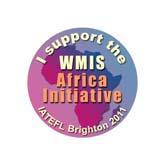

Floorplan of the Brighton Centre
Floorplan of the Brighton Centre
Floorplan of the Brighton Centre
Floorplan of the Old Ship Hotel - First Floor
Floorplan of the Old Ship Hotel - Ground Floor
Getting from the Brighton Centre to the Old Ship Hotel
Boardroom 25
Gresham 70
Paganini
300
Regency
120
Tudor 70
Auditorium 2
600
Room 1
100
Room 3
50
Room 5
50
Room 6
60
Room 8
50
Room 9
60
Room 10
See page 149
0815-0845
How to write successfully for IATEFL Conference Selections (Tania Pattison) in Room 1 &
How to grow a Personal Learning Network (PLN) (Nik Peachey) in Room 3
From teacher to online trainer – a personal journey
Tamer Oztunali
Bringing life to EFL classes by Web 2.0 tools
Meltem Bizim & H. Sibel Taskin Simsek
A cross-sectional and longitudinal study of reflectivity among pre-service...
K S Lam, H Y Chung & E Tang
A genre-based course in EAP: an online experience
Rosinda Ramos
Designing training materials: from challenge to competency
Salima Al-Sinani
Teaching one-to-one: 5 ways to develop your lessons
Ingrid Wisniewska
Language anxiety experienced by Indonesian learners of English in...
Diana Hasan
Cultivating communication ability through group presentations
Nammi Kim
Focus on the teacher
Christine Irvine – Niakaris
Cultural intelligence and grammar pedagogy
Content interest as identity investment
Rhoda McGraw
0900-1010
Helping our students to develop their personal learning environments
Ann Foreman
Online collaboration: a showcase of educator-generated digital production
Carla Arena
Learning is changing. Language is mobile
Finn Kirkland
Freedom of speech: speaking practice outside the classroom
Jerry Lambert
Something borrowed, something newESP wishlist revisited
Natasha Jovanovich
Online training for project management - activities, methodology, tools
Andrew Hockley
Integrating pronunciation
Lisa Pick
Inquiry into a language teacher’s lived experiences: a Macau story
Matilda Wong
PDA coming alive: the Delta Professional Development...
Mutlu Isil Ergun
Learning through English: rationale, reality, risk and reward
Making shadow reading visual, challenging yet fun!
Jo Timerick
The i-test
Gary Hicks
Making connections: using interactive resources from Animal Explorers
Susan Holden
Vocabulary learning: where the future lies
Mark Osborne
Using E-tivities to create online communities
Suzanne Mordue & Sirin Soyoz
New tendencies in mobile assisted English learning
Tatiana Kozhevnikova
Creating a classroom scoring rubric for speaking in five steps
Pablo Garcia Gomez
Creative Commons in the classroom: use, share, remix
Dominic Pates
Talk, technology and feedback –creating the conditions for writing
Mike Chick
Better group dynamics
Jessica Watson
1320-1420
Final plenary session by Brian Patten in Auditorium 2
1500
IATEFL Conference Farewell (sponsored by local organisations) in Skyline
1420-1500
D Whitehead & N Hadisantosa
Communication strategies in intercultural situations
Jonathan Hood
Writing as a means to enhance creativity in English teaching
Kalina Saraiva de Lima
50 Learners read, research, listen and talk in one integrated lesson
Room 11
20
Room 14
30
Room 15
60
Skyline
90
Syndicate 1
200
Syndicate 2 200
Syndicate 3
200
Syndicate 4
200
TBank
20
Plenary session by Catherine Walter in Auditorium 2 and relayed to Syndicates 3&4
Rose Alonzo
Do we 'murder to dissect'?
Nataly Karikian
Power and interactional routines: lessons from an EFL class
Yasemin Oral
Working across cultures - issues in managing a teacher's association
Alan Mackenzie
Plagiarism: a game of wits or a way of learning?
Sanaa Makhlouf
Teacher perceptions of electronic whiteboards with adult learners
Liz Fleet
Incorporating corpora in ELT
Atsuko Umesaki
Anna Turula Last opportunity to visit the exhibition.
Traditional Japanese Kamishibai storytelling for cross-cultural and EFL...
Patrice Pendell
Training the CLIL teacher: an in-service model
John McMahon & Liz McMahon
The effect of instruction on EFL learners’ pragmatic competence
Esra Ozdemir
Handheld electronic dictionary and the learners' needs
Mario Oesterreicher
Return of the native...
Howard Smith
Meeting challenges in course design for adult professional learners
Marilisa Shimazumi
Teaching English using English: full speed ahead, or...?
Maria Norton & Hyoshin Lee
Drama methodology and language learning
Ian David Holmes
Enjoying EFL for children with the Spiral Language System
Claire Selby
Making sense of comprehension
Nick Dawson
The future of learning and teaching
Eric Baber
Using proofreading and error correction to inform EAP teaching
Fiona Aish
Supporting learners and teachers: Cambridge ESOL's approach to...
Andrew Nye
No profit grows where is no pleasure
ta`en
Gjurgjica Mimica Bezjak
Making social networking work for you and your ESP students
Elisabeth Caldwell
Moving towards objectivity in classroom observation using ethnographic notes
Martha Lengeling
Make time for tutorials
Robert Ledbury
Playful learning. Learner objective or learner objection?
Vicky Harris & Annabel Boog
Visual grammar: putting you in the picture
James Munday
Confined or confident? Issues of confidence in teacher development
Maria Araxi Sachpazian
Variety outside the classroom at little or no cost
Jean Meakin
IELTS: power to predict academic and language performance
Greg Selby
The thrill of discovery: reading to learn Verissimo Toste
Climate change websearching in ELT web-based classrooms and beyond Anthony Baldry
Teaching with technology: plan B
Sue Lyon-Jones
Freinet movement and best practices for professional development
John Sivell
Closing address
Eric Baber, President of IATEFL, will make a closing address. in Auditorium 2
There will be a free raffle for attendees of the final plenary and closing. The wonderful prize of an iPad is kindly sponsored by Cambridge University Press
